
UNIVERSITY OF WINCHESTER,
an accredited institution of the University of Southampton.
Faculty of Arts:
Department of Theology and Religious Studies.
The Wisdom of the Body:
Embodied Knowing in Eco-Paganism
by
Adrian Paul Harris
Thesis submitted for the degree of Doctor of Philosophy
29th January 2008
1

UNIVERSITY OF WINCHESTER
an accredited college of the University of Southampton
ABSTRACT
FACULTY OF ARTS. DEPARTMENT OF THEOLOGY AND RELIGIOUS
STUDIES.
Doctor of Philosophy
EMBODIED KNOWING IN ECO-PAGANISM
by Adrian Paul Harris
Although embodied knowing is fundamental to our experience, no
previous study has detailed its role in a specific spiritual group. This thesis
offers a new model of embodied situated cognition, and develops an
embodied hermeneutics which uses Focusing in phenomenological
research. I apply these tools to the first detailed ethnography of Eco-
Paganism to reveal powerful processes of connection which have
considerable significance for religious studies and ecopsychology.
Chapters 2 and 3 survey the literature on Eco-Paganism and embodied
cognition. Chapter 4 uses the latter to synthesise a model of embodied
situated cognition which I call the 'enactive process model', because it
draws primarily on enactivism (inter alia, Varela et al., 1991), and
Gendlin's process philosophy (Gendlin, 1997). Current research shows
that key aspects of cognition are situated and embodied (inter alia, Varela
et al., 1991), such that we often think with place (inter alia, Preston,
2003). This raises epistemological questions which I address in a
discussion of embodied philosophy in Chapter 5. I then explain my
embodied hermeneutics methodology, and the practical application of the
Focusing Interview technique, in Chapter 6. My fieldwork
autoethnography, Chapter 7, provides an intuitive, felt understanding of
life on a road protest site, and is followed by ethnographies of urban and
protest site Eco-Paganism in Chapters 8 and 9. Chapter 10 discusses six
processes which create a sense of connection to the organic environment,
which include the felt sense (Gendlin, 1981) and the wilderness effect
(Greenway, 1995).
I conclude that a type of wilderness effect can catalyze the emergence of a
complex 'nature based' spirituality amongst site Eco-Pagans, while a less
intense form affects urban Eco-Pagans. Eco-Pagans sometimes use these
processes of connection to think with a place. The processes of connection
and thinking with place are fundamental to embodied situated knowing in
Eco-Paganism, and help explain many of its distinctive aspects. By
demonstrating the importance of embodied situated knowing in Eco-
Paganism, I highlight the potential for further research into processes of
connection and the impact of different physical spaces on religious
practice in general.
2

Contents
Chapter 1: Introduction
SECTION I: LOCATING THE RESEARCH PROJECT
Chapter 2: Eco-Paganism Literature review
Chapter 3: Embodied Cognition Literature review
Chapter 4: Embodied Situated Cognition: A Synthesis
Chapter 5: Embodied Philosophy: My Ontological and Epistemological Grounding
Chapter 6: Research Design and Methodology
SECTION II: FIELDWORK
Section II Introduction: Between Protest Site and Urban Life: The Spectrum of
Eco-Pagan Practice
Chapter 7: “You’re not studying it – you’re living it”: An Autoethnography
Chapter 8: Listening to the Threshold Brook: Urban Eco Paganism
Chapter 9: The Power of Place: Protest Site Eco-Paganism
Chapter 10: Eco-Paganism: A "sacred relationship with the world"
SECTION III: CONCLUSION
Chapter 11: Conclusion
APPENDICES
Appendix 1: Original Aims and Objectives
Appendix 2: Focusing - The Six Steps
References
References to works outside this thesis use the Harvard system. References to
titles of thesis chapters are given in the text in single quotes, while references
to sections of chapters are italicized.
List of figures and illustrations
Fig. 1: The Cognitive Iceberg
Fig. 2: Embodied Metaphor and Habitus
Fig. 3: Focusing and the Felt Sense
Fig. 4: The Trance State
3

Fig. 5: The Duck/Rabbit Drawing
Fig. 6: The Hermeneutic Circle
Fig. 7. Topic guide showing notes on chronemic and paralinguistic aspects of the
interview
Fig. 8: A Typology of Eco-Paganism
Fig. 9: Place and Community
Table #1: Processes of Connection
4

DECLARATION OF AUTHORSHIP
I, Adrian Paul Harris, declare that the thesis entitled 'The Wisdom of the Body:
Embodied Knowing in Eco-Paganism' and the work presented in the thesis are
both my own, and have been generated by me as the result of my own original
research. I confirm that:
l this work was done wholly or mainly while in candidature for a research
degree at this University;
l where any part of this thesis has previously been submitted for a degree
or any other qualification at this University or any other institution,
this has been clearly stated;
l where I have quoted fro the work of others, the source is always given.
With the exception of such quotations, this thesis is entirely my own
work;
l I have acknowledged all main sources of help;
l where the thesis is based on work done by myself jointly with others, I
have made clear exactly what was done by others and what I have
contributed myself;
l none of this work has been published before submission.
Date: 29 January, 2008
5

Acknowledgements
Researching this thesis has been an incredibly moving experience, and
I would like to offer my deep thanks to all those who participated,
especially those who shared my months on site. I hope you feel I've
done us justice!
Many thanks to my supervisory team, Graham Harvey, Elisabeth
Stuart and Andrew Blake. Without Graham's encouragement, I might
never have started this thesis, and without the support of my
supervisory team it would never ended so well. Chrissie Ferngrove’s
guidance helped me enormously through thick and thin – Thank-you! I
am also very grateful to those who granted my studentship: without
that funding I would never have been able to undertake the fieldwork
which has been crucial to this research.
6

Chapter 1: Introduction
Over ten years ago I gave a presentation that was to change my life. I
was speaking at the Newcastle University conference, 'Paganism
Today' about another way of knowing: The "somatic, physical
knowing ... [that] is the knowledge of faith, of emotion, of the gut
feeling" (Harris, 1996: 151). I concluded then that profound spiritual
experiences involving nature could inspire environmental action, and
that this process was grounded in embodied knowing. My words spoke
of an unexplored landscape and I embarked on a remarkable journey of
discovery which culminated in this thesis: I have concluded that life
changing processes of connection mesh with the embodied situated
knowing which underpins our being-in-the-world. My 1996 paper1
promised much, but left many questions unanswered: I have now
attended to those questions, and clarified both the process of embodied
knowing and its role in Eco-Paganism. My answers are as profound as
I’d hoped and more surprising than I ever imagined.
I begin with an overview, where I set out the deficiencies in existing
research, explain my aims and objectives and provide a brief outline of
the thesis. After a more detailed discussion of themes and findings, I
explain my use of the terms 'organic environment', embodiment,
knowing and cognition and then offer my conclusion.
OVERVIEW
Deficiencies in Existing Research
Although I was initially inspired by the puzzle of embodied knowing in
Eco-Paganism, I later realised that this revealed a much bigger
question: What is the role of embodied knowing in religion and
spirituality in general? With very few exceptions, current religious
studies approaches are profoundly disembodied, and this question has
been far from adequately addressed. This is a severe handicap to the
progress of religious studies, because we lack understanding the
'knowing' which is fundamental to religious and spiritual experience.
To approach the bigger questions about the role of embodied knowing
in religion and spirituality, I needed to focus on one group, and Eco-
Paganism was an obvious choice. In principle I could have researched
any group, as embodied cognition is fundamental to being human.
There is some material related to forms of embodied knowing in faith
traditions, notably Christianity (Isherwood and Stuart, 1998), but Eco-
Pagans are an ideal test case for several reasons. First, Eco-Pagans
valorize the 'body' and 'nature' - two problematic terms I discuss below
1 Although my paper was presented in 1994, I refer to it throughout by the date of its first
publication.
7

- which suggests an enhanced awareness of embodied knowing.
Second, I was interested in how embodied knowing might influence
motivation, and Eco-Pagans are by definition activists. Third, Eco-
Paganism is a significant but under-researched spirituality. Finally, as
an insider I am intimately familiar with some forms of embodied
knowledge in Eco-Paganism, so I already have a privileged
understanding. On a more reflexive note, I wanted to test the bold
claims I'd made at the 'Paganism Today' conference with ethnography
and a more nuanced autoethnography.
Although embodied knowing is widely discussed across many
disciplines, no existing study attempts to integrate this work into a
coherent model, partly because Western “[p]hilosophy has established
itself on the foundations of a profound somatophobia” (Grosz, 1994: 5).
One of my first tasks was to clarify our general understanding of
embodied knowing and formulate a model that could be applied to
qualitative research.
Initial Aims And Hypotheses
Aims and Objectives2
My primary aim was to determine how notions of 'embodied knowing'
could be used to interpret the practice of Eco-Paganism. Several sub-
aims were required to achieve this: I first established which theories of
embodied knowledge were appropriate to researching Eco-Paganism,
and then used these to develop a 'hermeneutics of embodiment'
methodology. This methodology was then used to research a range of
Eco-Pagan practice. My final thesis went beyond these initial aims in
that I synthesised the enactive process model and set out an embodied
philosophy.
Thesis Outline
This thesis is divided into three sections, the first of which locates my
research. Because my thesis is concerned with two very different fields,
I have two literature reviews surveying first Eco-Paganism (Chapter 2),
and then embodied cognition (Chapter 3). In Chapter 4, I use the
second literature review to synthesise a model of embodied situated
cognition. This raises fundamental questions about epistemology
which I address in Chapter 5, "Embodied Philosophy". Having
established a sound philosophical foundation, I explain my "Research
Design and Methodology" in Chapter 6.
Section two presents the results of my fieldwork. After a brief
introduction to provide an overview of the territory, I present Chapter
7, " 'You’re not studying it – you’re living it': An Autoethnography".
This autoethnography provides an intuitive, felt understanding of life
on a road protest site, which compliments the more formal
2 Adapted from those registered with the University of Southampton, February 2004. See
Appendix 1.
8

ethnographies that follow in Chapter 8, "Listening to the Threshold
Brook: Urban Eco Paganism" and Chapter 9, "The Power of Place:
Protest Site Eco-Paganism". Section two closes with Chapter 10, "Eco-
Paganism: A 'sacred relationship with the world' " which draws
together the treads of my fieldwork to present a coherent pattern.
Section 3 consists of my final concluding chapter which sets out my
argument, my original contributions to research and its wider
relevance.
Audience
Although of primary interest to religious studies scholars, my survey
and model of embodied knowing will prove of interest to researchers in
a wide range of disciplines, including social science, philosophy and
cognitive neuroscience. Social science academics in general will find
my hermeneutics of embodiment methodology useful in researching
the embodied knowing that lies beyond existing approaches. Finally,
my study provides Eco-Pagans with a deeper understanding of our
spirituality.
THEMES AND FINDINGS
Mapping the key themes running through this thesis will both present
and contextualise my main findings. My thesis has four main themes,
two of which set the initial questions and two of which emerged from
the research. To research embodied knowing in Eco-Paganism, I
undertook an ethnography of Eco-Paganism (theme 1), to which I
then applied a theory of embodied situated cognition. My literature
revealed that embodied knowing is situated, so my second theme is
embodied situated cognition. Embodied situated cognition argues that
in knowing the world we become part of it, and connection emerged as
major theme in my ethnography, so this became my third theme. Many
aspects of my research problematizes conventional dualities, and this
is especially apparent in theories of embodied situated cognition and
my ethnography, so I identify this as my fourth theme.
I begin by presenting a review of literature on Eco-Paganism (Chapter
2), which introduces the sub-theme of the relationship between Eco-
Paganism and mainstream Paganism. I note that some Eco-Pagans are
predominantly urban, while others are more likely to be found on
protest sites. I next turn to research into embodied situated cognition
(Chapter 3), where it becomes clear that there is a great deal of
consistency across disciplines. There is generally agreement that mind
is immanent in the world, and the degree of integration between what
we conventionally understand as ‘self’ and ‘world’ problematizes the
subject-object distinction. Because of this tight integration of 'self' and
'world', place can have a profound impact, not only on our thinking but
our entire being-in-the-world. Chapter 3 describes a form of embodied
knowing which Gendlin calls the 'felt sense', which can be accessed
9

using a practice called Focusing3 (Gendlin, 1981).
The degree of consistency in embodied situated cognition research
allows me to synthesise a coherent theory of embodied situated
cognition (Chapter 4). This - the 'enactive process model' - combines
enactivism, a leading approach in cognitive neuroscience (inter alia,
Varela et al., 1991), with Gendlin's process philosophy (Gendlin, 1997).
My synthesis is presented graphically in Chapter 4, fig 2, as 'The
Cognitive Iceberg'.
By this stage, my thesis has raised fundamental questions about
epistemology and ontology which need to be addressed before
discussing my methodology. Chapter 5 uses Gendlin's embodied
philosophy to address these issues. Gendlin's epistemology enables me
to discuss embodied knowing from the perspective of propositional,
academic knowledge, and collapses the subject/object distinction, thus
avoiding the problems intrinsic to dualism (inter alia, Gendlin, 1997;
Levin, 1997).
My methodology chapter builds on this epistemology to demonstrate
how Gendlin's Focusing approach can both access embodied knowing
and underpin an embodied hermeneutics (Chapter 6). This allows me
to explore embodied knowing using an embodied methodology that is
underpinned by an embodied epistemology, and thus grounds me in a
virtuous circle of reflexive understanding.
My qualitative study of Eco-Paganism has three strands: an
autoethnography, and studies of urban and site Eco-Paganism. I use
my enactive process model to explain the role of embodied situated
cognition in all strands. In Chapter 7 I present an autoethnography of
my life on road protest sites which enhances the reader's embodied
understanding of my research by providing a "vicarious experience of
the things told” (Ellis & Bochner, 2000: 751). I problematize several
dualities, including academic discourse versus emotional engagement,
and entering/leaving the field. Chapter 8 is a study of urban Eco-
Pagans which highlights several differences from mainstream Pagans.
Feelings of connection with place emerge as the key interview theme,
and I identify several processes which facilitate this experience,
including the felt sense (Gendlin, 1981). The role of embodied situated
cognition is especially apparent in the way participants 'think with
place', as well as in spiritual healing, trance, ritual and relationships to
the organic environment. Chapter 9 discusses protest site Eco-
Paganism, and again notes the importance of processes of connection,
the most important of which is the 'wilderness effect', which has
previously only been observed on wilderness treks (Greenway, 1995). I
show how the processes of connection can catalyse profound spiritual
3 I always capitalize Gendlin's term Focusing to distinguish it from more common usage of the
word. Not all authors follow this practice.
10

experiences, and blur perceived boundaries between self and other.
Embodied situated cognition is again extensive. I draw these threads
together in Chapter 10, where I use the enactive process model to
analyse the processes of connection and thinking with place. I conclude
that the processes of connection can enable a communion with the
world that awakens Eco-Pagans from the dualistic dream.
TERMINOLOGY
Nature
In the course of this thesis I use several terms that resist simple
definition, and 'nature' is the first and most mercurial. Both Sutton and
Williams consider the word to be the most complex in our language
(Williams 1983: 219; Sutton 2007: 2), mainly because its meaning
changes over time, revealing as it does so major developments in
human thought (Williams 1983:224). 'Nature' encompasses three areas
of meaning: "(i) the essential quality and character of something; (ii)
the inherent force which directs either the world or human beings or
both; (iii) the material world itself, taken as including or not including
human beings" (Williams 1983: 219). During the Romantic period of
the late 18th century, the third meaning acquired an ethical flavour, as
'nature' came to refer to the "goodness and innocence" of the
'unspoiled places' of the 'countryside' (Williams 1983: 223). These
different meanings are often confused or conflated, a fact that
complicates any explanation of contemporary Paganism as a 'Nature
Religion'. The editors of Nature Religion Today (Pearson, Roberts and
Samuel, 1998) suggested that contemporary Paganism is a nature
religion in that it involves “a reorientation towards, and
a resacralisation of, both external nature and our own physical
embodiment” (Pearson, Roberts and Samuel, 1998: 1). This definition,
though adequate, is based squarely on meaning (iii) given above and
ignores meaning (ii) of nature as an "inherent force" which is at least as
significant to many contemporary Pagans. (See 'Eco-Paganism
Literature review').
Bookchin claims that the languages of many aboriginal peoples lack
any equivalent for our word "nature" because they are "[i]mmersed in
nature" so "it has no special meaning" (Bookchin, 1993). Some argue
that we should avoid talking about 'nature' altogether: As Evernden
points out, our contemporary use of the word emphasises a "sense of
separation between the human subject and the surrounding field of
natural objects" (Evernden, 1992: 102). Ingold concurs that 'nature'
only exists "for a being that does not belong there, and that can look
upon it, in the manner of the detached scientist" (Ingold, 2000: 20).
He prefers the word 'environment', but clarifies the term, emphasizing
that any environment is relative to those organisms who exist as part of
11

it and that an environment is a process, which is "fundamentally
historical" (Ingold, 2000: 20). Ecopsychologist Fisher, comes to a
similar conclusion: In as much as "the natural world" is "a network of
relationships", it "is not a thing all, but a constant flux of interweaving
processes" (Fisher, 2002: 97). Ortner's re-thinking of her 1974 paper
'Is Female to Male as Nature is to Culture?' recognises the limitations
of her prior use of Levi-Straussian binary oppositions, and adopts a
more process based approach, wherein 'nature' becomes understood as
Strathern puts it, "those processes that proceed autonomously in the
world, and 'that limit the possible' of human action" (Ortner, 1996:
179).
Despite these attempts to clarify the meaning to the word 'nature', I
conclude that it remains too vague and culturally loaded for this thesis.
Although most of the planet has now been influenced by human
activity, this ranges across a very broad scale from wilderness to
shopping precinct. Thus, Ingold's suggestion of 'environment' remains
problematic, as it fails to distinguish places that are highly modified by
human activities, like cities, from those less influenced by us, like
ancient woodland; both are my environment when I am there. I will
therefore use the term 'organic environment' to refer to the "the
natural world" as "a network of relationships" (Fisher, 2002: 97) and
processes which "proceed autonomously in the world" and “ 'limit the
possible' of human action" (Ortner, 1996: 179), but which is
nevertheless "fundamentally historical" (Ingold, 2000: 20).
Embodiment and Knowledge
The term 'embodiment' is used with different emphasis by different
writers, so I need to be clear about my own understanding. There is a
substantive discussion of this term in my literature review of embodied
cognition (Chapter 3), but I would note here that I do not use the term
'embodiment' as a more nuanced name for the body, but rather to refer
to ways in which we are embodied in the world.
It is difficult to differentiate between embodied cognition, embodied
knowledge(s) and embodied knowing, partly because such "subjugated
ways of knowing" (Foucault, 1980: pp. 81, 84) evade conventional
analysis. Despite the challenge of feminist epistemology, the Western
analytic tradition resists the notion that knowledge could in any sense
be ‘embodied’. Existing definitions, however, can clarify somewhat:
The Oxford Companion to the Mind describes cognition as “The use or
handling of knowledge” (Gregory, 1987: 149), but leaves moot the
question of what ‘knowledge’ means. However, whereas 'knowledge'
suggests something one might use, 'knowing' implies a state of
awareness, an understanding or way of being-in-the-world, and
therefore more accurately describes what I am researching. As
Bourdieu puts it, “[w]hat is ‘learned by the body’ is not something that
12

one has, like knowledge that can be brandished, but something that
one is” (Bourdieu, 1990: 73).
My embodied cognition literature review (Chapter 3) leads me to
conclude that at the level of embodiment it is practically impossible to
make distinctions between embodied cognition, embodied
knowledge(s) and embodied knowing. However, I perceive an
advantage in retaining the terms ‘embodied cognition’ and ‘embodied
knowing’ to clarify a fundamental distinction between what Merleau-
Ponty calls the physiological or “the objective body”, and “the
phenomenal body,” which is how an individual phenomenologically
experiences their embodiment4. Although there are occasions where we
experience our own body as a physiological entity, we typically
experience subjective embodiment as “a unified potential or capacity
for doing this and that - typing this sentence, scratching that itch, etc.”
(Audi, 1999). I therefore adopt two complementary perspectives; one
focused on the physiological body (embodied cognition), and the other
phenomenological and experientially intimate (embodied knowing).
Neither approach is ‘truer’ than the other, but both offer up different,
equally revealing modes of understanding. We can learn only so much
from looking at an apple; biting and tasting it almost reveals another
entity. Approaches such as cognitive neuroscience favour the
physiological body, while others – for example phenomenology and
anthropology - typically emphasize the phenomenal body. However,
adopting these two perspectives offers clarity, as it becomes clear that
the objective body engages in embodied cognition, while the
phenomenal body can experience an embodied knowing. This
approach is most adequately summarized by Varela et al., who "see our
bodies both as physical structures and as lived, experiential structures -
in short, as both 'outer' and 'inner,' biological and phenomenological".
The term embodiment carries this double meaning: "it encompasses
both the body as a lived, experiential structure and the body as the
context or milieu of cognitive mechanisms" (Varela et al., 1991: xv-xvi).
Conclusion
Having described the deficiencies in existing research, I explained my
aims and objectives. I then set out the four main themes of my
research. The first two themes set the initial questions: I examined my
ethnography of Eco-Paganism from the theoretical perspective of
embodied situated cognition. This perspective, and my ethnography,
highlighted the importance of connection, which therefore became my
third theme. As my research repeatedly problematizes conventional
dualities, I identified this as my fourth theme. I used these themes to
structure the discussion of my research findings, before closing by
4 The phenomenological tradition often uses the terms ‘leib’ for the ‘lived’ or phenomenal
body and ‘körper’ to describe the physical ‘objective ‘ body. (Embree et al., 1997: 66). Lakoff
and Johnson make a similar distinction between “neural embodiment” and
“phenomenological embodiment” (Lakoff and Johnson, 1999: 37)
13

defining several key terms.
Chapter 2: Eco-Paganism Literature review
"Paganism not only holds a solution to our environmental crisis ... it
can bring about a revolution in the way our culture makes sense of
reality. For Paganism puts us back in touch with the body; by
reconnecting our wordy analytical culture with the physical self,
Paganism brings us back to the Earth" (Harris, 1996: 149). Stirring
stuff, certainly, but does the rhetoric hold? Though I first spoke those
words at a conference in September 1994, they still frame my
discussion. This chapter explores the relationship of Paganism to "our
environmental crisis", questions its claim to counter-cultural status
and considers to what extent Paganism "puts us back in touch with the
body".
There is no single 'Paganism'5, but rather many 'Paganisms' (Blain,
Ezzy and Harvey, 2004: vii) with various global manifestations6.
However, certain "taxic indicators" (Harvey, 2004: 2-3) mark the
network of Traditions, organizations, texts and practices that form
what we might call 'mainstream Paganism'. Various spiritual
approaches including Wicca, witchcraft, Druidry, Heathenism (Asatru
or Odinism), western Shamanism and some strands of Goddess
spirituality, sit, sometimes uncomfortably, beneath the Pagan
umbrella. Several of these approaches - notably Wicca, Druidry and
Heathenism - identify themselves as 'Traditions' (Davy, 2007: 145)
with specific initiation ceremonies, practices and training, but many
Pagans have a more eclectic practice and do not identify with any
Tradition.
THE CONTEXT of ECO-PAGANISM
5 The terms 'contemporary Paganism', 'Pagan' or 'Paganism' are more accurate and less likely
to offend rather than the alternative 'Neo-Paganism'. To speak of Neo-Paganism implies a
closer relationship to the classical variety than historical research supports (Hutton, 1999: vii)
and simultaneously offends practitioners some of whom feel the 'neo-' prefix "represent[s] a
veiled judgment of their religion as being in some way inferior or inauthentic" (Strmiska,
2004).
6 I focus on UK practice throughout but also draw on research based in the USA, specifying
that location where appropriate.
14

Paganism is often described as a ‘nature religion’ (Pearson, Roberts
and Samuel, 1998: 1), but as Davy points out "some Pagans affirm a
transcendence of nature" and "believe in a sort of divinity that is not of
this world" (Davy, 2007: 7). Furthermore, while it is true that most
Pagan practice is ''centrally concerned with celebrating
Nature''(Harvey 2000: 155), that celebration does not usually extend to
environmental activism or even necessarily increase awareness (Davy,
2007: 175) and most Pagans "don't often think about the ethical and
political implications of what they are doing''(Adler 1986: 397).
Environmentally active Pagans are in "a minority''(Davy, 2002: 90)
and Davy concludes that ''although Pagan discourses tend to support
environmentalism, perhaps the average Pagan does not tend so much
toward political action''(Davy, 2002: 92). This widely supported
conclusion (see inter alia, Adler, 1986; Ezzy, 2006; Greenwood, 2005;
Smith Obler 2004; Letcher, 2000) is less surprising when we recognise
that many Pagans "understand 'nature' as a symbol" rather than a real
place or the actual living environment (Davy, 2007: 24).
It is within this context that a movement has emerged over the last 20
years which is commonly called ‘Eco-Paganism’ in the UK, although it
is sometimes described as ''Practical Paganism’’ (Westwood and
Walbridge, n.d., Plows 1998 and 2005; Letcher 2001). The relationship
between Paganism in general and Eco-Paganism is complex and the
latter is not simply a sub-set of the former. Current theoretical
understandings of Eco-Paganism are discussed below, but in brief, it is
a distinct attitude and approach to the practical expression of
Paganism that expresses itself in environmental action. Although
‘typical’ Eco-Pagans do exist, there are many more Pagans who at one
time or another express Eco-Pagan sensibilities. On the other hand,
some Eco-Pagans - especially itinerant protest site Eco-Pagans - have
little or nothing to do with mainstream Paganism. Bearing this
complex relationship in mind, I begin by exploring the common
ground between Paganism and Eco-Paganism, pointing out particular
Eco-Pagan emphases where relevant.
'Nature' and the Knowing Body
Western mainstream culture has a pragmatic approach to the
environment and at best an ambivalent attitude to the body. But for
most Pagans the body and our sensual relationship to our environment
is fundamental, and engenders an embodied understanding. As
LaFleur points out (1998: 48) how we understand the human body
reveals our deeper metaphysical assumptions, and by placing the
sensual body at the heart of spiritual experience Paganism can
challenge the dominant ideology at both a physical and a symbolic
level. For Harvey ''[e]mbodied reality is authoritative in
Paganism''because Pagan understanding is located in everyday life and
15

experience (Harvey, 1997: 187). Raphael describes Goddess spirituality
as a ''somatic spirituality” (Raphael, 1996: 75) that resacralizes the
body (Raphael, 1996: 82), while Salomonsen comments that the
symbols used in Reclaiming Witchcraft are grounded in ''the human
body, sexuality and parenting, as well as the earth and the seasonal
cycles of the natural world''(Salomonsen, 2002: 14). This is typical of
Pagans in general (inter alia, Adler, 1986; Hardman and Harvey, 1995;
Harvey, 1997; Pearson, Roberts and Samuel, 1998).
In an interview in People of the Earth Alexei Kondratiev expresses his
belief that ''attunement to the natural world''is the main contribution
Paganism can make to the modern world. This attunement ''is not just
an intellectual understanding''but rather ''a gut feeling”, and he
explained that Pagans ''react in a very personal and visceral way to
Nature''(Hopman and Bond, 1995: 25). In her study of US Pagan
Festivals, Pike suggests that the dancers in a fire ritual ''construct their
identities around the fire by moving back and forth between verbal and
somatic ways of knowing” (Pike, 2001: 189). This helps create a new
relationship to the body that rejects socialized values and celebrates
those of contemporary Paganism, such as sacred sexuality. During the
ritual ''the body both expresses and constructs meaning’’ (Pike, 2001:
197-198).
This validation of embodied knowing is especially common in
literature related to Eco-Paganism. Salomonsen quotes Reclaiming
witch Francesca, for whom significant understanding comes from a
profound physical involvement:
You get involved with your whole being, with your god spirit,
with your sacred animal nature, with your passion – you bring
all parts of you and you experience it (Salomonsen, 1998: 144).
Francesca's experience illustrates Starhawk's understanding that if we
are to move beyond the ''thought-forms of estrangement''we must
focus on the physical: ''what we can see and touch and hold’’
(Starhawk, 1982: 29). Starhawk - a Reclaiming founder member -
prefers symbol to abstraction ''because it evokes sensual and
emotional, not just intellectual, responses''(Starhawk, 1982: 11) and
concludes that "[o]ur economic and political systems, our science and
technology, are rooted in our alienation from our bodies and from the
realms of deep feeling" (Starhawk, 1982: 137). Eco-Pagan activist
Alisha Little Tree spoke of the ''knowledge in our bodies that tell us
what's right''(Taylor, 2001: 231-232) while academic Eco-Pagan Plows
describes the experience of protest camp rituals in similar terms:
We were tuning into the Earth’s heartbeat, to a frequency you
find only through faith and instinct (Plows, 1998a: 289).
16

Taylor describes similar practices at activist gatherings in the US.
Although some used hallucinogens and alcohol, most activists sought
ecstatic spiritual experience through drumming and dancing:
Fuelled by hard-driving music and drumming, some activists
report mystically fusing with the cosmos, 'losing themselves' and
their sense of independent ego, as they dance into the night
(Taylor, 2001: 228).
(Eco-)Pagan Space
Beyer opines that Pagans valorize physical place, stressing relationship
to what is local (Beyer, 1998: 17 and 19), and this is certainly true of
Eco-Pagans, for whom this belief is expressed in the practice of
building a relationship with the spirit(s) of a place, the genius loci (see
inter alia, Patterson, 1991; Taylor, 2001). But how true this is of Pagans
in general is debatable, as evidenced by the degree of attention paid to
UK 'sacred sites' like Avebury, Glastonbury and Stonehenge (Bowman,
2000: 92; Harvey, 2000: 159) as well as more exotic places like Delphi
and Crete all of which are "popular destinations" for Pagan pilgrims
(Rountree, 2006: 95).
Pagan festival gatherings, which last from a few hours to a week or
more, provide a space where participants can overcome the alienation
Starhawk speaks of (Pike, 2001: 24). Pike is concerned specifically with
large7 Pagan gatherings in the USA:
Dimensions of self and space are interconnected for Neopagans;
boundaries are fluid between self and other, imagination and
reality, and human and nature. Festival space dissolves
these boundaries by telling participants through their senses
that the space belongs to them and is different from the other
spaces they live in (Pike, 2001: 28 –29).
It is illuminating to compare the sacred liminal space of contemporary
Pagan festivals with that of the Eco-Pagan protest camps, as both
create a ''shared reality''that is very different from conventional
experience, (which Pikes’ respondents call ''Mundania”), but is
considered ''more 'real' because [it embodies] an ideal reality''(Pike,
2001: 21). Letcher notes that the ''enchanted world''of the protest camp
is a ''forgotten, and truer [aspect of] reality’’ (Letcher, 2001b: author's
emphasis). In each case the contrast is moral and ontological, and
celebrates the carnivalesque. Although both festival and protest space
are established using narrative, ritual, and imagination, there are
significant differences: Whereas the laws of Mundania permit festival
space, confrontation defines the Eco-Pagan camp. The festival lasts for
7 Such festivals usually included over a hundred people. Similar events are held less
frequently in the UK and Europe.
17

a brief, set period of time – usually no more than a week - but a protest
camp has no pre-determined end point, so creates a tension that
magnifies the sense of liminality. While most protest sites are based in
wooded areas, the East London M11 Link Road protest was a notable
exception that nevertheless exemplified the unique qualities I've
identified. In November 1993 the protest culminated in the occupation
of Claremont Road, a street of over 30 houses, and by the Summer of
1994 it had "transform[ed] into a 'festival of resistance'" (Butler, 2003:
384).
Practice and Belief
Because practice and experience are more important than belief,
Paganism has little or no creed and the question of what to believe is
open to the individual (Davy, 2007: 13; Harvey, 1997: 161). Beyer
considers ''a strong experiential basis where personal experience is a
final arbiter of truth or validity''to be a defining feature of Paganism
(Beyer, 1998: 17), while for Starhawk, Witchcraft is not a belief system
at all, but simply an ''attitude of joy and wonder to the
world''(Starhawk, [1979] 1989: 108). Vee Van Dam, editor of Spiral
magazine (circa. 1989), agreed:
I do not even think of Paganism as a religion; I perceive it as a
‘feeling’ and when clear about things as a ‘knowing’ … many so-
called Pagan religions … lose the ‘feeing’ of the Spirit for the sake
of dogma, tenets, rules and often useless rituals.
Van Dam’s definition of Paganism is quoted approvingly by UK Eco-
Pagan Richard Westwood in Earthwise magazine (Westwood, 1988:
12).
Although there is agreement that "Paganism is not so much a set of
beliefs as a way of relating to the world" (Harris, 1996: 153), the
specific practices of Eco-Paganism introduce an inevitable tension.
Adler once assumed that Paganism would ''consider the protection of
the earth a religious duty''and so ''anyone who did not feel this way ...
was not a 'real Pagan'" (Adler, 1986: 399). Activist academic Letcher
held a similar view:
if Pagans are not taking a leading role in the struggle against
environmental destruction then they not only disempower
themselves, but their religion and that which they hold to be
most sacred (Letcher, 2000).
Letcher concludes that there are ''inconsistencies within modern
Paganism''and compares 'Radical' activist Pagans with the 'virtual'
Pagan mainstream (Letcher 2000).
18

Deity
The prioritization of practice over belief is apparent in relationships
with deity, which vary enormously. Not only do Pagans disagree on
every aspect of this relationship, but may hold apparently inconsistent
beliefs or have no beliefs at all: Philip, a Wiccan, wrote:
I am monotheist, duotheist, pantheist, panentheist and atheist
and find no contradiction in that whatever (Philip, pers. comm.
11/10/2006).
Inquiring into how Pagans practically relate to deity is more useful
than asking about belief, and we can differentiate between 'working'
with deity and 'worship'. Most contemporary Pagans "devote
themselves to one or more gods or goddesses" (Cowan, 2006: 179), but
acts of worship often blur into practical work with or through deities to
empower a spell, ask for counsel or invite some degree of possession
(Harris and Nightmare, 2006: 234).
Beyer's claim that Pagans stress relationship to what is local (Beyer,
1998: 19) is again not borne out, as reference to local deities is unusual
and generally linked to the kind of specific 'sacred sites' referred to
above. Many Pagans work with a generic Goddess, a God and Goddess
partnership (Pearson, 2002), or deities from ancient pantheons of
Egypt, Greece, Rome or Celtic or Nordic Europe (Pearson, 2002;
Harvey, 1995). For Druid priest Philip Shallcrass "[a]ll Gods are one
God, and all Goddesses are one Goddess" (Shallcrass, 1998: 164), and
this is true for many Wiccans (inter alia, Greenwood, 1998: 101;
Crowley 1998: 170) and Pagans in general (Cowan 2006: 180). The
most common alternative view is that each deity is a distinct entity
(Cowan, 2006: 180) sometimes understood as "powers of nature"
(Restall Orr, 2005: 10) with the Goddess conceptualized as "the Earth
Mother" (Stuckey, 2002: 115). Some Pagans have a more psychologized
understanding of deity as "role models" (Davey, 2007: 18) or the "inner
motivations ... of a persons life" (Harvey 1997: 75-76) and Wicca in
particular has been influenced by Jung (Greenwood, 1998: 105;
Crowley, 1995).
Ritual
Ritual is difficult to define (see Grimes, 2000) but for the purpose of
this thesis I use my own definition of contemporary Pagan ritual:
A Neopagan ritual is a process played out through performance.
It is set apart from the mundane and involves physical activity
and symbolic verbal or non-verbal communication expressed
through multiple sensory modalities. Some Neopagan ritual
intends to engage with 'ultimate reality' or mystical powers and
takes place in the context of a heightened emotional state (Harris
and NightMare 2006: 217).
19

According to Adler, Kelly claimed that "the Craft ... is totally defined in
terms of the ritual" (Adler, 1986: 170), and given the many functions
that it fulfils it is no surprise that it serves a "vital need" for many
Pagans (Harris and NightMare, 2006: 234). Some form of ritual is
important to most - perhaps all - Pagans, but it is practised in a wide
variety of ways: Wiccans claim that their religion "can only be
expressed and experienced though direct participation in its rituals"
(Pearson, 2007: 69), so Wicca is ritually orthopraxic, but other Pagan
rituals are more eclectic or ad hoc, and can include simply sitting in the
woods (Harvey, 2000: 158), dancing (Pike, 2001) or other intentional
performances.
Although my 1996 paper claimed that ecstatic Pagan rituals could heal
"the rift between body & mind" (Harris, 1996: 153), Hutton notes an
emphasis on control in contemporary witchcraft rituals which ''lack the
ecstatic, euphoric, and abandoned quality of many tribal and
shamanist ritual practices; the object is usually not to lose
consciousness but to enhance and deploy it''(Hutton, 1999: 407). Given
the pervasive influence of the Craft on contemporary Paganism (inter
alia, Hutton 1999; Melton 1993; Kelly 2002), my claim must be
understood as selective at best.
Magic
Melton classifies Paganism within the "Magick Family" (Melton, 2002)
but magic is tricky to define because "[t]he word magic works far too
hard" (Glucklich, 1997: vii). Glucklich later offers Middleton's
definition as authoritative: Middleton identifies as "magic" actions
performed with the intention of bringing "about certain events or
conditions" without any scientific "cause and effect relationship
between the act and the consequence" (Middleton, 1987: 82).
Middleton's understanding accords with Melton's belief that
''[i]nherent in the magical world-view is the notion of control and
manipulation''(Melton, 2002: 173). Pearson offers a more nuanced
view that contrasts such "occult magic" with the more "'ordinary magic'
of everyday life" that enables "interaction with other people or the
Earth" (Pearson 2007: 101). This latter form of magic is concerned with
"feeling[s] of connectedness with the sky, the trees, the soil" (Pearson
2007: 101) and distinguishes "stellar-based occultist magic from earth-
based pagan magic" (Woodman, J., 2000, cited by Pearson, 2007: 101).
Earth-based and Esoteric Paganism
In our 2006 paper Welch and I traced the genealogy of contemporary
Paganism through diverse currents of influence, the most important of
which we described as "earth-based" and "esoteric" (Harris and Welch,
2006). Although these currents are not isolated from each other, they
carry distinct ideological characteristics and attract different socio-
political groups. The Western Occult Tradition is the primary current
20

flowing through Wicca, which has in turn influenced mainstream
Paganism (inter alia, Melton 1993, Kelly, 2002 and Hutton, 1999.) This
esoteric current is rooted in an ideology of anthropocentrism
(Greenwood, 2005: 187), personal power and hierarchy (Hutton, 1999:
83; Kelly, 2002) that tends towards a patriarchal sexism (Salomonsen,
2002: 92-93). Given how much Paganism drew from this esoteric
tradition, Harvey finds it unsurprising that "some Pagans do or say
things which denigrate matter", and suggests that this leads to "a form
of schizophrenia in which the celebration of Nature is assented to while
disembodiedness is sought" (Harvey, 1997: 139). Greenwood claims
that this high magic influence leads Wicca to be more concerned with
"personal spiritual transformation" than "reverence for spirits of place"
or the environment (Greenwood, 1998: 101-102), while Hutton notes
that none of the many witches he researched had ever joined a protest
camp ''in sharp contrast with Pagan Druids and non-initiatory
Pagans''(Hutton, 1999: 405).
However, an alternative current flows from the free festival culture of
the 'new-age travellers' and biker scene into several interconnected
streams. McKay claims that there were ongoing exchanges between
travellers and peace camps throughout the early 1980's and quotes
Don Aitken (20 Years of Festivals) that "[i]t was from the new
Travellers that the Greenham women learned about benders8" (McKay,
1996: 58). Letcher opines that protest site Eco-Paganism, with its
''romanticised gypsy life, and a new tribalism''also emerged from the
free festival travellers (Letcher, 2005: 557). This same current blended
with Druidry at Stonehenge to create the ‘alternative’ Druidry of the
Glastonbury Order, Secular Order and the Loyal Arthurian Warband,
many of whom identify as Eco-Pagans. Greenwood offers a similar
model that focuses more on underlying ideologies than cultural
influences. She compares the roles of esotericism and organicism in
"nature spiritualities" and "highlights many contradictory and internal
and inconsistencies that may throw doubt" on claims that Paganism is
"inherently ecological" (Greenwood, 2005: 172-173).
We do not propose a dichotomy between two distinct groups, as many
Pagans do not fit comfortably into any classification, but argue for ideal
types. A typical earth based Pagan develops a spontaneous and
intuitive practice where ritual is unstructured, ecstatic and focused on
celebration. Earth based Pagans dislike organisation and some resist
identifying as 'Pagan' at all. Esoteric Pagan groups, typically run by
traditional Druids or Wiccans, tend to have a hierarchical organisation
and ritual practice that inclines towards the formal and non-ecstatic.
Crowley's brief description of Pagan worship provides an eloquent
illustration: She points out that some Pagans mark the seasonal
festivals with "complex ritual" while others "simply sit and meditate or
8 A bender is a low impact dwelling commonly used at UK protest sites. It is made by bending
coppiced wood to create a dome, which is then covered with a tarpaulin and lined with
blankets.
21

go outside to commune with nature" and suggests that these
differences effectively mark "low and high church, field and temple
Pagans" (Crowley, 1996: 169). Initial research suggested that earth
based Pagans would be common in alternative Druidry and Eco-
Paganism and my research confirms that this is indeed the case.
ECO-PAGANISM
Eco-Paganism has not yet been extensively researched and I have
examined all material referring to the UK including magazines and
grey literature. Although I have read material on US practice, I have
not researched the movement in detail beyond the UK, though Eco-
Paganism is widespread in the USA, and practised across Europe, in
Canada, Australia and South Africa.
There are clearly similarities between Eco-Paganism and mainstream
Paganism, but significant differences remain. First, there is a strong
political dimension to Eco-Paganism that is often absent in the
mainstream form. (See, inter alia, Harris & Scullion, 2004; Hine,
2000; Starhawk 2002). Plows, for example, reports that ''spirituality
often informs a political stance''and notes that it was through
Paganism that she became radically politicised (Plows, 2001: 4).
The concept of Eco-Paganism emerged within the last 20 years, and
the term itself is even more recent, with the earliest reference in
Moonshine magazine # 7, which lists Wood & Water as a ''goddess
orientated eco-pagan magazine''(Westwood and Westwood, 1987b).
The first discussions of UK Eco-Paganism were also in Moonshine
magazine (Westwood and Westwood, various dates), and in the late
1980's several key articles were collected into the booklet encouraging
Pagans to be more ecological and to apply magic to political ends.
While Moonshine is clearly significant, Letcher opines that Eco-
Paganism properly begins with the practical protests on Twyford
Down the 1992 (Letcher, 2005: 556).
Who are Eco-Pagans?
Some Eco-Pagans are involved in a Pagan Tradition, counting
themselves as, inter alia, Wiccans, Druids or Heathens (Harvey, 1997a,
Letcher, 2000, 2002), but many are " 'detraditionalized' ", a term
Letcher uses to describe the "elective and affectual spiritualities of
protesters living more permanently at protest sites" (Letcher, 2005:
557), which emerged with the Twyford Down Donga Tribe (Plows,
2005). These two groups are not mutually exclusive (Letcher, 2003):
Druids and Wiccans are found at protest camps (Roberts and
Motherwort, 1997; Pendragon and Stone, 2003) and Eco-Pagans
typically move from one circle of influence to another: They may, for
example, be part of the Dragon Network, an initiated Druid and a
22

member of a protest camp tribe. Letcher’s model has heuristic merit in
defining ideal types, and I refer to detraditionalized and traditionalized
Eco-Pagans throughout this thesis. According to Letcher,
detraditionalized protest camp Eco-Pagans practice syncretic
spiritualities that incorporate elements of ''Buddhism, Shamanism, the
New Age, Theosophy, 60s psychedelia, the Rainbow movement, and
British folklore, whilst retaining a core Pagan doxa''(Letcher, 2005:
557). This eclecticism supports his claim that this ''religion of the
people ... has emerged from the community of protesters and their
collective stories''(Letcher, 2001b). Letcher's model is valuable, but we
also need to distinguish between the Eco-Pagans he identified on
protest sites and more urban Eco-Pagans. Boundaries between all
these categories are fluid, and at a given time a site Eco-Pagan may be
a member of a Pagan Tradition or not, and others of either persuasion
may be living a more urban lifestyle.
Bearing in mind the complexity of the distinction, traditionalized Eco-
Pagans fall primarily into three groups: Reclaiming, Dragon and
various Druid orders. Reclaiming is the best known, primarily because
of the wide influence of activist Witch Starhawk, and though California
Reclaiming has been extensively studied (Salomonsen, 1998 and
2002), research into the UK branch, founded in 2001, has been
minimal (Dougherty, 2004). Although the UK based Dragon
Environmental Network (founded by Harris in 1990) has a firm place
in mainstream Paganism, it has been described as ''the Dragon
Tribe''(personal recollection, but see Butler, 2003: 399) and some
detraditionalized protest camp Eco-Pagans count themselves as
‘Dragons’ (Harris, 1996). Several Druid orders are environmentally
active, notably The Loyal Arthurian Warband and The Secular Order of
Druids. The British Druid Order, which has now branched into the
separate Druid Network, organized ritual protests at Newbury, but
neither Order has the same level of activist involvement as the
Warband.
Some Eco-Pagans remain largely ignorant of Traditional paths or even
hostile to them. Rowe, a member of the Donga Tribe, refused the name
‘Pagan’ but felt it was close to what she felt: ''I don’t like to worship and
idol [sic]. I worship the land because I live on it and I can feel the
energy from that. I don’t like structures and rules’’ (interviewed by
Berens, 1994). Rowe’s attitude is not uncommon, and reflects a distrust
of urban Pagans who are initiated into one of the Traditions which are
sometimes seen as hierarchical, rule bound and remote from the
protester's spirituality, which is grounded in a life close to the land.
When visiting Wiccans invited the Eco-Pagan protesters living in
Lyminge Forest to join their ritual, they were told: ''We don’t need your
rituals. We live it every day''(Roberts and Motherwort, 1997: 26).
Several features of mainstream Paganism are emphasised in Eco-
23

Paganism. Obviously environmental practice is fundamental to Eco-
Paganism, and stronger than mainstream Paganism activity. Letcher
claims that the New tribalism 9 (Letcher, 2002: 85) found in Paganism
is central to the construction of identity for many protest site Eco-
Pagans. He adds that the aesthetic aspects of spirituality which are
apparent throughout Paganism may be more significant for protest site
Eco-Pagans (Letcher, 2002: 85), especially in the form of storytelling:
''Stories are extremely important in the formation and maintenance of
vernacular spiritualities. Eco-paganism is shaped, not by books or
charismatic leaders, but by the language spoken and by the myths and
narratives shared around the campfires, the hearths of the protest
camps''(Letcher, 2001b). His point is borne out by the mythologised
story of Claremont Road told by "Crow, the Shaman":
a small tribe living at the East End of a Great Town, at the Edge
of a Great Forest ... They then called up the magical peoples -
the Dongas and the Dragons; tribes who came from nowhere and
whose place was with nature. ... the tribes dressed up the palace
of Claremont in strange colours and decorated it with mystical
symbols, splendid icons and mysterious idols. They created a
sacred place of pilgrimage and made it loud with foreign drum
beats, music and dance (Butler, 2003: 399).
According to US activist Greg Sotir one of the ''prime tenets''of Eco-
Paganism is the belief in ''taking an active stand to stop the rape of the
planet'', and he emphasises the importance of re-connecting with
nature that is enabled by this practice (Sotir, 2003). Clysdale’s
academic discussion concurs: Eco-Paganism is a
''movement''specifically concerned with involvement in direct action
that opposes ''what is seen as an increasing modern separation from
the earth”. Fundamental to this reconnection is the ''nonintellectual
experiential knowledge''which I have described as the "knowledge of
faith, of emotion, of the gut feeling" (Clysdale, 2002: 86, citing Harris,
1995).
The organic environment is sacred to most Pagans, but this belief is
expressed most practically in Eco-Paganism. Clifton and Starhawk
agree that ''participation in the natural cycles of the region empowers
people’’ (Davy, 2002: 92), while protest site Eco-Pagans often have an
emotional, embodied understanding of the genius loci. Although many
lack ''specific knowledge''about local ecology, site Eco-Pagans ''often
feel intense emotional bonds with the tree in which they live, or the
land they are defending’’ (Letcher, 2005: 557).
A connection with elemental nature is an important aspect of site Eco-
Paganism and is enabled by the simple practice of camping or living in
a low impact dwelling like a bender or tree house. Anderson notes that
9 See Bauman 1993; Maffesoli 1996 for more on "neo-tribalism”.
24

everyday life on a protest site creates "ties between self and place", at
least partly because of "heightened awareness of the local
environment’s agency", which "ties participants closer to their
cosmological value systems as they experience at first hand
unmediated positioning with a broader ecological system" (Anderson
2004: 51). Although Pagan festival camps like those researched by Pike
(2001) achieve this to some extent, those living on a protest camp will
experience it most intensely. Life on a protest site makes the reality of
our relationship to the environment starkly clear: Dealing with the
mud, the rain, and the use and misuse of resources is everyday life:
''The very act of living out, however dependent on wider society for
food and so on, puts one in touch with nature in a way that is real, not
virtual’’ (Letcher, 2000). However, Letcher also found that Eco-Pagans
lacked environmental sensitivity and noted that those at the Newbury
protest ''trampled the flora into a quagmire and scared off the
fauna''during rituals (Letcher, 2001c). This has not always been the
case, and Plows emphasizes the importance of a ''Practical
paganism''that respects ecology (Plows, 2001).
Past research observed rudimentary protest site Eco-Pagan rituals that
focused on celebration or protection (Plows, 2005: 505). Letcher
claimed that ''[s]uch celebrations are a product of the movement’s
origins in (free) festival, and so-called 'new-age traveller'
culture''(Letcher, 2005: 557). Ethnographies from the late 1990's found
that rituals were more likely to emerge spontaneously amongst Eco-
Pagans at protest sites than they would in a more urban context, and
they often had a wild Dionysian edge (Letcher, 2002; Plows, 2001).
MacLellan described such rituals as ''a mixture of traditional
witchcraft, street theatre and odd bits of traditional shamanism''and
confirmed Letcher’s conclusion (Letcher, 2002: 84) that these rituals
enabled practitioners ''to give shape to their feelings about the earth
they are trying to protect’’ (MacLellan, 1995: 145).
Deep Ecology and Ecofeminism
Environmental philosophy has influenced the activist movement and
Eco-Paganism, primarily through Deep Ecology and ecofeminism. The
activist group Earth First! assert that their "actions are tied to Deep
Ecology, the spiritual and visceral recognition of the intrinsic, sacred
value of every living thing" (Earth First! Worldwide, 2007), and Davy
notes the membership overlap between Earth First! and Eco-Paganism
(Davy, 2007: 178) that was apparent at Twyford Down (Plows, 2005).
Deep Ecology - a movement as much as an identifiable philosophy -
emphasizes that human beings are only part of the ecology of the
planet and that only by understanding our ecological
interconnectedness can we fully realize our humanity (Naess, 1989).
25

Ecofeminism, which has always had a spiritual dimension (Primavesi,
1996: 46), is more influential on Eco-Paganism than Deep Ecology.
Ecofeminism has a complex history that makes it difficult to
summarise, but it is rooted in the belief that the domination of women
is fundamentally linked with that of nature, so environmental activism
is integral with work to overcome female oppression (Harris, 2007).
Taylor claims that some of the rituals enacted by US Eco-Pagans are
''informed explicitly by ecofeminist beliefs’’ (Taylor, 2001: 230), while
Lecher suggests that the Eco-Pagan understanding of nature is at least
partly grounded in ecofeminism (specifically Merchant, 1980) and
Goddess spirituality (Letcher, 2003). The relationships between
Goddess spirituality, feminism and Eco-Paganism are intricate, and I
will not attempt to unravel them, but those "drawn to Paganism from
the women's movement are often more politically aware than longer-
term Pagans" and bring a "pro-environmental" stance to their
Paganism which we might infer is otherwise absent (Crowley, 1996:
170). Some Eco-Pagans emphasize the ecofeminist celebration of the
erotic (LaChapelle, 1992; Spretnak, 1989). Eco-Pagan Webster claims
that the "cultural forces that are damaging the earth" also repress the
erotic, which is "an archaic mode of perception that uses merging as a
method to know the other" (Webster 2006: 3). She thus echoes
Starhawk's injunction to "love nature ... carnally, with our meat, our
bones" (Starhawk, 1982: 143).
Eco-Paganism and the Direct Action Movement
Although there is a long history of non-violent direct action in this
country, the protest that began at Twyford Down in 1992 marked the
arrival of Earth First! to the UK, and ignited the direct action
movement in Britain. Twyford Down was an Area of Outstanding
Natural Beauty and a Site of Special Scientific Interest, but the
Government decided a new road was needed, so a 250 metre wide and
40 metre deep cutting now slices through the chalk downland. The
protest was intense and involved hundreds of activists some of whom -
the Eco-Pagan Donga Tribe - lived at various camps on the Down. The
fact that the Donga Tribe were named after the Iron Age track ways on
the Down illustrates their "very strong self identification with the land"
(Plows, 2002: 45). Because the Donga Tribe were the first site Eco-
Pagans and formed the core of the key UK protest, their "actions and
worldviews had a significant influence on the wave of activists that
followed" (Plows, 2005: 505). In common with later site Eco-Pagans,
the Donga Tribe practised a "very earthy" Paganism that saw
"[e]veryday nature ... as magical", and combined basic herbalism with
simple rituals that "often" involved entheogenic mushrooms (Plows,
2005: 505). Twyford Down marked the beginning of the protest
movement which was active at the M11 (1993), Newbury (1996) and
"an estimated 200 anti-road campaigns" (Butler, 2003: 383), before
26

merging into the 'anti-globalization' protests of the Global Justice
Movement (inter alia, Seattle, 1999 and Scotland, 2005).
Worthington opined that "[f]rom the beginning the road protesters
demonstrated a raw, untutored form of grass-roots eco-paganism that
went further than any previous protest movement in embracing the
land as sacred" (Worthington, 2005: 214), while Butler noted how
"various expressions of 'spirituality', or 'energy' as it was often termed"
united the otherwise diverse protesters at Claremont Road (Butler,
2003: 386). Although many protesters wouldn’t call themselves
‘Pagan’, boundaries blur between Eco-Pagan and protester, with most
sites revealing shades of Pagan-to-protester. A '' 'Pagan discourse'
[underlies] the [protest] movement’’ (Letcher, 2000), and Plows
confirms that a ''sense of connectedness''contributes to "a fairly
‘standard’ activist spirituality" which she describes as ‘practical
paganism’. Taylor asserts that the US radical environmental movement
''can aptly be labelled ‘pagan environmentalism’ ”, and notes that each
issue of the US Earth First! activist journal is dated by Pagan festivals
(Taylor, B., 2001: 178).
Letcher suggests that Eco-Paganism, ''in particular ideas of nature'',
has had a profound influence on the protest movement (Letcher, 2003:
6), but the influence is reciprocal, and Eco-Paganism in its current
form would not exist without the direct action movement. Doherty
argues that a "protest camp can be understood as a heterotopic space
in which it becomes possible to express a new way of life without
posing a direct challenge to the social order" (Doherty, 1997: 13).
Letcher opines that the liminal space of a protest camp may encourage
an Eco-Pagan culture to flourish and points out that the pressure of
inevitable eviction places protesters in a “festival-like” time out of time
(Letcher, 2001a: 63).
Conclusion
Paganism is a complex movement which suffers from a schizophrenic
split between its identity as a 'nature religion' and its esoteric origins.
This split is highlighted by the existence of Eco-Paganism. Although
there is much common ground between mainstream and Eco-
Paganism, there are significant differences in emphasis, attitude and
approach. Eco-Pagans are typically politicised activists with a strong
sense of place. Eco-Paganism is found as a sub-culture within
Traditional Paganism and amongst environmental activists, notably at
UK road protest sites. These groups are not mutually exclusive and
both are influenced by ecofeminism, valorize embodied knowing and
tend to practice ecstatic rituals focused on celebration.
Although Eco-Paganism is a significant spiritual phenomenon,
research into it has been minimal: MacLellan wrote that the future of
27
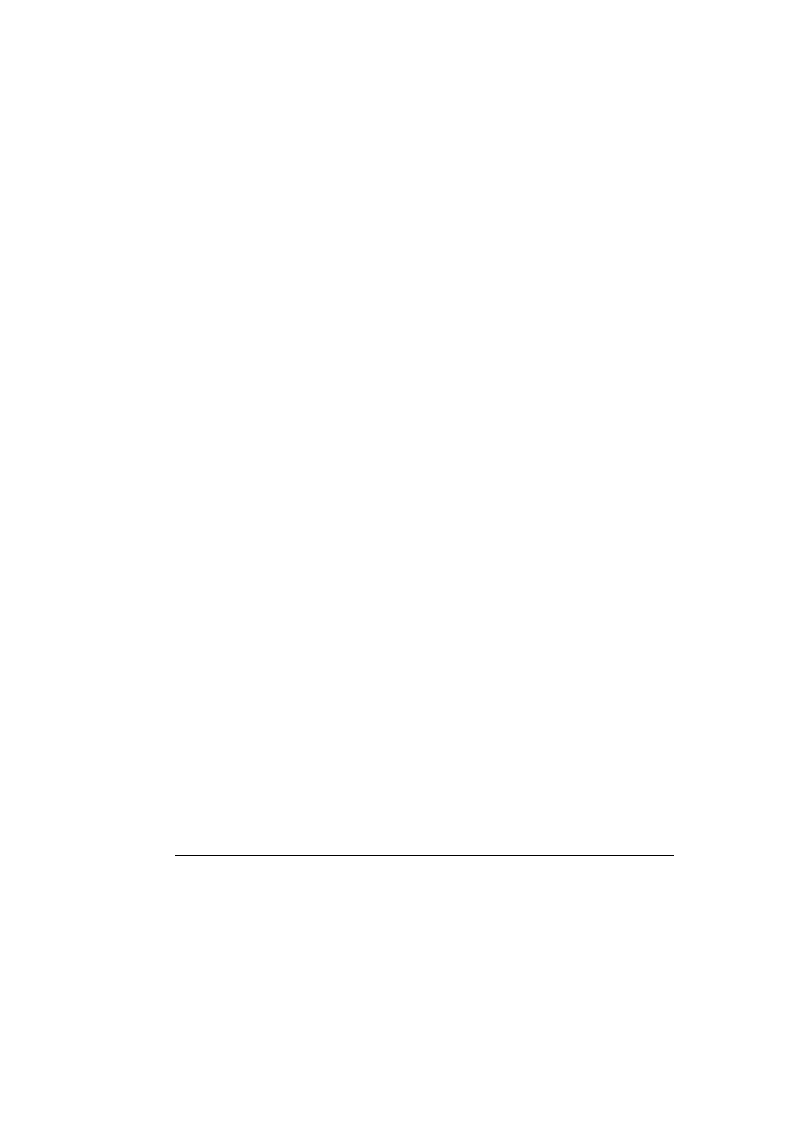
the urban shaman lay in the protest camps (MacLellan, 1995: 145),
while Harvey suggests that Eco-Paganism tests ''our understanding of
what ‘spirituality’ might mean''(Harvey, 1997b: 3). It is also apparent
that embodied knowing is particularly significant in Eco-Pagan
spirituality, as intuition and 'gut feelings' have priority over intellectual
approaches and understanding emerges from physical involvement.
Furthermore, Pagans sometimes experience the boundaries between
body and environment as fluid (Pike, 2001: 28 –29) and Eco-Pagan
spirituality is closely related to a sense of connection (inter alia,
Letcher, 2005; Plows, 2002: 166). However, research into the
relationship between embodied knowing and spirituality is lacking and
fails to explain why Eco-Pagans are more motivated than mainstream
Pagans. Existing research suggests that embodied cognition is
fundamental to these processes and that further investigation into its
distinctive role in Eco-Paganism will unearth more of its magic.
Chapter 3: Embodied Cognition Literature Review
Probably 95 percent of embodied thought is non-cognitive,
yet probably 95 percent of academic thought has concentrated
on the cognitive dimensions of the conscious 'I'.
(Thrift, 2000: 36).
Although western culture privileges rational self-conscious thought, we
intuitively know that our understanding is shaped by feelings that lie
beyond the realm of ‘objective knowledge’ and conscious cognition.
28

Extensive research concludes that these processes are in some sense
embodied. Although as yet there is no fully articulated epistemology of
embodied cognition, a consistent interdisciplinary model is emerging,
as researchers are apparently discussing the same phenomena from
disparate but consistent perspectives.
This chapter reviews the literature on embodied situated cognition in
order to contextualise my work and establish the grounds for
synthesising a coherent theory I can apply to my ethnography of Eco-
Paganism. Considering the perspectives of phenomenology,
anthropology, sociology, religious studies, cognitive neuroscience and
ecopsychology reveals an interdisciplinary consensus about embodied
situated cognition. Different disciplines repeat key themes: embodied
situated cognition is practical, pre-reflective, and blurs conventional
understandings of ‘self’ and ‘world’.
Embodiment and the Body
References to 'the body' are common, but the term 'embodied' is
generally to be preferred whenever we consider the phenomenological
condition of our being:
When we examine the body in everyday life, we might therefore
more accurately speak of a sociology of embodiment rather than
a sociology of the body (Nettleton and Watson, 1998: 4).
Csordas emphasises the fundamental point that:
If embodiment is an existential condition in which the body is
the subjective source or intersubjective ground of experience,
then studies under the rubric of embodiment are not 'about' the
body per se. Instead they are about culture and experience
insofar as these can be understood from the standpoint of bodily
being-in-the-world (Csordas, 1999: 143).
Although the term is complex, Thrift suggests that embodiment has
four fundamental characteristics, all of which are pertinent to this
review:
First, it has to be seen through Merleau-Ponty's notion of 'the
flesh', as a reversible and reflexive fold between subject and
object … Second, embodiment is practical … it is involved in a
relation with the world … Third, embodiment always involves
other objects … fourth, embodiment is expressive. That is, the
body is not just a passive surface on which society is inscribed
(Thrift, 1997: 139-140).
Embodied cognition is an expanding interdisciplinary topic, so the
29

boundaries set on this review must make it both cogent and
comprehensive. The pace of research makes any work before Polanyi
(1958) redundant, while to stay as current as practically possible I
reference The Cambridge Handbook of Situated Cognition (Aydede
and Robbins, in press), which is expected in 2008. I excluded work
about non-Western cultures because my thesis concerns Western Eco-
Pagans, and all my references are available in English. My focus on
embodied cognition in everyday life excluded research into its role in
teaching and learning. I also excluded physiology and
mind/brain/body biochemistry, because they lie beyond the notion of
embodiment set out above, and would add unnecessary complication.
PHENOMENOLOGY
While Erricker claims that it is "pointless to search for a strict
definition of phenomenology" (Erricker, 1999: 83), and cautions
against treating it as a distinct discipline (Erricker, 1999: 75), we can
identify certain fundamentals. Phenomenology is essentially the study
of phenomena, that is things as they appear in our lived experience
(Allen, 2005: 188) and Allen lists five characteristics; descriptive
nature, antireductionism, intentionality, bracketing and eidetic vision
(Allen, 2005: 188). Although phenomenology is not "merely
descriptive", and provides an important tool for understanding
(Bowman, 1992: 14), Erricker suggests its descriptive emphasis opens
phenomenology to accusations of "hermeneutical naivety" that are only
deflected by applying a theory of interpretation (Erricker, 1999: 82).
Antireductionism emerges from phenomenology's concern with the
richness of phenomena as experienced, while intentionality refers to
the way that all consciousness is "consciousness of something" (Allen,
2005: 189). If we are to attend to the phenomena itself, we must
recognise our assumptions and the "natural attitude" of everyday life
(Moran, 2002: 15), so that we can bracket them out of our
understanding. Such bracketing enables us to clarify our immediate
intuition of phenomena - our eidetic vision (Moran, 2002: 11-17).
Phenomenologically "[t]he body is primarily a way of being in the
world. It is a form of lived experience which is fluid and ever-shifting.
And it is also a way of interacting with one’s environment, of shaping it
and being shaped by it" (Cavallaro, 1998: 88). Cognitive
neuroscientists like Varela take the phenomenologists as their
philosophical precursors because they demonstrated how "knowledge
depends on being in a world that is inseparable from our bodies, our
language, and our social history - in short, from our embodiment "
(Varela et al., 1991: 149; author's emphasis). There is, therefore, a
common consensus that to understand embodiment we require
"a cultural phenomenology" (Csordas, 1999: 143).
Merleau-Ponty
30

Merleau-Ponty was fascinated by our 'being-in-the-world' - the way
our consciousness is incarnate in the world. Our awareness does not
emerge from a disembodied mind located somewhere outside the
physical, but is part of an active relationship between embodied
humans and the world:
The properties of the object and the intentions of the subject …
are not only intermingled; they also constitute a new whole
(Merleau-Ponty, 1963: 13).
Merleau-Ponty concluded that the process by which we come to
understand the world emerges from a unity between subjects and
objects that is the direct result of our embodiment. As he puts it, "[m]y
body is the fabric into which all objects are woven" (Merleau-Ponty,
1962: 273). Though his primary concern was with perception as an
embodied process, he understood our entire being-in-the-world in the
same way:
As I contemplate the blue of the sky … I abandon myself to it and
plunge into this mystery, it 'thinks itself within me,' I am the sky
itself as it is drawn together and unified, and as it begins to exist
for itself; my consciousness is saturated with this limitless blue
… (Merleau-Ponty, 1962: 249).
This practical, embodied knowing is quite different from the more
discursive knowledge we can talk about. Crucially, it is also an
interested knowing that is bound up with practical life. As Merleau-
Ponty puts it, this is a "knowledge in the hands, which is forthcoming
only when bodily effort is made, and cannot be formulated in
detachment from that effort" (Merleau-Ponty, 1962: 144). This upsets
the Cartesian world-view, because it is a form of knowing that
transcends subject/object dualism: The 'I' that knows is tangled with
what is known.
Abram
Abram applies Merleau-Ponty's work to develop an embodied
environmental philosophy which understands the body as "a sort of
open circuit that completes itself only in things, in others, in the
encompassing earth" (Abram, 1996: 62). Abram claims that
[e]ach place has its own mind, its own psyche. Oak, madrone,
Douglas fir, red-tailed hawk, serpentine in the sandstone, a
certain scale to the topography, drenching rains in the winter,
fog off-shore in the winter, salmon surging in the streams - all
these together make up a particular state of mind, a place-
specific intelligence shared by all the humans that dwell
therein ... (Abram, 1996: 262).
31

Thus our immediate environment influences our thinking:
A large boulder, its surface spreading with crinkly red and grey
lichens, is able to influence the events around it, and even to
influence the thinking of those folks who lean against it - lending
their thoughts a certain gravity, and a kind of stony wisdom
(Abram, 2004).
Abram asserts that oral cultures are fully aware that we are
"corporeally embedded" in a "living landscape" (Abram, 1996: 65), but
anyone can experience this reality under certain circumstances. He
explains how his fieldwork experiences shifted his senses so that he
began to perceive the world in a new way:
When a magician spoke of a power or "presence" lingering in the
corner of his house, I learned to notice the ray of sunlight that
was then pouring through a chink in the roof, illuminating a
column of drifting dust, and to realize that that column of light
was indeed a power ... influencing the whole mood of the room;
although I had not consciously seen it before, it had already been
structuring my experience (Abram, 1996: 20).
This experience revealed to him that perception is participatory in that
it always involves "the experience of an active interplay, or coupling,
between the perceiving body and that which it perceives" (Abram,
1996: 57).
Gendlin
Gendlin often expresses the idea that many things are, in a special
sense, 'implied' in a situation with five dots, ".....". To make this
specific use clear, I shall write this as ". . . . ." to distinguish it from the
more conventional "..." which designates the removal of a section of
text.
Gendlin develops Merleau-Ponty's ideas to show how interaction is
more fundamental than perception: Our perceptions function as part
of our interaction with the world and so become part of how we behave
in any given situation. The "body senses the whole situation, and it
urges, it implicitly shapes our next action. It senses itself living-in its
whole context - the situation" (Gendlin, 1992: 345). This bodily
interaction opens us to a sense of the world beyond what we
conventionally call perception. Gendlin explains this by inviting us to
consider an imaginary scenario. Imagine you're alone walking along an
unknown street late one night and you become aware of a group
following you. Your "body-sense" of the situation is much more than
your perceiving them behind you; it includes "your hope that perhaps
they aren't following you, also your alarm, and many past experiences -
too many to separate out, and surely also the need to do something -
32

walk faster, change your course, escape into a house, get ready to fight,
run, shout . . . . ." (Gendlin, 1992: 346). The ". . . . ." can encompass
"more than we can list" including perceptions and emotions, but also
memories of past situations and options of what to do next. There is
nothing mysterious about this intricate "body-sense", and in fact it
grounds our conscious awareness. In everyday language we lack a
language to name it, but in the therapeutic practice of Focusing it is
called the 'felt sense'10 where it describes an embodied tacit knowing
that Gendlin describes as "a special kind of internal bodily awareness
… a body-sense of meaning" (Gendlin, 1981: 10).
The 'knowing' of the felt sense may not be immediately apparent, and
may in some way contradict our more 'rational' understanding of a
situation. Continuing to explore the scenario outlined above, Gendlin
invites us to imagine we are with a friend who has a lot of experience of
the district, and who thinks you should turn the next corner and enter
the nearest house, but at the same time confides that "the idea makes
her body feel intensely uneasy" though she can't think why (Gendlin,
1992: 348). Gendlin suggest that you would be unlikely to ignore your
friend's feeling, which is a felt-sense. It is immediately clear from such
experiences that "body and cognition are not just split apart" (Gendlin,
1997: 181), and Gendlin echoes Polanyi’s famous comment when he
writes that “your body knows much that you don’t know” (Gendlin,
1981: 39). The conscious mind doesn't usually articulate a felt sense
immediately, and indeed, may never do so. How easily people access
the felt sense varies considerably, as shown by the Experiencing Scale
(Gendlin, 1961: 243) developed by Gendlin and colleagues, but anyone
can learn to access and verbalise the embodied knowing of the felt
sense using the Focusing technique (Gendlin, 1981).
Although Gendlin describes the felt sense as a "bodily sensed
knowledge" (Gendlin, 1981: 25), we need to be clear that his approach
requires "a new conception of the living body" as a process by which
"the body means or implies" (Gendlin 1997: 19) and - in common with
other thinkers discussed here - the Gendlian 'body' extends beyond the
skin. For Gendlin 'the body' "is a vastly larger system" (Gendlin, 1997:
26) such that the felt sense is the entire situation (Gendlin, 1992). Yet
the felt sense is "a physical sense of meaning" (Gendlin, 1981: 69) with
"a BODILY quality, like heavy, sticky, jumpy, fluttery, tight" (Gendlin,
1986: 53; author's emphasis). Obviously there are bodily sensations
that are not meaningful (Gendlin, 1981: 69), but in practice it becomes
quite clear what Gendlin is referring to.
Although Gendlin doesn't discuss how Focusing might relate to
spirituality, Fisher touches on the connection (2002: 101), while
Campbell and McMahon established the Institute for Bio-Spiritual
10 Gendlin usually uses the term 'body-sense' in his philosophy and 'felt-sense' in his
psychotherapeutic work. Although these contexts mean they can sometimes be read as
subtly different, I treat them as equivalent.
33

Research to explore the relationship (Campbell and McMahon, 1985).
ANTHROPOLOGY
Bateson
Bateson's notion that “the mental world - the mind - the world of
information processing - is not limited by the skin” (Bateson, 2000
[1972]: 460), has been highly influential on discussions of embodied
cognition, notably in Burkitt, Greenwood and Ingold. Bateson's key
insight here was that
[t]he individual mind is immanent but not only in the body. It is
also immanent in pathways and messages outside the body; and
there is a larger Mind of which the individual mind is only a
subsystem (Bateson, 2000 [1972]: 467).
If "Mind" refers to a cybernetic system of patterned information, then
it becomes difficult - or even nonsensical - to try to specify where an
individual mind begins. Bateson imagines he is a "blind man" using a
stick as a guide, and asks:
where do I start? Is my mental system bounded at the handle of
the stick? ... Does it start at the tip of the stick? (Bateson, 2000
[1972]: 465).
Bateson concludes that these are "nonsense questions" (Bateson, 2000
[1972]: 465), a prescient understanding confirmed by cognitive
science.
Ingold
Ingold perceives a dualism in Bateson (Ingold, 2000: 16) and applies
Hallowell's study of the Ojibwa to move beyond dichotomy:
For the Ojibwa, knowledge is grounded in experience,
understood as a coupling of the movement of one's awareness to
the movement of aspects of the world. Experience, in this
sense, does not mediate between mind and nature, since these
are not separated in the first place (Ingold, 2000: 11).
This “poetics of dwelling” is grounded in a relational notion of
personhood where the self inheres “in the unfolding of the relations set
up by virtue of its positioning in an environment” (Ingold, 2000: 11).
In this fully embodied ecology the organism integrates with its
environment: “ 'organism plus environment' should denote not a
compound of two things, but one indivisible totality” (Ingold, 2000: 9).
Body and mind are thus simply different ways of describing the same
process, “namely the environmentally situated activity of the
human organism-person” (Ingold, 2000: 171). This mode of being-in-
the-world engenders a knowledge Ingold calls ‘sentient ecology’
34

(Ingold, 2000: 116-17) that is grounded in “practical application” and
“based in feeling, consisting in the skills, sensitivities and orientations
that have developed through long experience of conducting one's life in
a particular environment”. Ingold suggests that this is simply another
word for “intuition” (Ingold, 2000: 25), but he clearly refers to the
situated, practical and tacit embodied knowing consistently discussed
in this review.
Csordas
Csordas defines "somatic modes of attention" as "culturally elaborated
ways of attending to and with one's body in surroundings that include
the embodied presence of others" (Csordas, 1993: 138). Because we are
"always already in the world", we cannot attend to a bodily sensation
without simultaneously attending "to the intersubjective milieu that
gives rise to that sensation", and thus the sensation "can tell us
something about the world and others who surround us" (Csordas,
1993: 138-39). There is a clear parallel with Gendlin's description of
how the "body senses the whole situation" (Gendlin, 1992: 345), and
Csordas's 'somatic modes of attention' and Gendlin's 'felt sense'
describe overlapping phenomena. Gendlin's felt sense is "a special kind
of internal bodily awareness … a body-sense of meaning" (Gendlin,
1981: 10), or what Csordas calls "bodily sensation". Furthermore,
because we learn to understand its meaning when using Gendlin's
Focusing approach, the felt sense is also "culturally elaborated".
The key difference between 'somatic modes of attention' and the 'felt
sense' lies in the theoretical development of each term. Csordas is
primarily descriptive: He describes the situations where somatic
modes of attention occur, but fails to offer the kind of sophisticated
theoretical underpinning provided by Gendlin (inter alia, Gendlin
1996). Furthermore, because Csordas is not concerned with the
therapeutic potential of bodily ways of knowing, he has no equivalent
to Gendlin's Focusing procedure.
Syme
Syme explains that deep cultural "knowings" in Scottish/Irish Gaelic
speaking cultures are grounded in "bodily" knowledges, which are:
what one feels in one’s body, the psychic mediumship of
particular individuals within the community and the oral
tradition (Syme, 1997: 206).
There are correlations with theoretical approaches already reviewed,
most notably her description of how the body learns. Syme poetically
recalls how as a child she came to learn her mother's knowing:
"I know" my heart said. She’s speaking to me … voice of baking
bread, voice of heartbeat, voice of early morning gardener, voice
of rocking arms, tapping feet, voice of stirring pots of food to the
35

left, to the right, turn the teapot three times, once for your self,
once for the culture, once for the world. My body finally knows
my mother’s voice. No words. Not one word between us (Syme,
1997: 212).
It was her mother's physical activity that taught her a situated,
embodied knowing. She compares this experiential mode of knowing
with learning Balinese dance:
if you want to learn the dance I, the teacher must physically
move your body. I turn your hand up, your foot out, your head to
the left until you know. In the Gaelic, tap, tap, tap; stir, stir, stir;
beat, beat beat; cake, babies, fishing nets, pounding cloth, think
rhythm; think, feel, touch rhythm; repeat … (Syme, 1997: 214).
As a result of honouring this "alternative epistemic … we ourselves
become more … We come to know that we are part of, that we belong"
(Syme, 1997: 216). This sense of a embodied deep connection to a
specific place is particularity relevant to the emerging field of
ecopsychology, discussed below.
Tacit and Explicit Knowing
Polanyi
Like Gendlin, Polanyi concluded that “we know more than we can tell”
(Polanyi, 1966: 4), referring to a tacit knowledge which is experiential
and cannot be made explicit (Polanyi, 1958). This distinction between
explicit and tacit knowledge is fundamental to the work of several key
researchers (inter alia, Polanyi; Nonaka & Takeuchi). Explicit
knowledge is variously called ‘propositional knowledge’, “embrained
knowledge” (Quintas & Ray et al., 2001: 27), “knowledge that” (Ryle,
1949) and “knowledge about” (James, 1950). It is usually abstract and
can be expressed formally in “words and numbers, scientific formulae,
codified procedures or universal principles” (Quintas & Jones, 2002:
47). Nonaka & Takeuchi describe tacit knowledge as:
not easily visible and expressible. Tacit knowledge is personal,
context-specific and hard to formalize and
communicate ... Subjective insights, intuitions and hunches fall
into this category (Nonaka & Takeuchi, 1995: 56 and 75).
Tacit knowledge is fundamentally practical, situated and emotionally
charged, and skills held as tacit knowledge are taught through
observation, imitation, and practice (Nonaka, 1994: 19). Quintas & Ray
et al. note that “[t]he mere transfer of information will often make little
sense, if it is abstracted from associated emotions and specific contexts
in which shared experiences are embedded” (Quintas & Ray et al.,
2001: 47 – 48). I therefore conclude that tacit knowledge is embodied
36

and situated.
Several researchers suggest that metaphor and analogy can be used to
work with tacit knowledge, which is significant in the light of the work
of Lakoff and Johnson (1999), considered below. Nonaka & Takeuchi
(1995) propose that metaphor and analogy “might enable colleagues
to share, amplify and reinforce explicit representations of what
had previously been tacit” (Quintas & Ray et al. 2001:47 after Nonaka
& Takeuchi, 1995).
SOCIOLOGICAL PERSPECTIVES
Several sociologists opine that a form of embodied tacit knowledge
underpins social interactions. Games are a good example of how this
might work. The rules of the game, strategies and complex physical
movements combine in ways that mean a footballer often has no time
to think thorough how to play: They must feel the game 'in their bones'.
The principles of the game are embodied, and the full meaning can
only be expressed in actions. Bourdieu, Foucault and Mauss all discuss
these ‘techniques of the body’. Although Foucault doesn't explicitly
explore notions of embodied knowledge in depth, the concept runs
through his work. Given Foucault's belief that power and knowledge
"[d]irectly imply one another" (Foucault, 1977: 27), the process by
which power inscribes itself onto the body can be described as a form
of embodied knowledge (Foucault, 1980).
Bourdieu
Bourdieu describes a form of embodied knowledge called habitus (after
Mauss, 1979). Habitus is a set of dispositions that the body learns and
can use given the right social context. Because our social relationships
create habitus, it is bound up with relations of power: How a class or
group stand and move provides a social understanding of who they are.
Bourdieu calls these characteristic ways of holding the body and
gesturing the hexis, “[a] way of walking, a tilt of the head, facial
expressions, ways of sitting and of using implements” (Bourdieu, 1977:
87). The hexis is expressed in activity as habitus. The result is a
powerful technique of the body:
Bodily hexis is political mythology realised, em-bodied, turned
into a permanent disposition, a durable manner of standing,
speaking and thereby of feeling and thinking (Bourdieu, 1977:
93; author’s emphasis).
Our behaviour is not determined by this system, but rather it provides
a practical sense that inclines us towards one behaviour rather than
another. It is a way of being-in-the-world rather than a considered
reflection, and so it operates at a level that is at least partly
unconscious. The beliefs that order our behaviour are not states of
37

mind but rather “states of body”, "instilled by the childhood learning
that treats the body as a living memory pad". These states, Bourdieu
claims, operate through generating "countless practical metaphors"
(Bourdieu, 1990: 68-69). The embodied cultural knowledge of habitus
only exists in practical activity, so the concept entirely concurs with the
consensus understanding emerging from this review of embodied
cognition as tacit, practical and rooted in the body.
Bourdieu tends to emphasise the controlling aspect of habitus, but it
can be understood as enabling. Jackson claims that changes in "the
unitary field of body-mind-habitus" can free "energies bound up in
habitual deformations of posture or movement" and thus "produce an
altered sense of self" (Jackson, 2006: 328). For Syme the “internal
knowledge” of belonging, which is the practical sense of the habitus by
another name, is founded in a connection to both human physicality
and to the earth - more specifically “to the particular history of the
land” (Syme, 1997: 208). Trusting such inner knowledge “provides a
platform for staying “connected” or in touch with one’s Self” which
“contributes to a sense of psychological integrity and wholeness …”
(Syme, 1997: 207).
Burkitt
Burkitt claims that “[a]ll knowledge is embodied and situated, created
within that fundamental unity between subjects and objects which
is the product of having an active body” (Burkitt, 1999: 74). As we have
seen, many others come to similar conclusions, but his key insight is
that the development of cultural artifacts enabled new ways of thinking
through the emergence of extended thinking bodies (Burkitt, 1999:
26). Extended thinking is not confined to the body within the skin, but
is inseparable from the social and material contexts in which it takes
place (Burkitt, 1999: 3). Burkitt references Mauss (Mauss, 1979), and
there are clear resonances with the work of Foucault and Bourdieu, all
of whom agree that techniques of the body can shift subjectivity. As
Burkitt says:
[o]ur way of 'being-in-the-world', of acting, knowing and
thinking, is largely dependent on artifacts and how they re-form
embodiment (Burkitt, 1999: 36).
Burkitt agrees with Bateson’s central insight – echoed by many other
thinkers in this review - that we are always and already engaged in the
world. Like Bateson, he concludes that “mind is itself immanent in the
ecosystem, as a sensitivity to everything with which it is related, and as
an ability to orient itself within those relations” (Burkitt, 1999: 69).
Although Burkitt notes “the meaningful relationship of humans to the
nonhuman world”, (Burkitt 1999: 72), his work remains focused on
“artifacts, quasi-objects and mediating tools” (Burkitt, 1999: 73), so
fails to consider the potential of intimate engagement with that
38

nonhuman world.
RELIGIOUS STUDIES
Greenwood
Greenwood's "magical consciousness", which she describes an
"informal way of knowing" (Greenwood, 2005: 15), is reminiscent of
the participatory perception which Abram's describes (Abram, 1996:
20) in that it is a "participatory and expanded aspect of consciousness"
(Greenwood, 2005: viii). Greenwood gives various descriptions of
magical consciousness as "a heightened awareness of an expanded
connected wholeness" (Greenwood, 2005: 47), an altered or
"shamanic" state of consciousness, or a perception of "non-ordinary
reality". Magical consciousness is usually induced though a technique
like dancing or drumming (Greenwood, 2005: 89), but simple
"participation with nature may bring an expanded awareness of the
deep connections between elements of nature" (Greenwood, 2005: 46).
Greenwood draws mainly on Bateson's notion of an ecology of mind to
theorise how magical consciousness operates, and her work remains
essentially an anthropology of "magic and consciousness" (Greenwood,
2005: vii) that ignores wider dimensions.
Ritual Studies
Bell claims that ritual is a “bodily strategy that produces an incarnate
means of knowing” (Bell, 1992: 163), while Grimes (Grimes, 1995)
makes the provocative suggestion that ritual is a bodily way of knowing
designed to move consciousness from the head to the body. Though
Grimes doesn’t elucidate, Asad applies Mauss's notion of the habitus to
problematize the distinction between religious ritual and more general
bodily practices. Asad concludes that the role of ritual is not to express
a symbolic meaning but to influence habitus, thereby helping to create
district subjectivities (Asad, 1993: 131). Crossley makes a similar
argument that rituals “are a form of embodied practical
reason” (Crossley, 2004: 31). Drawing primarily on the work Mauss,
Merleau-Ponty and Bourdieu, he concludes that rituals are “body
techniques”, that is to say “forms of practical and pre-reflective
knowledge and understanding” (Crossley, 2004: 37). As such they can
“effect social transformations” through transforming our “subjective
and intersubjective states” (Crossley, 2004: 40).
COGNITIVE NEUROSCIENCE11
Peterson provides a valuable study of the significance of cognitive
neuroscience for theology and concludes that:
Our 'spirit,' however we may define that, emerges out of the
11 I include two philosophers (Clark and Preston) in this section of my review who, though not
cognitive neuroscientists, base their theories largely on work within the field.
39

activities of the mind/brain, which in turn are intimately
connected to the body. A spiritual transformation, therefore, is
in some sense also a biological one (Peterson, 2003: 94).
Until recently the dominant scientific model for human cognition was
the symbol-processing, cognitivist model of the mind/brain as like a
computer processing data (Bredo, 1994: 86 -87). Although in
dominance for a quarter of a century, this approach failed to make
progress, mainly because it "had moved too far from biological
inspirations" (Varela et al., 1991: 86 -87).
Two philosophical assumptions underpin the cognitivist approach:
First, it is profoundly dualistic, assuming a split between language and
reality, mind and body (Bredo, 1994). Second, it relies on a belief in
“representationalism”, a philosophical stance notably critiqued by
Rorty (Rorty, 1979). As a result, much of the older material in cognitive
neuroscience retains a dualistic taint and there is often an assumption
that the mind/brain/body remains somehow separate from the wider
environment.
However, ‘second-generation’ cognitive neuroscience “begins with the
realization that the body … grounds and shapes human cognition”
(Rohrer, 2007: 21 – 22), and provides “a wealth of converging evidence
from various empirical disciplines that shows how our conceptual
systems … are grounded in patterns of bodily activity” (Johnson, 1999:
85). This approach, emboldened by the success of an embodied
strategy to artificial intelligence research12, can be usefully described as
an “embodied cognitive science”. Although I discuss key aspects of the
theory in detail below, one conclusion is consistent: "human cognition
is fundamentally shaped by embodied experience" (Gibbs, 2006: 3). In
their extensive discussion of the evidence for "embodied theories of
knowledge", Barsalou et al. draw on evidence from cognitive
neuroscience, social psychology and cognitive psychology to conclude
that if the argument between embodied and symbol-processing
(representationalist) theories of cognition "were to be decided on
purely empirical grounds at this point in time ... there would be no
contest" and the embodied approach would triumph (Barsalou et al.,
2005: 25). Niedenthal and colleagues likewise conclude that "[i]n sum,
accumulating evidence from cognitive psychology and cognitive
neuroscience supports embodiment theories of knowledge"
(Niedenthal, et al., 2005: 188).
Enactivism
Varela and colleagues build on Merleau-Ponty's work to develop a
model of cognition as "embodied action", a process they call "enactive"
(Varela et al., 1991: xx). They concur with the principle above that
12 See, for example the work of Brooks, 1999
40

cognition is embodied and factor in the wider "biological,
psychological, and cultural context" (Varela et al., 1991: 173). By
emphasizing action they highlight that cognition is an aspect of the
sensory body (Varela et al., 1991: xx) and that “knower and known,
mind and world, stand in relation to each other through mutual
specification or dependent coorigination” (Varela et al., 1991: 150). The
enactive approach to cognition “is based on situated, embodied agents”
(Varela, 2001: 215) and explicitly rejects representationalism,
bypassing the "logical geography of inner versus outer” by
understanding cognition as embedded in a total “biological/
psychological, and cultural context” (Varela et al., 1991: 172-173). They
conclude that “organism and environment enfold into each other and
unfold from one another in the fundamental circularity that is life
itself” (Varela et al., 1991: 217).
Varela presents four "fundamental insights" of enactivism which he
claims to be "established results" (Varela, 1999: 71). The first
fundamental is that the mind is embodied and therefore "[t]he mind is
not in the head" (Varela, 1999: 72; author's emphasis) and what we
conventionally think of a 'subject' and 'object' are co-arising. Because
the mind is embodied and arises out of "an active handling and coping
with the world", then "whatever you call an object ... is entirely
dependent on this constant sensory motor handling". As a result an
object is not independently 'out there', but "arises because of your
activity, so, in fact, you and the object are co-emerging, co-arising"
(Varela, 1999: 71-72). The mind "cannot be separated from the entire
organism" (Varela, 1999: 73; author's emphasis) or the "outside
environment" (Varela, 1999: 74). Varela's second point focuses on the
emergence of complex cognitive processes from much simpler sub-
systems. The global process of cognition emerges from a huge number
of simple interactions between "neural components and circuits"
(Varela, 1999: 76). The relationship between local and global processes
creates a "two-way street"; just as simple systems give rise to the
complexity of conciousness, so what we consciously think impacts
those local components (Varela, 1999: 76). From this stance it is no
surprise that Varela introduces intersubjectivity, though he notes that
this area is "not well charted yet". Our everyday assumption -
reinforced by older "cognitive and brain science" - is that "a mind
belongs inside a brain, and hence that the other's mind is impenetrable
and opaque". However, he claims that recent research shows "that
individuality and intersubjectivity are not in opposition, but
necessarily complementary" (Varela, 1999: 79). Varela points to
consistent evidence that "all cognitive phenomena are also emotional-
affective" and that affect is a "pre-verbal" and "pre-reflective dynamic
in self-constitution of the self". Thus our pre-reflective sense of self is
"inseparable from the presence of others" (Varela, 1999: 80-81).
Varela's final point is "far less consensual than the preceding ones" and
concerns issues of the philosophy of a "neurophenomenology" that lie
41

beyond the scope of this review (Varela, 1999: 82; author's emphasis).
Johnson's pursuit of the enactivist approach leads him to conclude that
the way we conceptualize and reason depends on "the kinds of bodies
we have, the kinds of environments we inhabit, and the symbolic
systems we inherit, which are themselves grounded in our
embodiment” (Johnson, 1987: 99) In short, reason is embodied
(Johnson, 1987:100) and grounded in an environment that includes
"our history, culture, language, institutions, theories, and so forth"
(Johnson, 1987: 207).
Both Csordas and Gendlin suggest that Johnson's cognitive approach
fails to engage with our existential being-in-the-world. Csordas claims
that Johnson misses the phenomenological dimensions of
embodiment, and comments in a footnote that he is concerned
with”the body as existential ground of culture" whereas Johnson
(1987) "analyses the body as cognitive ground of culture" (Csordas,
2002: 289, fn#2). Gendlin writes that he and Johnson are engaged in a
"friendly discussion" but criticizes Johnson's emphasis on "spatial
movements" rather than considering the priority of the body "living-in
its environmental situation" (Gendlin, 1997c: 169; author's emphasis).
Csordas and Gendlin's criticisms are not directed at enactivism per se,
but at Johnson's particular approach. In fact the core conclusions of
enactivism - that key aspects of cognition are embodied, situated and
grounded in practical activity - are widely accepted within cognitive
science, and we see correlations with the work of Clark, Damasio,
Merleau-Ponty and many others in this review.
Johnson joined cognitive linguistics researcher Lakoff to develop a
theory of language and reasoning based on embodied metaphors. They
claim that we reason using metaphorical concepts that are based on
our embodied experiences. The way we use the metaphor 'more is up'
provides a simple example: Because in health we stand up and sickness
brings us down, we tend to think metaphorically of 'more' as being 'up'
('price rises') and less as down ('stocks plummeting'). These conceptual
metaphors are learnt, and can be expressed in grammar, gesture, art or
ritual. Lakoff and Johnson conclude that "[b]ecause our ideas are
framed in terms of our unconscious embodied conceptual systems,
truth and knowledge depend on embodied understanding" (Lakoff &
Johnson, 1999: 555). Their conclusions lead them to propose an
ecological, embodied spirituality that recognises that the
“[e]nvironment is not an 'other' to us … it is part of our being" (Lakoff
& Johnson, 1999: 566).
Steen (Steen, 2000) is critical of Lakoff and Johnson's approach
because they rely so much on linguistic evidence and so, he claims, fail
to account for the deeper complexity of thinking. I conclude that
Gendlin's work, which correlates with that of Csordas in many ways,
42

currently goes deeper into pre-conceptual and extra-verbal experience,
and provides a fuller account of the relationship between language and
thought than either Johnson or his joint project with Lakoff. However,
embodied metaphor theory is not incompatible with Gendlin's
approach, and Gendlin values Johnson's "beautiful work" on metaphor
(Gendlin, 1997c: 174), suggesting they could "cooperate in a 'third
generation' cognitive science" (Gendlin, 1997c: 169).
Despite these criticisms, Lakoff and Johnson's work has potential and
others have already developed it. According to their original model we
primarily use embodied metaphors as the source to makes sense of a
target domain beyond the body. The process is one-way – the
embodied source to the conceptual target. Other theorists, notably
Faucounier and Turner (1995: 2002), argue for greater feedback
between target and source and propose a more sophisticated theory,
“conceptual blending”. This recognizes the frequent situations where
we blend an embodied cognitive metaphor with cultural, emotional
and conceptual elements. Imagine, for example, that "you are watching
the rain fall, responding emotionally and intellectually to what you
see". We cognitively blend different ways of relating to such an
experience, "a film version, a sketch of the rain, a verbal description",
and these are "all connected by vital relations" (Turner, M, 2006: 17).
Emotion
According to Depraz and Gallagher, the "leading hypothesis" is that
emotions are "inextricable from every mental act" (Depraz & Gallagher,
2003: 8), and Damasio presents the most developed theory of the role
of emotion in cognition. Damasio claims that most of our decision
making needs to be made quickly, so is accomplished by "body-
related ... somatic-marker[s]" (Damasio, 2003: 148) which make
emotion and feeling "indispensable" to the process of reasoning
(Damasio, 2003: 145). Because we retain the knowledge of how
previous responses impacted on our lives, we revive the "emotional
signals" associated with those circumstances when a new situation
arises (Damasio, 2003: 147). We are sometimes aware of this process,
as for example when we get a "gut feeling" about something (Damasio,
2003: 147), but somatic markers also operate outside awareness
producing "alterations in working memory, attention, and reasoning"
(Damasio, 2003: 148). Damasio's theory is supported by "substantial
evidence" (Damasio, 2003: 149) and correlates with Gendlin's notion
of the felt sense.
Embodied Situated Cognition
Philosopher Clark draws on the insights of cognitive neuroscience to
answer a question that is central to this review: “Where Does the Mind
Stop and the Rest of the World Begin?” (Clark, 1977: 213). He
concludes that “extra-bodily resources constitute important parts of
43

extended computational and cognitive processes”, and in some cases
this “seepage of the mind into the world” challenges western notions of
self. Clark follows Bateson in concluding that what we normally accept
as "mental processes" extend beyond the "skin bag" into the local
environment (Clark, 1977: 214). Clark avoids claims about the
self/other boundary and does not suggest that “individual
consciousness extends outside the head”, but concludes that what we
refer to as mind is much more widely extended than the brain, and can
“encompass a variety of external props and aids” (Clark, 1977: 215).
This process, which Clark calls “robust cognitive extension” only occurs
in special cases where “the relationship between user and artifact is
about as close and intimate as that between the spider and the web”
(Clark, 1977: 218). However, “beliefs, knowledge, and perhaps other
mental states" sometimes depend on "aspects of the local
environment” creating “hybrid entities” made up of “brains, bodies,
and a wide variety of external structures and processes” (Clark, 1977:
218).
Such conclusions are widespread13: In his survey of the field Peterson
notes that for a “significant number of researchers … to understand the
mind/brain in isolation from biological and environmental contexts is
to understand nothing” (Peterson, 2003: 43). Theories of cognition
beyond the ‘skin bag’ have spawned a new approach in cognitive
science called “Embodied Situated Cognition” (ESC). Although ESC
emerged from artificial intelligence research, it has become an
interdisciplinary field enabling advances in psychology, philosophy of
mind and social interaction theory (Almeida e Costa and Rocha, 2005).
Evidence from neuroethology14 supports the ESC approach: MacIver
rejects what he calls ‘craniocentricism’ - the idea that what is really
important is what goes on inside the skull - and concludes that the
complex behaviour of organisms arises out of “a tight interplay of body,
brain, and environment” (MacIver, forthcoming, 2008: 25). For these
researchers embodiment means “the body-in-space, the body as it
interacts with the physical and social environment” and they conclude
that it ”is not just that the body shapes the embodied mind, but that
the experiences of the body-in-the-world also shape the embodied
mind” (Rohrer, 2007: 5).
Embodiment and Space
Preston applies ESC to environmental philosophy by claiming that
"part of the feeling of attachment to place is quite literally an
attachment of a portion of our cognitive architecture to the lands we
inhabit" (Preston, 2003: xv). Preston recounts an experience the
anthropologist Basso had with a Western Apache cattleman named
13 Brothers usefully describes this approach as “externalism … the idea that the mind is not “in
the head” but in the individual's embodied interactions in the world”
(Brothers 2005).
14 Neuroethology is a field that describes "animal behavior in terms of how the nervous system
works". International Society for Neuroethology http://www.neuroethology.org/
44

Dudley Patterson, who explained that particular places on tribal lands
held a wisdom that could not "be grasped purely cognitively".
Patterson needed to take Basso on horseback to these places of wisdom
for him to "experience the places with his body", because "[t]he
topography of the land had to filter through his limbs, the smell of the
vegetation had to permeate his clothes, and the sweat created by the
struggle of getting there had to drip from his body onto the ground"
(Preston, 2003: 83). Culture is a key factor in this process, but Preston
concludes that "[t]he physical environment is not just a site in which
mind operates; it is a characterful place that influences the products of
the mind" (Preston, 2003: 88).
Preston illustrates his argument with his own experiences, that echo
those of Abram, above. Preston spent one summer volunteering for the
National Park service in Alaska and found that the place "played itself
out on my body and made its way into my body". As a result his "being-
in-the-world ... took on a local character". This change took just two
months, and Preston wonders how much greater the change might
have been if he had lived there for years (Preston, 2003: 92). Although
he adds that such dramatic examples are rare (Preston, 2003: 97), he
emphasizes his key point that "people craft some of their very cognitive
identity in communion with a landscape" (Preston, 2003: 100).
ECOPSYCHOLOGY
The Wilderness Effect
Ecopsychology is a new and "diverse field committed to placing human
psychology into an ecological context", that proposes that the mind is
"tangled up with" the natural world. (Fisher, 2005: 557-558). Perhaps
the best established theory of ecopsychology is the 'wilderness effect’
which Greenway claims is "increasingly accepted as a given"
(Greenway, 1995: 128). There are several aspects to the wilderness
effect, but fundamentally it involves “feelings of expansion or
reconnection” which Greenway unhesitatingly describes as “spiritual”
(Greenway, 1995: 128), and current research into the effect concurs:
Davis reports that regularly "being and becoming in nature" over a long
period of time becomes a form of ritual, “a potent spiritual practice"
(Davis, 1998: 95). Baetz opines these kinds of experiences can "bring a
spiritual and emotional (even a mystical) component not just to our
personal lives, but to the modern environment movement as well"
(Baetz, 1998: 3). Key concluded that "[t]here are so many examples" of
spiritual experiences catalysed by wilderness "that it is almost ironic to
seek to validate these kinds of experience when they are the basis of so
many religions, traditions and forms of art" (Key, 2003: 65).
The wilderness effect is most apparent during ‘wilderness’ 15 treks
15 Inevitably, I need to refer to ‘wilderness’ by which I mean open outdoor spaces with (at
45

lasting for more than a week 16, but ecopsychologists generally agree
that “simply spending meaningful time communing with nature”
(Shaw, 2006) is beneficial, and the full effect is a difference of degree
rather than a difference in kind. Greenway agrees that there is “a
gradient of the ‘wilderness effect’ - ranging from ‘none’ (no effect) to a
complete blowout of one’s usual programs for processing reality”
(Greenway, 1995: 132).
l Greenway (1995: 128-129) provides a list of key aspects of the
wilderness effect (cited by 60% of participants or more):
l 90% "described an increased sense of aliveness, well-being, and
energy"
l 90% "stated that the experience allowed them break an
addiction";
l 77% "described a major life change upon return";
l 60% of the men and 20% of the women "stated that a major goal
of the trip was to conquer fear, challenge themselves, and
expand limits";
l 60% "stated that they had adopted at least one ritual or
contemplative practice learned on the trip";
l 92% "cited 'alone time' as the single most important experience
of the trip";
l 73% cited "getting up before dawn and climbing a ridge or peak
in order to greet the sun ... as the second most important
experience of the trip".
l 80% cited " '[c]ommunity' or the fellowship of the group ... as
the third most important experience";
l 76% of all participants reported "dramatic changes in quantity,
vividness, and context of dreams".
He concludes that we are witnessing a profoundly shifted consciousness
"writ vividly on the psyches of those experiencing extended stays 'away
from cultural reinforcement' and 'vulnerable' to the natural dynamics of
wilderness" (Greenway, 1995: 130).
Explanations
Various theories have attempted to explain this shift, with some
emphasising sensory acuity while others suggest an awakened innate
understanding. Roszak postulates a largely dormant “ecological
unconscious” (Roszak, 1992) which can be awakened, while Wilson’s
'biophilia hypothesis' claims that we have an inbuilt affiliation for nature
(Wilson, 1975). Cohen (Cohen, 1995) estimates that people in western
civilisation spend “over 95 percent of their lives indoors, cloistered from
nature", and concludes that this lack of sensory contact results in our
least) minimal management of flora and fauna.
16 Most of those studied by Greenway lasted for two weeks, although some were for three or
four weeks long. Greenway, 1995: 124. Later studies have been made of 7 day excursions
(Fredrickson, L. and Anderson, D., 1999).
46

common disconnection from ‘nature’17. Sewall suggests that for many
people perception has been dulled (Sewall, 1995) – a point also made by
Harper (Harper, 1995: 189) - and they have thus lost connection with their
environment. Research by McDonald and Schreyer (McDonald and
Schreyer, 1991) and Beck (Beck 1987) conclude that the wilderness
experience enhances sensory acuity, so supports this explanation.
Fredrickson and Anderson's research illustrated the importance of the
"social dynamics between group members", which "played a large part in
interpreting the wilderness place setting as spiritually inspirational". They
emphasize that though their participants experienced the organic
environment as "spiritually inspirational per se", most couldn't articulate
these feelings without also "addressing the more social aspects of the
place" (Fredrickson and Anderson, 1999: 36). They conclude that it is a
"unique combination of social interactions and landscape characteristics
that render a place as spiritually inspirational" (Fredrickson and
Anderson, 1999: 38). Similarly, Stringer and McAvoy noted "camaraderie"
as a "contributing factor" to spiritual experiences in wilderness (Stringer
and McAvoy, 1992: 69). This research helps to explain the importance of
community to the wilderness effect, and acts as a valuable corrective to the
asocial explanations offered above.
Greenway argues that the effect is due to "a shift from culturally
reinforced, dualism-producing reality processing to a more nondualistic
mode” (Greenway, 1995: 131) which is experienced as "immersion in the
reality in which you are swimming - of which you are a dynamic part"
(Greenway, pers. comm, 2006). Bateson's influence is again apparent, and
Greenway's claim concurs with discussions in this review regarding the
relationship between mind and world. Greenway suggests that "self-
reflective consciousness" (Greenway, 1995: 130) has "run amok" and led
to the dualistic illusion that we are separate from "natural processes"
(Greenway, 1995: 131). Key agrees, concluding that "[a]dventure in wild
places" can awaken us from the dream of "metaphysical dualism that lies
at the root of the current ecological impasse" (Key, 2003: 68).
Childhood Influences
In his introduction to the Japanese edition of Cobb's The Ecology of
Imagination in Childhood, environmental philosopher Shepard writes
approvingly of her theory that:
Children ... are engaged in expanding awareness from body to the
organic surroundings, from self to the ecosystem ... In this play of
body and earth the landscape becomes a model and method of
anticipated knowledge, juxtaposing the systems of the body and the
structure of the living nature (Shepard in Cobb, 1986).
17 Cohen appears to gloss over two meaning of ‘nature’: The first reference I take to be
equivalent to my term "organic environment". His second use – the ‘nature’ Westerners are
disconnected from – is more complex and perhaps romanticised. However, his points remain
pertinent to my thesis.
47

He claims that Cobb describes "a new meta-physiology, connecting the
most prized human faculties with the pungent presence of soil, leaves and
butterflies ... a source of metaphors that bond body and planet, thought
and place by the seemingly aimless, rhythmic frolic of children" (Shepard
in Cobb, 1986). The ecology of mind Cobb describes is confirmed by
recent research into childhood play from Cornell University (Wells and
Lekies, 2006). Furthermore, ethnographies by Plows (1998b: 136) and
Shaw confirm that that "childhood encounters with nature" (Shaw, 2004:
132) have a significant influence on adult environmental activism.
Fisher's 'Radical Ecopsychology'
Fisher powerfully applies Gendlin's work to ecopsychology, suggesting
that as the felt sense is "the source of all our inwardly arising symbols", it
is "the place where we discover the aims or intentions, the needs or
claims, of the soul itself (the soul being the personification of the
unconscious)" (Fisher, 2006: 228, endnote #69). He provides an example
of one of his conversations with "nonhuman others":
I feel a sudden resonance, where a message unmistakably comes
through, as when a Raven flew onto a nearby branch of a hemlock to
tell me who is boss and whose world I should be paying attention to.
Such experiences need no justification beyond themselves for
meaning is transmitted in them, and I feel a clear change in my
existence, in the way I sense things following them (Fisher, 2006:
102-103).
This experience can become part of daily life and Fisher notes that "[t]he
more I am able to attune myself to the natural world the more I discover
that it is correspondingly attuned to me." (Fisher, 2006: 103).
Conclusion
When Merleau-Ponty articulated the phenomenology of the embodied
mind, he concluded that in knowing the world we become part of it, and
thus the conventional subject-object distinction was illusionary. Gendlin
developed Merleau-Ponty's work, showing how an intricate "bodily sensed
knowledge" (Gendlin, 1981: 25) emerges from our bodily interaction with
the world. This felt-sense accords with anthropologist Csordas's 'somatic
modes of attention', which are ways of "attending to and with one's body"
(Csordas, 1993: 138). Other anthropologists have theorised aspects of
embodied knowing: e.g. Bateson notably concurred with Merleau-Ponty
that mind is immanent in the world. The sociological approach is
significant for Mauss's notion the habitus, which was further theorised by
Bourdieu. The habitus carries embodied cultural knowledge that is tacit
and practical, so is consistent with Merleau-Ponty's theory.
Several religious studies scholars, frequently drawing on Bateson,
48

Bourdieu, Merleau-Ponty or cognitive neuroscience, conclude that
embodied situated cognition is fundamental to spiritual practice and
experience. Second-generation cognitive neuroscience is especially
influential, and confirms that cognition is embodied, situated and
intricately tied in with emotions. Cognitive neuroscience also supports the
position held by Merleau-Ponty, Gendlin, Burkitt, Bateson and others,
that at least some fundamental aspects of the mind-body extend beyond
the skin. Preston develops this discussion by claiming that we think with
place, and this has a fundamental impact on our being-in-the-world.
Enactivism is currently the most developed model of embodied situated
cognition, and emphasizes that what we conventionally think of a 'subject'
and 'object' are co-arising. Some enactivists (Lakoff and Johnson)
emphasize the role of embodied metaphors in cognition. Their work has
been criticized, but is influential and is likely to remain as part of an
integrated model of enactivism.
Ecopsychologists concur with the consensus of this review that mind and
world cannot be separated. Ecopsychology identified the wilderness effect,
which demonstrates that spending time in the organic environment can
catalyse profound spiritual experiences. The mechanism remains under
discussion, but social and spatial factors seem significant. Related
research suggests that childhood play in the organic environment has a
significant influence on adult environmental activism.
A consensus emerges from this review that embodied cognition is situated
and grounded in practical activity. This process is largely non-verbal and
pre-reflective, and depends on an affective, sensual mode of being-in-the-
world that reveals a fundamental integration between what we
conventionally understand as ‘self’ and ‘world’. Because of the intimate
relationship between 'self' and 'world', place can have a profound impact
on our thinking and our entire being-in-the-world. My next chapter
presents a model of embodied situated cognition based on this research
that I then apply to my fieldwork.
49

Chapter 4: Embodied Situated Cognition: A Synthesis
"The heart has reasons that reason cannot know".
Pascal, Pensées.
Until the late twentieth century Pascal's point was well made, for our most
fundamental motivations and the wisdom in our bones lay beyond
rational understanding. But the synthesis I offer reveals how reason can at
least learn to listen to the reasons of the heart. Embodied situated
cognition is a complex phenomenon that cannot be adequately understood
from a single perspective. A dance serves as a useful metaphor: We can
analyse the choreography, music and physical execution of a dance, but
this can't tell us how it feels to perform or watch it. Similarly we can
interview the dancers, the audience and perhaps dance the steps
ourselves, but we still won't understand how and why the choreography is
effective. I thus adopt two complementary perspectives throughout: one
focused on the phenomenological and experiential intimacy of embodied
knowing and other on the physiological body engaged in embodied
situated cognition. My experiential analysis draws primarily on
phenomenology and anthropology, while my more physiological
perspective integrates the cognitive science of embodied situated
cognition with Bourdieu's theory of habitus
Despite a remarkable degree of agreement across a wide range of
disciplines, the considerable insights of cognitive neuroscience have rarely
been integrated with those from sociology or anthropology, and even
those who have attempted such a synthesis don't draw on the breadth of
50

material I have. We are still at an early stage in embodied situated
cognition research, and I don't attempt to construct a full theory. I do,
however, claim that new insights emerge that can illuminate the path of
ethnographic exploration. I explain this synthesis in three thematic
sections based on theoretical approaches reviewed in the previous
chapter: theories concerned with metaphor and habitus; perspectives
emphasising cognitive extension; and those studying the role of
perception. I highlight interdisciplinary coherence, reveal previously
unrecognised relationships between theoretical strategies and thus
present a systematic integration. In some cases one theory can strengthen
another: for example, Lakoff and Johnson’s cognitive metaphor theory
can elucidate the mechanism underpinning Bourdieu's habitus. I also
introduce new material, including Gibson’s “affordances" (Gibson, 1979),
that are not strictly concerned with embodied situated cognition, but
make a useful contribution to my model. I then consider challenges and
critiques to the claims of embodied situated cognition. Throughout this
chapter I apply different theoretical stances to existing fieldwork,
sometimes drawing on my review of Eco-Paganism literature, and in the
final section I demonstrate the explanatory power of my model.
THE ENACTIVE PROCESS MODEL
Embodied cognitive science "requires thinking through evidence drawn
from a multiplicity of perspectives on embodiment, and therefore draws
from multiple methodologies" (Rohrer, 2007: 14). Embodied cognitive
science thus offers a sound basis for an interdisciplinary theory of
embodied knowing, and enactivism is one of its foremost theoretical
programs. Enactivism, which has a "reputable pedigree" (Preston, 2003:
30) and is grounded in "about fifty years of good research" (Varela, 1999:
71), builds on the insights of Merleau-Ponty and is either consonant with
or has explanatory value for all the thinkers reviewed. Ingold's "sentient
ecology" (Ingold, 2000: 116-17) is fundamentally an enactivist approach,
as is Abram's less theorised model (Abram, 1996), while Preston applies it
in his program of grounding knowledge in place (Preston, 2003). I
described above how Lakoff and Johnson's (1999) enactivist model
plausibly explicates Bourdieu's habitus, and although enactivism is more
radical than Clark's stance, it is by no means incompatible with it. For all
these reasons, enactivism forms the core of the model I apply to my
fieldwork.
Gendlin can be understood as an enactivist, although he does not identify
as such. However, on Gendlin's conception 'the body' extends beyond the
skin into "a vastly larger system" (Gendlin, 1997: 26) in a way similar to
the model offered by enactivism. Given that Gendlin's implicit is grounded
in our memories, history and culture as well as immediate sensory input, I
expect that it has a tight relationship with habitus, which I have already
linked to Lakoff and Johnston's embodied metaphor theory, but this must
51

remain a hypothesis that would benefit from further research.
By combining enactivism with Gendlin's philosophy of the implicit, I
synthesize a model of embodied situated cognition with more explanatory
power than either has alone. This model is consistent with other theories
discussed, and in several cases elucidates them. Given that Gendlin's key
exposition describes his theory as A Process Model (Gendlin, 1997), I
henceforth refer to this as the enactive process model. The enactive
process model reveals that our being-in-the-world is bound up with the
immediate environment and embodied cognition draws on it as a source
of material to think with. Because different local environments provide
different metaphors to think about the world they enable different ways of
thinking such that in a given place there will be some thoughts we simply
cannot think, because we lack the metaphorical substrate.
The Cognitive Iceberg
Fig 1: The Cognitive Iceberg
My 'cognitive iceberg' schematically represents the complex processes of
embodied situated cognition. It is inevitably an oversimplification,18 and
18 One fundamental element that I have not included is the considerable influence of the
hormonal and immune systems. I decided that factoring in this aspect would over complicate
52

presents the local environment and physical body as more separate than
the enactive process model suggests. I explain the enactive process model
in detail below, but in summary, the whole 'iceberg' triangle represents the
physical body, while the area below the wavy line represents the "cognitive
unconscious" (Lakoff and Johnson, 1999: 10). This contains the Primary
Metaphors (PM) that underpin Complex Metaphors (CM), and sets of
interrelated Complex Metaphors (Lakoff and Johnson, 1999) which I
interpret below as habitus seen from a different perspective. The physical
body is engaged in a dynamic relationship with the local environment
through extended cognition, perception and what Gibson calls
"affordances" (Gibson, 1979). As 95 percent of embodied thought occurs
below our consciousness (Thrift, 2000: 36), most of this processing never
reaches everyday awareness, which is at the iceberg's tip.
At the top of the triangle – the tip of the proverbial iceberg – is everyday
conscious awareness, which as we have heard, is a very small percentage
of who we are. Consciousness is simply what we are aware of, the minimal
aspects of a complex process, but because we identify our 'self' with
consciousness we tend to discount the deep body 'self' that actually
governs much of our behaviour. This top level of awareness is quite
narrowly focused and tends to heighten our impression of a subject/object
distinction. The dotted area just below the apex designates 'gut feelings' or
felt senses. Further down the triangle awareness widens out into what I
call the deep body, becoming less focused and blurring the distinction
between self and other, shown in the graphic by the gaps appearing in the
sides of the triangle. A distinct boundary marks off the cognitive
unconscious because it's normally inaccessible to intentional influence or
conscious awareness. However, this line is wavy, because under certain
circumstances - in ritual for example (Asad, 1993: 131) - the deep body can
access and influence at least some of what lies below the line.
The enactive process model (illustrated by the cognitive iceberg diagram)
is a synthesis of several theoretical approaches. Some theories emphasize
how cognition involves the individual body, and focus on stance,
movement and gesture (see, inter alia, Bourdieu, Mauss, Syme). This
approach typically suggests that cognition relies on cultural and embodied
metaphors (Bourdieu, 1984: 172-3; Lakoff and Johnson, 1999; Syme,
1997). Several theorists conclude that as we are always and already
engaged in the world, embodied situated cognition involves the immediate
environment. Such cognitive extension may involve people, physical
objects, light levels, sounds, the ordering of space, and the other-than-
human world as tools to think with (see, inter alia, Abram, Bateson,
Gendlin, Ingold, Varela et al.). Both the gestural/metaphorical and the
cognitive extension models emphasize different aspects of the complex
processes of embodied situated cognition/knowing and are not mutually
exclusive, as complex feedback loops operate between the elements/sub-
systems described by each approach. Cognitive neuroscience estimates
what is already an extensive analysis without a significant gain in insight.
53

that only 5% of thought is conscious (Lakoff and Johnson, 1999: 13), so
most of these processes occur in what Lakoff and Johnson call the
"cognitive unconscious"19 (Lakoff and Johnson, 1999: 9 -15).
In most cases, each theoretical stance was originally presented in
isolation: Bourdieu, for example does not consider how the habitus might
relate to cognitive extension. Therefore, although the enactive process
model shows how different approaches mesh in complex
interrelationships, I explain each aspect as a separate thematic
perspective: I consider metaphor and habitus, cognitive extension,
metaphors as scaffolding, and perception.
Metaphor and Habitus
Bourdieu’s habitus is fundamental to gestural/metaphorical strategies,
which illustrate how the practical sense of the habitus is rooted in
metaphors that are embodied in the body schema20 and the immediate
environment. Furthermore, this practical sense orders our perception,
thereby delineating what we attend to and how we apprehend it.
Jenkins (1992: passim, 76-80) is critical of Bourdieu’s concept of habitus,
claiming that it fails to explain how habitus actually functions. Jenkins
argues that Bourdieu glosses over this issue with vague references to
‘unconscious’ processes, but Lakoff and Johnson’s conceptual metaphors
may be useful in clarifying how habitus functions. Lakoff and Johnson’s
theory claims that we reason using metaphorical concepts based on our
physical experiences (Lakoff and Johnson, 1999). The "practical
taxonomies" which Bourdieu used to decipher the meaning of Kabyle
culture, are similarly rooted in the bodily schema: Male/female,
front/back, up/down, hot/cold, are examples of practical metaphors that
Kabyle culture – and, no doubt, our own – use to make sense of the world
(Bourdieu, 1990: 10). This embodied "socialization instils a sense of the
equivalences between physical space and social space and between
movements (rising, falling, etc.) in the two spaces and thereby roots the
most fundamental structures of the group in the primary experiences of
the body which, as is clearly seen in emotion, takes metaphors seriously"
(Bourdieu, 1990: 72).
On Lakoff and Johnson’s model, Primary Metaphors are the basic units of
embodied understanding, grounding simple assumptions like ‘More Is Up’
(Lakoff and Johnson, 1999: 56). Primary Metaphors build into Complex
Metaphors that help construct our conceptual systems, and "affect how we
think and what we care about" (Lakoff and Johnson, 1999: 60). We can
explain how Bourdieu’s habitus functions in terms of Primary and
Complex Metaphors, as shown in fig. 2.
19 This is not to be confused with the Freudian or Jungian unconscious. Lakoff and Johnson’s
concept is based on an entirely different model.
20 The body schema is a preconscious system that helps manage posture and movement
(Gallagher and Cole, 1995).
54

Fig. 2: Embodied Metaphor and Habitus
Primary Metaphors (PM) underpin Complex Metaphors (CM), and sets of
interrelated Complex Metaphors can be understood as habitus seen from a
different perspective. The stoic ‘stiff upper lip’ serves as a good example:
‘Stiff Is Strong’ is a Primary Metaphor that becomes Complex in the
context of the emotional feeling of distress where the upper lip trembles.
In a social context, the stiff upper lip, seen as an aspect of habitus,
exemplifies a class bound moral imperative. A slightly adapted version of
figure 2 is integrated into the cognitive unconscious on my cognitive
iceberg diagram (fig. 1).
Cognitive Extension
Although there are variations in how theorists understand the relationship
between 'self' and environment, they agree that place can enable cognitive
processes we would otherwise be incapable of (Preston, 2003). Bourdieu’s
practical sense engages with the local environment in a way that is
analogous to cognitive extension, and this process is apparent in
Bourdieu’s analysis of the Kabyle house (Bourdieu, 1990). The space of the
house is organised according to the "practical taxonomies" described
above in the section on Metaphor and Habitus: the house itself is female
as opposed to the outside world of men, while within the house are light
(male) spaces used for social activities and dark (female) areas set apart
for more organic aspects of life like sleeping and sex (Bourdieu, 1990:
274). The house thus becomes cognised space (Rapoport, 1994) that is
integral to the process of enculturation. As Benton says:
social relations take as their terms not just persons … but also
physical objects, spatial 'envelopes', land, material substances and
other living things, which are, likewise, space-time embedded
(Benton, 1991: 21).
This is apparent in Butler's description of the space of resistance Eco-
Pagans21 created at the M11 link road protest:
[T]he culture of resistance created at Claremont22, the people who
21 Not all those involved with the M11 protest were Eco-Pagans, but, as noted in Chapter 2,
there is "a Pagan discourse underlying the [protest] movement" (Letcher, 2000). This is
apparent in Butler's description.
22 The whole of Claremont Road was occupied by activists during the height of the M11
protest. Protesters were evicted in December 1994.
55

inhabited it and the rituals performed in the space functioned as an
'auto-critic' of everyday life in that the art and artefacts, the
landscape itself, were purposefully (re)-created to 'display' and to
confront this potential (Butler, 2003: 377-378).
Butler quotes Tilley to further her point:
Spaces open up by virtue of the dwelling of humanity or the staying
with things that cannot be separated: the earth, the sky, the
constellations, the divinities, birth and death … Cognition is not
opposed to reality, but is wholly given over in the social fact
of dwelling, serving to link place, praxis, cosmology and nurture
(Tilley, 1994: 13 (quoted in Butler, 1991: 377).
Butler, Benton and Tilley are describing processes that involve cognitive
extension, although none of them use that term: cognition is bound up
with spaces, and as people transform an environment they are creating
ways of thinking, of making sense of things.
Metaphors as Scaffolding
Neither Burkitt nor Clark explore the possibility that the other-than-
human world might serve as scaffolding in the way described above, but
applying Lakoff and Johnson’s work suggests how this could work.
Although Lakoff and Johnson’s embodied metaphors are rooted within
the skin enclosed body (Lakoff and Johnson, 1999), cognitive extension
can explain how we use aspects of our environment as scaffolding
metaphors. Bourdieu suggests as much in his analysis of the use of
practical metaphors in the spatial layout of the Kabyle house (Bourdieu,
1990: 93), while Thrift concluded that practical knowledge "tends to be
based upon organic analogy or metaphor[s]" which "are usually based
upon proximity" (Thrift, 1996: 102). To illustrate the point, Thrift quotes
from Jackson’s ethnography of the Kuranko of Sierra Leone, who "use the
word kile (‘path’ or ‘road’) as a metaphor for social relationship" (Jackson,
1982: 16). The metaphor source is the way a local species of grass "bends
back one way as you go along a path through it, and then bends back the
other way as you return along the path" and the changing direction of the
grass has become a metaphor for reciprocity:
Thus, in Kuranko one often explains the reason for giving a gift,
especially to an in-law, with the phrase kile ka na faga, ‘so that the
path does not die’. However, if relations between affines or
neighbours are strained, it is often said that ‘the path is not good
between them’ … (Jackson, 1982: 16).
Abram's ethnography provides similar examples (Abram, 1996), while his
suggestion that a boulder might lend our "thoughts a certain gravity, and a
kind of stony wisdom" (Abram, 2004) neatly illustrates Finch’s conclusion
that the organic environment can provide "an external template for
56

internal emotions, a way of recognizing, giving shape to, an inner
process". Finch suggests "that the physical natural world might in fact be
the source of our emotional, psychological, and even spiritual lives"
(Finch, 2004: 44). Examples of this process abound in Eco-Pagan
practice, where metaphors are grounded in "the earth and the seasonal
cycles of the natural world" (Salomonsen, 2002: 14).
How we understand our world influences our notion of self, and to the
extent that we use environmental scaffolding metaphors, they will help to
construct our being-in-the-world. Thus, if we predominantly draw on the
metaphors of a restricted environment to scaffold our cognition, we may
invite an impoverished existence. But our thought is not simply steered by
cognitive extension using artifacts or environment: Because complex
cognitive processes exist in a reciprocal relationship with simpler sub-
systems, what we consciously think impacts on those primary processes
(Varela, 1999: 76). Therefore "complex, human-generated … belief
systems" can "interrupt feedback … from the sociocultural and biophysical
environments" which underlie cognitive extension (Stepp et al., 2003).
The enactive process model helps explain several aspects of the wilderness
effect. Using richer metaphors from the organic environment will have an
impact on cognition, so could potentially shift our being-in-the-world or
catalyses spiritual experience. Furthermore, Greenway notes that people
can easily resist the wilderness effect, which is to be expected given the
point made by Stepp et al. (2003). He opined that psychological "entry
into the wilderness is relatively rare - people I think tend to have fairly
deep-seated resistance to any basic change in viewpoint, habit, value,
behaviour. The body is in wilderness, the psyche is hanging on to one's
culture" (Greenway, pers. comm., 2006).
Perception
In as far as cognition uses the local environment as scaffolding, our
sensory modalities will impact on the cognitive process. If my sensory
acuity is constrained, then the extent to which I can draw on my
environment for cognitive scaffolding will be reduced. In effect then, a
finely tuned perception enables more effective cognition, a point
supported in various ways by Merleau-Ponty and Ingold. Furthermore,
given that wilderness experience improves sensory acuity (Beck 1987;
McDonald and Schreyer, 1991), the perceptual dimensions of the
wilderness effect will be enhanced. Thus, if the wilderness effect leads an
individual to seek more wilderness experiences, a positive feedback loop
would be established.
Habitus is a significant influence on sensory acuity: In simple terms, how
I stand (slouching or tall), hold myself (head held up or down) and move
through the world will inevitably have an impact on my sensory acuity.
Bourdieu's "practical taxonomies" guide our "perception and our practice
57

…" (Bourdieu, 1989: 73); they therefore determine what we pay attention
to and may restrict our perceptual field.
Our intentions are also significant: Perception is not a simple process of
receiving sense data from an objective reality of external objects, but
emerges from "our whole involvement with the world, emotional and
practical as well as purely intellectual" (Matthews, 2002: 54). For Gibson
our perception of the world is active, and structured by what he calls
"affordances":
The affordances of the environment are what it offers the animal,
what it provides or furnishes, either for good or ill. The verb to
afford is found in the dictionary, but the noun affordance is not. I
have made it up. I mean by it something that refers to both the
environment and the animal in a way that no existing term does. It
implies the complementarity of the animal and the environment
(Gibson, 1979: 127)
Affordances emerge from the relationship between the organism and the
environment, and are represented on the right side of the cognitive
iceberg (fig. 1). Affordances can relate to our physical capacities, acquired
skills and "our acquired cultural embodiment" (Dreyfus and Dreyfus,
1999: 104).
Strictly speaking, I am concerned with Norman's adaptation of Gibson’s
term: For Gibson an affordance is a possibility presented by the
environment that is independent of our recognition of opportunity,
whereas Norman’s more subjective perceived affordances depends on an
individual’s intentions, values and beliefs (Norman, 1999). Such
affordances both constrain and enable behavior. Examples include "a path
that beckons people to walk safely along it, a wood that is a repository of
childhood memories, trees that invite young children to climb and so on"
(Macnaghten and Urry, 2000: 169). Perceived affordances are culturally
determined, and as a result "[i]ndividuals in different societies differ in
what they perceive and value in their perception" (Rodaway, 1995: 12).
Because of these processes and influences, we hear what we are culturally
tuned to listen for and see what we are culturally focused to look for, and
our sensory acuity shifts accordingly:
What we perceive, for example, cannot be cleanly separated from
how are moving our bodies, what emotions or desires we are
feeling, what we are thinking, or what kind of language we have
acquired. All of these are intertwined aspects of a single bodily
existing (Fisher, 2006: 244).
The role of positive feedback loops is clear: My habitus guides my
perceptual expectations and inclines me towards a particular way of
being-in-the-world, both of which then reinforce my habitus.
58

CHALLENGES AND CRITIQUES
On-line and off-line Cognition
It is generally agreed within cognitive neuroscience and psychology that
that there are two fundamentally different modes of cognition; on-line and
off-line (see, inter alia, Corr, 2006). It is important to grasp the difference,
because several of the criticisms of embodied situated cognition only
apply to off-line cognition. On-line cognition is concerned with
"immediate input" from our local environment (Iverson & Thelan, 2000:
37), and deals with "here-and-now" tasks (Bassili, 1989: xiv) that require
fast moment-by-moment processing. We switch to slower, off-line
cognition to make more careful considerations, like when we make a
mental check on something odd or plan future behaviour (Corr, 2006:
468). Everyday activity and conversations use predominantly on-line
cognition, as does reading, but when the usual flow is interrupted we
switch to off-line processing. To make this clearer, read:
The old man the boats.
You will probably use off-line cognition as you start to read that sentence
(taken from Meyer and Rice, 1992: 199), but then, as that approach fails,
re-read it off-line to interpret the meaning correctly. On-line cognition is
always situated in the sense that "all the elements of the problem are
physically there in a given context and the organism manipulates them to
generate an effective response" (Day, 2004: 110), while off-line cognition
is only sometimes situated, as in the reading example just given.
Immediate location is irrelevant for some off-line cognition, as for
example, when we imagine a 'what-if' scenario to plan some hypothetical
activity.
Existing fieldwork illustrates that Eco-Pagans predominantly use on-line
cognition, drawing on metaphors based in the immediate environment for
cognitive extension. Eco-Pagan practice engages with the place itself, the
actual trees, rivers and plants, and is not concerned with theological
issues of belief that would require off-line cognition (see inter alia:
Harvey, 2000; Letcher, 2000, 2002; Plows, 2005; Taylor, B., 2001).
Wilson's Critique
Wilson usefully summarizes the six claims of the "emerging viewpoint of
embodied cognition":
1) cognition is situated; 2) cognition is time-pressured; 3) we off-
load cognitive work onto the environment; 4) the environment is
part of the cognitive system; 5) cognition is for action; 6) off-line
59

cognition is body-based (Wilson, M, 2002: 625).
She argues that some of these claims "are more controversial than
others" (Wilson, M, 2002: 625) and cautions against over extending the
application of the theory: Wilson's critique is comprehensive and includes
all the key challenges to this stance. While the sixth claim, that "off-line
cognition is body-based", "may in fact be the best documented and most
powerful" (Wilson, M., 2002: 625), she argues that the remainder are, at
best, "at least partially true" (Wilson, M., 2002: 625).
Her criticism of the first claim, that "cognition is situated" (Wilson, M.,
2002: 625), does not impact on my application of the theory. She notes
that "large portions of human cognitive processing" cannot be situated,
and Kirsh and Anderson concur (Anderson, 2003: 116; Kirsh, 1991: 171).
Specifically, these are off-line cognitive processes that involve "our ability
to form mental representations about things that are remote in time and
space" (Wilson, M., 2002: 626). However, I concluded at the end of the
previous sub-section that Eco-Pagan practice primarily uses on-line
cognition, so it is not subject to this critique.
I concur with Wilson that the second claim - that cognition is time-
pressured - is too broad, as many of our daily activities "do not inherently
involve time pressure" (Wilson, M., 2002: 628). However, this claim is not
required or implied by the enactivist process model. Wilson supports the
third claim, that "we off-load cognitive work onto the environment"
(Wilson, M., 2002: 625), as long as we recognize that it is only applicable
to on-line cognition (Wilson, M., 2002: 629), which is exactly how I apply
the theory.
Wilson mounts a fairly robust attack on the fourth claim that "the
environment is part of the cognitive system" (Wilson, M., 2002: 625),
which, given the centrality of this claim to my approach, I need to discuss.
Wilson’s critique hinges on what we mean by "cognitive system". On this
basis she concludes that what she call the "strong version" of extended
cognition, "that a cognitive system cannot in principle be taken to
comprise only an individual mind", will not hold (Wilson, M., 2002: 631).
There are two types of cognitive system: "Facultative systems are
temporary, organized for a particular occasion and disbanded readily",
while "obligate systems ... are more or less permanent, at least relative to
the lifetime of their parts" (Wilson, M., 2002: 630). Because I am
explicitly concerned with embodied situated cognition in quite distinct
locations, I work with a model that uses facultative rather than obligate
systems. Wilson accepts this "weaker version", which she concludes offers
"a promising ... avenue of investigation" (Wilson, M., 2002: 631).
Wilson critique of the fifth claim, that cognition is for action, once again
focus on limitations rather than general validity. Although this claim is
supported by much of the available evidence, it doesn't apply in all
60

examples of cognition (Wilson, M., 2002: 632), notably excluding most
off-line cognition. As discussed above, this does not impact on my
application of embodied situated cognition theory to on-line processing.
APPLYING THE MODEL
My literature review typically addressed cognition during 'normal'
consciousness, but I now apply the enactive process model to alternative
states of consciousness. I am not positing some 'normal' state of
consciousness, as we spend much of our time in some kind of alternative
state or trance. However, it serves my purposes to assume a normal
baseline state, illustrated in my cognitive iceberg diagram (fig. 1), to which
I can compare.
Certain circumstances and techniques allow us to become more aware of
the blurred boundary between self and world. As the waves ride up the
side of a real iceberg, what is above the water and what is below changes
constantly. So it is with conscious awareness: At times we are unaware of
the deeper processes of embodied situated cognition - the sea around the
iceberg is still. But at other times the sea is rough, and what lies beneath
and above the waves shifts constantly. Our experiences make this
apparent, as Leder vividly describes on an occasion when he was walking
in the woods, caught up with his own concerns:
a paper that needs completion, a financial problem. My thoughts
are running their own private race, unrelated to the landscape. ...
The landscape neither penetrates into me, not I into it. We are two
bodies (Leder, 1990: 165).
Leder's mind is working off-line, and on my model his awareness is
focused at the tip of the cognitive iceberg. But the "rhythm of walking" and
the peace of the wood calm his mind and induce an "existential shift", so
that he begins to notice the beauty around him. Gradually
[t]he boundaries between the inner and the outer thus become
porous. ... I feel the sun and hear the song birds both within-me and
without-me. ... They are part of a rich body-world chasm that eludes
dualistic characterization (Leder, 1990: 165-6).
Leder's awareness has slipped down the cognitive iceberg, broadening
into what Greenwood calls magical consciousness (Greenwood, 2005),
and this change in "body-mind-habitus" produces "an altered sense of
self" (Jackson, 2006: 328). A fundamental aspect of this change in habitus
is the deepening sense of personal embodiment which results from
shifting awareness down the cognitive iceberg. This shift blurs the
distinction between self and other, enhancing Leder's sense of connection.
The experience Leder describes correlates with the wilderness effect,
which is present in the beneficial effects of "spending meaningful time
61

communing with nature" (Shaw, 2006), and recalls Greenway's comment
that the effect results from moving from a "dualism-producing"
consciousness "to a more nondualistic mode" (Greenway, 1995: 131).
Shifting awareness even slightly down the cognitive iceberg increases our
sense of connection, enhancing empathy and thus contributing to a richer
social community. Given that the wilderness effect correlates with this
kind of shift, my model helps explain the tight relationship between the
wilderness effect, a spiritual sense of connection and community.
Greenway notes that 80% of participants on wilderness trips cited the
sense of community as very significant (Greenway, 1995: 128-129) while
other researchers found correlations between close social interaction and
spiritual experiences (Fredrickson and Anderson, 1999; Stringer and
McAvoy, 1992).
Ritual, trance and meditation all help shift awareness to the deep
embodied self, and can thus blur the boundary of the skin enclosed body,
enabling a flow of information between ‘self’ and ‘other’ that ultimately
makes nonsense of both terms. Questions concerning which mode of
awareness is more 'real' are moot, as according to Varela the "mind is not
about representing some kind of state of affairs", but is "fundamentally a
matter of imagination and fantasy" (Varela, 1999: 77; author's emphasis).
In everyday states of consciousness - which are clearly variable - the mind
is "constantly secreting this coherent reality that constitutes a world"
(Varela, 1999: 77): We construct a reality of apparent subject/object
duality even though the mind is in a "non-place of the co-determination of
inner and outer, so one cannot say that is outside or inside" (Varela, 1999:
73).
Focusing
The Focusing technique first described by Gendlin (1981) requires a form
of attention that usually engenders an alternative state of consciousness.
62
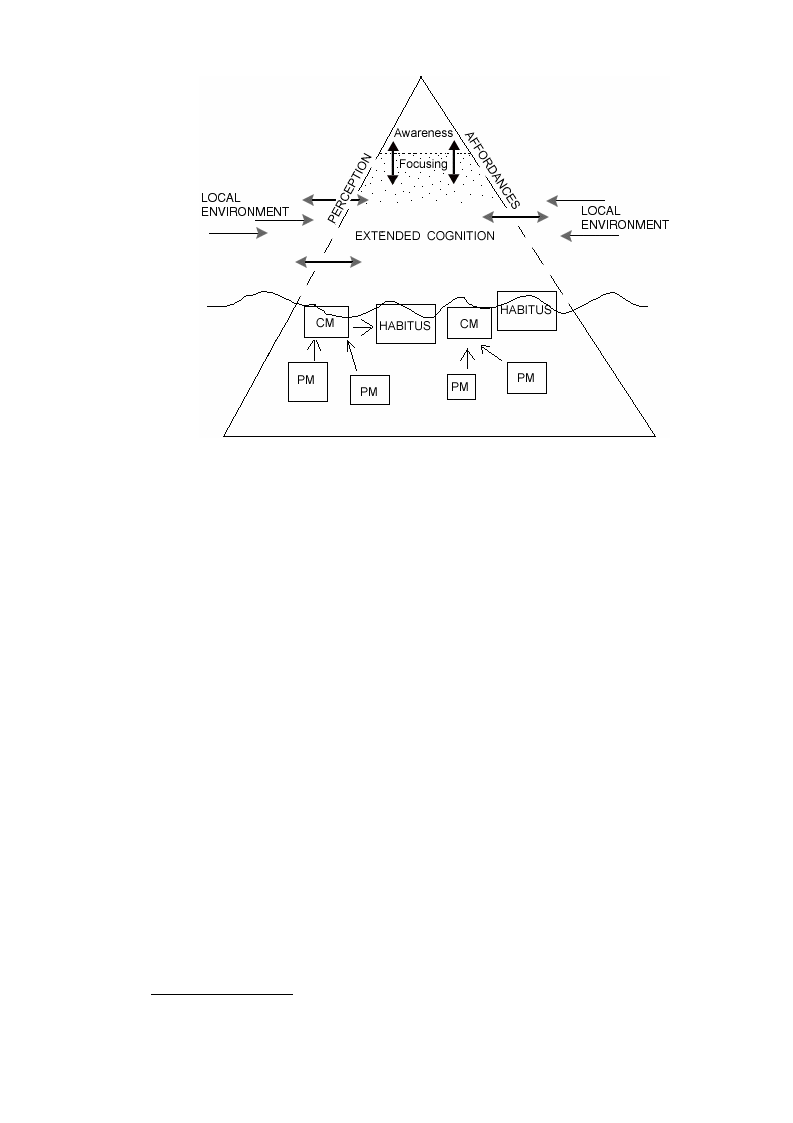
Fig. 3: Focusing and the Felt Sense
In fig. 3 I adapt my cognitive iceberg diagram to show the felt sense and
illustrate the process of Focusing. The entire space of the triangle below
the apex forms the ground of Gendlin's implicit, which emerges from our
emotions, memories, history and culture as well as immediate sensory
input. As before, the dotted area just below the apex designates 'gut
feelings' or felt senses. Metaphor plays a key role in situated embodied
situated cognition, and the implicit, in common with the cognitive
unconscious, speaks the language of metaphor, which is how the felt sense
is usually expressed. The felt sense emerges from the relationship between
conscious awareness and the implicit, which is meditated through
Focusing.
Ritual
Ritual can use all of the aspects of embodied situated cognition - stance,
movement and gesture, cognitive extension, metaphor, the felt sense and
perceptual manipulation - but often more explicitly 23. Because rituals take
place within a space and time set apart, and often use techniques
deliberately intended to shift consciousness, including breathwork,
rhythm, movement and dance,24 the processes of embodied situated
cognition can be used more intentionally:
Because we experience ritual in a heightened emotional state, a
gesture or physical movement becomes loaded with symbolic
23 As noted in my literature review, contemporary Pagans deliberately create their rituals.
24 Entheogens, most usually ‘magic’ psilocybin mushrooms, are used in a sacred context but
rarely in ritual.
63
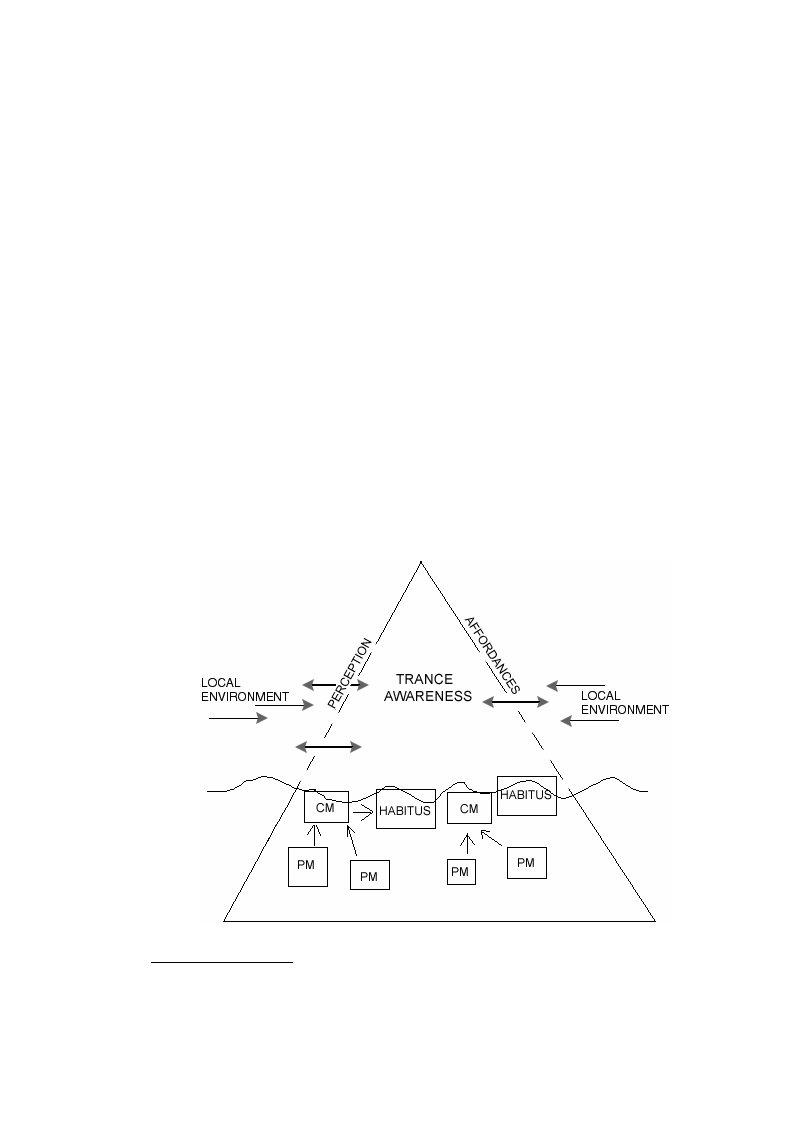
power: What would be a simple wave of the arm in everyday space
becomes an invitation to deity in the sacred circle (Harris and
Nightmare, 2006: 226. Also see Bell, 1992: 93-117).
As a result, a ritual can enable the participant to access "know-how" that
would otherwise "remains unintelligible and inaccessible to our reflective
consciousness" (Crossley, 2004: 37). Thus, as Raposa says, rituals offer a
means of "a thinking through and with the body" (Raposa, 2004: 115) that
enables embodied thoughts and modes of thinking that are otherwise
elusive. The enactive process model has considerable explanatory power
for ritual studies: It elucidates how ritual "produces an incarnate means
of knowing" (Bell, 1992: 163), moves consciousness from the 'head' (the
tip of the iceberg) to the deep body (Grimes, 1995), influences habitus
(Asad, 1993: 131) or transforms "subjective and intersubjective states"
(Crossley, 2004: 40).
Trance
Trance ranges from the shallow trance of watching television to deep
states where conscious awareness is apparently absent, and I am mainly
concerned with shamanic states at the deeper end of this scale. Vitebsky
describes shamanic trance as a "technique of dissociation25 with a high
degree of control" (Vitebsky, 2000: 59) that allows the practitioner access
to a "dimension of reality" that "is not accessible to ordinary people, or in
an ordinary state of consciousness" (Vitebsky, 2000: 58).
25 The term dissociation is drawn from psychology and psychiatry where it describes mental
states ranging from daydreaming through hypnosis into what can be considered pathological
like amnesia, the feeling that one's surroundings are unreal and depersonalization which
involves "experiencing oneself as detached from one’s own body or mental processes"
(Brunet, Holowka & Laurence, 2001: 3).
64

Figure 4: The Trance State
Trance is complex and an extensive discussion lies beyond my remit, but
the enactive process model again has explanatory power, as shown above.
Figure 4 shows an 'ideal' deep trance state: trance takes many forms, and
some degree of conscious awareness is common, so it is rarely as profound
as shown here.
When an individual enters trance, their awareness begins to slide down
the cognitive iceberg, and the apparent boundary between 'self' and 'other'
becomes increasingly blurred. They soon begin to dissociate, a sensation
that is often apparent even in light trances like daydreaming. As a
practitioner moves into deeper trance states, conventional maps of 'reality'
begin to break down, but up to a point the Shaman's training enables
them to remain in control. There is a lack of research into what happens
during this process, but I hypothesise that the Shaman uses whatever
cultural maps are available to make sense of what she or he experiences.
According to Varela "you can give an (enactively embodied) organism
anything at all as an excuse for sensory-motor interaction, and it will
immediately constitute a world which is shaped, which is fully formed. It's
an amazing conceptual shift from thinking that there are properties of the
world that you need to apprehend in order to make a coherent picture of
reality, to the notion that almost anything would supply an excuse to
invent a reality" (Varela, 1999: 77).
Conclusion
The demands of clarity required me to present each perspective on
embodied situated cognition as if they were distinct, but as we have seen
these different aspects interrelate in complex ways. Such analysis, which
has been essential to understanding, inevitably distorts, and this model
may appear to be quite instrumentalist: There is little sense here of a
relationship or a conversation with the other-than-human world, and it
suggests that we simply use the organic environment as a tool to make
sense of our lives. This may be true in many cases, but the process can be
experienced like a dance that enables deep communion. The steps of the
dance are ancient, and when we make those old familiar moves we are
once again in tune with the other-than-human world. There is a point
where self and other bow and acknowledge one another before the dance
begins. This is the ethical relationship of ‘self’ and ‘other’ upon which
Levinas founds his ethics26. But in just a few fluid steps the self/other
dance becomes a process in itself. If I learn the steps well, then suddenly -
phenomenologically and spiritually – 'I' am no longer the dancer but the
dance, at which point 'I' am not.
I have demonstrated how the enactive process model can elucidate
26 For Levinas, if there is no division between subject and object, then there is no ‘other’, so on
his terms, there is no ethics. His approach is very different from the Buddhist and Deep
Ecology view, but my dance metaphor offers a compromise.
65

existing ethnography, the wilderness effect, Focusing, ritual practice and
trance. In Section II I apply this model and my cognitive iceberg diagram
to my fieldwork, where it powerfully illuminates embodied knowing in
Eco-Paganism.
Chapter 5: Embodied Philosophy: My Ontological and
Epistemological Grounding
"How words are understood is not told by words alone".
Wittgenstein (1981: 144).
Reflexivity lies at the heart of this thesis: I seek to understand - to have
knowledge of - a particular way of knowing. There are echoes of this
reflexivity in my literature review of embodied cognition, where I
discussed attempts to think about how we think. This reflexive circle need
not be 'vicious', in the sense of tying me into a knot of self-reference, if I
apply the tools of phenomenology and hermeneutics. Phenomenology is
fundamental to much of the work on embodied cognition (see, inter alia
Gendlin, Varela, and Merleau-Ponty) and as I explain later, hermeneutics
takes a central role in my methodology.
It is from this background that I now discuss my philosophical stance and
how it is grounded in the enactive process model. After framing my
discussion using Kasulis's intimacy and integrity orientations (Kasulis,
2002), I discuss the failure of dualistic ontology and epistemology before
66

describing how an embodied naturalized epistemology (Quine, 1969)
emerges from Gendlin's process philosophy (inter alia, Gendlin, 1997). By
considering my ontological and epistemological stance, this chapter
contextualizes the thesis in general and my methodology in particular.
INTIMACY AND INTEGRITY
In his 1998 Gilbert Ryle lectures, Kasulis proposes two alternative cultural
orientations: Intimacy and integrity. Briefly, an 'intimacy' orientation
understands that "self and other belong together in a way that does not
sharply distinguish the two" and understands knowledge as "somatic"
with "an affective dimension". In contrast, a culture of 'integrity'
prioritizes "external over internal relations" and requires knowledge to be
objective and "empty of affect" (Kasulis, 2002: 24-25). This "heuristic
tool" (Kasulis, 2002: 172) describes normative discourse and does not
essentialize a group or culture: Individuals within a culture may use both
orientations in different contexts and the culture simply foregrounds one
or the other (Kasulis, 2002: 134-135).
Kasulis originally developed his intimacy or integrity model to assist
understanding the difference between Western "philosophical
modernism" and Japanese traditional culture (Kasulis, 2002: 24) but his
audience proposed many other correlations. Some suggested that in the
West, feminine gender emphasizes intimacy over masculine integrity,
noting the importance of intimacy in many feminist epistemologies
(Kasulis 2002: 137), while others pointed to US subcultures that "seemed
to be oriented more toward intimacy than integrity" (Kasulis, 2002: 24).
Although he does not pursue the idea, Kasulis proposes that we consider
the epistemology of the 'Dark Ages' as more intimate, shifting to the
integrity orientation of the Enlightenment (Kasulis, 2002: 140-141) that is
now challenged by postmodernism (Kasulis, 2002: 175).
Kasulis's provides a useful context to understand some of the underlying
challenges of this thesis. The enactive process model clearly lies within his
intimacy orientation: I have somatic affective knowledge when I have "the
right feel" for something (Kasulis, 2002: 43). Such knowledge is "dark" in
that its source "is not obvious even to those involved" and "is absorbed
into the body somatically through praxis" (Kasulis, 2002: 79). Kasulis uses
the example of how he might know that his child is worried through a
sense "that my son is 'not his usual self'" (Kasulis, 2002: 48). Within the
epistemology of intimacy "knower and known are not fully discrete"
(Kasulis, 2002: 77), just as in the enactive process model.
67

Figure 5: The Duck/Rabbit Drawing
Kasulis compares the switch between intimacy and integrity orientations
with alternating between different languages (Kasulis, 2002: 153) or
possible views of a bistable image (Kasulis, 2002: 22) like the duck-rabbit
above. Some people will initially see this as a drawing of a duck, others as
a rabbit, and most people can learn to switch between the two. But we
cannot see it as both at once, just as we cannot adopt both an intimacy and
an integrity orientation at the same time. In the "Introduction" I took an
identical approach to differentiating embodied cognition and embodied
knowing although both are intimacy terms, while the enactivist model (see
inter alia, Varela et al., 1991) marks a shift within an integrity orientated
scientific discourse towards intimacy.
As Kasulis argues, neither orientation is 'more true' or 'better' than the
other, though each has clear benefits and costs (Kasulis, 2002: 141-149).
Western epistemology originated from an integrity orientation and, a
fortiori, so did traditional academia, although significant challenges to the
tradition mean that intimacy orientations are increasingly influential. As
Kasulis points out, the integrity orientation can lead to an "internal
dissociation of the self" resulting in a "split between the intellectual and
the affective/somatic" if it is "pushed too far" (Kasulis, 2002: 143). Clearly
this is often the case in the West, and although Kasulis does not discuss
the epistemological ramifications of this situation, it is at least partly
responsible for the failure of traditional ontology.
THE FAILURE OF DUALISM
Traditional Ontology
The "bipolarity paradigm" of the integrity orientation entails an
ontological dualism (Kasulis, 2002: 100) that postulates a 'real' world that
exists independently and ultimately beyond the grasp of the human
subject. On this representationalist model our knowledge consists of
representations of an independent reality: true knowledge requires an
accurate correlation between what appears to the mind and what exists in
an entirely separate outside world (Wolterstorff, 1999: 311). This
68

traditional Western philosophical ontology splits nature from culture,
mind from body, reason from emotion and subjective from objective.
In the late twentieth century this established tradition was subjected to
sustained critique by feminism and postmodernism, resulting in a "crisis
of representation" (see, inter alia, Flick, 2006: 83-84; Rorty, 1979). My
consideration of dualities like culture/nature in my "Introduction",
mind/body in "A Theory of Embodied Knowing", and even
ethnographer/field in my autoethnography, has repeatedly revealed their
intrinsic flaws. I conclude, with many others (inter alia, Braidotti, 1991;
Rorty, 1979), that we have inherited an inadequate model for
understanding such fundamental concepts. Dualistic ontology offers a
model of the world that ceases to function when applied to complex
systems and processes. The situation is parallel to that in physics, where
Newtonian theory is entirely adequate at a human scale, but fails once we
consider the quantum level of the sub-atomically small. In a similar way
conventional dualities function perfectly well in many contexts but as we
study increasingly complex systems such divisions blur and finally
collapse. The emergence of the 'intimate' enactivist model of cognition,
driven partly by the failure of integrity orientated symbol-processing
(representationalist) approaches may parallel the shift from Newtonian
integrity to the more intimate quantum physics (Capra, 1975; Davis and
Gribbin, 1991). One difficulty is that we are so used to using a dualist
ontology that we sometimes struggle to think without it. We lack any
equivalent of the mathematical language that enables physicists to
articulate unintuitive concepts and negotiate the peculiar world of
quantum physics, so we must find a new vocabulary to make sense of our
emerging understanding. I will argue that just such a vocabulary is
provided by Gendlin's philosophy of the implicit.
Traditional Epistemology
Although the main themes of Western epistemology can be found in Plato,
it rose to prominence largely through the influence of Descartes and
Locke. Descartes is most famous for the ‘cogito’ - his belief that 'I think,
therefore I am' (Descartes, 1968 [1640]: 103). His profoundly influential
idea that the body and mind are entirely separate (Descartes, 1968 [1640]:
156) led to three centuries of epistemology based on the assumption of a
disembodied thinker. This ties in with my discussions above: Kasulis
identifies Descartes as influential on the emergence of the 'integrity
orientation' which culminated in the Enlightenment and positivism
(Kasulis, 2002: 24), while Locke's representationalist view of perception
(Wolterstorff, 1999: 311) underpins symbol-processing theories of
cognition.
Any dualistic epistemology is prone to haunting by the spectre of
69

skepticism because of the gap between internal representation and
external 'reality', and Quine's response was to call for a thorough empirical
investigation of how our beliefs are actually formed. Such a program
meant "naturalizing epistemology" by applying science to the question of
how we come to know. Epistemology then "simply falls into place as a
chapter of psychology and hence of natural science" (Quine, 1994: 25).
Feminist and Postmodern Alternatives
The main challenges to Western epistemology have come from feminism
and postmodernism. There is no single 'Feminist Epistemology' and three
strands are immediately identifiable: feminist empiricism, feminist
standpoint epistemologies and 'feminist postmodernist' epistemologies
(Harding, 1987b: 182). Feminist empiricism remains grounded in a
conventional epistemology that seeks "objectivity" (Harding, 1991: 289)
and so remains within the traditional realist ontology discussed above.
Feminist standpoint epistemologies initially show more promise since
they begin with the realization that as embodied beings, our knowledge of
the world comes "from a particular socially situated perspective"
(Anderson, 2007). Because our physical location, political, social and
gendered perspectives determine how we know, epistemology must be
situated. In place of the dominant epistemology that valorizes masculine
values over those associated with the feminine, Hartsock proposed a
feminist standpoint epistemology that opposes dualisms and values the
relational (Hartsock, 1983). She claimed that this would provide a less
prejudicial and thus more accurate understanding of reality - i.e. one that
was more objectively true. Notwithstanding her claim to greater
objectivity, the main difficulty with Hartsock's theory is its mistaken
assumption of trans-cultural sex relations (Longino, 1999: 333). Harding
attempts to recover feminist standpoint epistemology by arguing for a
multiplicity of standpoints that reflexively recognize their own
understanding (Harding, 1993) but Longino argues that this reduces it to
a series of equally valid perspectives (Longino, 1999: 333). Harding
considers this as a strength because it emphasizes the need for reflexivity,
while Haraway rejects Hartsock's attempt at epistemological closure
(Haraway, 1991). Feminist standpoint epistemologies may in due course
offer a suitable model of an epistemology of embodied knowing, but
currently remain embroiled in debate.
Whereas feminist standpoint epistemologies assume there is an objective
reality that we can know, some feminist postmodernists opine that such
claims "rest upon many problematic and unexamined assumptions" (Flax,
1990: 56). Feminist postmodernism is a diverse school of thought, but in
general it seeks to deconstruct a perceived Western philosophy of
transcendence and objectivity by emphasizing intersubjectivity,
relatedness and intuition. Although feminist postmodernism sometimes
speaks the language of embodiment, it rarely steps beyond the theoretical
70

body. Because postmodernism begins with the primacy of discourse it
cannot make any phenomenological engagement with the experience of
the lived body, and so ultimately fails to develop a truly embodied
epistemology.
Postmodernism in general has provided a powerful and valuable critique
of Western epistemology (see inter alia, Braidotti, 1991). However, as I
point out above, it remains largely trapped by a discourse model in which
language is free-floating and dislocated from any given reality. Similarly
"actions get their meaning from their relations to other actions, rather
than from their relation to some pre-linguistic realm of human nature or
natural law" (Anderson, 2007). I conclude that the very principles of the
postmodern challenge to Western epistemology simultaneously refuse the
possibility of a knowledge grounded in our embodiment.
Natural Science and the Humanities
In response to the dilemmas outlined above, I turn to the naturalized
epistemology recommended by Quine (1969), a move which leads me to
briefly consider the often fraught relationship between natural science and
the humanities. Dilthey argued that the two are fundamentally different:
The natural sciences are concerned with explanation (erklären) while the
humanities seek understanding (verstehen) (Green, 2005: 397). Green
notes that though religious studies scholars are often sharply divided into
those who follow Dilthey's approach and those who "seek the objectivity of
scientific explanation", most, including myself, acknowledge that both
explanation and understanding are required (Green, 2005: 397). Kasulis
can provide clarity: In Dilthey's late 19th century world science rested
soundly on an integrity orientation in opposition to the intimacy of the
humanities. Thankfully the 21st century offers more sophisticated
approaches where science and the humanities can be in harmony. This is
clear from the synthesis I presented as "A Theory of Embodied Knowing",
where the enactivist model of cognition, which offers an explanation, and
the phenomenological approach which seeks understanding, share an
intimacy orientation.
EMBODIED SITUATED EPISTEMOLOGY
A methodology must be grounded in an epistemology, and although I have
provided a theory of how embodied knowing functions, I have not yet
underpinned that with an embodied epistemology.
I propose that there are two fundamentally different ways of knowing:
Propositional knowledge and embodied knowledge/knowing. I have
conscious propositional knowledge that Paris is the capital of France, but I
also have an emotional, sensual knowing of Paris – the smells of Paris, the
taste of Paris, that odd little back street that I couldn’t tell you how to find
but that I could walk to with ease. This fuzzy, wordless, poetic knowing is
71

embodied. Propositional knowledge is validated by Kasulis's integrity
orientation (Kasulis, 2002), and is described by Belenky et al. as "separate
epistemology". Embodied knowledge/knowing is recognized within the
intimacy orientation, and in many ways correlates with "connected
knowing" (Belenky et al., 1986: 113). Although a PhD. thesis is a formal
academic text, and as such primarily intends to provide propositional, not
embodied knowing, this does not present a theoretical hiatus. First, it is
apparent that we can discuss and understand about embodied knowing
using propositional knowledge; second, we can use more explicitly
creative approaches like autoethnography to enable the reader to gain a
more empathetic (intimate) understanding (see Chapter 7); and third, we
can use phenomenological exercises like those Merleau-Ponty and
Gendlin provide, to allow the reader to have direct experience of instances
of embodied knowing.
I turn then, to the contemporary philosopher and psychologist, Eugene
Gendlin. Gendlin's process philosophy emerges from Pragmatism and is
grounded in the embodied phenomenological experience of tacit
knowledge. Rather than starting with metaphysical puzzles or theory,
Gendlin's philosophy begins with the phenomenological experience of
having a bodily sense of a situation, and then asks what this entails. A
dualistic or postmodern epistemology cannot make sense of this process,
and neither can existing physiological models of the body, but the fact that
it does occur is obvious to anyone who takes a moment to observe their
own process of creating meaning. Because Gendlin is both a psychologist
and philosopher, he is well placed to offer the kind of naturalized
epistemology which Quine called for. Although he acknowledges the value
and power of science, Gendlin believes that the epistemology which
underpins it cannot adequately deal with "living things" and proposes a
"process approach" as an alternative (Gendlin, 2001). This approach
understands "living bodies as self-sense making processes" (Gendlin,
2001). Propositional knowledge is not a process: I know now that Paris is
the capital of France just as I did 30 years ago. But some embodied
knowledge is a process - for example knowing how to find that "odd little
back street" in the warren of the city - and it is these embodied processes
which concern me here.
Many postmodernists conclude that "nothing can be prior to language and
history" (Gendlin, 1992: 342) and as an example Gendlin quotes
Foucault's claim that our once animal bodies were destroyed by history
(Foucault, 1977b). But Gendlin seeks to move the discussion of language
beyond postmodernism (see Levin, 1997) by showing that it emerges from
the implicit ". . . . ." of the body-sense discussed earlier ("Embodied
Cognition Literature Review"). To recall this notion, imagine you are
writing a paper and trying to find just the right phrase for ... for what?
Something as yet unexpressed but there. "The . . . . . knows what we want
to say. It knows with a bodily gnawing, very much like something
forgotten". The implicit is not preverbal; it clearly understands language
72

since it will reject words that do not 'fit' and will resonate with those that
do (Gendlin, 1997b: 17). But the new words are not simply floating in the
implicit and neither do they represent it. This becomes apparent with the
change in the implicit when we find the right phrase - a "carrying forward"
that is sensed as a release of tension (Gendlin, 1995: 547). Language, then,
is not a representation but a carrying forward of the implicit, making it
explicit in symbols. As Levin puts it, "speaking is itself a further living in a
situation" (Levin, 1997: 49), which he then explicates:
Symbols do not represent; rather, they relate to what we want to
say in such the way that feeding relates to hunger. Feeding does
not represent hunger; nor is there a hidden feeding underneath
hunger (Levin, 1997: 50).
On Gendlin's model, language - or any form of expression - is where the
implicit is carried forward and becomes explicit. Meaning only emerges
when the implicit is carried forward by explication (Gendlin, 1964), so it is
clear that "[f]eeling without symbolization is blind; symbolization without
feeling is empty" (Gendlin, 1962: 5). Thus Gendlin "forges a continuity in
which knowing is both an embodied and languaged process" and each is
required "in the rhythm of closeness and distance that is required for
meaningful knowing to occur" (Todres, 2007: 34).
To sum up, the bodily or felt sense emerges from the implicit and can be
made explicit though symbolization. I can best express this using the
metaphor of the implicit as a huge ball of string and the felt sense as one
strand that we can pick up, perhaps using Focusing. As I pull on a strand
(the felt sense) it slowly unravels (carries forward) the ball of string (the
implicit) into my hands (the explicit).
This is a radically different conception from that offered by the
representationalism of dualistic epistemology. Instead of an internal
representation of an external 'reality', we have a process of knowing that is
grounded within our embodied experience of a specific situation. Gendlin
thus avoids the problematic 'view from nowhere' (Bordo, 1993; Braidotti,
1991), satisfies the need for reflexivity emphasized by feminist
epistemology, and highlights the relationship between epistemology and
ontology (Haraway, 2000: 78; Stanley, 1990: 14). Yet contra
postmodernism, language is not free-floating but grounded in a pre-
conceptual embodied knowing. For Fisher such "[a]uthentic speech"
enables us to speak from our place in the world:
Language is not a closed system of verbal forms, but a mode of
poetizing, of allowing for the disclosure of new meanings, new
forms, in our dwelling on or listening to the earth (Fisher, 2002:
132).
The Felt Sense
73

While Gendlin often uses the term "bodily-sense" (or occasionally
"feeling") in his philosophy and "felt sense" in his psychotherapeutic work
(Gendlin, 1981: 10), these terms are equivalent and he uses each as
appropriate to the context. I generally use the term "felt sense" as this
phrase is used most in the context of Focusing which forms a key strand of
my methodology.
Gendlin’s notion of the felt sense emerged from his empirical research
into the frequent failures of psychotherapy and why it works when it does
(Gendlin, 1981: 3). Those who were successful in therapy came to an inner
knowing which Gendlin called the "felt sense", "a special kind of internal
bodily awareness … a body-sense of meaning" (Gendlin, 1981: 10) which
the conscious mind is initially unable to articulate. A felt sense is more
than just an emotion, though it usually has an emotional aspect: In
everyday terms, the felt sense describes the fuzzy feelings that we don’t
usually pay much attention to - a vague 'gut feeling' or that inexpressible
sense of unease we express as 'I'm not quite feeling myself today' or 'I just
got out of bed the wrong side this morning'. A intuitive understanding of
the felt sense is required to really understand Gendlin's work, so I will give
a few more examples. Imagine you are at a conference and spot someone
that you have 'a bit of a history' with. How does that feel? Maybe some
butterflies. Maybe some vague memories. A mixture of things. That feeling
is a felt sense. Or let's say you're taking a walk on a beautiful fresh
morning, just after a rain storm, and you come over a hill, and there,
hanging in the air in front of you is a perfect rainbow. As you stand there
and gaze at it you feel your chest welling up with an expansive, flowing,
warm feeling. That feeling is also a felt sense. In many such ordinary
situations we sense that something is wrong - or right - but may find it
difficult to express just what that wrong - or rightness - is.
We have all had a sense of not knowing what we're looking for, but being
certain that we will know what it is when we find it. A poet, graphic artist,
or indeed theoretician, will often have a sense of what their creative work
needs to move forward, but it may initially be beyond their grasp. In such
situations there is a knowing and a not knowing at the same time. What is
known in this case is tacit and embodied and we seek to shift it into
explicit conscious knowing. In each example the missing something - the
next step in the process - is 'implied' by what is already there and this
implied 'implicit' is one of Gendlin’s central concepts. If we delve into our
felt sense of the implicit, it begins to open up and "comes to imply more
and more", revealing itself as an "unseparated multiplicity" (Gendlin,
1997b: 16; author's emphasis). Thus our experience suggests that the
"bodily . . . . . [the 'implicit'] can contain information that is not (or not
yet) capable of being phrased" (Gendlin, 1992: 349). But how? Gendlin's
explanation meshes with the understanding of embodied situated
knowing described by enactivism: The body "is an ongoing interaction
74

with its environment" (Gendlin, 1992: 349) and this explains how the felt-
sense could access "a vast amount of environmental information" and how
new creative work can emerge from it. Furthermore "if such a self-sensing
body could also think, and could use its bodily . . . . . in its thinking, well, it
would always think after, with, but with more than conceptual and
language forms. This more would be realistic since it would be the body-
environmental interaction" (Gendlin, 1992: 350). Gendlin emphasizes
that as a result of this approach the subject/object distinction collapses:
"We will move beyond the subject/object distinction if we become able to
speak from how we interact bodily in our situations" (Gendlin, 1997b: 15).
Gendlin closes his 1992 paper by asking the reader "[w]hat will you say
about my paper" and points out that though his audience probably have
not yet articulated a response in words, it exists as an "internally
intricate . . . . . bodily implying of speech and thought" (Gendlin, 1992:
353). With this example of what Levin calls his "reflexively constituted
practice" Gendlin reveals what he asserts is happening in the very process
of his sense-making (Levin, 1997: 45).
Experience
In the examples I gave earlier, of being followed by someone ("Embodied
Cognition Literature Review"), or seeking just the right phrase to
complete a sentence, there are two basic aspects: the explicit symbol and
the implicit felt sense. The symbol is the form our experience takes; "a
thought, a behavior, a sight or sound, an emotion ... an image, a rite, an
event, some words" (Fisher, 2002: 56), while the felt sense is the "rich,
intricate sensed experience of our situations" (Purton, 2007). All
experience is just this "interaction between feelings and 'symbols'
(attention, words, events) . . . . ." (Gendlin, 1964: 129). Symbols and the
felt sense are in a dynamic relationship: The implicit felt sense becomes
explicitly known when it is carried forward into a symbolic form that
creates meaning, and a felt sense can be invoked when we are inspired by
something richly symbolic. So as Fisher says, "[s]ymbols and feelings are
thus mutually formative or determining: the traffic between them moves
in both directions" (Fisher, 2002: 56). Furthermore my immediate
experience draws on an implicit intricacy that is fed by a lifetime of
experiencing complex situations as well as "imagined situations,
situations about which we have read in novels or myths or biographies
and so on" (Purton, 2007).
Conclusion
Gendlin provides a naturalized epistemology grounded in our
phenomenological experience of the felt sense and consistent with
enactivism, that enables me to discuss embodied knowing from the
perspective of propositional, academic knowledge. The intricate embodied
knowing of the implicit is carried forward to be symbolized in explicit
awareness as, for example, speech, gesture or thought. Gendlin's
75

philosophy collapses the subject/object distinction in just the same way
that enactivism does (Varela et al, 1991) by showing that the body is "an
ongoing interaction with its environment" (Gendlin, 1992: 349), and thus
avoid the problems intrinsic to dualism.
My methodology chapter builds on this epistemology to demonstrate how
Gendlin's Focusing approach accesses embodied knowing, and can
underpin an embodied hermeneutics. This allows me to explore embodied
knowing using an embodied methodology that is underpinned by an
embodied epistemology, and thus grounds me in a virtuous circle of
reflexive understanding.
Chapter 6: Research Design and Methodology
There has been a paradigm shift in the academy: Positivist notions of
objectivity are unhinged by postmodern epistemologies, while the empire
of signs that has dominated since the 1960's is challenged by a
sensual revolution. This sea change requires us to develop methodologies
that "articulate the importance of the body on an experiential and
subjective level of ‘the everyday’" (Ahmed, 2004: 286). Such
methodologies demand new ways to demonstrate rigour and validity: “In
order for qualitative research to pursue embodied understanding, it
requires procedures that show phenomena in both experientially
evocative as well as structurally coherent ways” (Todres, 2004: 24). The
methodological approach I develop embraces the need to respect the
mind/body/self intersubjectivity of "the mind in the body" (Csordas,
1994: 20), and develops an "ethnography of experience" that recognises
"that the self is constituted out of visceral processes as much as expressed
76

through them" (Kleinman & Kleinman, 1991: 293). It follows Gendlin's
"reflexively constituted practice" (Levin, 1997: 45) in that it uses a
methodology of embodied knowing to explore embodied knowing.
I begin by setting out the requirements of my methodological approach,
which Action Research and feminist methodologies to some extent meet.
However, hermeneutics ultimately serves my purposes best, so after
discussing the general background and issues, I explain how an embodied
hermeneutics can answer McGuire's call for a "mind/body/self
intersubjectivity" (McGuire, 2002: 209) by adapting Gendlin's Focusing
technique. I then describe my methodology in practice, beginning with a
brief discussion of my sample selection procedure. Although my pilot
phase proved valuable, the methodology I'd developed was inappropriate,
so I took a different approach, developing the semi-structured interview
into the 'Focusing Interview', which I describe in detail. During this
fieldwork phase I had a "complete membership role" (Adler & Adler, 1998:
97) that enhanced my observation of life on protest sites. I explain how
the insights gained from this role fed into my autoethnography, which
provides an aesthetic texture to my research. Finally, I describe my
application of an embodied hermeneutics to the interpretation and
validation phases. As discussed in my introductory chapter, I prioritise the
term ‘embodied knowing’ in this chapter because my primary concern
here is with the phenomenological aspect of this process.
Methodological Approach
I needed a methodology that satisfied four key criteria:
1. It needed to allow me to access knowing that may normally lie
outside conscious awareness.
2. It had to facilitate the emergence of valid research material.
3. Philosophically, it was important that it recognised different ways of
knowing – what Heron calls an "extended epistemology" (Heron,
1996). Although we can make propositional statements about
embodied cognition, embodied knowing emerges from engaged
experiential understanding.
4. It had to be congruent with my personal integrity as an insider.
Although I found valuable strategies and theoretical approaches common
to Action Research (New Paradigm Research) and feminist
methodologies, neither satisfied my needs but remained influential on my
methodology. The New Paradigm Research (NPR) described by Reason
and Rowan (1981) is a methodology which falls within the range of
approaches known as Participatory or Action Research. I chose not take a
full Action Research approach, which requires goals and methods to be
defined by participant researchers, because I had a clear aim from the
start of my project. However, I followed the Action Research model in
several important ways. The fundamental criteria of Action Research is
77

that we conduct research with people rather than on them (Dick, 2007),
which necessitates producing knowledge that will be useful to participants
who have in turn been involved in dialogue about research conclusions.
The itinerant lifestyle of many participants made dialogue impractical, but
I discussed research outcomes with representative participants before
coming to final conclusions. Action Research recommends the "planning,
acting, and reflecting" cycle (Koshy, 2005: 5) wherein the researcher
begins with a tentative plan which they action and then reflect on. In
principle, reflection informs a new plan and the cycle begins again, but in
practice this valuable process is "more fluid, open and responsive" (Koshy,
2005: 5).
Although Harding rejects the notion of a "distinctive feminist method"
(Harding, 1987a: 1), she makes recommendations, claiming that "[t]he
best feminist analysis ... insists that the inquirer her/himself be placed in
the same critical plane as the overt subject matter". This locates the
researcher, thereby revealing them "as a real, historical individual with
concrete, specific desires and interests" (Harding, 1987a: 9). Many
feminists (though not all) affirm this rejection of the "ethos of scholarly
objectivity" confirming the now widely held view that "there is no
dispassionate, disinterested scholarship" (Christ, 1987: 497. See, inter
alia, Harding & Hintikka, 1983; Stanley 1990a). For many researchers this
stance has "replaced misleading notions of scientific objectivity, complete
impartiality, and metanarrative, with issues of reflexivity, diversity, and
difference" (Wallis, 2004: 195). Both Action Research and feminist
methodologies use research to stimulate change, and if the researcher and
participants share experiences (Harding, 1987a: 9) we would expect
change in all parties. In practice my spirituality was first challenged and
then nourished by my research, which simultaneously contributed to Eco-
Paganism via my workshops, talks and articles.
New Paradigm Research and feminist methodologies have influenced my
approach through their concern with lived experience, accountability,
reflexivity, and emotional engagement. Feminist methodologies have the
obvious additional concern with gender, notably the gender linked
dualisms already mentioned in chapter 5, "Embodied Philosophy". Given
the complex and sometimes controversial discussions around women's
ways of knowing, intuition and the 'masculinity' of objectivity, I remained
sensitive to issues of gender and knowledge throughout my research.
HERMENEUTICS
The embodied hermeneutics at the heart of my methodology is in no way
incompatible with the principles discussed above, and in some ways
develops from them. There is no "general theory of hermeneutics"
(Penner, 2000: 65), but in principle it is a "theory or philosophy of the
interpretation of meaning" (Bleicher, 1980:1) which different thinkers
have variously developed. Some emphasize philosophical hermeneutics
78
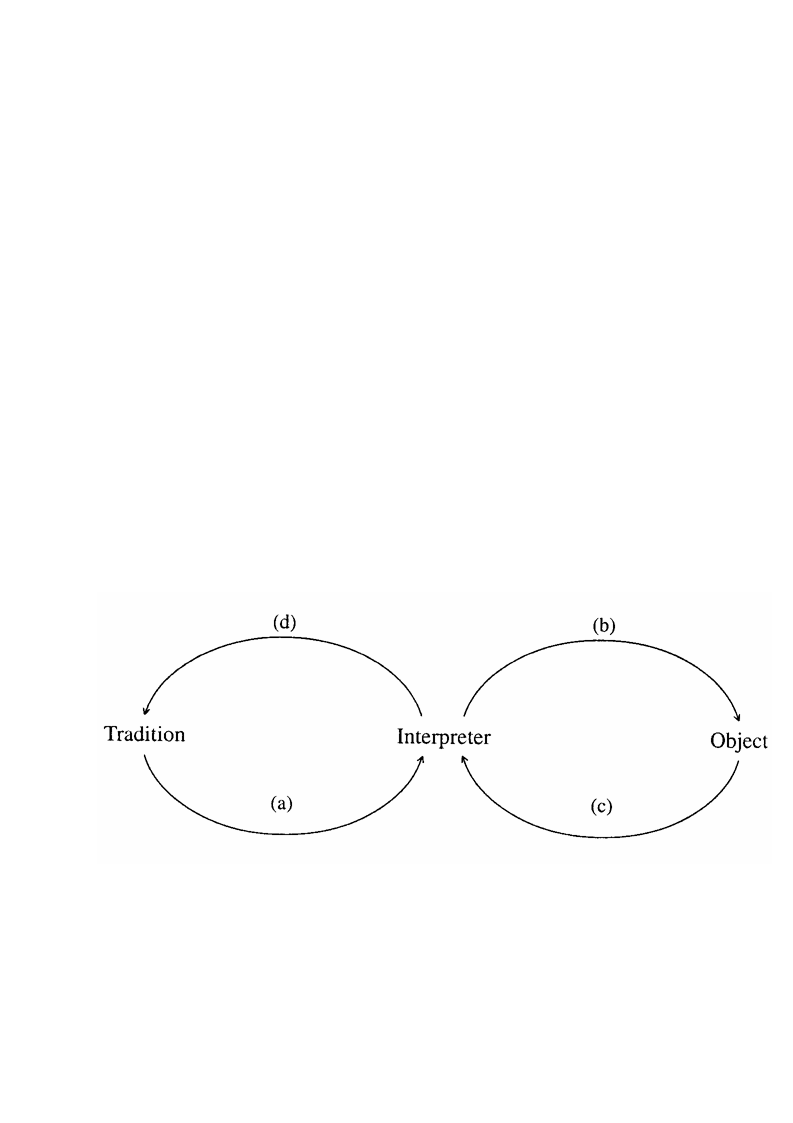
while others focus on methodology, while Heidegger (1962 [1927]) applies
hermeneutic philosophy as method. Gadamer claims that hermeneutics
allows "what is alienated by the character of the written word or by the
character of being distantiated by cultural ... distances to speak again"
(Gadamer, 1979: 83) while Ricoeur emphasises reflexivity, describing
hermeneutics as "explicitly or implicitly, self-understanding by means of
understanding others" (Ricoeur, 1974: 17).
Hermeneutics has a long and complex history which I will not review
extensively. Briefly, hermeneutics originated as a Medieval technique of
biblical interpretation which Schleiermacher broadened to apply to textual
interpretation in general. Dilthey then extended it further to encompass
the process of interpreting all "human behaviour and products"
(Honderich, 1995: 353), opening the way for Heidegger to transform it
into a phenomenological hermeneutics that could interpret Being itself
(1962 [1927]). More recently Gadamer emphasized using hermeneutical
dialogue to deepen understanding of our shared world though a "fusion of
horizons" (Gadamer, 1989).
Several insights of contemporary hermeneutics will be familiar from the
discussion of New Paradigm Research and feminist methodologies.
Hermeneutic philosophy rejects 'objectivism' because it recognises that we
always bring understanding to a situation - what Gadamer called our
prejudices (Bleicher, 1980: 77) - so we cannot approach with a "neutral
mind" (Bleicher, 1980: 2).
Fig. 6: The Hermeneutic Circle
This insight is based on the fundamental notion of the hermeneutic circle,
a reflexive and subtle form of "connected knowing" (Belenky et al., 1986:
113) that has parallels with the Action Research cycle. In fig. 6 above,
Gallagher (1992: 106) shows the hermeneutic circle operating on two
levels, in a general context and a more specific one. Our foreknowledge,
labelled 'Tradition', inevitably influences (a) the interpreters
79

understanding (b) of a text, person or situation (unfortunately named the
'Object'). Foreknowledge may be tacit, but in any case makes any claim to
objectivity partial at best. We cannot escape our foreknowledge as such
"[p]rejudices" are the very "conditions whereby we experience something
[that can say] something to us" (Gadamer, 1976: 9). Once we accept that
our knowing takes place within the hermeneutic circle, it can facilitate
understanding: As far as possible we note the extent of our foreknowledge
and then turn to what we wish to interpret (b). What we learn from our
engagement with that text, person or situation gives us greater
understanding (c) which we can once more apply to the question (b). The
process is thus cyclical and may provide new understandings profound
enough to change our foreknowledge, as indicated by (d) above. For
Fisher intuition is essential because we need to be sensitive to "a taste or
feeling for that which has yet to be formulated" and allow intuition to
guide us into deeper understanding (Fisher, 2002: 40).
Penner (2000: 66) summarises three fundamental hermeneutic
assumptions as central for religious studies:
1 Hermeneutics seeks to understand our "lived experience"
(Erlebnis), "the familiar, unreflective, everyday world which
involves a tacit knowledge and orientation" (Penner, 2000: 59).
2 All lived experience emerges from our historical and cultural
context, including our consciousness and any interpretations we
make. This entails problems of relativism which I discuss below.
3 Hermeneutics tends to view the history of science with "suspicion"
(Penner, 2000: 66) as evidenced by debates about whether the
study of religion is a science of religion or not.
I have already discussed the third point in my chapter on embodied
philosophy, but I need to unpack the first two.
Understanding 'Lived Experience'
On Maanen's phenomenological hermeneutic model we research
meanings "as we live them in our everyday existence, our life-world"
(Maanen, 1990: 11), translating lived experience into a text that - ideally -
expresses its essence in a way that allows the reader to re-live it (Maanen,
1990: 36). For this process to succeed we must recognise the 'prejudices'
we inevitably bring to a situation before seeking engagement and greater
understanding. A hermeneutic engagement is a dialogical (Bakhtin, 1981)
"conversation with few hard and fast rules" (Fisher, 2002: 36) that seeks
to widen our original horizon of understanding in an effort to meet that of
the unknown in a "fusion of horizons" (Gadamer, 1989: 306). In
hermeneutics the "keys to understanding are not manipulation and
control but participation and openness, not [data] but experience"
(Palmer, 1969: 215) and the process is transformative because it leads us
to "gain self-understanding ... through our interaction with others"
80

(Fisher, 2002: 39). Thus, as Rorty understands it, a hermeneutical
discourse is "supposed to be abnormal, to take us out of our old selves by
the power of strangeness, to aid us in becoming new beings" (Rorty, 1979:
360; author's emphasis).
Historical and Cultural Context: Validity and Relativism
The hermeneutic insight that we can never come to any situation with a
neutral stance collapses the "the insider/outsider question" because it
recognises that we all carry prejudices into our research. In recognition of
my own prejudices, I note that I've been an Eco-Pagan for over a decade.
However, I conclude that an insider will be more adequate to this task
because researching embodied knowing benefits from an empathetic
approach from within. I understand the experiences of research
participants by reference to my own experience, which in hermeneutic
terms means that my initial horizon of understanding is close to theirs.
Moreover, because I am exploring embodied knowing in a group of which
I am a member, my own reflexive understanding becomes part of my
research data. (See Autoethnography, section below, and Wallis, 2004). I
thus exemplify Wylie’s assessment that our situation as insider
researchers "should be regarded as a resource, not a liability" (Wylie,
1995: 268-70). However, I am aware that my prior experience of Eco-
Paganism will influence my research, so I am particularly reflexive in my
interpretation of material about which I have a strong feelings or
opinions.
If all lived experience, including the process of interpretation itself, is
simply an individual's perspective, in what sense is any interpretation
valid? Scholars either avoid the issue or appeal to "the given", often via a
phenomenological strategy (Penner, 2000: 61). Maanen's
phenomenological hermeneutics is a good example: "a good
phenomenological description is collected by lived experience and
recollects lived experience - is validated by lived experience and it
validates lived experience" (Maanen, 1990: 27; author’s italics). The lived
experience of the reader becomes a key element in its validation, as
credible study presents "something we can recognise as an experience that
we have had or could have had" (Maanen, 1990: 27). Caputo takes a
similar tack: the 'rightness' of a hermeneutic interpretation "comes down
to its ability to provoke the ultimate hermeneutic response: 'That is what
we are looking for. That puts into words what we have all along
understood about ourselves'" (Caputo, 1987: 81). Such hermeneutic
validity is a felt 'rightness' in a specific context that does not claim to be
objectivity true at all times for all people.
AN EMBODIED HERMENEUTICS
I have presented a theory of embodied cognition and an embodied
epistemology, and on these foundations I build an embodied
81

hermeneutics that can articulate the embodied knowing of a particular
individual or social group.
Fisher notes that Gadamer remains focused on writing and interpreting
texts and "tends toward kind of linguistic idealism" (Fisher, 2002: 38).
Clearly a hermeneutics which emphasis the textuality of experience may
dry the flesh on the body, and Stoller cogently asks if it "is it not
problematic to use the body as text metaphor in societies in which the
body is felt and not read?" (Stoller, 1997: 5-6). To answer Stoller's
question I discuss embodied approaches to understanding lived
experience, and then show how they can be integrated into an embodied
hermeneutics. Davidman suggests that we use "alternative sources of
knowledge, such as our own emotions and feeling states ... to understand
and convey the experiences of those we meet in the field" (Davidman,
2002: 20), and McGuire's work provides an excellent example of how this
works in practice. McGuire describes an interview she made while
researching attitudes of farm women in rural Ireland. Both McGuire and
the interviewee were mothers, and McGuire was nursing her child as they
spoke. McGuire describes how she related to the other woman through
feeling "the sheer physicality of our mutual understanding. We
understood each other, not only cognitively or emotionally, but also with
our bodies ... I remember this moment now with my body/mind, not just
mentally" (McGuire, 2002: 204). McGuire explains that their shared
experience of nursing provided a "shared physical experience", which
drew on her own "body/mind experience" (McGuire, 2002: 205).
Kleinman and Kleinman argue for such an "ethnography of experience" as
an antidote to the de-humanising tendencies of science:
We live in the flow of daily experience; we are intersubjective forms
of memory and action ... the self is constituted out of visceral
processes as much as expressed through them (Kleinman and
Kleinman, 1991: 293).
McGuire notes the Kleinmans' claim that the ’mind/body/self’ "can be
intersubjectively understood and that it can intersubjectively know
others" (McGuire, 2002: 205), adding that if we could train ethnographers
to use this understanding "by raising intuition to the level of
consciousness" (McGuire, 2002: 208) they could apply this
"mind/body/self intersubjectivity" to social situations (McGuire, 2002:
209). McGuire has been unable to develop such a methodology, but
suggests the work of Csordas as a possible model (McGuire, 2002: 209). I
discussed Csordas in my embodied cognition literature review, but briefly,
he proposes a 'cultural phenomenology' that attends to "somatic modes of
attention" (Csordas, 1993). These are culturally constructed ways of being
aware of a situation through the body; for example in a ritual healing the
healer might feel, see or hear visions that provide information about the
healing process. McGuire concurs with Csordas that phenomenology is
the appropriate tool for a methodology of mind/body/self intersubjectivity
82

as long as it demonstrates "precision and rigour about exactly how we
know what we claim to have apprehended" (McGuire, 2002: 209), and
Gendlin's phenomenological hermeneutics provides exactly that. As
Madison explains, "Gendlin has described the hermeneutic interactions
between our experience and symbols in a way that supports an
intersubjective understanding while remaining verifiable in our lived
experience" (Madison, 2001: 10). This process of verification is called
Focusing.
Focusing
A felt sense is "readily accessible in experience and thus we are able to
work with it phenomenologically" using Focusing (Madison, 2001: 7).
Although Focusing is initially taught as a series of steps, it is actually more
an approach than a technique, and different teachers present the steps in
different ways (see Cornell, 1996; Gendlin, 1981 and "Appendix 1:
Focusing Instructions"), but the principles remain the same. Focusing
begins when we sense our bodily response to something, which can be our
felt sense of an interview question or a fieldwork situation. We then seek a
symbol for that response - what Gendlin calls a handle (Gendlin, 1981) -
and sense whether that symbolization fits our felt sense. If it does, we can
spend time exploring the symbol and allowing it to carry forward our
initial felt sense (adapted from Jordan, 2005: 6). In chapter 5, "Embodied
Philosophy", I referred to the sense of release we experience when we find
just the right word or phrase to express an understanding that had been
implicit. If we come to a similar sense of completion in Focusing we
experience a bodily 'felt shift', a physical affirmation that we have brought
some significant knowledge from the implicit into conscious awareness. A
'felt shift' describes just what we mean by an 'Aha! moment' that is
accompanied by a release of bodily tension (Gendlin, 1981: 39).
Descriptions of the therapeutic use of Focusing speak of a process similar
to McGuire's description of mind/body/self intersubjectivity.
Psychotherapist Madison explains how throughout a Focusing session he
keeps his attention on the "one intersubjective world" occupied by him
and his client "as it exists each moment in our individual bodies"
(Madison, 2001: 12). Another Focusing psychotherapist describes the
experience of what Csordas calls "somatic modes of attention": "In my
work I have felt an ache in my chest in the presence of a patient's grief, or
a tingling in my arms and legs in response to another's anger etc. and I
frequently consult my own body sensations (and my reveries and stray
thoughts) to help me understand my patients' experience" (Solomon, pers.
comm., 2007). Solomon uses Focusing in this process of consulting his
body27, and describes it as a way of "speaking from the body rather than
about the body" (Solomon, 2006: 9; author’s emphasis).
27 Solomon notes that he began attending to his body sensations before he became aware of
Focusing. His body sense had been enhanced by Tai Chi, Bio-energetic therapy training and
Vipassana meditation.
83

Gendlin appreciates that Focusing can be a "very helpful innovation for
phenomenologically-orientated research", suggesting that it "may result in
outcomes that are different and deeper than other qualitative research
practices" because it "opens up the whole vast implicit experiential level"
(Gendlin, 2003, quoted in Todres, 2004: 25). Todres has discussed the
use of Focusing in qualitative research (Todres 1999, 2004 and 2007) and
uses Gendlin's work to explore the role of "interembodied understanding"
(Todres, 2007 [1999]: 39)28. Focusing has also been applied within
Grounded Theory (Rennie and Fergus, 2006) and in Heuristic Research,
which does not use Focusing in interviews, but recommends it to elucidate
the researchers own process of self awareness because it allows them to
"identify qualities of an experience that have remained out of conscious
reach" (Moustakas, 1990: 25). Although few researchers use Focusing to
access embodied knowing in an ethnographic context, I have been in
contact with several, one of whom, Jane Bacon, Reader in Performance
Studies at the University of Northampton, advised me on my application
of this methodology and I have referenced her specific contributions.
My embodied hermeneutics has five principles:
A Recognising that the body "is an ongoing interaction with its
environment" (Gendlin, 1992: 349) moves us "beyond the
subject/object distinction" (Gendlin, 1997b: 15). This intimate
involvement with the world defines the "conditions whereby we
experience something" (Gadamer, 1976: 9).
B The circumstances of our being-in-the-world (principle A) enable
our awareness of what McGuire calls the "mind/body/self
intersubjectivity" of social situations (McGuire, 2002: 209)
which we can access by various means including Focusing.
C Researchers can develop this awareness in themselves and help
facilitate it for their participants. (See, inter alia, Gendlin, 1981;
Solomon, 2006).
D This awareness affords an embodied phenomenological
hermeneutics grounded in "lived experience" (Maanen, 1990:
27; Penner 2000: 59).
E Gendlin's description of the "hermeneutic interactions between our
experience and symbols" (Madison, 2001: 10) brings hermeneutic
validity to this "embodied understanding" (Todres, 2007: 40) by
grounding it in a felt 'rightness' (Caputo, 1987: 81).
Of the four methods I use to understand the process of embodied
28 Todres' 1999 paper has recently been reprinted in Todres, 2007 where I came across it for the first
time. Although it did not inform my methodology this paper supports the approach I developed
independently.
84

cognition/knowing, three are underpinned by these principles: (1) I used
my phenomenological experience of mind/body/self intersubjectivity both
in the field and during and after personal interactions with participants,
applying Focusing to deepen this awareness during the later stages of my
research. (2) Focusing was also integrated into my interview practice, as
discussed in detail below, and contributed to (3) the interpretation phase.
The fourth, my use of existing ethnographies, provided additional
material to contextualise my fieldwork.
Triangulation
I have drawn on existing ethnography and my own observations to
identify the research field and possible interview topics, while interview
data, observation and auto-ethnography have in turn informed the
emergence of my hermeneutic analysis. Using several complementary
approaches to data gathering in this way is often called methodological
triangulation (see, inter alia, Flick, 2006: 289; Richie & Lewis, 2003: 44:
73).
Massey is highly critical of triangulation, claiming that "many misleading
and invalid claims are made" in its name (Massey, 1999: 183). Massey’s
critique proposes that the term ‘triangulation’ is an inappropriate
description of how social scientists use multiple methods because it is
based metaphorically on land surveying, which has a different
epistemological and ontological stance. As a result it can lead to “claims of
convergence, truth, validity, control of bias, completeness and so on
looking far more solid than they really are” (Massey, 1999: 194). Further,
the claim that triangulation can in some way validate (see inter alia,
Schwandt, 1997: 163) implies the existence of a fixed social reality, a
notion that most social theorists refute.
However, Richie notes that this is a “longstanding debate” (Richie &
Lewis, 2003: 43) and many researchers have embraced the concerns
expressed by Massey. Several authors emphasise that triangulation should
be used to provide a richer understanding that is “not necessarily a more
certain one” (Richie & Lewis, 2003: 44) while Flick emphasises
triangulation as an alternative to validation that increases the scope,
depth and consistency of research (Flick 2006: 390). The origins of the
term are indeed unfortunate, but given that the qualitative research texts I
use are aware of the issues and avoid implausible claims for triangulation,
and I see no problem in adopting it.
METHODOLOGY IN PRACTICE
My involvement with the environmental protest movement spans over
fifteen years and I was involved at the UK's first road protest camp at
Twyford Down (1991-1994), the London M11 link road protest (1993-1995)
and Newbury (1995-1996). This background gave me an understanding of
protest site activism and helped build rapport with research participants.
85

Sample Selection and Size
My Eco-Paganism literature review noted that Eco-Pagans can be
categorized using two typologies: Letcher identified those explicitly
involved in contemporary Paganism (traditionalized) and the more
eclectic detraditionalized (non-aligned) Eco-Pagans (Letcher, 2004),
while I distinguished between ‘protest camp’ and ‘urban’ Eco-Pagans.
Although individuals do move between these fluid typologies, they are
useful in providing a synchronic structure for my analysis which I present
as a scatter diagram (figure 6). I sought interview participants in physical
spaces, via organisations (for example The Pagan Federation - see 'Web
Sites' references), the Internet (e-mail discussion groups and web sites)
and through word of mouth.
Ethnographic Sites
Because there are very few protest sites in the UK at any one time, my
ethnographic sample was self-limiting. I used several sources to locate
sites including protest organisations such as Road Alert and Earth First!
(see 'Web Sites' references), e-mail discussion lists (see 'E-mail discussion
lists' references) and word of mouth. I visited all current (2004 -2007)
road protest sites in England, Scotland and Wales, and two that are no
longer active. My first visit took place in February 2004 with a week at site
A 29. In October 2005 I gave up the tenancy on my flat, placed my property
in storage and went to live at protest site B. This became my main
ethnographic location and I spent just over three months living there full-
time. In January 2006 I moved back into a house but continued to live
part-time at site B for several months, gradually reducing my time there as
I moved into the interpretation phase. I remain in close contact with site B
to date (January 2008). I visited site C for a few days in February 2006; I
visited site D twice for a total of eight days (July 2006 and January 2007)
and site E on several occasions between June 2006 and September 2006
for a total of nine days. I explore my personal experience of this research
in Chapter 7, " 'You're not studying it - you're living it': An
Autoethnography".
Site A was located in ancient woodland just outside a South Wales town.
During my visit there were a total of about 12 people living in two small
encampments and there was strong local support for the campaign. The
protest lasted for about 3 months and has now been evicted. Site B was a
long term encampment on a narrow strip of land which was part of a local
park in a suburban town in southern England. It was notable in that it
included an ancient burial site. The number of full-time residents varied
over the two years of my involvement from 2 to about 12. Although local
support was strong, site B has been targeted by arson and other attacks. At
the time of writing (January 2008) site B remains threatened by a road
widening scheme. Site C was a Somerset protest to stop the felling of an
estimated 200 trees for a retail development. The camp, which lasted
29 To help preserve the anonymity of my participants I label these sites alphabetically in the
order I visited them.
86

about 6 weeks, consisted of a few very basic tree platforms and, briefly,
part of a squatted factory. Numbers varied widely from one to 30
protesters and local support was mixed. It has now been evicted. Site D
was established in June 2002 in a patch of woodland on the edge of a
Scottish town and at the time of writing is ongoing. Numbers on-site
varied but there were 6 to 8 living there during my visits. There was strong
local support for the campaign but this has waned over time. Site E is an
ongoing road protest in southern England established during May 2006 in
several patches of woodland - some ancient - on the edge of a town. There
are two camps and again numbers on-site varied, but during my visits the
main camp had an average of ten residents while the second had 5. Local
support has varied over time. Sites B, D and E had some well built low-
impact dwellings and communal spaces.
Protest site Eco-Pagans are often itinerant, so I also attended key protest
marches and events such as the first Climate Change Camp (August 26th
to September 4th 2006) and the Earth First! Summer Gatherings in 2004,
2005 and 2006. This provided the opportunity to meet protest site Eco-
Pagans, deepened my understanding of protest culture and built on my
existing credibility, thereby contributing to rapport. Some urban Eco-
Pagans attend events organised by The Pagan Federation or specific
Traditions like British Reclaiming or the Druid Network (see 'Web Sites'
references). I attended several such events each year between in 2004 and
2007. In addition, my long-term involvement with the Dragon Eco-Pagan
Network provided access to potential participants from across the
typological spectrum. (See 'Web Sites' references).
Participants
I chose the urban/protest site axis to identify participants because my
literature reviews and initial fieldwork suggested that this was more
significant than the traditionalized/detraditionalized axis. I undertook
twenty-three interviews in a variety of contexts, including protest sites,
organised events and private homes. I interviewed people from a range of
geographical locations representing a wide selection of different types of
Eco-Pagan to allow comparison, as follows:
Urban Eco-Pagans:
6 women.
4 men.
Protest site Eco-Pagans:
5 women.
8 men.
The gender differences reflect the situation in the field, as women are
slightly more common than men amongst urban Eco-Pagans while men
are more prevalent than women on protest sites. Four of the protest site
interviews (three women and one man) took place during the pilot stage of
87

my research but I include them as there was no major change in my
research agenda. There are slightly more protest site interviews as I
wanted to complete a full study of all the Eco-Pagans on site B (eight
people, four of each gender), without compromising the breadth of the
study. This sample, when integrated with my other strategies, has allow
me to achieve theoretical saturation (Glaser & Strauss, 1967).
Pilot Phase
At the outset of my research I assumed that ritual was fundamental to
Eco-Pagan practice, a conclusion based on personal experience and my
literature review. I therefore developed a workshop based methodology
for exploring Eco-Pagan ritual using the work of Edgar, Strobel and
Halprin (Edgar, 2004; Halprin, 2002; Strobel, 2000). I planned to 'warm
up' with Edgar's imagework, which seemed ideal as it uses what Pagans
call 'visualisation', so would be familiar to participants. Strobel's
'Performance Hermeneutics' has been used to analyse Deep Ecology ritual
(Strobel, 2000), while Halprin's therapeutic work serves as a useful
adjunct as it focuses more explicitly on embodied knowledge as revealed
through movement and creative expression.
My initial protest camp fieldwork made it clear that this approach was
inappropriate: First, it became apparent that conventional ritual practice
was far less significant than I or others had believed;30 second, it was
entirely impractical to run the kind of workshop I proposed on a protest
camp. In retrospect this latter limitation should have been obvious, but I
assumed that protesters would to take the time to participate. I could have
used this approach with urban Eco-Pagans, but that would mean applying
very different methodologies with different research populations, thereby
compromising any comparisons I might wish to make. I therefore decided
to develop an entirely different approach.
The Focusing Interview
Postmodern and feminist ethnographers emphasise the importance of
relationship in interviews (Fontana & Frey, 1998: 51), and the semi-
structured interview is the key technique of the latter. Feminist influenced
interviewing "requires openness, emotional engagement, and the
development of a potentially long-term, trusting relationship between the
interviewer and the subject" (Denzin and Lincoln, 1998: 36). Semi-
structured 31 interviews are also called depth, in-depth, focused,
unstructured, nondirective, open-ended, or active interviews (Holstein &
Gubrium, 1995; Fontana & Fey 1994; McCraken, 1988), and what I call a
'Focusing interview' is based on this model. Whereas the structured
interview seeks precise data that explains behaviour according to a pre-
established pattern, the semi-structured interview attempts to understand
30 The reasons for this are discussed in my fieldwork chapters.
31 Rice, P. and Ezzy, D. (1999) dislike the term 'semi-structured interview' as they think it
implies "that the important issues in qualitative interviews are a watered down version of
structured interviews".
88

complex behaviour in a more open way. According to feminist ethicist
Raymond such open-ended questions "maximise discovery and
description" (Reinharz, 1992: 18) and many ethnographers agree (Flick
2006: 149).
In their discussion of the 'depth interview', Reason and Rowan explain the
importance of personal engagement and care. Because the "interviewer is
genuinely concerned with the interviewee as a person", a greater level of
rapport is achieved. The interviewee, sensing the interviewer's attitude,
"seeks to respond in appropriate depth". In contrast with a more
conventional interview, where the researcher asks the questions and the
participant responds, this New Paradigm approach, in common with some
feminist methodologies, invites sharing. Depth interviews have an open
time frame and the interviewee may dialogue with the interviewer,
"exploring intent, seeking clarification" and "actively participating in the
process of seeking understanding" (Reason & Rowan, 1981: 203). The
effectiveness of this approach has been demonstrated by empirical
research from humanistic psychology: Jourand’s work shows that the best
way of getting someone to tell you something about themselves is to share
the same kind of information about yourself, and this is especially true
when the topic is intimate or personal (Rowan, 1988: 47. Also see Rice
and Ezzy, 1999). As Oakley pithily put it, there is "no intimacy without
reciprocity" (Oakley, 1981: 49). My own experience bears this out: One
woman commented on my interview style, saying she liked it and found it
easy to fully respond to my questions. Focusing enhances the effectiveness
of the semi-structured interview because it engenders an attentive open
attitude that facilitates the empathetic rapport required.
If, as Gendlin claims, the embodied implicit underpins all explicit
meaning, then any interview approach would be advised to take it into
account. A depth interview - and, perhaps, especially what I call a
Focusing Interview - can enable the respondent to carry forward a felt
sense to "complete and form" (Gendlin, 1964; author's emphasis) an
implicit meaning into one which is explicit and verbal. It is important to
recall that implicit and explicit meanings are fundamentally different:
implicit meaning is preconceptual and so does not in any sense conceal
explicit meanings. This understanding supports the theoretical framework
that underpins existing practice in semi-structured interviewing, which
emphasises that "meanings are continually constructed and reconstructed
in interaction" (Rice and Ezzy, 1999: 54). I do not seek to unearth an
explicit knowledge that my respondent has hidden within them:
"Respondents are not ... repositories of knowledge - treasuries of
information awaiting excavation" (Holstein and Gubrium, 1995: 4).
Explicit, verbal meaning emerges from the dialogical process of the
interview and so respondents "are constructors of knowledge in
collaboration with interviewers" (Holstein and Gubrium, 1995: 4).
Gendlin allows us to understand more clearly how this process occurs.
89

Todres suggests that applying Gendlin's insights can inform discussions
on "the 'truth values' of qualitative research" (Todres, 2007 [1999]: 30)
and outlines the four phases where it can be applied as "the informants
task, the interviewer's task, the task of analysis, and the task of the reader"
(Todres, 2007 [1999]: 36). Although I do not use Todres terms, his
approach illuminates my own. Bacon suggests that Focusing works well as
an integral part of the depth interview (Bacon, pers. comm., 2006) where
it has two aspects: (a) I Focused during and (optionally) after the
interview and, (b) where appropriate, I facilitated the respondent in using
Focusing to access their embodied knowing. I began by explaining that
because I was interested in accessing "what the body knows", I used an
unusual interview technique and I might invite them to pay particular
attention to how their body felt. I explained that it can be quite hard to put
embodied understanding into words and suggested using metaphors,
sounds, movements or anything else that might help.
1) Interviewer Facilitates
Todres points out that participants use "a process of 'lived body'
referencing" to authenticate the "'truth value'" of the words they use in an
interview (Todres, 2007 [1999]: 37) and notes the value of Focusing to
enhance that process. By clarifying the "process by which an informant
brings phenomena to language" Gendlin provides the researcher with "the
opportunity for a rigorous connection to the fullness of the phenomenon-
as-experienced" (Todres, 2007 [1999]: 37-38). Todres offers useful
theoretical underpinning, but does not specify in detail how Focusing
might be applied to an interview, and my discussion with Dr. Bacon
informed the practical aspects of the approach I developed.
Fisher notes that "felt meaning" is "called forth" when we interact with
something whose symbolic character arouses a feeling in us (Fisher, 2002:
56). An effective question will do exactly that, calling forth a felt sense and
helping the respondent to articulate an explicit meaning. It was important
that participants engaged with how they felt about a situation and
carefully phrasing questions helped:
"How was that for you?" or "How did you feel then [and/or] when
that happened?" (Cornell, 90: 1996).
In most cases I then invited the participant to become aware of how these
feelings might be expressed in the body as a felt sense:
Do you sense any bodily feelings or sensations related to that
experience/ this place/that moment? (Harris, interview topic guide,
2007).
I also used such phrases more generally, for example to help them access
their felt sense of the protest site or tree or wood they were defending:
90

How do you feel about the site/the wood/this place? (Harris,
interview topic guide, 2007).
More explicit Focusing often helped a participant articulate a felt sense
about their spiritual practice. During the pilot phase of my interviews a
participant would sometimes find it hard or impossible to articulate their
embodied knowing of a spiritual practice, and would say something like "I
can't really put it into words ..." In the Focusing Interview I invited
participants to become aware of their felt sense and this often enabled
them to articulate their embodied knowing.
2) Interviewer Focuses
Before asking my first question I practised what Cornell calls 'attunement',
which is a simple process of bringing awareness into your body (Cornell,
1996: 97). Cornell – a practising therapist – claims that this process
enhances the therapists intuition, allowing them to become aware of
material that is "not from your logical mind" and suggests that it is
possible to become aware of "felt senses in your body that are not yours"
(Cornell, 1996: 4-5. Cf. Madison, 2001: 12, quoted above). Todres likewise
writes of an "interembodied experience" that emerges between the
interviewer and the participant that provides an "embodied
understanding" of their interaction. While Todres claims that he can
confirm the existence of this "interembodied experience" by sharing some
of the implications of his own "embodied understanding", he notes that "it
remains a large task to consider the extent to which this can happen"
(Todres 2007 [1999]: 39). I agree on both counts, so while "interembodied
experience" can emerge in an interview, I chose not to share my embodied
understanding given the issues of validity this could raise.
In practice this approach proved to be quite powerful, as exemplified in
my interview with 'Zoe',32 an urban Eco-Pagan. This long interview had
been valuable, and I had asked all the questions on my interview guide.
But as I concluded the interview I had a bodily prompting - a felt sense -
that I had missed something. My process is apparent in the transcript:
Adrian: Wow! Thank-you, That was super! [Zoe: Yeah?] Yeah, really
interesting. Um. [LONG PAUSE] Ah. [LONGER PAUSE] Er, mm,
er. [Adrian makes a few muttered noises]. Something that isn't
down here [on my interview guide]. Something about connected,
connection. [Zoe: Mmmm.] 'Cos we talked about connecting,
earlier. [Zoe: Mmm, yeah.] [LONG PAUSE]
I spend another half a minute trying to get to the meaning of my felt sense
until I say:
We've already talked about connecting to a place. [Zoe: Mmm.] I
have a sense that there's something more there. [Zoe: Mmmm.]
32 The names of most participants referred to have been changed.
91

[LONG PAUSE] How - Do you feel your body has a particular role
when you're connecting to a place?
What followed was one of most valuable sections of an already rich
interview which I explore in more detail in chapter 8, 'Listening to the
Threshold Brook: Urban Eco-Paganism', but without a sensitivity to the
"embodied understanding" expressed by my felt sense that there was more
to be said, I would never have asked the question.
Because I Focused from the start, I had a empathetic attitude towards the
interview process that sometimes profoundly shifted the dynamic. Much
of our spiritual experience is not rational, so any impression that I wanted
'rational' responses would close down the whole conversation, but
Focusing helps create a space that encourages the freedom to
communicate non-rational, spiritual feelings using more poetic modes of
expression. Although the felt sense is usually articulated in a word or
phrase, it can begin as a gesture, facial expression, movement or other
bodily response, so the Focusing interviewer must be especially attentive
to such details (Bacon, pers. comm., 2006). After the interview, I
sometimes chose to Focus on the interview itself or some handle that
emerged. In practice I did not find this added very much to what had
already emerged, but it did help me settle after one particularly emotional
interview.
Topic Guides and Recording
Arthur and Nazroo strongly recommend using topic guides that act as "an
aide-memoire which guides the researcher during fieldwork and ensures
some consistency in fieldwork approaches" (Arthur & Nazroo, 2003: 115).
In practice topic guides are used flexibly to "enhance rather than inhibit
responsive questioning" (Arthur & Nazroo, 2003: 136). Although I did not
use topic guides for my initial interviews, I subsequently found them
useful for the reasons Arthur and Nazroo suggest and developed several
for use with different participant groups.
Although I used a cassette recorder to tape the interviews, I carefully
noted any non-verbal elements that might be important. Gorden notes
four kinds of non-verbal communication:
Proxemic communication is the use of interpersonal space to
communicate attitudes, chronemics communication is the use of
padding of speech and length of silence in conversation, kinesic
communication includes any body movements or postures, and
paralinguistic communication includes all the variations in volume,
pitch and quality of voice (Gorden, 1980: 335).
Chronemic and paralinguistic elements are apparent on the tape
recording and could be noted later, but other non-verbal aspects of the
interview needed to be noted at the time on my topic guide. I briefly
92

described the location and context of the interview, and provided space
where I could note proxemic and kinesic aspects of communication next
to a key word to remind me of when it occurred.
Fig. 7: Topic guide showing notes on chronemic and
paralinguistic aspects of the interview.
Because my research often took place at protest sites, it was not always
possible to undertake a Focusing interview. In one such case ('Adam') I
used the "ethnographic interview" described by Spradley "as a series of
friendly conversations into which the researcher slowly introduces new
elements to assist informants to respond as informants" (Spradley, 1979:
58-59).
Interview Transcription
My interview transcriptions were verbatim and because spoken sentences
rarely have the grammatical structure that a written sentence has, I used
punctuation to show timings (chronemics) not structure or meaning:
l A comma, means a very short pause. Just a moment - as long as you
would give a comma if you were reading a sentence out loud.
l A full-stop shows that a spoken sentence has ended and at the same
time indicates a pause longer than a comma.
l [Pause] means a brief pause - the length of a long breath. I use ...
when a sentence fades off and this will also mean there is a brief
pause.
l [Long Pause] means a longer pause of up to three long breaths.
l I use a hyphen - when there is a break in the flow of meaning in a
sentence but no pause.
Observation
Although my embodied hermeneutics developed during - and out of - the
so-called 'fieldwork' phase (a notion I problematizes in my
autoethnography chapter), the fundamental principles were apparent
throughout. As an active Eco-Pagan I had a "complete membership role"
(Adler & Adler, 1998: 97) which embraced a Heuristic research
93

recommendation that the researcher “get inside the question, become one
with it” (Moustakas, 1990: 15). Jackson cogently suggests that to
understand "bodily praxis" the researcher must inhabit the same world as
the other person:
Participation thus becomes an end in itself rather than a means of
gathering closely observed data which will be subject to
interpretation elsewhere after the event (Jackson, 1989: 58).
Although such involvement may be ideal, retaining a reflexive perspective
is crucial, so I initially strived to retain what Douglas calls the 'theoretic
stance' (Douglas, 1970: 22) as opposed to the 'natural stance' I might
adopt outside the research context. My experience has, however, blurred
this conventional notion of having a 'research stance' and a ‘natural
stance’ to the point where a reflexive attitude has become second nature.
Though the term 'observation' implies visual data gathering, "all of the
senses can also be fully engaged in this endeavor, from smell to hearing,
touch, and taste" (Adler & Adler, 1998: 80). I extended this notion beyond
the outdated five senses model to include, amongst other perceptual
modes, proprioception and intuition, developing my sensitivity to what
Brooks Gardener describes as the "Click! Experience" – those moments
where a comment, action or feeling reveals its deeper emotional
significance (Adler & Adler, 1998: 81). I followed Mehan & Wood's
recommendation that initial observations be descriptive and quite
general, shifting to selective observations as my research questions
became more focused (Mehan & Wood, 1975). Throughout this process my
observations were supported and integrated with the other aspects of my
methodology, as this is when observation works best: Used "as part of a
methodological spectrum that includes … strategies such as depth
interviewing or participant observation, it is the most powerful source of
validation" (Adler & Adler, 1998: 105).
Participant Observation of Ritual
The discussion above is relevant to my role as participant observer of Eco-
Pagan rituals, but there were several additional points to consider, notably
the difficulty of recording what occurs in the ritual while fully
participating in it. In practice, there are usually several opportunities to
unobtrusively look round the group and count the number, age and
gender of participants, and I took time out soon after a ritual to draw a
simple map of the ritual space and note who was there, what they did, and
how I felt during the ceremony. After a ritual any paraphernalia and
offerings were usually left for long enough for me to take notes and/or
photographs if appropriate. On one occasion I followed up a ritual with
interviews with participants, but as my research proceeded it became
apparent that formal ritual was less relevant than I had assumed, so I did
not repeat this.
94

Autoethnography
Autoethnography describes the process of the ethnographer creatively
exploring his or her own experience in order to illuminate the research
and "questions the dualism of the insider-outsider paradigm" (Wallis,
2004: 197). In a sense my research has been autoethnographic from the
start, as it originated from my experience of a "somatic, physical knowing"
in Eco-Pagan ritual (Harris, 1996: 151); I have thus always been a key
'respondent' in my research. This is particularly important given the tacit
nature of embodied knowledge and the embodied hermeneutics I
developed, because I was able to observe my embodied knowing and
thereby better understand the experience of my (co)participants. In this
way I became a sensitive instrument tuned to the subtle nuances of the
research material. Furthermore, my exposure to hermeneutics, New
Paradigm Research and feminist methodologies revealed that abandoning
the illusion of the objective, faceless interviewer required personal
exposure and an openness to learn about myself as I try to understand
others (Crapanzano, 1980). This realization is intimately related to
embodied hermeneutics, as a researcher using an embodied methodology
“must recognise the multiple subject positions that are invoked by the
presence of their own body and the materiality of their fieldwork"
(Ahmed, 2004: 286). Although I have already discussed such embodied
reflexivity in theoretical terms above, it will become fleshed out in my
autoethnography chapter.
Autoethnography can also challenge conventional notions of what counts
as knowledge and offer alternative ways of knowing. As Tierney says
"autoethnography confronts dominant forms of representation and power
in an attempt to reclaim, through self-reflective response, representational
spaces that have marginalized those of us at the borders" (Tierney, 1998:
66). For Ellis and Bochner a fundamental aspect of the power of
autoethnography is that it can enable the reader to "feel the truth" of the
writer's stories and so "become coparticipants" (Ellis & Bochner, 2000:
745). By evocatively expressing my embodied ways of knowing I enable
the reader to come to their own felt sense of that knowing. Todres suggest
that through aesthetic forms of writing the reader can be "intuitively
empowered ... to engage with the phenomena in a more direct and
personal way" (Todres, 2007 [1999]: 41), thus providing an "experientially
evocative" (Todres, 2004: 24) "texture" that enhances our understanding
of thematic "structure" (Todres, 2007: 47). Whereas most of this thesis
presents an analytic approach to structured data, I intend my
autoethnographic chapter to provide a more intuitive, felt understanding
of my research through an aesthetic "texture".
INTERPRETATION and VALIDATION
Interpretation
Most discussions of working with qualitative data speak of analysis, a term
95

originally found in hard sciences like chemistry, where it means "to break
down a whole into component ... parts" (Schwandt, 1997: 5). Schwandt,
who portrays this widespread procedural approach as quite mechanical
and grounded in behaviourism, prefers other models, notably
hermeneutics. Hermeneutics engages the researcher in a dialogue with
the material to create an interpretation. This contrast leads me to consider
Denzin's emphasis on the art of interpretation (Denzin, 1998: 313), which
portrays the field worker as a storytelling bricoleur weaving a narrative
from the field notes. As a corrective perhaps, Flick, having been somewhat
critical of Denzin's apparent dismissal of method (Flick, 2006: 407),
concludes that qualitative research requires both "art and method" (Flick,
2006: 408; author's emphasis). Hermeneutics is indeed a method and an
art, so Flick's stance reflects my own. On the one hand, I am, like Denzin,
concerned with what story the data can tell, but on the other I apply an
embodied hermeneutic method.
The hermeneutic circle describes a process where interpretation is not
limited to a fixed 'post-fieldwork' phase. For example, my recognition of
the interpretative value of 'wilderness effect' theory came during fieldwork
and emerged from a sensitivity to patterns of experience. At the stage
where my only relationship was with a corpus of text, not a body of flesh,
more conventional hermeneutic methods, such as considering language
use and context, became valuable. However, I retained an embodied
hermeneutics throughout. In practice some of the conventional
approaches of qualitative data analysis, like coding text for themes, were
useful, but my approach always emphasised context and sought to
syntheses themes into related patterns of meaning. The concept of
'themes' is often left vague, but I based my understanding on Maanen's
model of themes as "like knots in the webs of our experiences, around
which certain lived experiences are spun and thus lived through as
meaningful wholes" (Maanen, 1990: 90).
In Practice
Because my embodied hermeneutics evolved during my research, some of
my early interpretation strategies were more ad hoc, but in the main there
were three phases: I transcribed the tape verbatim, noting pauses, pacing
and any emphasis on words, which inevitably meant listening several
times to write the words exactly as they were spoken. Gendlin's research
showed that hesitation and vagueness often accompanied the search for a
felt sense, so it is important that I transcribed hesitations, pauses and fill-
in phrases. I took notes during this phase. I then listened again while
adopting a Focusing attitude, which provided an intuitive sense of what
was being expressed. Again I took notes. Then I carefully read the
transcript, looking for themes, relationships and patterns, and
highlighting sections of text with different colours. My fieldwork notes
were too extensive to apply this process, but as the material was from my
own lived experience it was adequate to re-read my notes, again looking
for themes, relationships and patterns, and transcribe relevant sections.
96

In common with the majority of qualitative researchers, this process
began early on, influencing my process in a series of hermeneutic cycles
that culminated in the interpretations presented in 'Section II: Fieldwork'.
Most interpretation relies on rational analysis whereas I used both
rational analysis and my intuitive felt sense of the meaning of the text.
Listening to the recording allowed me to be sensitive to the pace of
speech, the tone and volume of the voice, and subtle verbal nuances that a
transcription would miss unless it were so precise as to be almost
unreadable. Even then, the actual experience of listening to the tape is
more sensual - more embodied - that reading a transcription: The text of a
transcription can only have the words; "Birds singing in the background".
The 'text' of a tape recording actually has the sound of the birds singing,
which helped me to get a much richer sense of the context of an interview.
During the transcription and, especially, the Focusing phase, I sometimes
got a very tangible bodily sense of what the participant was talking about.
The words describing their feelings evoked a felt sense in me that
provided a deeper understanding of their experience. This often felt odd,
even slightly disturbing, as if I were stepping into the other person's mode
of awareness as it was at a given moment.
Finally, having thematically coded the text of all interviews, field notes
and interpretative comments, I began to explore related patterns of
meaning using Mind Maps from which I developed my interpretations.
Validation
Cresswell lists eight "primary strategies" to ensure validity: Triangulation,
member-checking, rich, thick descriptions, explicitly stating the
researchers stance or possible "bias", presenting material that runs
counter to the interpretation, extensive time in the field, peer debriefing
and the use of an external auditor (Cresswell, 2003: 196). If we allow my
long term involvement with Eco-Paganism as "extensive time in the field",
I use all of these strategies.
Furthermore, Todres illustrates the value of Gendlin's felt sense in
providing "intersubjective validity" (Todres, 2007 [1999]: 31). Gendlin
shows that our "bodily-participative-knowing" is "not just reasoned but
recognised" in a "lived process by which languaging and embodying
interact" (Todres, 2007 [1999]: 34). Focusing is thus more grounded than
many phenomenological approaches because it is rooted in an identifiable
felt sense that is embodied: As Madison says, the felt sense "is not a
theory. It is there" (Madison, 2001: 7; author's emphasis). In addition the
felt shift provides an unmistakable confirmation of the integrity of our
intuitions: For Todres the recognition of rightness that is expressed in a
felt shift provides the "source of accountability" (Todres, 2007 [1999]:40)
that Caputo referred to above as the 'rightness' of an interpretation: "
'That is what we are looking for. That puts into words what we have all
along understood about ourselves' " (Caputo, 1987: 81).
97

Conclusion
I am concerned with an embodied hermeneutics and a hermeneutics of
embodiment: the former is grounded in embodiment, while the latter is
focused on understanding some aspect of embodiment. While my current
methodology encompasses both, I can envisage embodied hermeneutics
being applied to a situation where embodiment was less primary. The
embodied hermeneutics I have presented develops the work of Bacon,
McGuire, Moustakas, and especially Gendlin and Todres, to provided a
consistent methodology that fulfils the criteria set out by New Paradigm
Research and the feminist methodologies discussed above. It also fits the
requirements of the methodology of mind/body/self intersubjectivity
proposed by McGuire, as it can readily be taught and has both "precision
and rigour" (McGuire, 2002: 209). In practice it is a powerful and flexible
means of researching embodied knowing which builds on existing
research to make an original contribution to social science methodology.
The power of this approach will become apparent in the fieldwork
chapters, to which I now turn.
SECTION II: FIELDWORK
INTRODUCTION
Having laid out the parameters of this thesis in Section I, I now turn to my
fieldwork. Section II begins with an autoethnography which gives a
embodied sense of what life on the road protest sites was like. The second
and third chapters of this section present my fieldwork findings and
analysis of urban and protest site Eco-Paganism. Section II concludes with
a discussion of all of my fieldwork in the context of a unifying model of
embodied knowing in Eco-Paganism.
Between Protest Site and Urban Life
Letcher classifies Eco-Paganisms into two non-exclusive groups; those
who are part of a given Pagan Tradition and more eclectic
“detraditionalized" Eco-Pagans (Letcher, 2005: 556). Letcher's model is
useful, but as not all protest site Eco-Pagans are detraditionalized, I
distinguish between protest site and urban Eco-Pagans to provide a
second axis, although boundaries between all these categories are fluid.
Many Eco-Pagans will always live an urban life simply because of their
temperament or circumstances, while some may occasionally visit protest
sites for a few days, as I did for many years. Very few - if any - Eco-Pagans
live entirety on protest sites. All activists occasionally need time off site
98

simply to avoid 'burning out', so will occasionally return to an urban
environment to recuperate from illness, have a bath, visit family or friends
etc. Protest site activists typically spend a few months or perhaps years
living on one or more sites and then settle into a somewhat more
conventional existence, although often not an especially urban one. Some
choose to return to the protest site life occasionally and this cycle can go
on for decades.
Combining Letcher's categorization with my own urban to protest site
distinction provides a useful typology for understanding how my
participants lived and practised over the period covered by my fieldwork.
Although the scale is not intended to be precise, fig. 7, below, accurately
maps my respondent’s lifestyle at the time I interviewed or knew them.
Those further to the Urban side have had less experience of protest site
life: Sekhara, Sally and Jocelyn had never visited a site, Mark, Gordon and
Barry had, while Emily and Michael had stayed briefly at a site. Millie,
Jake, Debbie, Dave and Lauren spent a significant amount of time in
conventional homes during my research period, Jan and Oak lived in
woodland away from a protest site some of the time, while John, Rob and
Ian were nomadic. John, Jo and Zoe were members of Druid orders, while
I placed Ian and Adam at the opposite end of the Traditionalized -
detraditionalized scale for reasons that become obvious. Sally and I were
probably the clearest examples people who had become more
detraditionalized over time, while John was a paradigm case of a move in
the opposite direction
99
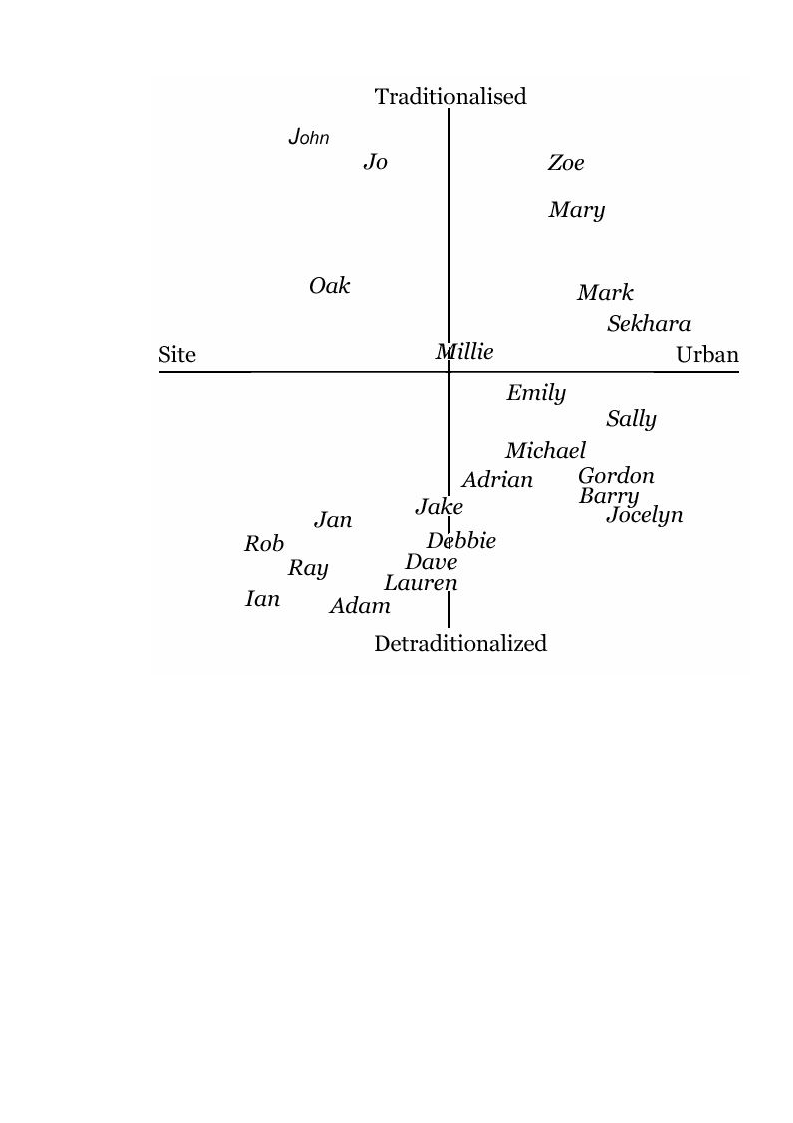
Fig. 7: A Typology of Eco-Paganism
100

Chapter 7: Autoethnography: “You’re not just studying
then - you’re living it.”
"I should not talk so much about myself if
there were anybody else whom I knew as well".
Thoreau, Walden or Life in the Woods.
lREVISED
lChapter 7: Autoethnography: “You’re not just studying
then - you’re living it.”
"I should not talk so much about myself if there were anybody else whom I
knew as well".
Thoreau, Walden or Life in the Woods.
Autoethnography is an aesthetic activity as much as an academic one in
that it tells stories that invite the reader "to put themselves in our place"
(Ellis and Bochner, 2000: 751). As such I must create an evocative
reconstruction of life on protest sites that remains true to my experience.
Although I've made minor additions to my original material for
clarification, all substantive comments are verbatim and events occurred
as described. Aliases are used throughout.
As autoethnographer, I am "a boundary-crosser" whose writing reveals
"multiple, shifting identities" (Reed-Danahay, 1997: 3) that reflexively
locate my personal sense of the research process. It thus becomes
apparent that "in the field we are in dialogue with ourselves as much as we
are in dialogue with others", and how fieldwork becomes a "'personal
voyage of discovery'" (Bruner, 1986: 15). An autoethnographer's work
typically reveals the "contradictions they experience" (Ellis and Bochner,
2000: 738), and such contradictions are an inevitable part of life on a
protest site. We are inevitably caught in these contradictions, and the
extent to which I lacked that awareness while on site reflected my
embodied situation. Denzin emphasizes the way autoethnography
combines autobiography with ethnography (Denzin, 1989: 27), and I
integrate my wider life experience because it " has ethnographic interest"
(Reed-Danahay, 1997: 9) and provides valuable material for analysis in
chapter 10, 'A "sacred relationship with the world"'.
BOUNDARIES
We usually imagine the border between academic discourse and
101

emotional engagement to be well policed, but I now know it to be
frangible. I sit in the lofty white space of ‘Humanities 1’ in the British
Library, sitting dutifully at desk number 2177. But I am not engaged in
bookish research. My reading has been closed by a memory of such
emotional intensity that I almost weep. Reading Beverley Butler's33
account of the M11 link road protest suddenly flashes back the laughter,
the pain, the passion and the madness of it all. She visited Clairmont Road
as an academic at the moment of its greatest wonder: I visit her written
account as an activist long after its demise. Mine is a very different
journey, and I am marked by it.
The moment brings to me the slippery nature of this work. It is not head
work, all neat and analysed. Nor is it art, an overflow of feeling flooding
the page. My work must live in some third space that celebrates emotional
involvement yet honours academic discourse. I’ve glimpsed such a hybrid
in the work of others, so I know at least that it is more than mythic.
My supervisor sits back in his chair. “Well, your chapter headings are fine
…” Dramatic pause. “… if you just want to produce a piece of philosophy”.
He poses like Rodin’s Thinker.
“No, I want to ground it in fieldwork. I’ve included an outline of that in
Chapter 9.”
Oh yeah, I think to myself; after 'Embodied Metaphor in Magico-religious
Practice', 'Phenomenology, Embodiment and Ecological Understanding'
and 'Knowledge and the Body'.
“OK. If you want to do fieldwork, then this is out of balance. There’s too
little and it comes too late”.
I know that what he’s getting at: How much time do I want to spend on
theory and how much on fieldwork? I’m really interested in how
embodied knowing might tie in with ritual and changes in subjectivity, so
I guess that means I need to leave the warm familiarity of the library and
get out into the unknown world of fieldwork. Scary!
The Visit
Field notes:
It's January and I’m on a train going west. It started snowing just as the
train left London and the fields all around are now dusted. Not ideal
conditions to arrive in! Still, it may delay work on the road. I hope so.
When I spoke to Jill on the phone she emphasised how “bloody beautiful”
the woods are.
It was snowing pretty steadily as the train arrived at my destination
33 Butler, in Harvey 2003.
102

and the bus driver joked that I’d need skis in the woods. I smiled through
my mixed feelings: I have the usual slight anxiety at heading into an
unknown situation, tempered with a certainty that this is where I need to
be right now and all will be well. Why am I so certain? My first thought
is that this is in accord with the pattern of my life. Not being here would
be a denial of how I identify myself. It’s living the life I’ve created.
Dusk is falling as I get off the bus but within 15 minutes I find myself
walking down the rough path towards the camp. A voice hollers out a
"Hello!" from the bank above me. "Hi! It’s Adrian – I phoned the camp a
couple of days ago." I’m aware that at this moment I’m no more than a
shadow in the dark, so I want to reassure them that I’m a friend. "Oh, hi!
Come on up. There’s a gap in the fence over here". A guy who introduces
himself as Bob meets me with a smile and leads me to the fire pit where
five others sit huddled round the warmth.
“Hi, I’m Adrian. I’m an old mate of Jill’s and she was telling how amazing
it is here.”
“Hi. Good to meet you. Always good to see new people. You staying long?”
“ No. Just for a few days.”
“OK - Always good to have visitors! Have you got a tent or something? You
can always sleep in the communal bender if you like.”
“I’m OK. I’ve brought a tent and stuff. Guess I’d better pitch it before it
gets too dark.” I head off and find a spot to pitch my tent near a tree. It’s
not exactly sheltered, but it’ll provide some protection from the wind. I
hope.
Back at the fire, I get chatting to a young woman of about 20 who’s ‘site
name’ 34 is ‘Ness’. When I tell her a bit about my understanding of Eco-
Paganism she smiles with recognition and says "Oh, I guess I’m an Eco-
Pagan then!" I smile with a different kind of recognition as this experience
is quite common in Paganism in general. You don’t get converted but just
realise there’s a name for what you already believe. My problem is that the
name ‘Pagan’ doesn’t fit me so well these days. I remember how the first
draft of my Literature Review became a rant about how disconnected from
the land mainstream Paganism is and my growing sense that it’s lost the
plot. If it ever knew it in the first place! I keep quiet about my doubts as
we chat round the warmth of the fire for fear I might break the spell.
After a few rounds of red wine it’s time for bed, so we all crunch through
the snow to tents dotted round the camp. The snow is inches deep now
34 About a third of the people I met on protest sites used an alias which they referred to as
their ‘site name’. Typically this was only used while on the site or involved in a protest action.
Although the site name was supposedly to avoid identification by the authorities it appeared
to have little practical value.
103

and even wearing all the clothes I have I’m cold as I struggle to get some
sleep. We must all be crazy.
Next morning is bright and cold. The fire pit is warm and Bob has made
some porridge. Joy!
"Hey, Bob, Any idea where that came from?" A spotlight of morning light
picks out a Brigid's Cross hanging in a tree opposite. It's woven from corn
and tied with a thin red ribbon, just like similar crosses I've made myself
to celebrate the recent Pagan festival of Imbolc.
"Oh yeah. A couple of Wiccans came down a few weeks back and put them
up".
I'm intrigued now and pleased to see such overt Pagan practice. "Really?
Are they around much?"
"No", Bob replies, a little sadly. "They came down for a quick visit and we
haven't seen them since."
I share his sadness, but for more complex reasons: I was initiated into
Wicca over ten years ago but have seen very little in the way of
environmental action amongst those who share that path. It would
enhance more than just my ethnography to meet Wiccans on the site.
Field notes:
Jill came over last night and we sat by the fire to catch up over a cuppa.
It's been a few years since the last big round of road building, and she
had a sense that this marks the next turn on the spiral that started at
Twyford Down. Ah, Twyford! Jill and I reminisced about those younger
104

days and how she has a sense that the magic is turning, rising to inspire
a new generation of eco-warriors. We’re both part of the ‘old school’, the
veterans who were at Twyford and Newbury who thought we’d beaten
the Tory road builders only to see a new and smarter foe emerge. But
protest is growing and perhaps we can turn the tide.
The next few weeks are crucial as the contractors are rattled by the
protest and behind schedule. Morale is high and we’re building more
defences everyday. Jill moved house recently so can't spend much time
here now, but she thinks we can win this one. Let’s hope so: There are
bats, owls, badgers, dormice and toads in these woods. Sadly I need to
get back to London tomorrow and I feel a little frustrated to be leaving
so soon. A part-time PhD makes this kind of fieldwork almost impossible,
so somehow I have to get funding to go full-time.
Arrival
Field notes:
Late autumn and my studentship has turned my life upside down: I have
time to do in-depth fieldwork and now I can't afford the rent on my
London place I have a push to do it! A few long days ago I was in
London phoning the camp from my flat. Now the flat is empty and my
material life sits in store. No word from any of the Housing Co-ops I’ve
applied to, so it’s up and off.
I arrive at camp in darkness and wander towards a fire which burns
brightly in an old washing machine drum. A circle of faces look up as I
come into the light.
"Hi. I'm Adrian. I spoke to Dave a few days ago about staying over."
"Oh, yeah. Hi! That's me. Grab a seat and sit yourself down. Always happy
to see new people!"
Dave introduces the site crew: Phil, Ray, Jan, Tom, Oak, Debbie and
Lauren. Lauren explained that she's "just a visitor" for now, so will be
headed home soon. "Don't worry - We'll soon get you moved in!" Said Phil
with a laugh.
We sit and chat for a while and then Dave offers to show me a good spot
for my tent. "So, you staying for long?" He asks as he helps me set up.
"Not sure yet. I'll be here for a couple of weeks at least."
"OK" Says Dave with a smile. "See you in the morning. Sleep tight!"
After a cold night it's inevitably late morning by the time I struggle out of
105

my sleeping bag and head briskly towards the communal bender for
breakfast. A head pops out of a tent: Jan wishes me "Good morning" with
a smile.
In the communal bender, more smiles. "Hi, I'm Sam. Cuppa?" Says a
bright, friendly woman as we meet over the kettle. "Yeah, love one thanks.
I'm Adrian. I don't think we've met?"
"No. I live nearby, in town." She says, by way of explanation. "But I visit
every week. Are you living on site now?"
"Yeah. I'm doing research into the spirituality of protest sites - studying
what I call Eco-Paganism. Well, that and helping with the protest. I used
to be really involved years ago and it felt like time to get my boots dirty
again." Suddenly we're talking about the M11, Twyford Down and
Newbury. Sam has heard of them but has been more involved with
Greenpeace style campaigns which are much less anarchic. "So are you an
'Eco-Pagan' then?"
"Yeah - Have been for years." I say with a shrug.
"Oh." she responds, with a smile: “You’re not just studying then - you’re
living it.”
I nod, thoughtfully. She's hit the mark of course, and makes me even more
aware of my dual status here, the ambiguity of my motives. I try to change
the subject a little. "Are there many Pagans involved here?"
Sam hasn't told me much about herself until now, but, perhaps following
my lead, shares. Yes there are several Pagans involved with the campaign,
including her friend, Millie, who I haven't met yet. Sam tells me Millie
might be popping in tomorrow, so we should talk. "I do like the Pagan way
of looking at things, but I'd call myself a Christian, though I'm not
involved with the Church".
We sit and chat about spirituality for a while until Sam finishes off her tea
and gets up to leave."See you later!" Sam says, as she wraps up in her coat
and heads out into the cold.
Field notes:
The activist in me hears that 111 trees are under threat, while the
researcher notes that Millie is a Pagan. To be honest I feel more activist
than ethnographer, but a ‘third position' 35 perceives that there need not
be any conflict between the two, and in fact my activist status should
enhance my ethnography. I’d really like to talk to someone with
35 I’m using the term ‘third position’ in the sense used in Neuro-Linguistic Programming (NLP),
where it means “a step outside your view and the other person’s view to a detached
perspective. There you can see the relationship between the two viewpoints”. (O’Conner,
2001: 33)
106

experience of this kind of dual role. Maybe Susan Greenwood? I’ll call
her.
I wake up and cringe: I've been here ten days now and I’m getting fed up
with having to leave site to go to the loo. Most people use the public toilets
that are about 20 minutes walk away, though there’s evidence that not
everyone bothers. So I suggest to Oak that we build a compost toilet.
“Yeah. Go ahead. Maybe down the far end of site.” For a moment I’m not
sure if he realises that I don’t have a clue about how to do it. I have all the
practical skills of a highly trained academic – zero. But this isn’t South
London; I can’t just phone up a compost toilet builder or ask my landlord
to sort it out. We do it or it doesn’t get done. So I grab a spade and get
digging. Once I’ve started, Oak is happy to make suggestions about how it
might work, and by the afternoon we’re both banging nails into the pallet
wood walls. As we finish off the compost toilet, Oak explains his next
project: He wants to build a really high and well defended tree-house –
one that will be really hard to evict. And he’d like me to help build it.
Field notes:
Several people here – or visiting regularly – are ‘Pagan’ in some sense.
Millie celebrates (at least) some of the main festivals and attends the
local Pagan moot. I asked her about the moot, and she said they weren’t
very interested in environmental activism. I let that pass without
comment. Still, I get the impression from talking to people here that
some form of intuitive spirituality is common. I know Andy [Letcher]
said as much36.
Time passes strangely on site: days feel short yet looking back over a week
it seems like a fortnight. My second week has been enjoyable, though I've
become increasingly confused about my role at the camp, so it's been a joy
talking to Susan about my fieldwork. She doesn’t just know the issues
academically – she’s been there.
“I sometimes wonder whether I’m doing what I should – As it is the
University just paid for me to build a compost toilet on a road protest
site!”
I’m making a joke of it, but my quandary is serious.
“Don’t worry – That’s all part of your work. I learnt how to bake cakes
during my PhD fieldwork”. She grins, and then goes on. “All that is part of
your ethnography. You need to live the life to really understand it.”
Fine, but that’s not really why I’m here.
“But I get confused about my role there. It’s just the kind of place I would
have been anyway a few years ago, but now I’m not there as an activist,
36 Letcher, 2000.
107

but as an academic. Or am I? I dunno. I feel like I need to keep ‘switching
hats’ from one to the other and it’s been doing my head in."
Susan shrugged: “It’s simple – You’re both all the time.”
It was like someone turned the lights on in a room at dusk. “Ahh! I see! So
it’s not a problem – being one or the other - I’m both”.
“Well, you decide, but it sounds like it from what you’ve said. You’ve been
mixing the two for years anyway. We can’t split ourselves up into boxes –
How you feel will obviously influence how you think, so own that. You
might be able to actually use it in your research. Note down how you feel
about living there. Given that you’re researching embodied knowing you
might get something useful from it.”
I leave Susan's place with a smile. Realising I can be both activist and
academic without compromising either is the best news I’ve had in ages.
Back at the camp, I'm welcomed with hot food and as I sit down to eat I'm
aware of a sense of real belonging.
THE TURNING
Enchantment
I slept like a log last night and get up early, keen to get to work. First
things first: The compost loo is a real boon and gives me an odd sense of
pride every time I use it. That feels a bit peculiar, but I guess I've never
thought of myself as being remotely practical, so helping to build
something so fundamental to our lives here is significant. That's all great,
but I can't help wondering how long I can stay here just on the principle
that I’m doing good work for the campaign! I really need to make some
progress with my ethnography or I can't justify being here. But then Susan
did say just being here is all part of the ethnography. Might as well enjoy it
then!
"Fancy a cuppa tea?" I'm doing myself one and always ask round. '"Yeah -
Builders, please" says Oak. "And a herbal for me", Jan adds. They're
chatting away in what serves as our lounge when it isn't a crash space - a
small, slightly better waterproofed area where we keep extra bedding. I
wander over with the tea and sit on an old sleeping bag. Then my ears
suddenly prick up:
"I'd like to do a Land Blessing. We've been here a few weeks now and no-
one's done anything for the site yet". Oak isn't particularly talking to me,
but to Jan. They're old mates who've done ritual before, so she's the
obvious person for him to share the idea with. I listen for a moment, and
then chip in. "I'd really like to be involved if I can."
108

"Oh right, yeah, you're Pagan aren't you? Sure. Have you done anything
like this before?"
I realise that I've kept fairly quiet about my own practice as I wanted to
give space to hear other people's voices. In fact I have some ten years of
experience and have facilitated several rituals on protest sites in the past.
But the last thing I want is to be seen as some kind of expert, so I keep the
details to myself as I say: "Yeah, some."
"Great! Fancy inviting an Element or something?"
Perfect! "Yeah - Cool! When?"
After some discussion we agree that a week on Sunday will give us enough
time. "Excellent! Looks like we have a plan!" Says Oak with a grin.
Field notes:
I met Jo today. She’d visited the site before I arrived, and I’ve seen her e-
mail messages on the ‘Pagan Warriors' e-mail list. She’s just read an
article in the latest 'Pagan Dawn37 about our escapades at the G8 last
year, so that got us talking about Pagans and activism. We agreed that
it was great that Pagan Dawn was publishing more about activism now,
but Jo didn’t think it would make any difference to most Pagans. She
sometimes goes to the local Pagan moot, but she doesn’t think they are
interested in our campaign. Worse, one of them told her we were
wasting our time. Jo went off on one then, and went on to describe a
Pagan fair she’d been to in London where everyone was wandering
around clad in black velvet robes. She couldn’t understand why they
weren’t more interested in the environment and implied they were quite
shallow. I told her I’d come to accept that some Pagans were not
environmentalists, which isn’t quite true: I understand that
academically, but still can’t embrace it emotionally.
I wake up and give a broad grin: That's one of my last nights in my cold,
cramped, tent. I'm building myself a place to live, so Oak, Ray and I are
headed over to some nearby woods to cut bender poles this morning.
With that happy thought, I wander down to the communal for breakfast to
find Jan is also a very good mood, despite piles of washing up.
“You look happy this morning!”
“Yeah, I’m going to plant seeds today. I love doing that.” I look vague,
wondering why. She give me a big smile as she explains. “It makes me feel
like I’m talking to the Goddess.”
I'm still pondering the profundity of Jan's joy as we arrive at the woods
where we'll cut the bender poles. Oak and his partner live here in a
37 Pagan Dawn is the magazine of the Pagan Federation.
109
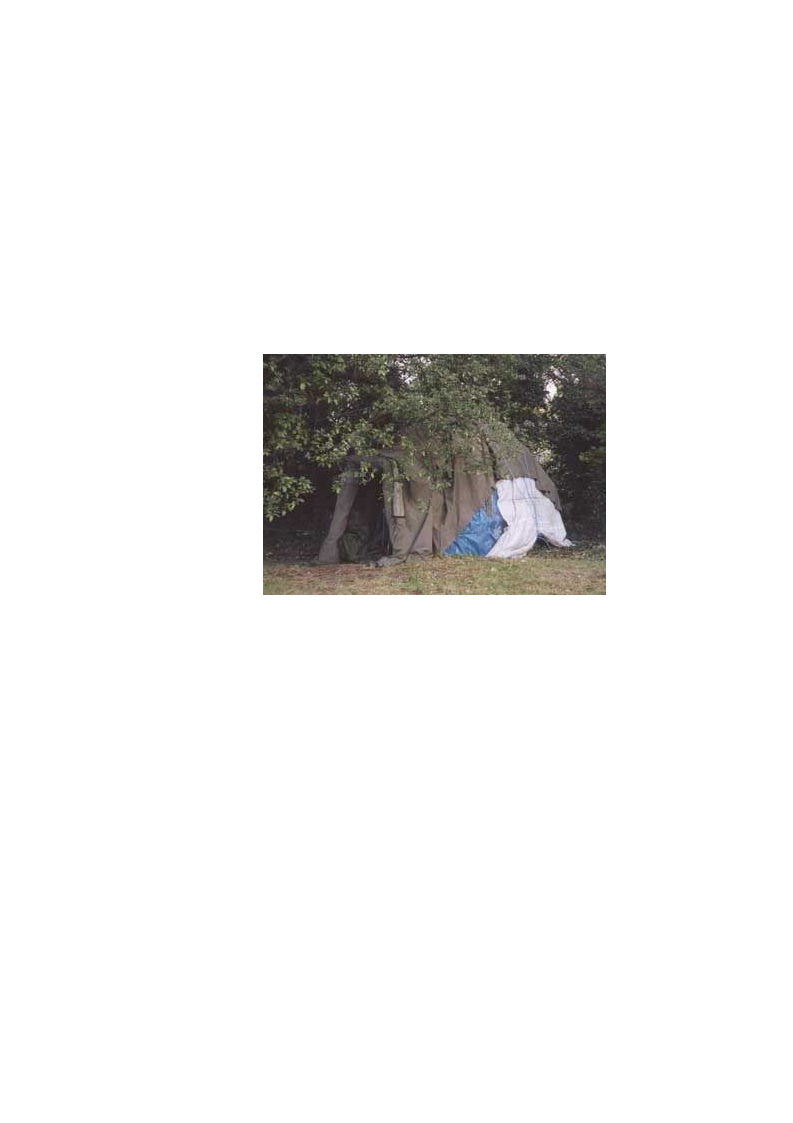
wooden house he built for them. Ray and I both need poles, so Oak shows
us what to look for: The poles need to be straight, not too thick and nice
and long. It looks easy enough, but it's not: I just can't see the wood for the
trees! After a while looking far too hard for the right poles, I begin to get
the knack: It needs a particular sensory acuity that feels like I'm relaxing
into it and opening myself up to the space. Now I'm looking less and
seeing more.
I seem to be doing OK, but then Ray starts going on about how "Oak made
it look so easy" and we can’t find the poles like he can. I begin to lose my
confidence as I take his doubts on-board and suddenly the bender poles
disappear into the trees again. Still, all's well, as when it comes time to
leave we have more than enough.
Sitting outside my new bender watching the waxing moon, I think, "This
is my Paganism!" To worship something you have to be separate from it,
but I don’t feel a need to worship nature. Actually, its stronger than that: I
don’t feel it would make sense, because I am nature. My Paganism is an
expression of a deep love for nature that doesn’t seek to reify it.
[N.B. I FIRST NOTED THIS FEELING WHILE VISITING A
DIFFERENT CAMP, BUT STILL FELT THE SAME WAY AT THIS ONE.
IS IT OK TO LEAVE THIS HERE? I'LL CUT IT OTHERWISE].
In the trees over by the railway I hear crows squawking. On the opposite
side of the Camp the road drones by. The contrast seems poignant: Life in
place, as part of a sustainable ecology sits opposite an oddly pointless
series of individual journeys.
Field notes:
I’m still not sure how to describe the bodily feelings which arise during
spiritual work. Last night we talked about how the site ‘felt’ to us. Dave
110

said he had a strong feeling from the site in the first few days. I ‘felt’ a
strong ‘energy’ when I held ‘Mr. Pointy’ [Oak’s antlered stag skull] and I
had a different feeling when I was opening up my senses to the woods
while looking for bender poles. But how can I articulate those feelings?
They are the very essence of the work I want to do, but they are so
outside conventional language use.
Are Eco-Pagans more conscious of aware of using embodied cognition?
Is that what I mean when I say that the most important thing I’ve learnt
from Paganism is how to listen to my intuition? Note that I crossed out
‘more conscious of’ and used ‘more aware of’. I am mistrustful of the
conscious/unconscious duality. I suspect it will turn out to be an illusion,
or at best, a misleading oversimplification.
Before I came here I had all kinds of notions about keeping academic
distance during fieldwork. Ha! Such ideas are now lost amidst the rush of
life here, and I find myself sitting in the communal bender helping Debbie
come up with a way of inviting the Spirit of Fire to our Circle this
afternoon. My being here inevitably has an impact and trying to artificially
minimise it seems naive and insincere. So I leap in and behave exactly as I
would have years ago at the M11 or Twyford.
"So what does fire mean to you?" I ask. I am careful not to impose my
ideas, but try to help Debbie find a calling to Fire that works for her.
"Heat, flames, passion, red, ..." Debbie has an affinity with fire anyway,
and words and half-expressed feelings are quickly sparking. Before long
we've forged a short but powerful calling that Debbie can truly own. And
not before time, as Jan looks in to call us to the Circle.
Field notes:
Ritual went well. I nearly wept after Jan’s short and very simple
invocation of the Goddess though it wasn’t much more than one line:
“Welcome to the Goddess of the Well”. Oak suggested that this was
because she expressed such a strong belief. That resonates.
Ray wept openly at the end and I did a grounding meditation with him.
He found the Elemental callings very moving, but isn’t sure why. I did
some interviews after the ritual. Fascinating!
I wake up with the remains of a dream. All I can remember is a man
saying to me that answers don’t come in a simple moment. He didn’t say
any more, but the implication was that solutions emerge over time.
Mulling over my dream, I wander down to the communal for breakfast. I
need some food before getting to work on what I suspect will be a long
day.
Looking up into the branches, I forget myself for a moment and speak my
111

thoughts out loud. "God, that looks sketchy!"
"Yeah. I don't like going up, but it's gotta be done". Ray gives me a crooked
grin, and starts to climb. Building work on the tree house hasn’t been
going well. It’s pretty high and getting a shape, but it’s really not safe. It
occurs to me that no-one bothered to check with the tree before sticking a
house in her branches. We should at least do a simple ritual or make some
kind of offering. I’ll get a bottle of something and go up this evening when
the day’s work’s done. But right now I need to give Ray a hand. Oak is
planning to leave the area to do some travelling in a few weeks, so we need
to get as much done as we can while we have the numbers. Whether we
get this finished by then or not, I’ll really miss him.
By late afternoon work on the tree house is done for the day so I gather my
stuff into a small rucksack: a bottle of wine and a Dragon Tree Rune38 on a
cord. I’ve opened the bottle and stuffed the cork back in - I don’t want to
be fiddling about with a corkscrew up there. It’s a beautiful afternoon -
cold but bright without much wind, for which I’m most grateful. I can
cope with the height, but if the wind is up it gets a bit hairy. The climb is
easy today. That bodes well. I get up high to where the platform will be
and settle in as best I can. Laying back on the branch, I sink into myself
and beyond, into the tree. I can sense anger at the intrusion. We’ve been
careful not to damage the tree but it’s used to birds not hairless apes! I
spend some time visualizing two possible futures: one with the tree house
and maybe many more summers here; the other without our efforts and
probable felling within the next few months. I get a sense of
understanding from the tree and come back to my usual, ‘sitting 20
metres up a tree’ awareness. I tie the Dragon Tree Rune onto a small
branch near my head and share some wine with the tree. Though I
probably enjoy red wine more than the tree does, the symbolism feels
right. With a sense of something having been settled, I carefully climb
down to earth and head off to the communal fire. No point wasting the
rest of the wine!
Field notes:
When I lived in London I used do a brief ritual to greet the Elements.
Why aren’t I doing my Elements ritual anymore? ‘Cos it’s all here!
Everyday I go and collect water, everyday I light a fire; I walk on the
bare earth and spend most of the day under the open sky. In London I
needed to make an effort to stay connected – here it just happens.
It's Sunday, so wandering into the communal space at 8.30 I'm surprised
to see people already up, clutching mugs of hot coffee. It turns out the
Jehovah’s Witnesses came this morning. "Bastards!" Says Dave, with a
good natured grin. "They turn up at 8 o’clock on a Sunday morning with a
magazine called Awake!’ Gotta laugh I suppose."
38 The Dragon Tree Rune is symbol used by the Dragon Network as an amulet.
112

Ray kicks off with a bit of a rant about their last visit and how they’d said
God would sort everything out. "I told them don’t believe in God – well,
not their God anyway. I believe in the Earth, not religion".
As we have breakfast a visitor arrives: Paul introduces himself by
explaining that he's a long-term activist and when he heard about us
decided he'd like to help out for a few days. We share a cup of tea and I
offer to show him round. As we walk round and admire the trees, he says,
“There’s an energy you get living outside that you don’t get in a house.” I
smile. I know just what he means, but wonder how I'm ever going to
translate it into my PhD. Later, as we chop wood enthusiastically, he
returns to his theme. "That energy I was talking about is what was keeps
you going when there's loads of work to do".
Even munching on lunch I still need to be attentive, as a simple comment
can be profound. Jan reflects on life on site: “I feel free here. I’m back to
being myself.”
Free. Yes, I’ve felt that myself. A feeling of lightness, sense of openness.
It's great to hear other people express that too - It's not just me then! Once
again, my own unspoken experiences are confirmed in apparently quite
casual moments. There's certainly something special about this place - A
sense that anything is possible. Yesterday when a car drove past shouting
abuse, I joked that “The inmates are restless.”
Dave laughed, but we both knew that my joke had a more serious edge. I
later commented that when I’m not here I see it as a ‘bubble of sanity’. Jan
laughed at that, but she understood what I meant. I then explained how I
see this as the staff room of the asylum. Perhaps the subtlety of that
escaped some of those gathered, but others chuckled with approval.
While cleaning my teeth tonight I watch the cars drive past. I stand on
grass, beside a tree in a space lit by the light of the half moon. They sit in a
metal box, closed off, closed in. Although we are only separated by a short
distance – maybe 10 metres – psychologically we occupy different worlds.
The fence that surrounds this camp draws a very significant line between a
self-created space of freedom and one of control. Lighting my wood
burner tonight I think of Thoreau at Walden. Although our lives are quite
different in many ways, I suspect there are deep resonances between us.
That evocative phrase from Robert Greenway that ‘civilization is only four
days deep’ comes back to me, and I suspect it is even more fragile than
that: removing just some of the trapping of the 21st Century can
profoundly shift our awareness. That is a powerful phenomenon, and it is
perhaps what lies at the heart of the protest movement.
Field notes:
I’m feeling a bit rough. I read recently about how hard ethnography can
be, and I’m feeling it today. So much to juggle! The demands of life on the
113

site, work on defences, the emotional intensity of this place, my own
spiritual puzzles, plus the constant need to watch myself and others for
ethnographic data. That is an emotional strain of a quite unique kind.
There have been quite a lot of changes here lately. Oak’s gone and better
weather has brought lots of new people on site who are still an unknown
quantity. More people are good for the site in lots of ways, but it has
cranked up the intensity. It’s a bit like living in a soap opera here
sometimes; there's always some minor – or not so minor – crisis. To be
expected I guess. Large numbers of people passing through a liminal
space will interact at a more intense level.
Feeling and Focusing
“Hey, Adrian - Wanna beer?”
“No – thanks.” I smile politely. Just sitting round the fire pit with some of
the crew tonight, but feeling a bit odd. Bored and a bit restless. Probably
need a bit of time out. “Just going to get a fleece from my bender,” I lie,
and wander away from the glow of the fire. What’s up with me? Wish I
knew. Then I remember a book I just got on Focusing (Gendlin, 1981)
that’s supposed to help you get to stuff like this. Seems like a good time to
give it a try.
After a quick read over the instructions, I lie on my bed and I close my
eyes.
1: Clearing a Space.39
OK. So what’s here, inside? Somehow I’m missing how the site was a few
weeks back ... And I’m missing Oak ... Unsure about the new people … I
don’t get any feeling like ‘bored’ though … Maybe that wasn’t it at all …
2: Felt Sense.
… sense how it feels in your body when you think of it
as a whole …
Oak going has left a hole … a kind of emptiness … but sticky … and dark.
The felt sense is the holistic unclear sense of the
whole thing … It is murky, fuzzy, vague.
It’s changing now and is more than emptiness … It’s wobbly … no … sort
of unsafe, like standing on rotten floorboards that aren’t quite safe.
3. Handle.
What is the quality of the felt sense?
39 The instructions on Focusing that follow are from Gendlin, 1981
114

Yeah – ‘standing firm on rotting floorboards’. Mmm. That feels right. I’m
feeling better, but can’t remember what the next step is. I pick up the book
again.
4. Resonating.
Oh, yeah. I guess I’ve just done that. Next comes:
5. Asking.
Now you can ask it what it is … One of the most
important procedures in focusing is this asking of
‘open questions’.
Ah. Kind of like an interview. “I’m curious to know what you might be
about.” A sense like ‘falling’ comes to me. “Are you about fear of falling?” A
twinge – Yes, it’s a kind of ‘fear’. That unsafe feeling comes again. “Is
‘unsafe’ right?” Another twinge, but that’s not quite it either. It’s like
playing 'hotter-colder' when I was a kid. There’s something not as strong
as ‘fear’ but not just ‘unsafe’. Yes – my felt sense twinges again like it’s
saying “yes – warmer.”
Circling patiently I slowly get the sense of it: There’s my own feeling of
insecurity, but mixed with that there’s a need to be strong for the camp, to
help hold the space safe. When Oak was here it was easier, partly as he
was really grounded and partly as things weren’t so unpredictable then.
Cool! A grin comes across my face. Weird – How come I’m smiling but
haven’t sorted anything?
The body shift is mysterious in its effects. It always
feels good, even when what has come to light may not
make the problem look any better …
Oh, OK. And finally:
6. Receiving.
Whatever comes in focusing, welcome it. Take the
attitude that you are glad your body spoke to you,
whatever it said.
God, that feels better! I think I’ll just lie here for a bit and ponder this. I
had no idea that something so simple could work so well. A moment later
my mobile chirps: I have a text.
[You OK? Hol x]
115

I smile and text back:
[Yeah. Fine. Back in a mo. A x]
Changes
My mobile sings. I have a text from an old mate in one of the Housing Co-
ops I applied for. With a shock I read that they have a vacancy in the
house – Can I come for interview? Well, yes ... And before I know I‘m
booked for Wednesday night.
“Looks like I might be offered a place in a housing co-op. Some old mates
have a vacancy.”
“Oh. Great …” Says Jan in a tone which translates that into “Oh. Shit ...”
I’ve been both dreading and looking forward to this. I’ve been finding it
increasingly stressful here trying to manage needs – my own, other
peoples, my research. But I know this won’t be an easy transition for any
of us.
Wednesday comes round fast and here I am, back in London. The
‘interview’ is more like a reunion as we’ve all known each other for years.
As the room is already empty they’re keen for someone to move in soon –
and even keener that it’s me! On one hand, I’m delighted as it means I’ll
have a stable base. Writing up is a nightmare on site and here I can get my
books out of storage and get down to trying to make sense of what's going
on. But somehow I don’t feel ready to return to this more conventional life
and feel strong emotional ties to the Camp.
“I’d love to move in. But if I do, I will be spending a lot of time at the
Camp. Is that going to work for you?”
“That’s fine! We thought you might say that …” Smiles. “When can you
move in?”
It needs to be soon or I’ll lose my chance, so a day next week is agreed.
Smiles and hugs all round as I leave to head back to the Camp.
Thankfully I get back late so no-one can ask me how it went. I need a
nights sleep before telling everyone here what they pretty much already
know – My ‘exit strategy’ has begun.
The next week drags on, and finally I wave a temporary goodbye to the
Camp. “I’ve told them I’ll be spending a lot of time here and I’ll be back in
a couple of days”. That seems to have eased the way and I get a sense that
people are really pleased for me. Still, it feels very odd getting on the train
for London knowing I’ll be sleeping in bricks and mortar again tonight.
116

And so it’s done. The wheel turns again and I’m back living not very far
from my old flat, where it all looks so very familiar. But everything has
changed and there is no simple return.
RE-TURNING
Life is as strange as ever. I’d imagined that having a base in London would
somehow make it easier when I’m at the Camp, but it hasn’t worked like
that at all. In many ways it’s harder now, as one mode of life rebounds off
the other, echoing through the days. The result is an oddly dislocated
time, and I often wake up wondering whether I’m about to open my eyes
to four square walls or the curve of a bender.
I'm reading about the M11 again in Butler's article, and as before I have to
stop for a moment. My eyes water, as emotion rises in a flood. I recall an
awkward moment in the British Library when I almost bust into tears
reading this same article. Butler tells the story of Crow, the Shaman, but I
just can’t read it now. I lived that story: I was one of the Dragon people
Crow speaks about, so I’m part of that myth. I guess I still am, as past and
present are caught up in my long journey: First realising the paradoxes at
the heart of Paganism, then finding another Paganism on protest sites,
and now beginning to articulate it from my own perspective – one which I
hope will be true to our shared experience.
Reading about approaches to fieldwork now makes me smile: My
experience makes nonsense of any naive assumption that there is a ‘field’
we enter and then later make a dignified ‘exit’ from. It’s become clear to
me that in some fundamental sense I never left the field – or ever ‘entered’
it. I am the field and at the heart of my research methodology lies a
heightened reflexive awareness of my life world that enables me to sense
the process of embodied knowing.
Proverbios y Cantares 29
Walker, your footsteps
are the road, and nothing more.
Walker, there is no road,
the road is made by walking.
Walking you make the road,
and turning to look behind
you see the path you never
again will step upon.
Walker, there is no road,
only foam trails on the sea.
(Machado, 2004).
Conclusion
117

In addition to providing a vicarious experience of life on a protest site, and
thus enhancing felt understanding, this autoethnography develops several
of the thesis' themes. It contributes to my ethnography of Eco-Paganism
by providing details of how it feels on a site: for example the physical
exposure, the camaraderie and the way time passes. The gradual influence
of the place on my own spirituality is also apparent. The chapter
problematizes several conventional dualities, including academic
discourse versus emotional engagement and entering/leaving the field,
thus developing an ongoing theme. My spirituality, my relationship with
mainstream Paganism, and my activism, are all relevant to how I
approach and interpret my fieldwork, so this chapter also provides a
reflexive frame for the ethnographic chapters that follow.
118

Chapter 8: Listening to the Threshold Brook: Urban Eco-
Paganism
"... contented so to look
On mists in idleness - to let fair things
Pass by unheeded as a threshold brook".
John Keats, The Human Seasons
This thesis developed from experiences as an urban Eco-Pagan that led
me to believe that a "deep knowing of the sacredness of the Earth"
emerged from "ecstatic Pagan ritual" (Harris, 1996: 153). In fact I had only
glimpsed part of a complex process of greater subtlety that is ultimately
more powerful than I ever imagined. Perhaps I was too entranced by the
drums to hear the voice of the threshold brook, but my respondents had
sat quietly and listened, just as I have now listened to them.
In general my findings are in accord with other accounts of contemporary
Paganism, as urban Eco-Pagans show a pattern of simple practice
informed by emotion and an embodied sense of the sacred. However,
three obvious features are distinctive: ambivalence about identifying as
'Pagan', a lack of spell-work and the minimal role of formal ritual
compared to mainstream Paganism. More significant is a relationship
with the land or specific places that is catalysed by various processes of
connection. This connection is often understood thorough a felt sense and
can pattern a sacred relationship to the world.
Introducing the Research Participants
I interviewed a representative sample of ten urban Eco-Pagans, six women
and four men, from a variety of backgrounds and locations. They included
one Druid (Zoe), one Reclaiming Witch (Mary), three Shamans with
different approaches (Barry, Gordon and Sekhara) and five very different
eclectic Pagans whose were influenced by a variety practices of including
Witchcraft, Voodoo, Shamanism, Druidry, Goddess spirituality, Buddhism
and Christianity. Mark, one of these five, identified as a "shamanic
pagan". Michael, Mark, Zoe, Sekhara and Sally are members of the Dragon
Eco-Pagan Network. Four lived in London, two in the West country, two
in the West Midlands, one in Essex and one in Derbyshire. Nine had been
involved in protest activism while one has focused on community work.
Seven of those nine had been active at one or more UK protest sites. In
several cases their occupations are relevant: Barry Patterson and Gordon
MacLellan worked in environmental education, Zoe worked with fair trade
imports from Palestine, Sekhara and Michael practised spiritual healing,
Mary was a counsellor and Jocelyn Chaplin was a psychotherapist.
Participants' ages were between late twenties and early fifties, with most
in the middle range. In most cases names have been changed but Barry,
Gordon, Mark and Jocelyn have kindly agreed to me using their real
names. My explicit fieldwork with urban Eco-Pagans between 2004 and
119

2006 is grounded in my own long term involvement - I have been an
urban Eco-Pagan since at least 1990 - which provided insight and prior
expectations.
SPIRITUAL PATHWAYS
Finding a Name
The first of several surprises was the common ambivalence about
adopting the name 'Pagan'. Other scholars have noted that coming to
Paganism is a process of recognition rather than conversion because "you
don't become a Pagan; you find out that there's a name for what you
already were" (Harrow, 2002: 113). Sally exemplifies Harrow's point when
she says: "when I first found Paganism ... I thought, 'Oh fantastic I
understand what I am'". This often profound insight brings a sense of
'coming home', but a newly identified Pagan's "hopes may be fulfilled or
disappointed" (Harrow, 2002: 118), notably if the Pagan community
seems to have a very different practice. Meeting Pagans who had different
enthusiasms and lacked ecological awareness made many participants (8)
uncertain about naming their own path. Was Paganism about a sacred
relationship with the world or was it more about getting dressed up
(Jocelyn and Mark) to join a "Gothy, jewellery flashing social scene"
(Barry) down the pub (Zoe)?
While most researchers identify socio-cultural experience as the primary
influence on Pagans, my research suggests otherwise. Ezzy opines that the
Pagan 'coming home' experience results from an individual recognising
"an integrated framework of thought and practice that incorporates a
variety of more general ideas" (Ezzy, 2006). Social experiences are clearly
significant, and Ezzy mentions "boring church services, dissatisfaction
with repressive cultural norms, leaving home, relationships with
boy/girlfriends etc." (Ezzy, 2006). His model loosely fits three of my
participants: Mary came to Paganism via feminism, Michael through his
girlfriend and Mark from books. But the other seven recalled a 'Pagan'
spirituality in childhood and six cite experiences in the organic
environment as fundamental: Emily grew up on a small holding; Sally
remembered "feel[ing] the grass growing" when she was young, which
"was the most lovely feeling, to feel attached to the earth", while Barry
spent time in the countryside and "grew up" with a sense of "a presence in
nature". Although all of them later read about Paganism, the first spiritual
spark was the organic environment.
Although the cultural factors Ezzy outlines are significant, he, along with
most other scholars (inter alia, Salomonsen 2002: Taylor, B., 2001: York,
1995), ignore embodied situated cognition. The enactive process model
helps explain how playing in the organic environment can inspire spiritual
experiences: As we have heard, embodied cognition uses the immediate
environment to think with, and this process is enhanced when we can "use
all the senses directly, without other people intruding or mediating that
120

experience", so that an "embodied sensuous relationship with nature" can
be afforded (Macnaghten & Urry, 2000; 170-171). This finding also
confirms previous research that childhood play in the organic
environment encourages adult environmental awareness (inter alia, Cobb,
1977; Wells and Lekies, 2006).
PROCESSES OF CONNECTION
Connection
Almost all participants talked about the importance of place and the land
(9), which was understood as sacred (4) and healing (6). They spoke of
having a "sacred relationship with world" (Zoe), loving or deeply
connecting with nature and/or the land, and how they celebrated and
appreciated relationships with specific places. The so-called Pagan 'Sacred
sites' were unimportant to urban Eco-Pagans, and several commented
that they no longer (or never) had the feeling that they must "find some
ancient sacred site" (Gordon). Those who mentioned them at all felt that
the importance of sacred places was "over estimated" (Jocelyn). A
consistent theme emerged that different places are special for different
people, and potentially "[e]very bit of land is sacred" (Jocelyn) and
"wherever you are in the world is worthy of celebration" (Gordon).
Although every bit of land is sacred people felt very attached to particular
places. Emily felt she was "indigenous" to an "actual patch of land", while
Mary's sense of "the Land" was grounded in "that bit of Land down there
that I look at everyday and is so beautiful". This connection was rarely
expressed in the abstract: The sacred is "about my locality" (Zoe); it is
being somewhere that woos you "to lie down on the ground and hug it and
stroke it. Just that feeling of being in the right place. [...] Where
something in me, my spirit, but more than that, who I am, in my body
needs to be in that place at that moment" (Sally). Sally commented that
focusing on a particular place (Cross Bones cemetery) was very helpful in
making a more general connection: "I find having a focus attaches me to
everything really". Thus an intimate relationship with somewhere specific
enables some urban Eco-Pagans to sense sacred relationship in itself:
Paganism is [...] about making sacred relationship with the world
that's around you. [Pause] And that could be with the spirit of your
house or it could be with the dandelion in your drive or the tree or
the old lady who lives next door to you (Zoe).
Just as the tiniest fragment of a hologram holds a perfect image of the
whole, so a relationship with the "dandelion in the drive" or "honour[ing]
the little weed in the garden" (Jocelyn) can pattern a sacred relationship
to the world.
121

The Threshold Brook
The fundamental importance of this communion with place and the
wisdom it can bring is perhaps best expressed by Barry:
[I]f you have a little threshold brook 40, if there's a little stream like
this running through your garden, everyday you get up and you go
to work, it's just there, it's the background. You're not giving it any
attention. That threshold brook is life passing you by, it's a source of
delight to the sensitive soul like Keats. And yet the accountant, with
his head in the cloud, and the deadline and a horrid commuting
journey in the car through the rush hour traffic, doesn't pay any
attention to the threshold brook. And their life is impoverished as a
result. [...] The threshold brook is there. Now how about I actually
spend some time with it? How about I actually show some
appreciation to it? And how about one day, after maybe months or
weeks or however long it takes, maybe how one day no matter how
cynical or jaded or sceptical or clever, or over analytical I was, that
one day this special brook actually did speak to me. And told me
what I needed to hear. And then I got up from sitting by the
threshold brook and walked back into my world a different person.
And that blessing that comes through threshold brooks, using that
as a designator for that kind of experience, [pause] then that is a
very healing thing, and if everyone were doing that then we'd all
have more respect, and we'd moderate our behaviour and we'd get
on better.
Learning to listening to the threshold brook takes time. Michael told me:
For a long time I was only interested in human activity then slowly
came to notice things - or take extra notice of things - maybe that's
the key - I started to take extra notice of things and I tried to get
closer to the animals and the birds.
An important part of his approach "is not to use the mind [...] so that I can
feel rather than think".
Healing
Barry describes the threshold brook experience as "very healing", and
most (6) of my participants made specific reference to the healing power
of place, but I will focus on one particularly rich example. Sally lives in
London and is regularly visits Cross Bones cemetery, an unconsecrated
burial site that was primarily used to inter prostitutes from Medieval
times. For Sally "Cross Bones is a really happy place [and ...] a really
healing place and I will always go there if I'm upset". Cross Bones has
become a sacred site for several London Pagans, and "when the bombs
40 The phrase "threshold brook" is from John Keats' poem in The Human Seasons: "Fair things
pass by, unheeded as a threshold brook".
122

went off in London in July the other year, we did a little ritual at Cross
Bones. It feels like a real place to go with your pain or your grief" (Sally).
The Urban Environment
For many participants the power of place is apparent in urban
environments, and nearly all my participants said the city was special, or
as sacred in its own way as the countryside. For Sekhara "[t]he city is a
place of power" and Jocelyn spoke of the "incredible ancient energy" of
London. Others noted that human beings are nature: Michael lived in
London and is aware that "[t]here's nature all around me - People". For
urban Eco-Pagans anywhere can be sacred, and it "doesn't matter if you're
in the city or the countryside" (Zoe).
Not everyone celebrated the human constructed world, and Emily
preferred "being away from things constructed by humans". Barry was
more ambivalent, and though he recognised the value of urban
environments, was concerned that the city can easily become "a space
built from symbols, a virtual reality, rather than physical structures &
patterns of relationship" (Patterson, n.d.).
Ritual
My literature review explained the importance of ritual for Pagans, so I
was initially surprised that it apparently had a low priority for
participants, with half saying ritual was unimportant or marginal. Gordon
rarely does "formal rituals" and believed that it is "too easy to get caught
up" in "big rituals [...] to save the Earth" which actually distract us from
working actively for change. Sally did not particularly like ritual, and
added that "[i]t isn't really the way that I connect", while Mark did "what
would probably be called a ritual, but a lot of the time I don't see it as
such". However ritual was part of Zoe's everyday life, as she would usually
bless her food, becoming aware of "all the webs and strings of association
and life and death" around it. Her rituals could sometimes be quite
"elaborate or formal", but must be local. Although formal ritual generally
wasn't important, informal ritual practice was, and my participants
enjoyed "spontaneous" expressions of spiritual feeling (Sally); Gordon
created "whatever we need at the time" while Sekhara's rituals were
"impromptu and [...] dr[a]w in all kinds of stuff".
The lack of formal ritual is not surprising given that urban Eco-Pagans are
'earth based' Pagans (Harris and Welch, 2006) who tend towards
spontaneous, unstructured rituals. Eco-Pagan practice contrasts with
Greenwood's ethnography of mainstream Pagans, which found that "there
was more emphasis on ritual ... than a connection, or interest even, in the
environment" (Greenwood, 2005: 175). A comment from Mary is
apposite: "When I do ritual it's Wiccan. [...] That's what I do. But what I
feel is more amorphous, Pagan, love of the Land". The practice that Mary
designates as ritual comes from the Reclaiming form of Wicca, so emerges
123

from the esoteric current. Although Reclaiming have removed the "sexist
crap" (Mary) from Wicca, the " 'unclean' heritage lines" (Salomonsen,
2002: 94) are not so easily cut. It is notable, then, that the amorphous -
and embodied - feeling that underpins Mary's practice is more earth based
than the more self-aware and formal ritual.
Dance and the Erotic
Dancing was part of Gordon's daily ritual practice and was fundamental to
his spirituality:
It's a really big part of who I am and how I express myself. And um,
and, I'm [...] a very sort of sensual physical person. And, dance is
the best way [pause] of expressing that.
Dance "draws you into a different sort of passion" that "fills you and it
shakes you and um, [pause] makes you complete - makes me complete.
Like the aftermath of good sex. It's that sort of- it's a deep sensuality".
For both Gordon and Zoe the erotic knowing of dance connected and
communicated in a way words cannot. Gordon's communication with
spirits and deities often used dance, which is an ideal medium for a being
"who doesn't really communicate through words", and we have heard how
linked dance and passion were for him. Powerful emotion runs like a
stream through Zoe's interview. She explained that her connection to a
place, animals or trees was in her heart and she thought it was "very
important [...] to respond emotionally, really emotionally to [...] what's
happening to our world [...] [a]s well as cerebrally". Later she described
leaving a special place for the last time as "like leaving a lover or a good
friend". She expressed how both feelings and connection come together in
ritual dance:
Adrian: Do you feel your body has a particular role when you're
connecting to a place?
Zoe: [...] If I'm in, ritual, the walking, the walking of the Circle.
[Pause]. The movement that I choose to make. The offering of
something. The movement in my offering. It's like, it's a dance - It's
like - It is like making love to a place. It's a very, conscious, bodily,
sensation of the way my body moves in that place. [...] it's like my
body takes on, a different way of moving if I'm in a sacred place or,
you know a landscape that I'm consciously trying to honour or make
ritual in. Um, so it's like a dance. [Pause]. It's a different way of
moving.
Mary seeks that same passion in her rituals, but unfortunately the local
'Erewhon Pagan Group'41, who she occasionally worked with, "don't get it.
They're not ecstatic pagans. They're cerebral pagans and they do this ritual
41 The name of the group has been changed to preserve confidentiality.
124

- that's sort of 'now we do this and now we do that and then we'll have a
little reading about the meaning of the Circle'42 and all that. But I want to
get out of my head - it's the ecstasy, you're losing yourself in the dance in
the chant, just being completely out of it". Her comparison of "ecstatic"
and "cerebral" pagans correlates very well with the distinction made
earlier between earth based and esoteric Pagans (Harris and Welch,
2006).
When Mary explains that ritual is "like sex" it becomes clear that this is
more than a simple analogy. In ritual:
"[y]ou build it up and you build it up, and there is a sense of the
energy building and you have to peak it and you have to let it go,
and when you let it go you know the ritual is over [...] [The
'Erewhon Pagan Group'] have these rituals where you get to the end
of what's planned, and it's still unsatisfying. And it is a sense in you
body of 'I'm not ready to finish yet'. It's like sex that's got half way
and then you go off and make a cup of tea and come back and have
another go but you never actually get to orgasm or you sort of half
get there and then you lose it and you go away afterwards feeling
sort of ... twitchy. A ritual that raises power without sending it off
makes me twitchy [...] After a cone of power your body feels
different to how it felt before and it's that post orgasmic, Ahhh! Now
I can go home. Well, we can feast or whatever."
Jocelyn talked about the power of the "true erotic that's in the earth itself"
and the importance of "pan-sexuality":
Pan-sexuality being an ability to experience sexual energy and
sexual connection with all kinds of beings, not just with the partner
who you happen to be sleeping with. I think that's a very important
part of of Eco-Paganism in a way, because it also means you can
love nature, um, at an erotic level as well as at a heart level and a gut
level.
Her words echo ecofeminist themes discussed in my Paganism literature
review, especially Eco-Pagan Starhawk's injunction to "love nature ...
carnally, with our meat, our bones" (Starhawk, 1982: 143). Jocelyn later
explicitly ties this theme to my thesis:
I suppose there's something about, not just being embodied wisdom
and embodied knowledge that comes, um from other parts of the
body, it also comes from the sexual, the sexual energy, part of the
wisdom, part of the knowing.
Before concluding this section, I note that three of the four participants
who spoke in terms of the erotic were women and the fourth is a gay man.
42 Mary later clarified that she meant the meaning of the Festival the circle was celebrating.
125

Even allowing for the slight gender imbalance of my interview group (six
women and four men), this may be significant. I return to this topic in my
fieldwork overview, ' A "sacred relationship with world" '.
Magic (Spell work)
Half of my respondents did not mention spell work at all, and those who
did were often critical, like Jocelyn who spoke of those who practice
"dressing up and [...] high magic." Mark also talked about spells in a
critical context when describing people who do not grasp the ecological
element of Paganism for whom "[i]t's more a concept of somebody,
casting spells and um doing rituals and wearing the clothes as opposed to
a Witch". He does do spells if the need arises, but they are "just part and
parcel" of a wider practice. Mary provides the very cogent comment that it
was Hutton's work (Hutton, 1999) that explained to her "why we're using
an essentially magic tradition, to worship the Goddess and to express a, a
spirituality that's to do with the land". Hutton explains how tightly the
notion of magic is tied to esotericism, the same tradition of "high magic"
criticised by Jocelyn, and how esotericism fed into contemporary
Paganism via Wicca. Thus the earth based/esoteric model helps explain
the initially surprising fact that magic (as in spell work) is hardly
mentioned.
The magic that urban Eco-Pagans disparage is the "occult magic"
(Pearson, 2007: 101) of "control and manipulation" (Gordon Melton,
2002: 173). But when they do practice magic it is usually the kind of "
'ordinary magic' " that enables a sense of connection (Pearson, 2007: 101).
One recent example illustrates this well: Shortly after the announcement
of a collapse in many honey bee colonies, a message was posted to the
Dragon Network listserve suggesting members join in an "Appreciation of
Honeybees". The message originated from Arizona Shaman Jade Wah'oo
Grigori, who explains the spell:
... move your awareness into that of appreciation. Perhaps meditate
upon someone for whom you have appreciation and gratitude, an
event that stimulates a sense of deep gratitude. When this is a felt-
sense, a palpable experience within your body ... [d]raw into this
state the image of honeybees ... how they sound, their buzzing
about, their beauty and grace, the wonders of honey as a food and as
a wonderful sweetener of life! Feel that joy rushing through your
body as you contemplate the honeybee (Dragon-network listserve,
2007).
Intrigued by Grigori's references to the felt sense, I contacted him and
asked if he was using Gendlin's work. He replied that he didn't know of
Gendlin or Focusing, but was "sure it is a form utilized by many, as it
works" (Grigori, pers. comm., 2007; author's emphasis). Grigori's
reference to the felt sense is significant, as I identify this technique as
126

fundamental to how Eco-Pagans connect with place. The power of this
approach is apparent in my interview with Zoe: When I asked her about
this spell she responded that "it was very fulfilling" and she "could really
feel [...] a very full heart feeling - Wow! You know a sense of wonder and
appreciation".
Meditation
All participants practised some form of meditation. For Barry meditation
was a "primary process" for being self aware and "unconditioned", while
Jocelyn found it enabled her to be more sensitive to "the energies of
nature". Sally practised a lot of meditation during a year long Priestess
training, and it really got her "attached to the earth":
getting up really early and just sitting still, really focused my mind
on what was happening outside and I would hear the crows, and
they'd get up at a certain time every day and then when the clocks
changed they weren't there any more 'cos obviously they were still
doing the same thing weren't they, and it really disturbed me I
thought, 'Oh I feel all' ... You know. It was that really. Doing that for
a year, really kind of made me more aware of the web, I suppose I
would call it the web of life. Made me really aware of that.
Once again we hear how our "being-in-the-world is bound up with the
immediate environment" (chapter 4: 49). Meditation functions as a
process of connection, as it focused Sally's awareness on the equivalent of
Barry's threshold brook, fine-tuning her sensory awareness of the organic
environment and fundamentally shifting her embodied relationship to
"the web of life". Her training had a profound long term impact, and when
Sally refers back to it later in the interview she suggests that it may have
made her body much more sensitive to significant places (see A Sense of
Nature).
The Felt Sense and Somatic Modes of Attention
Bado-Fralick claims that Wiccan training and initiation cultivates what
she calls the "body-in-practice", a phrase she treats as equivalent to the
'somatic modes of attention' described by Csordas (Bado-Fralick, 2005:
130). Wiccan training enables the witch to "regain the body as a maker of
knowing ... through engagement of the body-in-practice" so that they can
learn to "how to listen to their bodies" (Bado-Fralick, 2005: 80). Given the
link between Wicca and Reclaiming, it is not surprising to find similar
processes in the training of Reclaiming Witches, who learn to "see, hear,
feel, touch and taste with the inner senses" (Salomonsen, 2002: 177). By
working with "inner pictures and feelings" Reclaiming Witches
communicate with what the Tradition calls "Younger Self" (Salomonsen,
2002: 177), the emotional body/mind which operates largely outside
conscious awareness (Salomonsen, 2002: 137) and parallels what I call the
127

deep embodied self in chapter 4. Druidry, which also has close links to
Wicca (Shallcrass, 1996: 69), exhibits the same pattern: Druid Orders
offer training in mediation and visualization, and work with the Awen,43
which "go[es] thorough your whole body" (protest site Eco-Pagan Druid,
Jo, 17/06/07). Many Shamans also learn to listen to the body: Gordon
writes of how the physical ecstasy of dance connects him to a "world that
thinks" (MacLellan, 1996: 147) while Barry explains that a "conversation
with a tree is first and foremost a feeling in your body" (Patterson, 2005:
136). Shamanism however, is more diverse than Druidry or Witchcraft,
and some practice, for example Sekhara's, is less embodied and more
psychologized.
Notwithstanding Bado-Fralick's preference, Gendlin's theory is more
useful than Csordas's notion for discussing this common process. I have
already compared Gendlin and Csordas's models, and explained how we
can describe Focusing as a somatic mode of attention that trains the
practitioner to listen to the felt sense ('Embodied Cognition Literature'
review and 'Research Design and Methodology'). I conclude that my
participants, like Bado-Fralick's and Salomonsen's Witches, listen to their
bodies and become aware of a felt sense, although none of them were
familiar with Gendlin's work. The felt sense is a fundamental process of
connection, as this form of embodied knowing plays a key role in how
Eco-Pagans relate to place: In Embodied Situated Cognition, below, I
explain how the felt sense enables Eco-Pagans to build these intimate
relationships.
OTHER ASPECTS OF PRACTICE
Deity
Practice that involved deity44 brought another surprise, as it was less
significant than expected. My literature review suggested that most
contemporary Pagans "devote themselves to one or more gods or
goddesses" (Cowan, 2006: 179), but while most participants worked with
or worshipped deity some of the time, it seemed to be a fairly marginal
practice.
Michael said emphatically "I don't work with any gods or deities. I don't
disrespect them, but I just don't ask them or call to them. [...] I work only
with the Earth". Zoe "[r]arely" worked with deity and although she was "a
bit intimidated by the idea of deity", she did "have a relationship with a
43 The Awen is a Druid term that refers to divine bardic inspiration and is often slowly chanted
during Druid rituals (Bowman, 2002).
44 Mainstream Paganism - especially Wicca, my own background - often refers to "working"
with deities and this was the terminology I used in my interview question. It was only when
a site Eco-Pagan queried the phrase that I reflected on my usage and I now conclude that it
may have emerged from the esoteric current discussed earlier, although this remains
inconclusive. None of my urban respondents commented on my use of the phrase and most
(7) spoke about "work" or "working" with deity or spirits so I continue to use these terms
here.
128

couple of our native gods and goddesses". Sekhara said deity work
"doesn't seem like a thing I need to put an emphasis on". She worked "a
lot with local spirits" including the Thames as the "spirit of London", but
not with "what you call your serious big scale deities". Brigid was Mary's
"home deity", but she did "work with" others who she thought of "more as
Saints. You have St. Christopher if you're going travelling and St. whatever
if you need a parking space". Brigid, however, was quite different. Brigid
was "not just [...] part of the pantheon", and in fact for Mary, Brigid was
understood "not so much as a sort of person, but just as ... Land".
Although Mary would sometimes anthropomorphize the Land "because it
makes it easier", she was generally critical of this approach. As we heard
above, Mary would sometimes celebrate with the the local 'Erewhon
Pagan Group’ who invoke the "Lord and the Lady" in their rituals. She
noted that "there's a sense that they're invoking the Lord and the Lady as
people [...] rather than the Land. For me, you don't have to
anthropomorphize it like that." This "very anthropomorphic devotional
stuff" was what Mary learnt when she started in the Craft, but this had
become quite alien to her and it was the "Land as sacred that really
informs my spirituality and my activism". Mark was eclectic but worked
"[m]ainly with Egyptian" deities because Egypt had "deep significance". In
a sense this is fairly arbitrary because for Mark, as for many Pagans, "[a]ll
aspects of the Goddess are still the Goddess. All aspects of the God are still
the God". Pagans "worship nature [...] and the Goddess and the God are
physical and spiritual representations of what is actually there".
Urban Eco-Pagans tended to work with a few local deities who are not
part of a pantheon, and while this is not true of everyone, it was a common
tone across their spectrum of relationships to deity. Jocelyn's feeling that
"the idea of worship is a bit hierarchical for most Pagans", although
perhaps not accurate of mainstream Paganism, seems to reflect urban
Eco-Pagan practice. I noted in my literature review that mainstream
Pagans rarely refer to local deities except in the case of those related to
'sacred sites'. In contrast, urban Eco-Pagans not only often have a
relationship with local deities, but don't especially venerate those places
commonly designated as 'sacred sites'.
Uncommon Aspects
For the sake of transparency I note topics which were mentioned briefly
by a few participants. Three people mentioned chakras in passing:
Sekhara described how she would travel to the Lower world via her "base
of spine Chakra", and Jocelyn suggested that loving nature "at an erotic
level as well as at a heart level and a gut level" is like "letting the energy
flow to all chakras". Two people mentioned entheogens, but they didn't
play a significant role in their current practice. Sally noted that wherever
we are in London we stand on bones, and this link to "ancestors and how
people go back and back" was important, partly because she needed "to be
able to tap into that to look at the future as well". Zoe also mentioned that
she will sometimes get a "sense of, my ancestors or the ancestors of the
129

place being around me".
EMBODIED SITUATED COGNITION
Situated Embodied Knowing in Spiritual Healing
Although I adopt Gendlin's model overall, two of my participants gave
clear examples of what Csordas calls somatic modes of attention. The
spiritual healers Csordas researched would often get a feeling that
provided information about the healing process (Csordas, 1999: 151-152),
and Mark experienced the same phenomena in his Reiki practice:
I would feel a physical effect in my body where that person was
having their energetic problems [...] say I got a pain in my kidneys,
because that person was having a pain in their kidneys - without
me, obviously questioning them, knowing anything about them. My
body world have a physical reaction to what it was experiencing on a
energetic level from that other person.
Mary described the same kind of experience with "hands-on healing":
if I've got my hands on their shoulders and suddenly my shoulders
felt really sort of hunched and tight, then that's a sign to me to sort
of move their shoulder blades back and free up their shoulders.
My methodology chapter described a Focusing psychotherapist using very
similar experiences (Solomon, 2006: 9), and I noted in my 'Embodied
Cognition Literature Review' how Focusing can train people to use
somatic modes of attention. Mary was taught that the first stage of healing
is to "tune in to the person", and to do this "[y]ou put your hands on their
shoulder and just think 'What am I feeling?' ". The parallel with learning
Focusing, which begins with gently asking yourself how you feel, is
unmistakable (Gendlin, 1981; Cornell, 1996).
What is particularly interesting is that Mary uses the same process to
"tune in to" trees and places:
So that's how you do healing. You feel it in your own body - so I
think in trees, I feel in my body a different feeling which I assume to
be from that particular tree. And sometimes in places generally.
Sometimes I just get a feeling of a place. The feeling is how it makes
my body feel. [...] And this is the same as doing healing.
Mary repeatedly links her felt sense of trees with her healing, which
suggests that learning hands-on healing helped her to learn to attend to
her felt sense more generally, though Salomonsen's research
(Salomonsen, 2002) suggests both may be grounded in her Reclaiming
training.
130

A Sense of Nature
Nearly all my participants described experiences of a felt sense in their
spiritual practice. Gordon notes that rather than following the traditional
dates of the Pagan Wheel of the Year45, he senses the "changing pulse" of
the seasons, while Jocelyn senses the very subtle "vibrations of the tree".
Emily likewise has "quite a strong sense of tree species" and some plants
give her a feeling with a very specific meaning. She describes how "if I
meet ivy I have a kind of a sense of that's a question to me to reconnect
with my motivation". Barry has a highly developed felt sense of plants:
During one section of the interview Barry explained his animist "pattern
of consciousness", and I asked if there was a physical sense associated
with this pattern:
Barry: Definitely. Absolutely definitely. [....] when you said the
physical sense, and I focused there and I went there, I moved into
that, I turned the volume up on that and I put my awareness into
that, and what I got was a sense of embodiment which was much
richer and more strange than your normal body awareness. Um,
and so in a sense what happens is the hawthorn buds about to burst
into May blossom became a physical sensation within my body [...]
You know what I mean?
Adrian: Kinda. Whereabouts in the body?
Barry: OK. I'll do hawthorn buds. Oh, yeah, there is a practice I do
that's related to this locating it in the body. Hawthorne buds are
very much in my upper arms, and my chest. [Pause]. My shoulders.
Like a kind of - You couldn't call it a buzz, I'm not talking about a
buzz - I'm talking about a kinda, something, delicate.
Two respondents provide examples where a felt sense is a reaction to
environmental destruction. Mary recounts an occasion when she watched
a small patch of ground that had been left "wild" being dug up by a
mechanical digger, and said she "hurt physically" as the machine cut into
the earth. Zoe explained how she got "a feeling in my body, when I make a
connection with something or somewhere that's being damaged". There
are similar examples amongst protest site Eco-Pagans (see 'The Power of
Place: Protest Site Eco-Paganism'), where the same process of attending to
a felt sense is apparent.
Relationship to the land or to specific places is a key theme in interviews,
and again this is often understood thorough a felt sense. Sally has a
particularly interesting physical reaction to significant places:
45 The 'Wheel of the Year' consists of eight evenly spaced festival dates that mark the changing
seasons.
131

Sometimes I find that when I go to places that resonate with me [...]
I get diarrhoea or something. Like my body cleanses itself. [...] And
I always think 'Oh, that's my body doing its reacting to the land, to
the ground that I'm on'. It's an odd thing, and I've only really
noticed that since I did that year of kind of ... [Priestess training]. I
think I didn't think about it before. Probably it was happening and I
just didn't notice. I think it's that probably that I notice now.
Sally's embodied awareness is tuned to the point where her body acts like
a barometer that can sense the spiritual pressure of place, and although
the role of her Priestess training remains ambiguous at the very least, it
enhanced her bodily awareness.
Situated Embodied Knowing in Trance
Greenwood's model of magical consciousness (Greenwood, 2005) applies
Bateson's model of an ecology of mind (Bateson, 2000 [1974]) to
understand the way Gordon uses dance to communicate with the other-
than-human world:
Gordon's dance is about participating in such an interconnected
system as an inspirited pattern - a web of wyrd - whereby the act of
dancing enables spirits, energy and people to meet in a world that is
alive (Greenwood, 2005: 97).
Bateson suggested that dance could serve as an "interface between
conscious and unconscious" (Bateson, [1972] 2000: 138), offering a
means of understanding messages that the dancer is consciously unaware
of. This does not involve a Freudian unconscious but one built on an
ecology of mind and is therefore consistent with the enactive process
model. This process is apparent in Greenwood's description of an occasion
when she watched Gordon dance with his spirit family:
As the drumming increased, it was evident to me that there was a
participatory communication between Gordon and the spirits in
process, the other than human was coming into the human form. At
times there seemed to be a non-verbal discussion going on as
Gordon's body appeared to act out questions and answers in a
swirling profusion of expressive movements (Greenwood, 2005:
94).
This is a perfect example of how trance functions within the enactive
process model; Gordon shifts his awareness to a deep embodied self that
melts the boundaries between subject and object, enabling
communication with the "other than human".
132
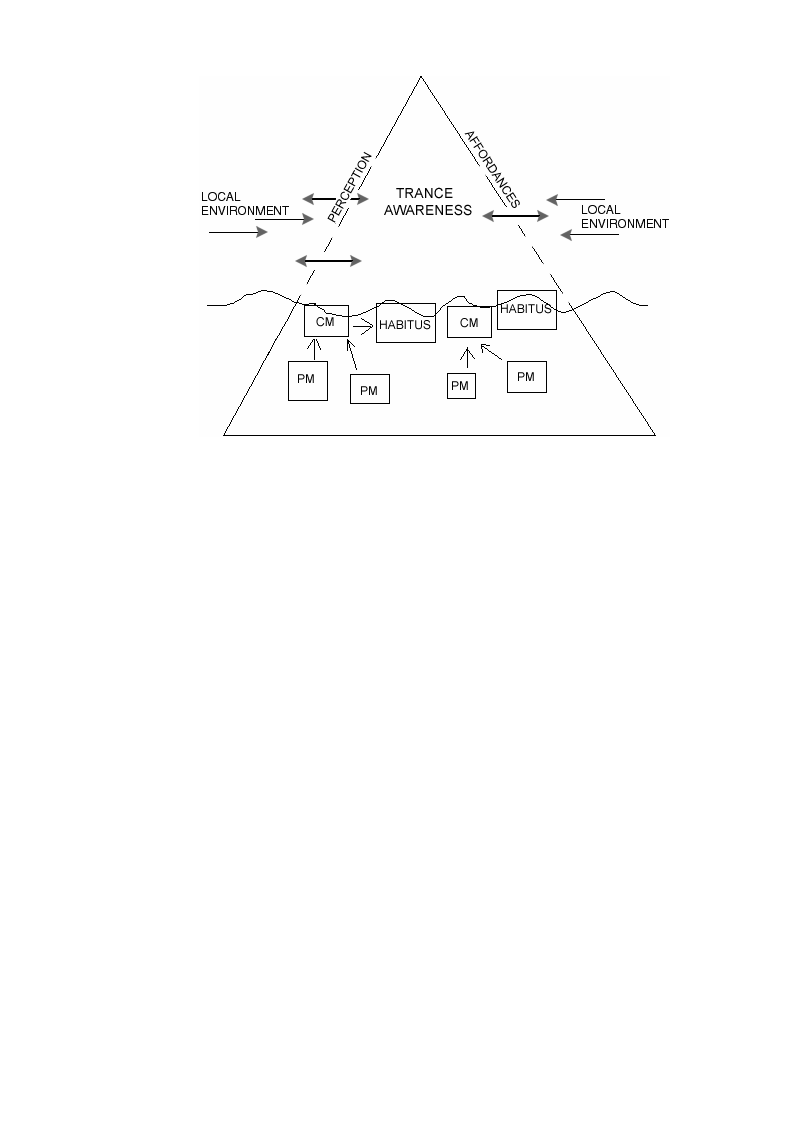
Figure 4: The Trance State
(Reproduced from chapter 4)
Greenwood raises the question of "whether the spirits are 'real' or whether
they are a part of Gordon's ... imagination" and concludes that we must
understand the process within its own terms, thereby "by-passing the
issue" (Greenwood, 2005: 96-98). While this is an appropriate emic
position, it appears problematic given my philosophical stance, as the
spirits Sekhara and Gordon describe appear to have no physical form and
it is not clear how an incorporeal being could exist on my current model.
There is also the question of Shamanic journeying: When a Shaman - or
any Pagan - journeys some believe that their 'spirit' is, in some sense,
focused beyond the body.
We can move the discussion forward using the enactive process model.
The first point to note is the apparent lack of consistency in the experience
of different Shamans: Barry described how he could pragmatically shift
his belief paradigms to suit the situation, allowing his consciousness "to
fall into [...] patterns". On one occasion his consciousness could "fall into
an animistic pattern", on another "consciousness will fall into a more
monotheistic pattern", or perhaps, he suggested, "I contain all this and it
is a virtual reality". Each mode of consciousness was treated like "game
rules" with the option of asking "[w]hat game am I going to play today,
because they're all just games". All these modes are embodied states of
consciousness:
Each different trance state means you experience your body in a
different way, just as each differ trance state means your experience
the world - the sensory world - in a different way. The sensory world
133

is a creation of the body [...] The real world is out there [... ] but our
experience of the world is a creation of the body and the brain and
the mind. And so each trance state means that you experience the
body differently and you experience the world differently.
Barry's world view is compatible with the enactive process model, and he
described obtaining knowledge through heightened sensory acuity and via
the extended cognition of what I call the deep body. Mark's experience of
obtaining knowledge through Shamanistic trance also fits this model.
When I asked where information obtained in trance came from, Mark
suggested it was ultimately from "a higher state of consciousness" or the
"Gaian super mind". For Gendlin the body "is an ongoing interaction with
its environment" that potentially has access to "a vast amount of
environmental information" (Gendlin, 1992: 349). Although not a "Gaian
super mind", such a body could access a profound amount of local
knowledge. Although Mark did not discuss the role of the Shaman, both
Barry and Gordon emphasized that it is a "path of service to the
community" (Barry), so the Gendlian body could readily supply the kind
of information a Shaman would seek. For Mark the body is fundamental
in accessing this information because "you can't separate that [the role of
the body] from anything". Although a trance state means the Shaman is
working with "non-ordinary states of reality", the body remains a key
source of information:
Any effect you have on the physical body will effect you emotionally,
mentally and spiritually. [...] Anything that effects one of those will
effect all of them to some degree. [...] So that physical reaction
you're having [...] is actually a response to what's going on in every
other level of your being.
When Mark goes on a Shamanic journey he becomes "almost super aware"
of his physicality "because you work on, on every sense of the body really,
um, particularly sort of intuitive senses." As a result
it's the emotions, it's where it effects me in my body - that plays just
as much a part as what I'm seeing or experiencing in my mind or
what have you, if you want to call it that [...] So in one way you're
completely out of your body but at the same time being more in
your body than you are normally, really.
Sekhara initially describes what sounds like a quite disembodied
experience:
I think the feeling is that I'm not so much conscious of my body at
all, which is good 'cos I end up doing stuff in a lot of extremely
uncomfortable places. Getting cold or whatever. When I come back
into my body from doing a journey, even though my body's been
conscious of the time that I've been here, I'm not [...] I think a lot of
134

it is about not being in my body in a sense. Not in a way that I don't
want to be but that's the state to be in to do these things.
But she later describes the experience as much more like a change in
embodied awareness:
I think it's focused attention really, like you know when your typing
you're not aware of what's going on around you or you're reading
and you're lost in your book. People can talk to me when I reading
and I don't hear then so it's that very focused kind of attention [...]
It's kind of a shift of awareness.
When I probed on this subject she unpacked her understanding that "to
some extent your soul manifests your body". That aspect of her being that
manifests her body can shift "into something else rather than being taken
out of it and put into something else". Her metaphor makes this clear: It
is "[k]ind of like a cathode ray tube projecting onto a screen, and the
screen's the body but the projector kind of pulls a step back and projects
somewhere else". This clarification leads her to explain that "[t]hat's why
in a sense, I wouldn't say out-of-body".
Some of Gordon's Shamanic communication can be understood in a
similar way as it "often" comes "out of a physical contact or connection,
but not always". In such cases "it's usually feeling [...] that can be very
precise". Similarly, though Gordon does visit the Otherworld, it "isn't
separate from this world". This world and the Otherworld are "kind of the
same place, but looked at - perceived from a different point of view", but
"when you're operating in the Otherworld, you're not operating in our -
this current physical world". The distinctions between - or identity of -
this world and the Otherworld are subtle, but comprehensible on the
enactive process model without resorting to reductionism.
When I explained this model of trance earlier using my cognitive iceberg, I
hypothesised that as a practitioner moves into deeper trance states and
conventional maps of 'reality' break down, the Shaman would use familiar
cultural maps to make sense of their experiences. Obviously different
cultural maps provide different shamanic worlds, and even the few
interviews I have undertaken illustrate Vitebsky's point that "there are
many shamanisms (Atkinson 1992), just as there are many monotheisms"
(Vitebsky, 2000: 55).
Although I follow Greenwood's lead in understanding these experiences in
context, I develop the discussion by applying the enactive process model.
My enactive process model of trance awareness is based on the
"established results" of current cognitive neuroscience research (Varela,
1999: 71) and correlates with the experience of dissociation. Furthermore
it helps makes sense of the experiences described by participants, and can
explain why Shamans from different cultures describe their Otherworld
135

journeys differently. However this remains no more than a hypothesis,
and at this stage in the development of cognitive neuroscience and
ethnographic research it would be absurd for me to try to develop an
'explanation' what spirits might - or might not - be. It remains unclear
how an incorporeal spirit could exist on my current philosophical model,
but this is understandable given the complexity of human consciousness,
which Dennett describes as "the most mysterious feature of our minds"
(Dennett, 1987: 160).
Situated Embodied Knowing in Ritual and Dance
We saw above how dance can speak a language beyond words, and this
reveals two interrelated aspects of embodied cognition: First, dance allows
a place or spirit to communicate to the dancer, and second, the dance can
serve as a bridge between the dancer's deep embodied knowing and their
conscious awareness. These aspects work together when a place or a spirit
communicates with the dancer through a deep embodied knowing that
must be expressed in dance to become conscious. This process becomes
apparent in the interview with Zoe when we read how her body has "a
different way of moving" that is "like a dance" when she is connecting to a
place. When Zoe's "body moves then something is able to move" and this
dance enables "inspiration and the expression" to "flow through". The
"something" that moves is "[i]nspiration. The Awen. The - What the place
is trying to tell me", which can be "an insight" or "a sense of, my ancestors
or the ancestors of the place being around me". The movement of the
dance is fundamental and without movement there is no contact: "If [...]
I'm frozen in some way physically, then I can't hear. I can't listen. Nothing
will flow through me. So I have to move in some way with it, how ever
simple it is, I have to move physically in some way".
Although a felt sense is usually carried forward by a word or phrase, a
gesture or movement can be more appropriate (Gendlin, 2000: 263), and
this is often how Zoe's dance functions. Her embodied knowing is often
expressed with a typical felt sense:
if there's something difficult that's trying to speak, then there will be
a lump in my throat, um, grief will be further down my body, will be
quite heavy round my hips and belly.
At other time she will use "dance and movement as well [...] [l]istening to
what's there and seeing how it wants to move. So, kicking out or swirling
or just rocking or something like that to bring that out of my body so that I
know what it is". The movement helps her to understand what a sensation
is about:
I'll get an idea, of what it's about. 'Oh, this is about grief'. But I won't
necessarily understand the depth of it or how that moves until I
move. [...] there are patterns that my body makes repeatedly. Um.
136

Ways in which my body moves that I'm getting used to that indicate
that something's going on. You know, something needs to rise to the
surface and come out. So that I can understand it a bit better.
Zoe experienced a similar sense when working ritually with a particular
site:
half way up the hill, there's an old hawthorn tree. So I would always
stop there as I felt she was the guardian of the outer, ring. I've no
idea if anyone else ever felt this, but I would have to stop there [...]
ask her permission, and then wait for the answer. And the answer
would come in a bodily sense. [...] It's like a sense of permission in
my body.
This permission was sensed as a slight pressure on her back: "It was like a
propelling forward motion from behind. Like 'Yes!' You know. Pushing me
gently forward". Once past this stage Zoe would come to "the inner level"
where she would often
receive a 'no'. That would be like a frontal sense - like a closing
down. I could feel it, yeah, it's definitely a front of body closed
down. [Holds her open palms in front of her body]. Like someone's
just drawn a curtain or shut a door in front of me.
The way that place communicates with Zoe within a ritual via a felt sense
also occurs more generally in the process of thinking with the land.
Thinking with the Land
The enactive process model claims that we think with our immediate
environment, and several instances in my interviews can be interpreted as
thinking with place. As we heard, Sally often visits Cross Bones cemetery,
a prostitutes graveyard in South London. Her sense of the place is not
simply historical or cultural, and she is clear that "if I intellectualize it, I
think it should be a sad place, it should make me angry". But Cross Bones
is much more than that: It provides "a connection with the city" and "an
idea of the ancestors and how people go back and back. I feel I need to be
able to tap into that to look at the future as well". It also "taps into [...]
feelings about the way women are treated and feminism and eco-feminism
and the way the Earth's treated and all those things." Cross Bones thus
offers a powerful pattern for emotional and spiritual understanding.
Mary's experience of tuning in to trees and places using the felt sense,
discussed above, offers another example. Mary explains how she
sometimes experiences feelings which she assumes are from a particular
tree or place: "The feeling is how it makes my body feel". She is unsure
whether these feelings necessarily originate from the spirit of the tree or
place, so interpreting this in terms of thinking with place does no violence
137

her own understanding. Zoe's experience can also be understood as a
process of thinking through an issue using the mind/body/environment,
although she understands it purely in terms of spirits of place. This need
not be as reductionist as it at first appears: Enactivism illustrates the
artificially of subject/object distinctions, and extended cognition proposes
that the mind reaches beyond the "skin-bag", so it is by no means clear
where Zoe's mind ends and the spirit of place begins. This complex way of
understanding 'thinking with place' challenges our conventional notions,
but can be understood as a meta-level equivalent to communication with
the spirit of place.
Thinking with place involves specific locations, so helps explain why many
urban Eco-Pagans felt a special attachment to a particular place. Often
such special places serve as a "threshold brook" that provides a
"deepening sense of place" (Patterson, n.d.) for Eco-Pagans, who often
listen to its voice using the felt sense. As Barry explained, when the
threshold brook speaks, the hearer’s world changes forever because it
reveals our "sacred relationship with the world" (Zoe): Thus one place can
pattern a sacred relationship to the world. With this point in mind, I close
with Barry's discussion of thinking with place, which he has developed out
of over 20 years of practice. He has concluded, in general accord with
enactivists like Varela, that we are a "kind of [pause] panoramic
unconditioned presence", part of a system "rather than an object or a
subject". At times "the system that generates the virtual image of Barry
and the system that generates the virtual image of the Genius loci [...]
engage with one another and they become one system. And there's no
limit to what that could be". When this happens "you become one facet of
awareness in a vaster and bigger and wider and richer and deeper kind of
reality than the one we usually inhabit" and this is one way in which Barry
understands Shamanic experience.
Because our consciousness is tightly woven into the wider system, Barry
concludes, as do extended cognition theorists like Preston (2003), that
"our sense of meaning and our sense of value is actually conditioned by
our surroundings, so if we're constantly surrounded by human artifacts
then we're being conditioned by that". Unfortunately, for most Western
people the local environment is a "poverty stricken" "sensory desert". The
"world of human artifacts and symbols, is very charged with meaning, but
if that's the only meaning we're exposed to then we lose contact with the
bigger world. 'Cos I think that's a very narrow frequency range". But if "we
get out into the dirty, messy, tangled, luxuriant, deep, smelly world that is
commonly designated the natural world [...] we start feeling things we
don't usually feel". This is because the natural world has a "[s]ensory data
richness" that we don't get "in most human environments". It takes time
to become sensitive to this data richness, but given time and the right
intention we can develop our awareness and thereby our connection to
place. This returns us to a major theme of my interviews; connection.
Barry's "threshold brook" symbolises the subtle power of that sensory
138

richness, and if "we spend enough time by the threshold brook, and listen
to it we hear more and more". As Barry - and all my participants -
understand, this is a deeply healing process: "If I've got a bit of a headache
or I'm feeling down and depressed I'll go for a walk in the woods, and I'll
feel a hell of a lot better for doing that, mate. And we all do that". This one
refrain can be heard in every interview: Connecting to the other than
human world brings spiritual healing and understanding.
Conclusion
Most urban Eco-Pagans experienced a powerful childhood recognition of
their connection with the organic environment that inspired an earth
based spirituality grounded in an embodied knowing. Nearly all urban
Eco-Pagans experienced some disillusionment in their interactions with
other Pagans, many of whom do not share their enthusiasms. However
many urban Eco-Pagans benefited from the training they received in
mainstream Traditions, typically becoming more sensitive to their bodies
in general and their felt sense in particular. The felt sense served as a key
process of connection: By learning to become aware of how we think with
and through the embodied situated self, urban Eco-Pagans enhanced their
embodied communion with places, flora, fauna and spirits, thereby
enriching their practice and nourishing a life-long spirituality. As well as
being profoundly healing, these intimate local relationships - this listening
to the threshold brook - patterned a sacred relationship to the world. It is
the recognition of our connection with the organic environment that
ignites and feeds the fires of urban Eco-Paganism. In the next chapter
('The Power of Place: Protest Site Eco-Paganism') we will see the impact of
spending extended periods of time in the organic environment, and I draw
these threads together in 'Eco-Paganism: A "sacred relationship with the
world" '.
139

Chapter 9: The Power of Place: Protest Site Eco-Paganism
"[K]nowledge of spiritual phenomena without understanding its physical
context is like making love with a man who does not know himself,
because he has lost his connection to the earth ..."
(Syme, 1997: 217).
The relationship between spiritual experience and the organic
environment is an ancient theme (Bernstein, 2005) that is increasingly
voiced today (Fox, 1996; Taylor, B., 2005). However, although the
significance of this intimate connection has been pondered by many, few
have considered its deeper roots: By applying the enactive process model
to my ethnography, I demonstrate that this connection is grounded in
embodied situated cognition.
My 'Eco-Paganism Literature review' identified two fluid groups: urban
and protest site Eco-Pagans. Having considered the role of embodied
situated cognition for the former, I now turn to the latter. My
autoethnography (Chapter 7), described my own experiences and now
serves to frame a more analytical view. Although urban and protest site
Eco-Pagans crossover to some extent and are similar in many ways, this
chapter unearths significant differences, and continues to piece together a
pattern of the power of place.
Although many site Eco-Pagans practice a spirituality without labels, it is
deeply felt and emerges from an embodied knowing of connection gained
through powerful processes that include meditation and ritual. Training
helped urban Eco-Pagans to articulate the felt sense and although site
Eco-Pagans eschew formal training, the felt sense remains significant,
though less well articulated. The most important process of connection for
site Eco-Pagans is the wilderness effect, which catalyses a sense of
spiritual connection, increases personal empowerment and can alter the
sense of self. Amongst other things, this helps explain site Eco-Pagan's
"very strong self identification with the land" (Plows, 2002: 45), which is
seen "as sacred" (Worthington, 2005: 214). The processes of connection
can blur the boundaries between self and other, enabling a powerful
communion with the genius loci which empowers activism, inspires
spirituality and informs site Eco-Paganism.
Introducing the Research Participants
I interviewed a representative sample of thirteen protest site Eco-Pagans
from various of backgrounds. They included two Druids (John and Jo),
one Heathen (Oak) and six eclectic Pagans whose practice was influenced
by a variety of traditions including witchcraft46, Druidry, Shamanism,
Heathenry, Wicca and Buddhism (Adam, Dave, Ian, Jan, Millie and Rob).
46 I deliberately do not capitalise the term witchcraft to distinguish this eclectic set of practices
from any Craft Tradition.
140

Dave, Debbie, Lauren, and Ray felt drawn to Paganism at the time of my
interviews but the latter three were ambivalent about labelling their
spirituality.
At the time I interviewed them, eight participants lived on site B (Ray,
Dave, Jake, Debbie, Jan, Jo, Lauren and Millie), while Oak lived in
woodland not far from the site and was a regular visitor who often stayed
overnight. The interviews with Oak, Debbie, Jan, and Millie47 took place
during the pilot phase but I have included them as there was no major
change in my research agenda. John, Rob and Ian were itinerant and
Adam48 lived in a caravan in the West Country. Nine of my participants
had lived49 on more than one protest site and most of those nine had been
involved for several years (John, Dave, Debbie, Ian, Jan, Lauren, Oak,
Ray, and Rob). By the conclusion of my fieldwork only Jake and Jo were
still living full-time at site B, as the rest had moved on to other protests
(Ray), settled woodland communities (Oak, Jan and Lauren) or more
conventional homes (Dave, Debbie and Millie). Participants ages were
between nineteen and early sixties, with the overall age range slightly
more in the twenties. Although given the size and distinctiveness of the
protest community complete anonymity is impossible to guarantee, in all
cases names have been changed.
SPIRITUAL PATHWAYS
Protest site Eco-Pagans I met had a great deal in common with their
urban counterparts, notably in that they all emphasised connection with
the land or place. Everyone related this connection to their spiritual
experiences, and in some cases it resulted in profound - sometimes life
changing - experiences. This sense of connection was encouraged by a
strong preference amongst most participants (9) for intuitive, embodied
ways of knowing: Such knowing of the heart (John) or stomach (Adam)
was considered to be far more important than "head" knowing. For some
this was reflected in a reluctance to "give names to stuff" (Debbie),
especially labelling one's spiritual path (4). None of this reluctance was
due to disappointment with any perceived lack of environmental
awareness in mainstream Paganism, although some participants (6) knew
of Pagans who lacked ecological awareness. Most who adopted the name
'Pagan' didn't identify with mainstream Paganism, so had less of a sense
of disappointment than the urban Eco-Pagans (7). However, for John and
Jo, both Druids, it was a source of considerable anger and even confusion,
and they frequently complained about the situation. Both remained active
within their Tradition and energetically promoted environmental
47 My interview with Millie was truncated and lasted about half as long as other interviews on
site B. However, given that I lived on-site with Millie for about a month I am confident that I
my understanding of her practice is sufficient.
48 Circumstances required me to interview Adam using the ethnographic interview technique
described in my methodology.
49 I define living at a site as having your own personal sleeping space on the site for at least a
month.
141

awareness.
Finding a Name
In common with their urban counterparts, many site Eco-Pagans (7) had
explicitly taken the name "Pagan" and two felt it fitted them, but several
participants (4) resisted names because they felt their spirituality was
evolving and labelling it was limiting. Ian's spirituality was "inseparable"
from the rest of his life:
It's a way of life. [...] I don't like to focus on saying 'Oh this is my
spirituality' 'cos that's only what other people call it. [Short laugh].
[...] Not much is separable, it's humans that create the separations.
[...] I see things are all part of each other.
Rob spoke in similar terms, though he accepted the name fitted:
Neopaganism - that’s probably what someone would call me, the
way I synergize that … spiritual aspect of my anarchism and the
fight to defend nature and things like that. [...] so it’s all quite
connected [...] spirituality kind of gives me the energy for [direct
action], keeps me going, and it’s not just a raging against the system
or whatever, its also a celebration of life as well.
Jan, Lauren and Debbie also gave the impression that spirituality was an
integral part of life that did not require any specific practices.
"Paganism" was the name Jo found in her early 20's for her "love of the
land, a love of nature, and a lot of history". She began with a Wiccan
approach as it was the one of the Farrars' books (e.g. Farrar, J., and
Farrar, S., 1981) that introduced her to Paganism, but after a few years she
moved on:
it took a long while for me suddenly think 'OK, I think my path is
more nature based', and that's how I sort of moved towards
Druidry. [...] the Druid path seemed to go more towards the
ancestors, and nature and the trees.
However she had been struggling as she felt her path lacked depth, and
was emphatic that moving on to a protest site was "definitely part of [her]
Journey" because "as a Pagan [...] I have to fight for the land because, the
land is what I hold as sacred". Jo's experience is typical of the more
traditionalized site Eco-Pagans, and is echoed by Motherwort, a Wiccan I
met at Lyminge Forest protest in 1998:
I do not pretend to talk for the pagans living at Lyminge, but for me
protesting is definitely part of my spiritual growth. It reconnects me
to my mother, the earth and helps me to sort out what is really
142

important in my life (Roberts and Motherwort, 2006. Capitalization
as in original).
Like some other site Eco-Pagans, and many in the urban group, Jo found
it:
very disheartening that, the majority of Pagans don't see it that way.
[...] I do despair a lot of the time that a lot of them aren't [pause] in
it because they really care about the land and the Earth. It's more
themselves. It's something they want to do and their egos and they
like the dressing up, but they don't wanna get their - don't get their
velvet dirty is what I always say! [Laughs].
She suggested this might be because "they spend too much time indoors"
and wondered if other Pagans "see it as part of the same thing? I mean a
lot of people just see it as, 'I do magic, I do spells, I do ritual' ". Her
comments were the most eloquent, but were typical of several site Eco-
Pagans, significantly the six who are closest to the Traditionalized end of
the scale on my quadrant diagram in 'Section II: Introduction': Jo, Jan,
Oak, Jake, John and Millie.
For detraditionalized site Eco-Pagans spiritual growth was often part of a
life changing activist experience: Dave explained that he had become
"drawn towards Paganism" while at site B, so had made himself a Pagan
staff and attended "a fair few Pagan ceremonies" 50 (interview and field
notes, 24/05/06). In comparison with other Eco-Pagans, his path had
been unusual: From age 17 to 28 Dave "was a full on boy racer with the
second loudest car stereo in the country", and had worked in factories for
22 years. He hadn't spent much time in the organic environment as he
was always "[s]tuck in a factory or in a vehicle!" But he had been involved
with the local Greenpeace group for six years before coming to site B, and
soon after arriving gave up his factory job, which changed everything:
Actually giving up your paid job to do activism full time is a very big
thing. If your job goes, pretty much your house, flat or whatever
goes, and if that goes what do you do with your stuff? Your
possessions go, so that's a huge thing to do protesting and
environmental stuff full-time, to actually live it every single day of
your life. [...] It's been the most amazing years of my life.
Dave was attracted to Paganism because he had met Pagans who were
very "caring about the environment, about nature", but a "powerful energy
and a very powerful presence" on the site was a significant factor in his
spiritual emergence.
Spirituality Without Labels
50 Dave was handfasted at a Pagan wedding ritual in November 2007.
143

Jo tried to create rituals that were suitable for "people that follow a nature
path and don't call it Paganism". Some of those whom I identify as site
Eco-Pagans resisted adopting the name 'Pagan', so prompting the
question of why I still designate them as such. Participants like Rob and
Ian felt that because "words carry great preconceptions" (Ian) naming
something tended to limit it, but given the vagueness of the term they
would acknowledge Paganism as a suitable label for core aspects of their
spirituality. Debbie was aware of her ambivalence towards Paganism but
her resistance was not to Pagan practice, which she enjoyed, or Pagan
beliefs, which reflected her own. However, she didn't want to define her
spirituality:
I have been, like ‘Oh you are a Pagan’, an all that, but I’m not
putting a name to myself. [...] I don’t put names to stuff. [...] I
believe in Mother Nature, not as a God or a Goddess.
Debbie had known about Paganism from friends for well over a year when
I met her, but for Ray it was still very new and the site B Land Blessing in
October 2006 was his first such experience:
I'd never experienced anything like that before, we're all stood there
in a circle, which meant something really big I know, the whole
circle thing, standing in a circle with everyone, feels quite powerful
[...] I cried at that one.
Ray had "always been spiritual, about the love for the Earth" but he didn't
"particularly have a religion" although he added that "Paganism is the
closest that I've seen". His spirituality had become "deeper" since he first
came to live on a protest site partly, he suggested, because he had "lived
outside now, near trees" and through meeting "people that are more
spiritual" and getting "involved in some of the Pagan ceremonies". Many
Pagans find a name for a spirituality they already have, and Ray had "felt a
very strong connection with the Earth" for many years, but had no name
for the spiritual dimension of that feeling.
Lauren's experience was more complex, as for most of her life she'd
avoided religion and had "decided there wasn't such a thing as
spirituality". But when she began to visit the Twyford Down protest in the
early 1990's, this began to change:
it was the first time I'd ever done chanting and drumming round a
fire and I just loved it. Drumming and dancing and chanting round
a fire! So fantastic, and spirit days and all that sort of stuff.
Although she later came to understand that these were spiritual feelings,
at the time she "didn't want to know what it was, because it was something
that I couldn't comprehend". But her sense of discomfort grew as a "sort of
144

spirituality was waking up" and she became "really scared because I didn't
know where to go with it [...] because the only thing I knew was Church of
England or Catholics or whatever, and I'd really just dismissed the whole
lot of it".
Lauren's spirituality grew out of a series of profound encounters with the
organic environment which began at Twyford Down:
Twyford was such a wonderful piece of land. As you stepped onto it
you just thought, 'What's happening to me?' And it was - I suppose
it was in a way what first started it all but I couldn't cope with it. [...]
the reason I think I had the breakdown was because it presented the
real me to me and I just didn't recognise it or was able to cope with
it.
Her experiences at Twyford were "just all too much" and she had a
breakdown, but her spiritual sensibilities were to return over 10 years
later when she arrived at site B:
When site B started it was to me exactly like Twyford Down. [...] I
really wanted to go down there, and be part of this, [pause] but I
didn't go because, I was scared. I was scared the whole thing would
happen again.
Inevitably perhaps, Lauren started to spend time at the new site and one
night her spiritual development "really crystallized":
I was in a bit of a funny state anyway, because I'd had this really
chilled out, sitting at B [pause] and learning, I don't know, learning
about the land again. Learning the power of the land? Something
like that? And then, everyone had gone to bed - at least I thought
they had - And I went down to the loo - the compost loo. [...] at
night sometimes I didn't bother to drop the curtain 'cos I was
usually in a hurry [laughs]. And as I sat there, I saw what I thought
was a man. And I didn't realise it was anything at the time - I just
thought it was somebody peeping at me while I was weeing, and my
immediate thought was absolute annoyance and anger that
somebody could look at me [...] so when I stood up and then I
realised that it wasn't, and it was just as though it was this figure -
there was this man. It led out of the afternoons talking, so I was in
that frame of mind and it was just this vision of this Green Man
looking at me and it was as though it was just calling me, and I just
felt [pause] frightened - shaky. [...] This huge figure, and I can only
call it the Green Man [...] it had never really happened except that
night when I sat at Twyford Down, [pause] I kind of had it. I call
that one of my deep spiritual experiences sitting there that night
when I knew I'd never be back there, just looking across that land,
and I couldn't cope with that being destroyed.
145

As I was the only other person awake on site Lauren asked me to come
and see the "figure in the tree by the toilet":
We went back there together and she saw the figure as not
frightening but protective. She said she believed the Earth is
drawing people to protect Herself. Bit like the 'Rainbow Warriors'
(her phrase). I laughed as she said in the same breath that she isn't
spiritual! (Field notes, 05/07/06, site B).
After Lauren and I talked about it the next morning, I noted that:
For her the figure represents a spiritual presence defending site B
and crucially somehow bringing her a message. She was more
freaked out that it wasn't a human and that it was a spiritual
experience. [...] When she came to see me in the communal [space]
she was quite shaken. [...] [But not by the thought of a peeping
tom.] It was actually the idea that there was a spiritual dimension.
She admitted to me that she was afraid of the whole idea of the
spiritual (field notes, 06/07/06, site B).
Lauren later told me that it was this experience "that really kicked me off
with this whole spirituality Earth bit", and inspired her to write a poem
linking activism with "ancient" wisdom and the power of the Earth. A few
weeks after the interview, Lauren told me that she had been to a political
conference and found herself to be so sensitive to the space that she had to
leave. Her rational mind had said "Oh, come on Lauren - You don't get
affected by atmospheres", but she felt it so strongly she had to go. She
explained this as the most recent example of a heightened sensitivity to
place that had emerged since the night of the Green Man experience.
Given their practices and beliefs, it is appropriate from a religious studies
perspective to count Debbie, Ray and Lauren as Eco-Pagans, even though
they may not adopt that title themselves. We might call them 'proto-
Pagans', but that implies that they will become 'full' Pagans when their
spirituality matures, so is inadequate to describe this often carefully
considered position. I use the alternative term 'edge Pagan', which more
accurately describes this slightly uncomfortable place on a border away
from the centre ground facing an intimidating option, and carries the
sometimes appropriate connotation of critical sharpness. The term edge
Pagan can also be appropriately applied to several of the urban Eco-
Pagans in the previous chapter who have moved through the centre
ground of Paganism to somewhere nearer the edge.
PROCESSES OF CONNECTION
146

In his survey of wilderness spirituality, Ashley found that a sense of
connection was most commonly cited as fundamental (Ashley, 2007),
while my Eco-Paganism literature review noted a “sense of
connectedness” amongst activists (Plows, 1998: 168). My fieldwork
confirmed this research: Rob explained that his “connection with the
earth” had become “a major part” of who he is, while Jan expressed it very
explicitly: “That’s what Paganism is all about – connection with
everything” (field notes, 11/10/05, site B). A comment made by an activist
at site E tied the sense of connection with the theme of alienation
discussed below (Attitude to Urban Life):
Sitting round the fire pit [...] explaining my research to Ian. Others
chipped in. Ben said (approx):
"It's blatantly all connected. If you can't see that it's just because
you're closed down - conditioned" (field notes, 06/09/06).
Several factors contributed to this sense of connection, including
meditation, ritual, entheogens and the wilderness effect. Greenway claims
that "both the psychedelic and meditation experiences ... closely parallel"
the experience of the wilderness effect, and that such awareness seems to
have the "capacity to open consciousness to Mind - that is, to the more
natural flows of information from nature" (Greenway, 1995: 132).
Meditation
Many (7) participants used some form of meditation or contemplation.
Rob learnt techniques from Vipassana meditation that showed him how
"your environment shapes the way you think". He also used a less formal
approach:
just spending time out in nature, just listening. Just looking. Not
really thinking too much. It’s good to kind of not think, just become,
just let it flow though you I guess.
Jo described a very similar practice:
you just sit there and you just - if you give it a moment, peace - it
will just come in and, it's like a wash that floods through you.
Debbie tried to explain the sense of connection that comes to her when
she spends time in the organic environment:
you look up and look around you and you understand. I feel very
honoured that fact that I’ve been allowed to understand it and I’ve
been allowed to see.
This understanding remains as she walks home afterwards:
147

I’m walking down the road and I’ve got a smile on my face. I
understand everything, and other people walking past, and I’ll have
an even more of big smile and I’ll go 'I understand this world we live
in and you really don’t have a clue do you?' [Laughs].
Debbie explained that this understanding could come from "[j]ust sitting"
in any "[n]atural places, beaches wherever", but especially from "living in
the woods".
When I asked Adam where he learnt his spiritual understanding, he told
me that it was from "the land", sitting quietly and "the stone masons and
wood workers". He added that if mediation means "doing without
thinking" then he did "what you might call meditation all the time when
I'm with the land".
Eco-Pagan Letcher also recommends "solitude, stillness and sensitivity"
as a means of reconnecting with an organic environment (Letcher 2001c),
and this simple technique of spending time quietly "sitting out" has a long
history in Heathen practice (Blain 2001: 61-62; Richardson, 2007). Both
popular literature (Ferguson, 1980) and academic accounts confirm my
participants experience that meditation enhances sensory awareness, and
thereby enables a deeper sense of connection. According to Greenway
"[p]ractices such as mediation, when seriously undertaken, are explicitly
designed to facilitate the arousal of nonegoic awareness" (Greenway, 1995:
133), while Braud states that:
Entering a state of relaxation and quietude helps reduce bodily and
other distractions that ordinarily prevent the efficient deployment
of attention [and allow us] to be fully aware and attentive to
everything that happens with a 'beginner's mind' (Braud, 1992: 3).
Ritual
Six participants found ritual valuable (Jo, John, Oak, Dave, Ray and
Debbie), but it was not very important for Ian, Adam, Jan, Rob, Jake or
Millie, and Lauren disliked it. Simple rituals were much preferred by
everyone, and even Lauren didn't mind something "very very basic".
Nearly all the protest site rituals I observed took place at site B and were
most often facilitated by Jo, who was also the one who found ritual most
important. Jo found rituals important for "marking the Seasons [...] to
appreciate where we are at in the year" and felt it was important to "keep
it natural, and have the sort of natural things on the altar".
Most of those who were fairly new to Paganism found ritual very
significant (Debbie, Dave and Ray). The first ritual at site B was a Land
Blessing facilitated by Oak and Jan which Ray found especially powerful,
and it was
148

probably the first time I connected properly with the - realised no
actually, realising this bit of land is here and we're actually
protecting it and saving it and loving it.
For Ray the ritual was a process of connection with both those in the circle
and the place itself. Millie likewise noted that it was "[n]ice because of the
sense of us all being there in the community. Sharing something. [Were
all] connected. The land and us were connected".
Jan facilitated the ritual purely for the benefit of other people as she found
it unnecessary:
I don’t differentiate between what we did in the circle and what I do
on a … quite a regular basis, so … Just talking to whatever’s out
there. So I felt glad for everyone else. I didn’t feel too different in
myself, because I think I earth myself quite well, and I don’t find it
that different really.
Jan's daily practice consisted of a contemplative walk
I have a little walk up and down everyday to kind of keep the energy
… [...] I’m feeling quite cut off ‘cos of the road, so I like to keep in
touch with what we have got here, and so there’s all the little things
under the ground and they form a little network of energy or life or
whatever you want to call it, and all little creatures, the grass and
the plants, and there’s different things out there and they’re all alive
in their own way and it’s nice just to walk past them and say hello.
Ritual seemed to be largely irrelevant to those who, like Jan, integrated
their spiritual practice so tightly with their everyday lives that specific
rituals become superfluous. Rob and Millie only mentioned ritual briefly
in interviews, while neither Ian nor Adam mentioned ritual at all. This
attitude is exemplified by the experience of Motherwort, a "member of a
local coven" who went to Lyminge forest during the protest of the late
1990's:
I asked them how they would feel about joining our circle to raise
energy to protect the forest. Most were favourable, but one turned
round and said very pointedly to me "we don't need your rituals, we
live it every day, working to save the forest right here and now, if
you want to help us come and live here too" (Roberts and
Motherwort, 2006).
Protest site rituals were less varied than the urban variety, tending to use
the simplified Wiccan structure that is common in public rituals, and were
facilitated by experienced practitioners for a mix of Pagans, non-Pagans
and edge-Pagans. This was true of a ritual at the G8 protest, facilitated by
Starhawk, one at Climate Camp, facilitated by a Reclaiming Witch and all
149

the group rituals at site B. My Paganism literature review suggested that
protest site rituals emerged spontaneously and were often ecstatic
(Letcher, 2002: Plows, 2001), but although I took part in such rituals at
Twyford Down during the early 1990's, I found no evidence of them now.
Pending further research to explain this change, I suggest that the
comparative remoteness of sites like Twyford Down and Newbury
encouraged ecstatic ritual. This has brought some positive changes:
Letcher noted that the Eco-Pagans rituals at Newbury “trampled the
flora ... and scared off the fauna" (Letcher, 2001c), but all those I
participated in during my fieldwork took care to minimize any adverse
ecological impact.
Entheogens
Plows and Letcher refer to the use of entheogens by site Eco-Pagans to
facilitate contact with nature spirits (Letcher, 2005: 557; Plows, 2005:
505), and four participants had found entheogens useful. Ian described
himself only half jokingly as "a trainee medicine man", and said he did
"lots" of meditation using entheogens like "ayahuasca, extracted DMT,
planted rue seeds [and] corn with ergot on it". Jake explained how his
early experiences with "hallucinogens" changed his "perception of reality
as such and the way I thought about things". These experiences presented
him with a "beautiful [...] vision" that he had kept at "the back of my soul
or whatever and it's sort of driven me [...] that is what we're trying
towards". Lauren sometimes smoked cannabis, and felt that "when you've
got so much to learn and move away from this patterning that's happened
in your life, all your life, you actually need something like that".
Entheogens had also been important in Rob's spiritual journey:
magic mushrooms [...] open these channels up and let you connect
with nature in a way that, [...] perhaps you never knew existed
before and er, gives you a real sense of how you’re connected with it
[...] I can’t sort of underestimate the importance that that’s had on
my, connection with nature. LSD as well, is particularly important.
[...] Using substances to enhance your perception of the world is
very important [...] [but are] by no means necessary - I’ve had these
experiences without taking drugs at all [...]
As we saw with the two urban Eco-Pagans who had worked with them,
entheogens can act as stepping stones that catalyse a deeper level of
connection that makes them unnecessary. This was true for Jay who said
he no longer used entheogens: "They're my drugs now - birds, wild
animals, trees ..." (field notes, 21/07/06, site D).
Life Experiences
Childhood play in the organic environment was very significant for many
urban Eco-Pagans, and most site Eco-Pagans (10) described similar
150

experiences: Rob's sense of "connection with the earth” originated from
childhood trips to the countryside while Ray said much the same, adding
that he "always loved going to the beach or going to the woods". This
confirms existing research into activist motivation discussed in the
Ecopsychology section of my 'Embodied Cognition Literature Review'.
Other people had life experiences later in life that helped create a sense of
connection. Jo said that childhood play in the garden was where "seeds
were planted for my future love of the land" which later bore fruit: In her
early 20's Jo gave up her job to grow her own vegetables, and it was this
experience of "sowing the seeds and working with the land, and in
weather and the environment" that inspired her Paganism. John had a
long term physical connection with the organic environment because he
had a "nomadic" lifestyle, and would often "just sleep out". Such
experiences are widespread: Newbury activist Jim Hindle explained in his
autobiographical account of the protest "how long walks on the South
Downs ... brought about an awakening within", and a similar shift drew
his friends Tami and Ceilidh to Newbury:
We had both awoken to the land around us and felt the calling
ringing in our ears, as though we'd been asleep a very long time ... It
was the same with Ed, who had had some kind of experience with
the oak at Fairmile51 and had known, once he'd returned to his
hometown, that he had to go back. Once you'd felt it, there was no
mistaking it (Hindle, 2006: 100 - 102).
The effect of these processes of connection on an individual's being-in-
the-world can be profound, and in some cases life changing. It is
significant that the two participants who made the most marked life
changes had also had the least prior exposure to the organic environment:
Dave and Lauren experienced dramatic shifts that culminated in both of
them selling up their homes and adopting a more nomadic lifestyle.
Neither had experienced much opportunity to 'play' in an organic
environment - as children or adults - before arriving at a protest site, so
we might expect a greater impact from such an intense and unfamiliar
encounter with the power of place.
The Felt Sense
Many urban Eco-Pagans became more sensitive to their felt sense through
training in mainstream Traditions, so given that most site Eco-Pagans are
detraditionalized, we might expect a less developed awareness of the felt
sense. However, almost everyone sometimes recognises a felt sense, even
if it is just 'butterflies' in the stomach, and site Eco-Pagans often refer to
meaningful bodily feelings. Debbie described how she felt during the Land
Blessing ritual at site B:
51 The Fairmile road protest site in Devon was evicted in January 1997.
151

And [pause] you know when if something’s so overwhelming if you
got it in your stomach, and it’s like [pause] I take a breath, and like
'Wow!', and I got really really emotional [...]. Overwhelming really.
Really really overwhelming. I could feel it in here, in my stomach.
Oak has similar feelings during the ritual, especially when he invites Odin
- the God he is dedicated to - into the Circle:
Like a fantastic beautiful shining light in your soul, sort of. [...]
everything is just wonderful and great and it’s just in you. Rather
than, you know … It’s not an external experience. You’re not viewing
it and not feeling it. It’s a very internal experience.
Although this feeling is felt "all over the place", it is a more focused in the
chest, and "it’s not a head sort of experience, it’s a chest sort of
experience". I then invited Oak to explore the meaning of this felt sense:
Light, energy, power. Um. Charged, fully charged, and light
standing in a beautiful light, fully loved, completely safe and that
sort of thing. Full on experience.
As we have seen (Gendlin, Chapter 3), the felt sense can often carry
information that is not immediately accessible to conscious awareness,
and this is apparent in Lauren's description of her last night at Twyford
Down:
I knew that I would never be back at that place until it was all over
and something was wrong. I didn't know what was going to happen
but I knew I'd never get back there. And I cried almost all the way
home, from Twyford Down to Winchester station to [home].
These examples are typical of Gendlin's description of a felt sense (inter
alia, Gendlin, 1981), where someone experiences a meaningful bodily
feeling and is - sometimes at least - able to become consciously aware of
its significance. But in the previous chapter we saw many examples of a
more complex process where urban Eco-Pagans 'tune in to' or
'communicate' with places, plants or trees using the felt sense (A Sense of
Nature, Chapter 8). Lauren spontaneously experienced the same process
when she saw a shaft of autumn sunlight illuminate a small Scottish
waterfall:
And there was this one little waterfall, and when it started it was
nothing but, suddenly the sun, just caught it, and it was just so alive
with colours. It was pink, and then there was white - the middle
central stream was absolutely white, this shining whiteness out of
this dark water, dark and inky, on the other side there was this sort
of brown and then round the sides a very deep blue - sometimes
when you get a very deep brown it's almost blue - and then there
152

was this green on the other side of the moss.
The waterfall was not only beautiful, but also eloquent:
And I just looked at it, and had this amazing feeling of just, sort of
talking to the Earth. I can't describe it any other way - It was as
though the Earth was just talking to me.
This is clearly a felt sense that she could understand consciously:
But standing on there, I also - you know - got this message about all
sorts of things - I really kind of got sorted out. I just stood there, and
my head just went through things, and it was as though logically, I
knew what I had to do about X and me, and I knew what I had to do
about the woodland and, I knew what I had to do about Y and Z and
it was all there coming to me. And it was a feeling more than words.
It was just - You know, my mind was making words out of the
feeling. It was fantastic.
Her sense of "a feeling more than words" that her mind could make
"words out of" is a perfect description of the process Gendlin calls
Focusing, which some people do without training (Gendlin, 1981: 4), and
can be life changing. Lauren's experience was indeed profound and
powerful:
It was just, um, the only way I can equate it is like being, when I
first found out I was pregnant - I just wanted to run down the hill
and tell everyone saying 'I've just been spoken to by the Earth!' I
mean I really felt that connected with this one site.
As Merleau-Ponty says "[i]t is the body which points out, and which
speaks" and this "immanent or incipient significance in the living body
extends, as we shall see, to the whole sensible world" such that we can
"discover in all other 'objects' the miracle of expression" (Merleau-Ponty,
2002 [1962]: 230). Gendlin, who develops Merleau-Ponty's work, is clear
that a felt sense can be one of recognition, and that symbols, which
"includes anything that may have the role of a symbol (including things,
persons, behaviors, and whatever)" (Gendlin, 1997: 91; author’s
emphasis), can evoke felt meanings.
Several researchers opine that intention is important to spiritual
experience in wilderness (Stringer and McAvoy, 1992; Greenway and
Taylor, 2006), and this is clearly the case here. Lauren explained the
importance of her attitude, which includes an openness to spiritual
experience:
I think it was because I was there all on my own, and I was the only
person in the whole world that was sharing and was looking at it at
153

that moment, and it was this uniqueness. [...] I thought 'This is just
for me. This is just for me because I can't get anyone else. No-one
else can share it. I've got to take this in me and tell other people
about it'. [...] I liked it because it was a nothing bit of Scotland, it
was an ordinary waterfall, but that particular moment it was just so
beautiful, And it might do it everyday, but I'm not there everyday.
But I was that day. And it was the going to Coulport, sitting there,
getting wet, walking up there at that precise moment, and that's
what I mean about feeling guided and doing stuff.
We can continue to unpack this experience by applying the enactive
process model: Lauren has lived a long full life, so on my model her deep
body - the source of Gendlin's implicit - will have a very rich sense of the
world. This is inarticulate, and perhaps better understood as a source of
potential knowing (see Chapter 5). The understanding that is implicit in
this richness may never become explicit if it is not evoked by experience,
but in the case of Lauren's waterfall a particular place at a particular
moment does evoke some of that deeply embodied potential knowing: One
day Lauren stands before a waterfall and its beauty, in that particular
moment, calls forth an implicit knowing into explicit awareness. In an
important sense she is "talking to the Earth", because the explicit knowing
is co-created by Lauren and that particular place. Lauren is thinking with
the place, and the ambiguity of that phrase is fortuitous: In a sense she is
using the place to evoke her embodied knowing, but on a more
sophisticated reading Lauren and the place are thinking together, through
the process of extended cognition. Both perspectives oversimplify
somewhat, as to some extent they use the subject/object paradigm which
this thesis problematizes, and it is clear from the enactive process model
that at a more fundamental level 'Lauren' and 'the place' are aspects of one
ongoing process. My embodied philosophy chapter could only began to
tease out the threads of this complex enactive co-creation of the world, but
it is clear that it is intrinsic to the Eco-Pagan understanding of the sacred.
We can never fully articulate this mystery because it is implicit, and thus
we gain understanding of spiritual communion with the other than human
world without diminishing it: A sense of the ineffable remains because the
ultimate source of understanding will always remain implicit and
mysterious, and yet it can be evoked by ritual, poetry or experiences in the
organic environment. Because it relates to the experience of both urban
and site Eco-Pagans, I discuss this complex relationship between the felt
sense and spiritual understanding again in the next chapter, 'A "sacred
relationship with world" '.
The Wilderness Effect
Greenway argues that “civilization is only four days deep” (Greenway,
1995: 129) and that even such a brief time away from 21st century life is
deeply transformative. To date the wilderness effect has only been noted
in the context of extended wilderness trips, but ecopsychologists agree
154

that “simply spending meaningful time communing with nature” (Shaw,
2006) is beneficial, and the full effect is a difference of degree rather than
a difference in kind (Greenway, 1995: 132). We would then expect that
long periods in less than pristine wilderness would have a similar impact
to short, intense wilderness exposure. My fieldwork shows not only that
the wilderness effect occurs at protest camps, but that it catalyses a
spiritual experience that leads some protesters to describe themselves as
‘Pagans’. As we have seen this experience can be "a heavy shake-up: one's
perception, dreams, perspective, awareness vividly and rapidly changes"
potentially "to the point where people become more or less incapacitated
when they return to their normal lives" (Greenway, pers. comm., 2006).
Although the effect was first noted on North American wilderness treks,
there are many correlations with felt experience at a road protest camp.
Although such spaces may have been culturally mediated, they retain
certain aspects of true wilderness: Relative openness, no advertising,
absence of most 21st century technologies (flick-switch lighting, hot
running water, instant heating, t.v. etc.), low tech. living spaces, etc.
Before I pursue the connection, it is important to note that wilderness
trips are generally focused on personal therapeutic goals and any human-
nature connection is a bonus (Baillie, 2006). Further, as Shaw points out,
there “is no guarantee that this process will lead directly or indirectly to
environmental action” (Shaw, 2006). However, I am not suggesting that
spending time in an organic environment inevitably makes us more
environmentally aware, but that the wilderness effect helps explain many
key aspects of protest site Eco-Paganism.
There are many obvious similarities between a wilderness trek and life on
a typical protest camp. Most significant of these is the practical connection
with the elemental forces of nature. In my site B field notes of 27/10/05 I
write:
Simplicity of life on camp allows us to attend more closely to our
embodiment. It’s also highlighted by the life itself – physical work,
need to keep warm and attend to physical well-being52.
As Letcher says: “The very act of living out, however dependent on wider
society for food and so on, puts one in touch with nature in a way that is
real, not virtual” (Letcher, 2000). Living in a bender provides a much
more intimate connection with the immediate environment which is why
Ray doesn't "want to live in a house, ever again":
in a house [...] you're just sealed off [holds hands up palm to palm
in front of his head] from any - anything that could possibly connect
with outside of it you know? Other than probably another box which
is the television. Like you don't realise it until - well I didn't realise
52 I lived for three months (over winter) at this particular protest camp (‘site B’) and spent
approximately another six months there part-time.
155

until I had the opportunity to live outside in a bender. [...] you hear
the birds when you wake up in the morning and that's nice, [...]
Sometimes you'll hear a wasp fly by or something [...] you kind of
connect with what's outside of it, a bit more than you would in a
normal home.
I asked Ian if it felt different when he was in the woods. He smiled and
said:
Does it feel different? No, it feels different when I'm not - when I'm
in a box or on a street. That's when it feels different.
Similar experiences are described in autobiographical accounts of road
protest life. Newbury activist Jim Hindle describes how he
became accustomed to the sound of the wind in the trees at all
times. It wasn't a thing I necessarily listened to, but the silence that
fell whenever I stepped inside a building was eerie and
disquietening. ... It was like being connected to a great river, the
source of all life ... and years of separation between us and the Land
were falling away like an old skin (Hindle, 2006: 70-71).
Research reviewed earlier concluded that the wilderness experience
enhanced sensory acuity (McDonald and Schreyer, 1991; Beck 1987;
Harper, 1995; Sewall, 1995) and this is apparent in Rob's interview. In the
city he has to engage sensory filters to “block out information, to block out
noise, to block out the chatter of things [...] going into you mind, because
if not you’ll go absolutely insane because there’s just so much going on …”
On returning to a more natural space he would find the silence
overwhelming and “it was so goddam quiet it almost hurt”, but this
passed:
And it was only when you actually started to listen that you realised
it wasn’t quiet at all but the river was flowing, the wind was in the
trees, the birds flying. All of these things were going on which we
weren’t hearing because we had these filters on. And I keep
repeating it but it’s an important point, because people do live their
entire lives in an urban environment and they just don’t get the
connection, um they don’t get that connection with nature.
We hear later that several participants were similarly critical of urban life,
and Greenway comments that the wilderness effect can place "the
individual in more or less severe conflict with [urban] culture" (Greenway,
1995: 128). Greenway doesn't discuss why, but a heightened sensory
acuity and the sense of connection described above are likely factors.
Protest site life has one significant extra factor which a wilderness trek
lacks: Those who live on site are protecting it, and this enhances the sense
of connection. As Jo explained:
156

you're giving your life over to try and protect that piece of land, so
you have a more intimate relationship than you would, somewhere
else [...] you've got that bond that you're trying to protect it, and I
think it knows that you're trying to protect it, and it's your land
because it's your home as well, and it's the home of the people that
you share you life with.
Most of the key aspects of the wilderness effect (see Chapter 3) correlate
closely with lived experience on a protest camp: a sense of connection,
well-being, major life changes, contemplative practice and community.
There are clear explanations for those that do not strongly correlate:
Social drinking is common on site, so I would not expect alcohol addiction
to be alleviated; my participants were not on a trip with a fixed period, so
major goals will be stated in different terms but were similar; sadly, there
was never the opportunity to go "climbing a ridge or peak in order to greet
the sun"; finally, dream patterns were not considered in my research
(Greenway, 1995: 128-129).
The Wilderness Effect: Freedom
Greenway describes the sense of freedom felt by those on a wilderness
trek: “For many the wilderness experience means release of repression –
release of the inevitable controls that exist in any culture” (Greenway,
1995: 128) and protest site campaigners commonly describe a feeling of
freedom. My site B field notes of 12/12/05 attempt to put it into words:
I can’t quite describe it, but have an image of Camp [site B] as like a
bubble, an enclosed safe, crazy-sane place. It’s a bit like ELFS53
actually – that same feeling of liminality, of freedom to be who you
are, of safety and possibility.
Visitors often referred to a camp as a place “of freedom” as opposed to the
world outside (quote from a visitor, field notes, 12/03/06, site B) and
Merrick, a protester at Newbury, explains how that feeling of freedom
allows for self-expression:
Not all far-gone behaviour is actually craziness; a lot of it is the
release of tension that, in the outside world, people would be too
inhibited to express (Merrick, 1996: 80).
Again my ethnography bears this out. In a discussion over breakfast, Jan,
who had previous experience of camp life and had lived at site B for about
two months said: “I feel free here. I’m back to being myself”. Debbie, who
had been at site B for about a month and who had also lived on site before,
responded that being there allowed her to “be who I really am”. She
commented that her partner had ruefully said she had “the site bug again”.
Jan went on to say that on site she did things she didn’t normally do
53 ELFS is a annual week long Wiccan camp. I have changed the name for ethical reasons.
157

because she’s otherwise too shy, and added: “I don’t know who I am.
When I’m here everyone knows who I am and it’s really affirming” (field
notes, 14/11/06, site B).
The Wilderness Effect: Connection
For Greenway connection – or reconnection – is fundamental to the
wilderness effect: “When entering the wilderness psychologically as well
as physically, participants most often speak of feelings of expansion or
reconnection” (Greenway, 1995: 128). As we have already seen, a sense of
connection lies at the heart of Eco-Paganism and is common to both
urban and protest site groups, so I need not repeat my discussion of its
importance. However it is clear that the wilderness effect is closely related
the other processes of connection I discussed above, and like them is
grounded in embodied knowing: Shaw explains the sense of connection at
the heart of the wilderness effect as “an embodied visceral knowing that
transcends the distinction between the inner and outer landscapes”
(Shaw, 2006).
The Wilderness Effect: Community
A strong sense of community is another key characteristic of the
wilderness effect that is also fundamental for some protest site Eco-
Pagans. Jo had "always wanted to experience community living" and
thought "the community thing" was "excellent" while Ray told me that
living on site was the first time he had lived in a "community" and had
realised that "it's a better way for people to live". My field work noted that
the alternative sustainable community aspect of protest camp living was
central for Jan (field notes, 27/11/05, site B) and she and Oak later moved
to a woodland community. Lauren sold her house in the Autumn of 2007
and bought land to set up something similar.
The Wilderness Effect: Sense of Self
The wilderness effect creates a distinct sense of self:
People often are quite explicit about how their minds feel 'open' and
'airy' in the wilderness, as contrasted with 'turgid,' 'tight,' and
'crowded' in urban culture (Greenway, 1995: 132).
Anderson's field notes describe how it felt to live on site: "I get a slowed
down, rhythmic feeling in the woods and on the meadow, relaxed"
(Anderson, J., 2004: 51). Site life gave him "a sense of possibility, a blast
of fresh air, oxygen rushing to the brain. These protests … are like
stepping into a parallel universe" (Anderson, J., 2004: 51). My field notes
regularly express very similar feelings: "Feeling about being on site:
Lightness, sense of openness” (field notes, 1/12/05, site B: also see
Chapter 7). I became especially aware of this sense when I left camp for a
couple of days for a trip to London:
On the tube I feel more enclosed, less emotionally open, more
158

restricted. We talk about urban congestion. It’s not just roads that
are congested – it’s psyches (field notes, 4/11/05, site B).
Later I expressed a similar feeling as I left camp to travel by train to
London:
As I sat down in this warm, enclosed space I felt odd – slightly
shocked somehow. Now a few minutes later, it still feels strangely
alien. Straight lines hard consistent surfaces. Ordered space. I feel
shut away. I remember sensing a similar difference between cycling
and being in a car: on a bike you’re connected, part of the space you
move through. In a car you’re enclosed in a discrete space. I think
that’s the key to the difference. [...] the inside and outside are less
defined. Even in my bender it’s very obvious what the weather is
like! There are no doors, very few straight lines and no order. The
space is more open, inconsistent, and fluid. Sometimes it has an
organic quality inspired by the materials; my bender is a dome,
shaped purely by the relationship between bent hornbeam and the
space (field notes, 14 /11/05, site B).
Tuan (1974) noted how physical setting influenced perception, and
suggested that the straight lines of conventionally constructed space
requires different skills of perception than the organic complexity of a
natural landscape. Given the complex relationship between perception
and sense of self discussed in my literature review of embodied cognition,
the phenomena Tuan observed will contribute to the wilderness effect.
The Wilderness Effect: Spiritual Dimensions
All research into the wilderness effect concurs with Greenway that it has a
“spiritual” dimension (Greenway, 1995: 128), and Key points out that
there are "many examples" of spiritual experiences catalysed by
wilderness (Key, 2003: 65). In fact the development of Eco-paganism
amongst UK environmental protesters living in liminal temporary
encampments is just the most recent manifestation of the spiritual power
of place.
My literature review noted the importance of a sensual relationship with
nature to some Pagans, and the wilderness effect helps achieve what
Letcher described as "an embodied sensitivity to nature" which is essential
if we are to “come to know the 'genius loci' the spirit(s) of a place”
(Letcher, 2001c). All my participants linked their sense of connection with
the organic environment with their spiritual experiences, and the main
difference between site Eco-Pagans and their urban counterparts was in
their relationship to cities. For most site Eco-Pagans the organic
environment was essential to spirituality. This is apparent in much of
what I have already reported, but Rob is typical:
I find it quite difficult to connect with my spirituality when I’m in an
159

urban environment - It’s only when I get out into nature … and feel
the energy flowing through me and I have that connection […] the
only way to understand it is to be out there and experience it.
Exceptions
Not everyone on protest sites showed as much respect for the places they
lived as the Eco-Pagans, nor did everyone develop a nature based
spirituality. Clearly the processes of connection do not influence everyone
and other factors must come into play. Although I did not interview
activists who lacked a sense of connection, some of these factors were
apparent, notably the influence of alcohol at sites D and E:
It's great here right now, but Bob tells me it can change in a moment
if the 'brew crew'54 turn up. This is a major factor influencing any
wilderness effect (field notes, 21/07/06, site D).
On more established camps there is often very little that needs to be done
and boredom often leads to alcohol abuse. This was also apparent at site
E:
When I arrived I heard [reports] of a lot of drunkenness on site.
This confirmed when I went over on Sunday morning to see 6-8
people drinking cider at 10 am. General reports of fighting,
drunkenness and noise in the evenings. [...] Then in Sunday [night]
things turned round: a fiddle player turned up and it was folk songs
and tea round the main fire! Since then I've seen much less booze so
things may be turning round (field notes, 05/07/06, site E).
Stringer and McAvoy noted four factors that inhibited spiritual experience
in wilderness: Not enough time alone, not enough time in general to "see,
feel and/or experience processes", "too large a group" and simply "not
looking for spiritual experiences" (Stringer and McAvoy, 1992: 69). All
these would be inhibiting factors at protest sites which are often chaotic,
sometimes include large groups and attract people with no interest in
spirituality. Greenway opines that intention - a factor closely related to
this last point - is the key to how powerful the wilderness effect is and
observed that many people "carry" urban culture into the wilderness,
meaning that they resist entering into it psychologically (Greenway, pers.
comm., 2006).
The Impact of Processes of Connection
Spiritual Emergence
Three of my participants became increasingly drawn towards Eco-
Paganism during the period of my research. Ray followed the typical
pattern of finding a name described in the previous chapter: He always
54 The 'brew crew' refers to mostly itinerant alcoholics who typically drink Carlsberg Special
Brew lager which is 9.0% alcohol.
160

had some sense of a spirituality that was rooted in a "love for the Earth",
and had recognised Paganism as a way to express that feeling. Dave and
Lauren are atypical in that this spiritual awareness emerged later in life,
perhaps because they had very little opportunity to play in the organic
environment as children. Although my fieldwork sample is too small to
claim that this is more than a plausible hypothesis, it correlates with
existing research discussed in my embodied cognition literature review.
The wilderness effect had a fundamental influence on the emergence of an
Eco-Pagan spirituality for these three people, and although wilderness
researchers have noted individual spiritual experiences, this is the first
time a fieldworker has observed the emergence of a complex 'nature
based' spirituality in participants in any location. I arrived at site B within
weeks of it being set up, so witnessed all the gradual changes that marked
the spiritual growth of Dave, Ray and Lauren, and the latter's 'Green Man'
epiphany. Because I was experiencing the spiritual influence of the
wilderness effect myself during the same period, I had an embodied
understanding of the process that I could interpret within an academic
context. This unique combination of embodied understanding, thick
ethnography and theoretical analysis has provided significant original
insights into site Eco-Paganism. My research not only bears out Harvey's
opinion that site Eco-Paganism tests “our understanding of what
‘spirituality’ might mean” (Harvey, 1997b: 3): It also demonstrates how
spiritual experiences catalysed by processes of connection have helped
create the sub-culture I call site Eco-Paganism. Letcher claimed that Eco-
Paganism emerged from new-age traveller culture (Letcher, 2005), and
my literature review describes philosophical, religious and political
influences, but the wilderness effect is the real power that underlies all
these subsequent social influences.
This dramatic example of the power of place helps explain several key
characteristics of Eco-Paganism, including participant’s tendency to adopt
the name because it reflects their existing spirituality, the emphasis on
orthopraxy and eclectic spiritual practice. Furthermore, although UK site
Eco-Paganism emerged from the 1992 Twyford Down protest (Letcher,
2005: 556), it is found amongst environmental protesters in other
countries, notably those spending time in wilderness (Shaw, 2006; Taylor,
B., 2001). Given existing evidence of the power of the wilderness effect to
catalyse spiritual experiences, it offers the most plausible explanation for
the emergence of site Eco-Paganism on different continents. Cultural
influences are far less significant: Although Starhawk's work is influential
amongst urban Eco-Pagans, it is largely absent from protest sites, which
remain dismissive of mainstream Paganism.
Blurring Boundaries
I found extensive evidence that processes of connection encouraged a
recognition that “organism and environment enfold into each other”
(Varela et al. 1991: 217), as described by the enactive process model. Rob
161

described how he felt one evening in the woods when a deep realisation of
environmental destruction came to him:
I felt like Gaia was really screaming out through me, saying please
help me. Please help me, and like I started screaming myself and
started saying these words. I felt so connected, so at one with the
earth that this violence was being done towards me. Um, not me
personally, any ego or anything like that, but me as in life, as in this
whole unity which I’m connected with.
His identification with a sense of life itself, which is emphatically not his
ego, is particularly striking and recalls Greenway's conclusion that
processes of connection "facilitate the arousal of nonegoic awareness"
(Greenway, 1995: 133). As we have seen such experiences are not
uncommon. Taylor found that "no small number of activists report
profound experiences of connection to the Earth and its lifeforms"
(Taylor, B. 2005: 47) while Eco-Pagan Jodie concluded that site life
constructed "a different form of consciousness whereby a person felt a
part of nature" (Greenwood, 2005: 107).
Motivation
Environmental campaigners are already committed to activism before
they arrive on a protest site and this may have little or nothing to do with
processes of connection. However, many activists who arrived on site for
rational reasons soon became influenced by the power of place. Although
all embodied cognition involves emotional engagement (inter alia,
Damasio 1994 and 2003), Plows suggest that it is especially important for
activists:
This is a crucial point in activist narratives as will be evidenced time
and again in this chapter, the emotive, personal response - the facts
are felt rather than merely understood (Plows, 2002: 173).
Plows notes four aspects of this powerful emotional motivation, all of
which tie in with my own research findings: First, "[s]ome kind of
emotional, spiritual and/or aesthetic connection to place, for example, is
often peoples’ first action trigger" and as we have already seen, place is
fundamental to Eco-Paganism. Plows found that a respect for "nature, for
animals, for people" were also key motivation factors and this often "had a
spiritual dimension". Relationships with other activists, "ties formed
under (often) extreme conditions" were also important (Plows, 2002: 208,
author's emphasis), and this correlates with research findings on the close
relationship between place and community noted by wilderness
researchers.
Some activists are initially driven by rational reasons, but develop the
kind of feeling for the facts that Plows describes. Kate, a Newbury activist
quoted in Merrick's autobiographical account of the protest, is a good
162

example:
I am starting to forget myself why I first went down, but I know it
was rationalised by well thought out arguments against the Car
Culture. Now these arguments have been replaced by a belief
system, an irrational commitment to the land, to the trees and to the
people who fight to save them (Kate in Merrick, 1996: 128).
Lauren's experience is very similar. Her involvement with environmental
activism began when she watched David Bellamy's television series
Turning the Tide (Bellamy, 1987):
I watched and I thought if only half of what he's saying is true, why
the fuck isn't anyone doing anything about it? [...] I just could not
believe it and that's when I started getting active with Friends of the
Earth, CND - people like that.
Given that Lauren is a retired teacher and "a very logical person" this
rational rather than intuitive approach is to be expected. But, as explained
above, the influence of protest site life changed her outlook dramatically
and after her meeting with the Green Man she concluded that:
what was at Twyford Down is living on - it's turned up at [site B].
This feeling, this love of the land, is growing so much in people now.
And that is what will win through in the end.
Her rational, logical motivation has been transformed into faith in the
power of love for the land. Rob made the same transition, and described
the process explicitly:
I tried for a long time, kind of getting up every morning and sort of
reminding myself of the ethical issues that were at stake here and
you know, trying to each day re-establish my conviction to do
something, and I find that trying to do that on a rational level was
insufficient to to - you know - to fulfilling my aims and giving me
that energy. And over the past kind of year - couple of years I guess -
I‘ve really discovered how much energy one can invoke from nature,
on a very intuitive level, [pause] and that I believe that is far more
powerful and far more, um, deeply ingrained within oneself than
simply rationalising it, and that’s fundamentally based on
experience and based on living essentially, yeah.
For Rob, Kate and Lauren reason becomes replaced by something
ultimately far more powerful; an embodied spiritual understanding of
connection to place. This experience may be far more common that we
realise: Jane, one of Shaw’s informants, was on an anti-uranium blockade
near the Kakadu National Park55 and explained how she “loved to observe
55 Kakadu National Park is situated 250km east of Darwin, in the Northern Territory of
163

the way the protesters from the cities down south would fall slowly into
the rhythms of the land and be captivated by them” (Shaw, 2006). It is
this embodied knowing of connection that inspires and motivates the ‘folk’
spirituality I’ve described as protest site Eco-Paganism.
Attitude to Urban Life
Many of my participants (6) contrasted the connectedness they felt in the
organic environment with what they perceived as the alienating effect of
urban life. Lauren compared her old lifestyle with how she lived now:
It is very difficult when you come from this world, of time and
meetings and writing things down. You get right out of touch with
yourself.
After over a year living on sites, Dave concluded that when we "shed all
[the] stuff" of conventional life "it definitely lets the spiritual side of
yourself come out". Ray concurs with Dave's conclusion:
in this day and age it's just taken away from you [...] your mind's
just filled with so much other stuff - well, crap basically [...]. No-
one's really in touch with what they actually are or anything, or life.
[...] And if you start talking about, you know, the wind and the earth
and the fire and the stars people just start laughing at ya [chuckles].
Ian and Adam believed that this lack of understanding is endemic to
Western life: Ian lamented that "We are bred not to get it", while Adam
told me that we are taught "from the womb" that "this is the way to live",
and social reinforcement is all around us "like smoke". Adam contrasted
this "psychic pollution" with a sense of "peace" that comes from being
"grounded" in the embodied way of knowing that he feels in his stomach.
The sense of connection Adam describes often had a practical expression.
Previous ethnographies described different degrees of environmental
sensitivity amongst site Eco-Pagans, contrasting the respectful “practical
paganism” of Twyford Down (Plows, 2001) with the insensitive rituals
Letcher observed at Newbury (Letcher, 2001c). My own ethnographic
research, which was more extensive than Letcher's, concurs with Plows,
and I observed elements of Permaculture, extensive recycling and
considerable sensitively to local ecology amongst protest site Eco-Pagans.
OTHER ASPECTS OF PRACTICE
Magic (Spell work)
Some typical aspects of mainstream Paganism are less apparent amongst
site Eco-Pagans, notably magic and practice that involves deities. Magic
was only mentioned in two interviews: Jo explained that part of the
reason she drew away from Wicca was that "magic was never really [her]
Australia.
164

thing", while Jake commented that it was not part of his practice. Only
three protection spells were cast by site Eco-Pagans throughout my
fieldwork, including one by me and one which caused considerable
disagreement. Again the earth based/esoteric model helps explain
fieldwork findings, especially in the context of Pearson's differentiation of
"occult" "ritual magic" from the " 'ordinary magic' of everyday life", which
is concerned with "a connection to the Earth" (Pearson, 2007: 101). Her
clarification is useful: Whereas "occult" magic is rarely practiced and often
disparaged amongst Eco-Pagans, the 'ordinary magic' of connection is
fundamental to both urban and site Eco-Paganism. It is this latter
understanding of magic which Greenwood uses in her discussion of
"magical consciousness", which as we have seen describes a form of
embodied knowing (Greenwood, 2005).
Deity
Very few of my participants worked with deity at all, and only Oak
honoured a named pantheon deity. Jan did not like talking about working
with a deity, and has quite a sophisticated understanding of the whole
notion:
Well, I wouldn’t call it work. It’s, I just like to say hello, and you
know. I don’t know. Whether it’s Her, or something else, or just the
land breathing maybe, I don’t know, but it’s the same kind of
feeling. But, I can call Her the Goddess to other people because they
understand.
I asked her what she meant by "the land breathing", she explained:
it’s the mushrooms underneath, and all the roots, and the trees
intertwining underneath. I mean, in a wood all the trees have joined
together and then you’ve got all these layers of different ecosystems
- I think the whole thing makes a complete breathing creature,
almost. Which is why, you know, land clearance is so dreadful [...]
that is the whole breathing entity of which we should be a part, a
symbiotic part, and we’re not. That’s where it all goes wrong,
horribly wrong, isn’t it? That’s the Goddess, that’s who I try and, I
don’t know, communicate with, talk to, sense, um. Yeah, but I felt
wonderful when I was calling Her in and I think people understood
what I was trying to say.
Jan was not particularly concerned with naming this phenomena as
Goddess or ecosystem or both, partly perhaps because she thought that
"we construct our own realities". What was important was her relationship
to the breathing land and to her community. It is significant that when
Jan invited the Goddess to the Circle at the Land Blessing ritual, she did
not call to an unnamed universal deity - The Goddess - or a pantheon
Goddess, but the local Goddess of that specific area.
165

John was emphatic that the power of the Awen came from an external
force, but did not specify any name:
It's coming from the great God, the great Goddess, the Universal
Architect, whichever tradition you come from, it's external. [...] It's
not coming from you, it's coming from something you tap into and
work through.
Jake was not "called to certain deities" and Jo had "never really done
deity", though she added "to me it's the Old Gods and they're there, they're
everywhere". Ray didn't relate to deity because he didn't identify as Pagan
and none of my remaining participants mentioned deity, although they
did talk about spirits, the Fairy Folk (Ian and Adam), or more diffuse
notions of 'energies'.
Ancestors
The ancient burial at site B was very significant for some participants, and
ancestors were important for Jo and Dave. John's ritual focused on the
burial, but significantly he did not mention it in his interview, while both
Jake and Ray only mention the burial in passing. In contrast, the burial
and ancestors dominated my interview with Dave, who repeatedly
mentioned the spiritual importance of the burial:
The whole area is a burial site so how can you not be spiritual? How
can you not be? You're living on a site of ancestors, you know [...]
You know, you're living on top of this sacred part of the earth, how
can you not be spiritual here? It it draws you in whether you like it
or not, you know. They call out to you - our ancient dead.
Jo felt a similar affinity, and felt it was "an honour to work, I think, with
[...] this burial place of an ancestor". The place in general was also
important:
you build up that relationship with that land and [pause] and I feel
now that that what keeps me here is that bond, with the ancestors
and with the spirit that is around us here all the time.
Jo and Dave's fight to protect the site is inspired and supported by the
ancestral spirits as well as the nature spirits of place, and as both are
inherent in the land this relationship ties in strongly with the main theme
of connection. In the previous chapter Cross Bones cemetery illustrated
the importance of the cultural aspects of place, and it's significant that a
burial site evoking a sense of the ancestors once again becomes a powerful
place to think with. Sack's work explored this process by which places
"draw together the natural, the social, and the intellectual" (Sack, 1997:
12), and he opines that this complex weave of cultural and physical
features "enables place to draw together the three realms, and makes place
constitutive of ourselves as agents" (Sack, 1997: 33).
166

The Erotic
The erotic emerged as a theme amongst urban Eco-Pagans and was
important for Rob:
I’ve also discovered the importance of like, sexual energy that
pervades everything as well, it [...] but that’s something as well that
channelled and used for empowerment [...] I think it’s everywhere,
and it’s a natural force that um, one can hook oneself up to.
No-one else mentions the erotic but there is an obvious correlation with
the themes of connection, energy and empowerment.
EMBODIED SITUATED COGNITION AND THE WILDERNESS
EFFECT
We have repeatedly heard how embodied situated cognition uses the
immediate environment to think with, notably in the case of Lauren's
waterfall. Trocco, who led educational field trips into the Everglades
National Park, described an example that illustrates how this process
operates in a typical wilderness context. The group leaders found that the
wilderness effect alone was rarely enough to shift the student's “years of
cultural conditioning”. But “when we associated a student’s community,
and eventually their individual identity, with planetary ecosystems, a
kinship between the human community and wild ecosystems developed,
and the student's bond with the earth was strengthened”. The power of
this approach became an “even stronger tool when the explication was
able to touch an individual's psyche - as the similarity moved beyond
metaphor” (Trocco, 1997). Trocco describes just such an occasion.
Carolyn, one of the students on the trip who had some “tense emotional
issues”, was scared of entering the swamp. Trocco suggest that going into
the swamp would be like going into her “psyche or consciousness":
“perhaps understanding the swamp, can help you understand yourself".
Carolyn agrees to “just think about it as a metaphor” and give it a try, but
Trocco comments “I’m not totally sure it's a metaphor” (Trocco, 1997),
hinting at a blurring of person and place similar to that described by the
enactive process model.
Eco-Paganism typically draws on symbols grounded in “the earth and the
seasonal cycles of the natural world” (Salomonsen, 2002: 14), like Jan's
description of the Goddess as "the land breathing". That is to say, Eco-
Paganism is structured around practices that associate "individual
identity, with ... ecosystems". It is thus equivalent to the techniques
Trocco used to shift cultural conditioning, so on Trocco's evidence we
would expect Eco-Paganism to enhance the wilderness effect. I discussed
the impact of belief systems on cognitive extension in Chapter 4,
167
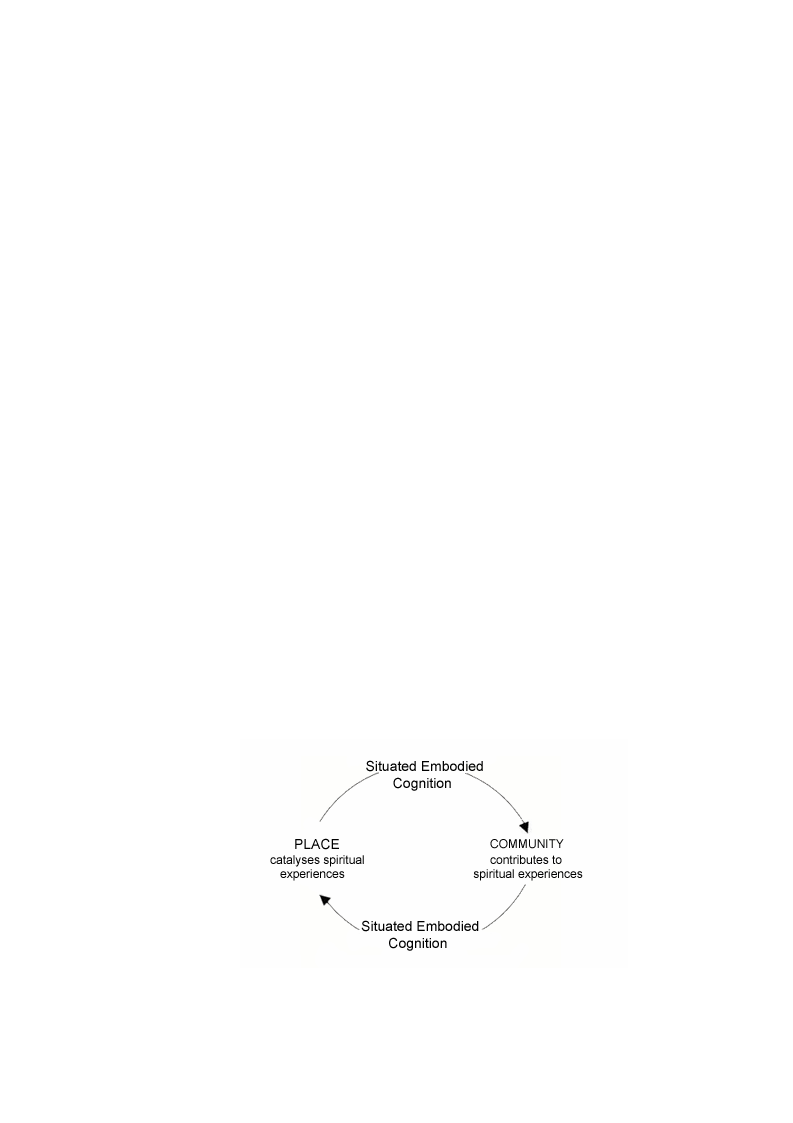
suggesting that the work of Stepp et al. (Stepp et al., 2003) explained why
it was easy to resist the wilderness effect (Metaphors as Scaffolding). But
their work may also help explain why Eco-Paganism would favour the
wilderness effect: If belief systems can “interrupt feedback … from the
sociocultural and biophysical environments” (Stepp et al., 2003), then
presumably they can also enhance that feedback, strengthening the
cognitive extension described in enactive process model.
The experiences Trocco describes exemplify how the enactive process
model works in practice, as do those of Eco-Pagan Rob's. Rob finds it
“difficult to cope” in urban environments partly because “in an urban
environment everything is constructed um, everything is based on ideas”.
His difficulties are reminiscent of those described by other participants
who found urban life alienating (see Attitude to Urban Life), and echo
Barry's comments in Chapter 8. Embodied situated cognition in an
environment Barry called a "sensory desert" drives Rob “a bit mad”, but in
a more natural environment, his thinking is very different, and he “can
kind of connect and open up those channels again”. In each case cognitive
extension uses the local environment to make sense of the self and this
may be life enhancing, as with Carolyn in the Everglades or difficult, as it
is for Rob in the town.
Trocco and his colleagues utilised the powerful "kinship between the
human community and wild ecosystems" (Trocco, 1997) and this
relationship is clarified by my fieldwork and existing research. First, we
know the wilderness effect can contribute to both spiritual experiences
and help create community; second, studies show that "social dynamics"
and "camaraderie" catalyse spiritual experiences in wilderness
(Fredrickson and Anderson, 1999: 36; Stringer and McAvoy, 1992: 69);
finally, we saw above how important intuitive, emotional ways of knowing
- one aspect of embodied situated cognition - are for site Eco-Pagans.
Trocco used this dynamic to break through the “years of cultural
conditioning” (Trocco, 1997) and it works in a similar way on protest sites.
Fig. 8: Place and Community
168
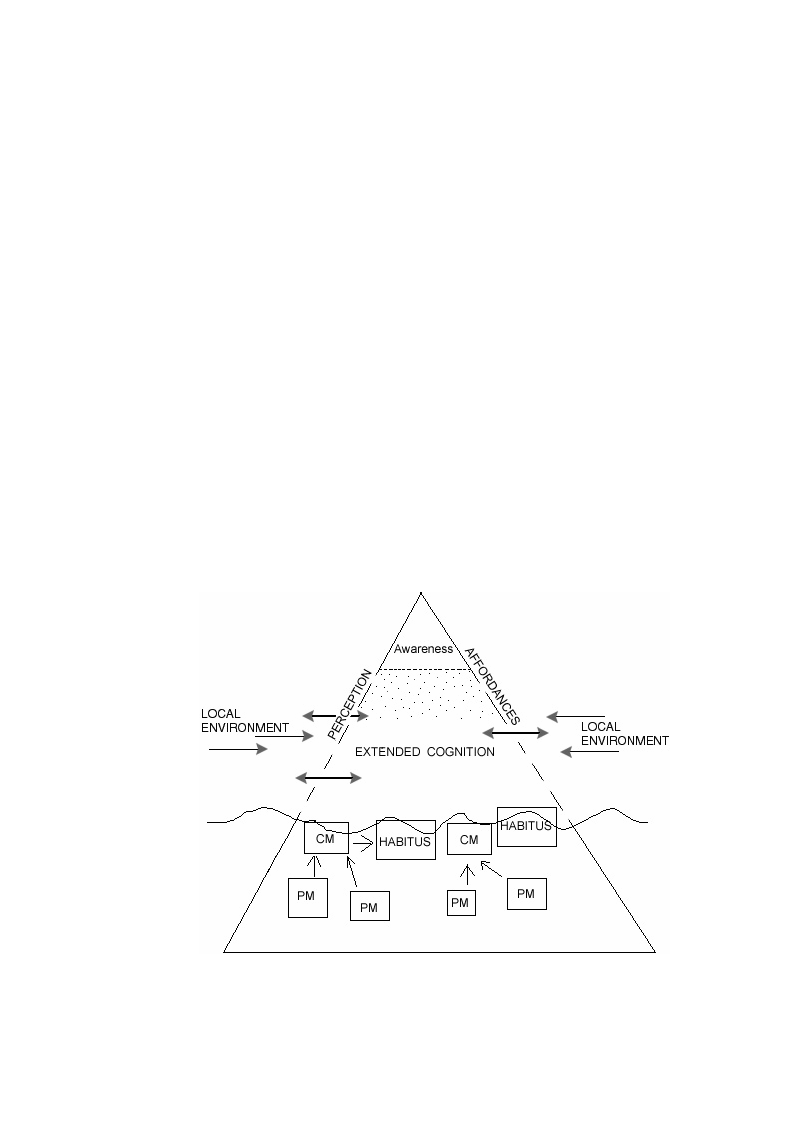
The synergy of these findings is illustrated in fig. 8: the wilderness effect
(place) catalyses spiritual experiences and helps create community which
in turn reinforces those same experiences. I do not want to imply that
place necessarily comes first: As we saw in the examples of the site B
ancestor burial and Cross Bones cemetery (previous chapter), community
reinforces the significance of place, thus contributing to its spiritual
power. Of course belief and associated practices will be influential too, as
discussed above (Stepp et al., 2003). All these interacting factors operate
though interwoven processes of embodied situated cognition and are,
ceteris paribus, in a self-reinforcing positive feedback loop.
Living on a protest site - or wilderness trekking - will also have significant
effects on what Jackson describes as the "body-mind-habitus" (Jackson,
2006: 328) thus contributing to changes in one's being-in-the-world.
Jackson claims that changes in our habitus can free "energies bound up in
habitual deformations of posture or movement produce an altered sense
of self" (Jackson, 2006: 328), which is exactly what the wilderness effect
does. A fundamental aspect of this change in habitus is a deepening sense
of personal embodiment which I describe above in terms of shifting
awareness down the cognitive iceberg, shown in fig. 1 below, which is
copied from chapter 4. I explained there that shifting consciousness down
the triangle takes us into what Greenwood calls magical consciousness
(Greenwood, 2005) which blurs the distinction between self and other,
shown in the graphic by the gaps appearing in the side of the triangle, and
thus enhances our sense of connection.
Fig 1: The Cognitive Iceberg
(Reproduced from 'Embodied Situated Cognition: A Synthesis')
169

It is this slide down the cognitive iceberg that explains the power of all the
interrelated processes of connection I have discussed. As Greenway and
others have noted, the wilderness effect brings "a shift from culturally
reinforced, dualism-producing reality processing to a more nondualistic
mode" (Greenway 1995, 131). Although "consciousness remains", it is no
longer dominated by "the need-crazed egoic process (especially the
making of distinctions)". As noted above (Processes of Connection), what
remains is "a simpler, 'nonegoic' awareness" which can "open
consciousness ... to the more natural flows of information from nature"
(Greenway 1995, 132).
Conclusion
I have identified several processes of connection that inform and inspire
site Eco-Paganism, each of which functions through embodied situated
cognition. All these processes tend to deepen our sense of connection with
the organic environment, can enhance a sense of community and personal
empowerment and often alters our sense of self: They thus enable a
communion with the genius loci which empowers activism, inspires
spirituality and informs site Eco-Paganism. Meditation, ritual, entheogens
and the felt sense sometimes facilitate site Eco-Pagans in gaining
considerable personal insights from 'communication' with the genius loci
within which they are enactively enmeshed. All of these processes can
shift awareness down the cognitive iceberg making the enactive process of
co-creating reality described in chapter 4 more transparent.
All the processes of connection were significant, but the wilderness effect
was particularity important, catalysing a spiritual emergence for several
people, and playing a fundamental role in the development of site Eco-
Paganism. This dramatic example of the power of place helps explain
several key characteristics of Eco-Paganism including its origins,
emphasis on orthopraxy, and eclectic spiritual practice. Trocco's work
suggests that the practices of Paganism will enhance the wilderness effect
(Trocco, 1997), and considerable evidence suggests that the processes of
connection are mutually reinforcing (inter alia, Berger and McLeod, 2006;
Fredrickson and Anderson, 1999; Greenway, 1995).
Greenway’s evocative phrase that “civilization is only four days deep”
(Greenway, 1995: 129) comes back to me, and I suspect it is even more
fragile than that: Removing just some of the trappings of the 21st century
can profoundly shift our awareness and that powerful process inspires the
spirituality at the heart of the protest movement. In the next chapter I
weave together the strands of urban and site Eco-Paganism to reveal the
full tapestry of spirituality grounded in embodied situated knowing.
Chapter 10: Eco-Paganism: A "sacred relationship with
the world"
170

"To see a world in a grain of sand,
And a heaven in a wild flower,
Hold infinity in the palm of your hand,
And eternity in an hour".
Auguries of Innocence, William Blake
All participants found a "sacred relationship with world" (Zoe) through
embodied communication with the spirit of place or "honour[ing] the little
weed in the garden" (Jocelyn), a practice Barry described as listening to
the threshold brook. Some protest site Eco-Pagans described similar
experiences, while others explained how simply living in the woods
catalyzed "deep spiritual experiences" (Lauren) that could be life
changing. Although there is much common ground, those in each group
engaged with place in different ways, and applying the enactive process
model can clarify the dynamic relationships between these experiences.
The last three chapters provided a thick ethnography of Eco-Paganism
and introduced a complex weave of related themes. Eco-Pagans from
across the range identified in my typology (fig. 7) interacted with the
processes of connection and thinking with place in different ways. Before
turning to my final conclusions, I apply the enactive process model to
explain these intricate patterns in detail, and demonstrate the correlation
between the threshold brook and the wilderness effect. I thus demonstrate
how urban and site Eco-Pagans find a "sacred relationship with world"
through various means in very different places.
Reflecting on my autoethnography helps illuminate the overall shape of
my fieldwork. This is especially apparent when I unpack my embodied
experiences of the processes of connection. From this context I then
explain the relationship between these processes and thinking with place
using my enactive process model, and identify the importance of intent. In
'Sacred Ecology' I opined that embodied knowing empowered
environmental activists (Harris, 1996), and I can now consider that claim
more carefully.
Although the erotic wasn't talked about much in interviews, I consider its
significance as a subtext, noting the influence of ecofeminism on Eco-
Paganism. This influence may help explain the lack of gender differences
in participants' ways of knowing, but I offer an alternative hypothesis
based on recent research. I conclude by presenting the pattern that has
emerged from my fieldwork that shows how my enactive process model
explains the Eco-Pagan's "sacred relationship with the world".
Reflection: Autoethnography
171

My experiences are notable not only because I lived in both worlds during
my research, but because
I am the field and at the heart of my research methodology lies a
heightened reflexive awareness of my life world that enables me to
sense the process of embodied knowing ('Autoethnography: “You’re
not just studying then - you’re living it”').
Thus, I truly know this sacred relationship - both inside and out. My
autoethnography, which was written before the bulk of interviews took
place, helps illuminate the patterns of my fieldwork from within. My use
of the felt sense is apparent on several occasions, as when "I 'felt' a strong
'energy' while I held 'Mr. Pointy' [Oak’s antlered stag skull]" (thesis: 107).
Later, when sitting in the tree, I "can sense anger at the intrusion", and
then "get a sense of understanding from the tree" (thesis: 108). I
wondered if listening to my intuition was "the most important thing I’ve
learnt from Paganism" (thesis: 107), and indeed my training meant that I
could easily listen to the felt sense. Being aware of the felt sense requires
an embodied reflexivity that enhanced my awareness of my own process,
and this is apparent when I was looking for bender poles. On this occasion
I needed to open up "my senses to the woods", and recognised that the
"the knack" of seeing potential bender poles requires:
a particular sensory acuity that feels like I'm relaxing into it and
opening myself up to the space (thesis: 106).
This sounds like - and felt like - I was shifting my awareness down the
cognitive iceberg into a light trance state that both increased my feeling of
connection to place and my sensory acuity. Several participants describe
similar experiences, notably Rob and Barry.
The impact of the wilderness effect is also apparent when I describe my
"feeling of lightness" and "sense of openness" (thesis: 109), and in my
ambivalence about returning to an urban life. Although my
autoethnography concludes shortly after I returned to London, my
practice changed significantly. While on site I wrote:
When I lived in London I used do a brief ritual to greet the
Elements. Why aren’t I doing my Elements ritual anymore? ‘Cos it’s
all here! Everyday I go and collect water, everyday I light a fire; I
walk on the bare earth and spend most of the day under the open
sky. In London I needed to make an effort to stay connected – here
it just happens (thesis: 108).
I did indeed have to "make an effort to stay connected" on my return to
urban life, and soon began to practice my "ritual to greet the Elements"
again.
172

PROCESSES OF CONNECTION
I identified six related processes which can catalyze a sense of connection
or be used intentionally to enhance an existing relationship. One of the
most complex of these processes is what Barry called the "threshold brook
... experience". This is a moderated wilderness effect which focuses on
specific, perhaps apparently insignificant aspects of the local
environment. The power of a classic wilderness like the Grand Canyon can
become apparent within days, whereas the less than pristine wilderness of
a protest site works its magic over months. In an urban location the
influence of the organic environment is diminished even more, hence the
need to listen carefully for the quiet voice of the threshold brook. Such
subtle embodied communion with place requires an intentional effort
which may involve meditation. However, simply taking time to fine-tune
our awareness of the organic environment opens us to the sensory
richness available in intimate local relationships. As with more typical
experiences of the wilderness effect, the threshold brook is deeply healing
and can inspire a spiritual sensibility.
The processes of connection are closely interrelated and interact in
significant ways, but identifying them individually has heuristic value.
Although the significance of each will vary for individuals and across a
lifetime, they have recognizably different degrees of importance in my
fieldwork overall: In that order, they are the wilderness effect and similar
intimate experiences of the organic environment, the felt sense, ritual,
trance, meditation and entheogens. I have already detailed how these
processes of connection impact on urban and site Eco-Pagans, so focus
here on common threads and how my own experience can illuminate the
emerging pattern.
All of these have influenced my sense of connection, although different
processes have been significant at different times. As I moved between
urban and protest site status during my research, I include myself in
whichever column (see table below) was appropriate when a given process
had the greatest impact. Again my experience is illuminating. The
wilderness effect has had a profound effect, and has made me much more
attentive to the threshold brook, which suggests this will be a lasting
influence. The felt sense has been significant for me in both urban and site
situations, and as I have trained within a Tradition, I would be expected to
find it easy to use. I now realize that I have been using my felt sense in a
fairly ad hoc way for years, in that it is fundamental to many aspects of my
Pagan practice, and again my experience echoes that of participants. In
addition, the way a Focusing interview can reveal an "embodied
understanding" of an "interbodied experience" (Todres, 1999: xx [2007:
39]) parallels the experiences described by participants of the role of the
felt sense in healing and spiritual connection (inter alia, Mary and Mark).
173

Processes of Connection Urban Eco-Pagans
The wilderness
Adrian, Barry, Emily,
effect/threshold brook Gordon, Jocelyn, Mark,
Mary, Michael, Sally, Zoe
Site Eco-Pagans
Adam, Adrian, Dave,
Debbie, Ian, Jake,
Jan, Jo, John, Lauren,
Millie, Oak, Rob, Ray
- Childhood play
Adrian, Barry, Emily,
Adam, Debbie, Ian,
Gordon, Jocelyn, Sekhara, Jake, Jan, Jo, John,
Sally, Zoe
Oak, Rob, Ray
- Gardening
(Adrian) 56
Jo
The felt sense
Adrian, Barry, Emily,
Adam, Adrian, Dave,
Gordon, Jocelyn, Mark, Debbie, Ian, Jake,
Mary, Michael, Sekhara, Jan, Jo, John,
Sally, Zoe
Lauren, Millie, Oak,
Rob, Ray
Ritual, including dance Adrian, Barry, Emily,
Adrian, Dave, Debbie,
and similar practices Gordon, Jocelyn, Mark, Jan, Jo, John, Millie,
Mary, Michael, Sekhara, Oak, Ray
Sally, Zoe
Deep trance
Barry, Gordon, Mark,
Sekhara. (Adrian)
Meditation or
Adrian, Barry, Emily,
Adam, Dave, Debbie,
contemplation including Gordon, Jocelyn, Mark, Ian, Jan, Jo, Rob
'sitting out'
Mary, Michael, Sekhara,
Sally, Zoe
Entheogens
Adrian, Barry, Mark
Ian, Jake, Lauren,
Rob
Table #1: Processes of Connection
When I first became involved with Paganism, formal ritual was very
significant as it was my main practice. Over time such ritual became less
important, and in this my experience parallels that of most participants. I
practiced ritual on site and in my urban life, and like other Eco-Pagans
found simple, personal rituals much more significant than formal ones.
Trance has had a significant influence on my spiritual path, although I do
not practice as regularly or - I estimate - as deeply, as Barry, Gordon,
Mark and Sekhara, and not at all while on site. I can only guess why deep
trance practice is entirely absent from my site fieldwork, but practical
difficulties seem to be the most likely factor. Meditation has become more
important for me over the last few years, but I meditated much less on site
for purely practical reasons, and this may help explain why fewer site Eco-
Pagans do so. Although we might expect meditation to be more common
amongst Traditionalized Eco-Pagans, reference to my 'Typology of Eco-
Paganism' diagram (fig. 7) shows that the opposite is the case, which
further suggests that circumstances rather than temperament limits
56 I worked as a part-time gardener for a few month several years ago and found it significant.
174

meditation on site.57 Entheogens have had an occasional and often
profound influence on my spiritual path. Because I have only used
entheogens in an urban context, I make that practice almost as common
in both groups.
Processes of Connection and Thinking with Place
The processes of connection are intimately braided with thinking with
place, and in teasing out this complex relationship I need to clarify the
different ways in which each can operate. There is far less distinction
between processes of connection and thinking with place that this analysis
might imply, but it remains a useful exercise. Processes of connection can
function in two modes: Some - notably the wilderness effect and some
similar experiences - work mainly in the background to enable an
embodied awareness of connection. Others, like the felt sense and trance,
enable us to be aware of specific instances of connection, while the
threshold brook, ritual, meditation and entheogens can function in both
ways. Thinking with place has two similar modes: It operates in the
background all the time for everyone but can become more palpable. We
think with place much the time although we are rarely aware of it (inter
alia, Clark: 1997; Preston: 2003), and how Eco-Pagans are influenced by
the places they occupy is apparent in both the power of the wilderness
effect and in the discomfort some report when in an urban environment
(inter alia, Barry, Emily, Ian and Rob). But all Eco-Pagans sometimes use
processes of connection like ritual, trance, meditation, entheogens and the
felt sense to think with a place more explicitly.
These facets describe similar phenomena from different perspectives, as
they all depend on the relationship between the tip of the cognitive iceberg
and the rest of that triangle: The wilderness effect and related experiences
are background thinking with place that can disrupt "culturally reinforced,
dualism-producing reality processing” (Greenway, 1995: 131), while the
felt sense, trance, meditation, entheogens and aspects of ritual, operate by
shifting awareness down the cognitive iceberg. As Greenway notes, the
"nondualistic" mode of consciousness produced in extreme instances of
the wilderness effect is similar to some states produced by meditation or
psychedelics (Greenway, 1995: 131-132). In each case an awareness can
emerge that organism and environment are enfolded (Varela et al., 1991:
217) and our "cognitive identity" is created by a "communion with ...
landscape" (Preston, 2003: 100).
Intent plays an important role throughout. Although background thinking
with place proceeds below conscious awareness, we can resist the
wilderness effect (Greenway, 2006; Taylor, 2006), and listening to the
threshold brook requires attention. Trance and the felt sense are usually
57 This remains a moot point. It may be that site Eco-Pagans have less of a need to use
meditation as a process of connection because of the impact of the wilderness effect, but
other factors like the availability of entheogens ('magic mushrooms') and cultural influences
complicate any such conclusion.
175

deliberately used to increase our awareness of connection, while the
influence of ritual, meditation and entheogens depends on the
practitioner’s intent, and can be used to enhance a specific relationship or
encourage a more general sense of connection. In practice all these
processes are fluid, simply because the intentional 'self' that is thinking is
always woven into place, but in each case:
The environmental experiences that structure cognition will be
different depending upon where the agent of knowledge is located,
what practices the agent engages in, and what cultural values the
agent possesses (Preston, 2003: 72).
For site Eco-Pagans the steady tone of the wilderness effect is the primary
source of an embodied sense of connection, while for urban Eco-Pagans it
is the more subtle voice of the threshold brook, but in each case it inspires
and empowers activism.
Motivation
In his study of environmental philosophy, Hay emphatically states that
"the wellsprings of a green commitment ... are not, in the first instance,
theoretical: nor even intellectual. They are, rather, pre-rational" (Hay,
2002: 2; author's emphasis). This is an important insight, with which I
concur. However, he then claims that this pre-rational impulse springs
from an "instinctual and deep felt horror" at "the scale of the destruction
wrought" on our environment, and lists diverse thinkers whose
"observations rub shoulders" with his own (Hay, 2002: 3). In fact there is
little common ground between the thinkers Hay lists, beyond an
agreement that the impulse is pre-rational in some way: Shepard
diagnosed a dislocation from nature (Shepard, 1982) and Wilson
hypothesized an innate "biophilia" (Wilson, E.O., 1993: 350), while the
poet Snyder wrote that the inspirational power of the organic
environment is "rooted in the belly" (Snyder, 1980: 3). Although each
diagnosis is helpful, none have the explanatory power of the insight
common to ecopsychology, the cognitive science of enactivism, Bateson's
anthropology and the philosophy of Clark and Preston, that "[t]he
physical environment is not just a site in which mind operates; it is a
characterful place that influences the products of the mind" (Preston,
2003: 88).
By integrating these insights into the enactive process model and applying
it to my fieldwork material, I have revealed how place provides activists
with a powerful inspiration that they interpret as spiritual. The processes
of connection I have mapped offer a solution to the dislocation Shepard
saw, clarifies Wilson's notion of biophilia and fleshes out Snyder's
metaphor.
Both thinking with place and the processes of connection are "pre-
rational" in the sense that they do not involve consciously thinking
176

through propositions. They are grounded in a more fundamental
embodied cognition that operates largely outside conscious awareness.
However, we must be cautious, as 'pre-rational' hints at dualistic notions
of 'reason' as opposed to emotion. In fact Damasio's explanation that
emotion is integral to cognition (inter alia, Damasio, 1994; 2003) is borne
out in Plows' discussion on emotional knowing amongst activists:
It is not that there are rational responses (sound) and emotional
responses (faintly spurious) ... rational appreciation is symbiotically
connected to the emotional experience (Plows, 2002: 173).
With this caveat, Hay's claim that the source of environmental
commitment is pre-rational is confirmed by my research, but the
consensus I identify is more useful than his vague invocation of
"instinctual ... horror" (Hay, 2002: 3).
Sex, Gender and the Erotic
The Erotic
Although my Eco-Paganism literature review highlighted the influence of
ecofeminism, there was little explicit evidence of it in my interviews.
However as noted in that review, the influence of both feminism and
ecofeminism pervades the movement, and it's apparent in Eco-Paganism's
appreciation of embodied knowing. Several ecofeminists discuss erotic
embodied knowing (inter alia, LaChapelle, 1992; Starhawk 1982), and the
sensual body is important for many Pagans, while five participants - two
men and three women - spoke in terms of the erotic. The erotic is a
complex concept involving far more than genital sexuality, and ties in with
the main themes of this thesis. The "sensual connection" of the erotic
engenders "mutuality and empowerment" and draws on passionate,
embodied ways of knowing (Isherwood, 1996: 53). These themes are
apparent in the interviews: the erotic body as a source of knowing and
connection (Gordon, Jocelyn and Zoe), ecstatic ritual (Mary) and erotic
power as a source of "energy [...] for empowerment" (Rob). In fact, as I
suggested in 'Sacred Ecology', the erotic is process of connection (Harris,
1996: 152). Given that sexual ecstasy is a dramatic example of a shift in
awareness down the cognitive iceberg, and is our most familiar experience
of deep connection, we might be surprised that the erotic wasn't more
significant. However, "ours is not an erotic culture" (Harris, 1996: 152), so
perhaps this is to be expected.
Gendered Ways of Knowing
There were no obvious gender difference in preferred ways of knowing
amongst Eco-Pagans, with women and men showing equal sensitivity to
their embodied knowing. The influence of ecofeminism may be a factor,
but recent research emphasizing the role of social context in determining
preferred modes of cognition offers a more grounded possibility. Ryan
and David question the idea that there are "stable, gender-related
177

differences" in how "people acquire and process information", and
conclude that "individuals can utilize varying degrees of connected or
separate approaches to knowledge ... depending on the demands of the
social context" (Ryan and David, 2004: 699). Their research suggests that
men and women tend to use "connected knowing" within a group they
identified with (Ryan and David, 2004: 693), and given the close bond
amongst Eco-Pagans - especially on a protest site - we would expect a
predominance of approaches which emphasize embodied cognition. It
also seems likely that processes of connection can overcome some of the
more obvious aspects of socialization, but without comparative research
this remains no more than a plausible hypothesis.
Conclusion: A Model of Spiritual Understanding
This chapter used the enactive process model to explicate the overall
patterns of my fieldwork material. I analyzed the dynamics of the
processes of connection and their intimate relationship with thinking with
place, clarifying the different ways in which each can operate. I explained
how the power of place can inspire activists, unpacked the significance of
the erotic in Eco-Paganism and clarified the lack of gender difference in
preferred ways of knowing amongst participants.
My fieldwork touched the individual threads of many lives, and my
writing has woven them into a tapestry with a distinct pattern: By various
means we slip down the cognitive iceberg to become aware of "a larger
Mind of which the individual mind is only a subsystem" (Bateson, 2000
[1972]: 467). This plunge into the deep body awakens us from the dualistic
dream that we are separate from the "wisdom of the body" (Harris, 1996:
152). We experience this psychological shift phenomenologically as a
sense of spiritual connection that allows us to "attune ... to the natural
world", and can feel
[l]ike being in a great big dream, relevant messages are being
spoken everywhere, telling me things I need to hear, and to which I
need respond (Fisher, 2006: 103).
Such messages were spoken by Lauren's waterfall and the threshold
brook, and we heard of their power to change lives. In as much as the
immanent sacred is that which enables communion with the world and
offers spiritual knowing, its source is the deep body which blurs into our
organic environment. However deeply we drink from this source - a
threshold brook perhaps - the depth of potential implicit knowing will
never be drained and the experience of connection remains ineffable.
Chapter 11: Conclusion
178

" 'What has changed, now that this book has been written?' "
(Milton, 2002: 147).
I began this thesis with a reference to how my 1995 paper made an initial
foray into the territory of embodied knowing. That excursion opened new
vistas, and further exploration has revealed rich potential. My initial aims
and objectives, (see Appendix 1), have now been met: I have determined
the primary roles of embodied knowing in Eco-Paganism, though further
complexity remains; I identified appropriate theories of embodied
knowledge and developed a hermeneutics of embodiment that enabled my
fieldwork. To a great extent, then, I have answered the questions I
implicitly asked in my 1995 paper, and have clarified the process of
embodied knowing and its role in Eco-Paganism.
To conclude, I present and then discuss the argument that has emerged
from my research. My argument notes several original contributions to
research, which I discuss in detail. Before closing, I consider the relevance
of my work to related debates and make suggestions for further research.
THE ARGUMENT
In summary, I make the following claims:
1) Existing research shows that key aspects of cognition are situated and
embodied (inter alia, Varela et al., 1991), such that we often think with
cultural artifacts (Burkitt, 1999: 26) and place (inter alia, Preston, 2003).
2) This process involves such an intimate relationship between the skin
enclosed body and the local environment that conventional notions of
'self' and 'other' are revealed as, at best, partial.
3) Because our cognitive processes are intimately bound up with our
surroundings, place has a profound influence on our being-in-the-world.
Place operates in the background all the time but we sometimes think with
place more explicitly.
4) My fieldwork showed that many Eco-Pagans use an enhanced
sensitivity to embodied knowing in their spiritual practice. This has been
identified in other contexts as using somatic modes of attention to attend
"to and with one's body" (Csordas 1993: 138) or as a sensitivity to a felt
sense (inter alia, Gendlin, 1981).
5) I identified six processes which create a sense of connection to the
organic environment. Some of these processes are used intentionally,
while others operate in the background. Although these processes of
connection had been discussed before, their significance to Eco-Paganism
had not been fully recognized.
179

6) Eco-Pagans sometimes use these processes of connection to think with
a place.
7) Living on a protest site can catalyse the emergence of a complex 'nature
based' spirituality that many come to identify as Paganism. This results
from a type of wilderness effect (Greenway, 1995:128) and can be
explained by reference to points (1), (2) and (3).
8) Urban Eco-Pagans experience the same process less intensely through
their intentional connection to a specific place - a "threshold brook" - that
provides a "deepening sense of place" (Patterson, n.d.).
9) Training in spiritual practices enables urban Eco-Pagans to use the felt
sense - a process of connection - to commune with flora, specific places
and (less often) fauna. Similar experiences amongst untrained site Eco-
Pagans are facilitated by the wilderness effect. These experiences were
profound and spirituality significant.
I conclude that:
10) The processes of connection and thinking with place are fundamental
to embodied knowing in Eco-Paganism, and help explain many of its
distinctive aspects.
Discussion
Claims 1, 2 and 3 are based on existing research discussed in my
embodied cognition literature review (Chapter 3). In Chapter 4, I integrate
this research into a model of embodied knowing I call the enactive process
model, which I graphically illustrate with the cognitive iceberg diagram.
Because our cognitive processes are intimately bound up with our
surroundings, place has a profound influence on our being-in-the-world.
This influence is apparent in research correlating childhood play in the
organic environment with heightened adult environmental awareness
(inter alia, Cobb, 1977) and extensive evidence of the wilderness effect
(inter alia, Greenway, 1995).
Claim 4 is original and significant. Bado-Fralick opined that Wiccan
training can be understood in terms of Csordas's somatic modes of
attention (Bado-Fralick, 2005), but I develop her discussion by showing
that Gendlin's theory is more useful (inter alia, Gendlin, 1981), and then
illustrate how the felt sense is used in Eco-Paganism.
Claim 5 is original and significant. My fieldwork identified six processes
which enhance a sense of connection to the organic environment: These
are the wilderness effect and similar intimate experiences of the organic
environment, the felt sense, ritual, trance, meditation and entheogens. All
these processes have been widely discussed, but in most cases their
180

significance in Eco-Paganism has not been recognized. Several
researchers have noted the role of ritual in Eco-Paganism (inter alia,
Letcher, 2002; Plows, 1998a; Taylor, 2001), while Plows and Shaw noted
the significance of childhood play in the organic environment for
environmental activists (Plows 1998b: 136; Shaw, 2004: 132). However,
no previous study has noted all six processes of connection or analyzed
how they function in Eco-Paganism. My application of the enactive
process model to theorize these processes is also original and significant.
While some of the processes of connection operate in the background,
some can be applied intentionally, and my fieldwork showed that Eco-
Pagan practice enhances the power of the wilderness effect and thinking
with place (claims 8 and 9). As the wilderness effect and thinking with
place contribute to Eco-Pagan motivation, this finding has significance for
motivation research.
My fieldwork identified participants who developed a complex 'nature
based' spirituality while living on protest sites, which some came to
identify as Paganism. The evidence supports my claim (7), that such
spiritual emergence is at least partly catalyzed by the wilderness effect
(Greenway, 1995), and is best explained by reference to claims (1), (2) and
(3). Although researchers agree that the wilderness effect can catalyze
spiritual experiences, this had never been observed on a protest site or
been explicitly associated with a specific spiritual identity.
Given the considerable power of the processes of connection and thinking
with place within Eco-Paganism, I expect their influence to be apparent
elsewhere. In as much as this is the case, my research findings will have
widespread relevance for several disciplines, including religious studies,
anthropology, sociology and ecopsychology.
ORIGINAL CONTRIBUTION
I have highlighted several original and significant contributions made by
my research. My enactive process model, set out in chapter 4, is an
original synthesis that develops existing research. The model has been a
valuable tool for interpreting Eco-Paganism and it is capable of
explicating all the processes of connection. Given that the enactive process
model has explanatory power in both religious studies and ecopsychology,
it is likely to prove valuable in other contexts.
Although all the processes of connection have been subjected to
considerable research, discussion of their role in Eco-Paganism was
minimal prior to this thesis, and my identification of the significance of
place and the wilderness effect is original. My application of the enactive
process model to provide a detailed analysis of how these processes
interact is entirely original and has considerable significance beyond this
thesis. The main concern of ecopsychology has been to find means to
181

overcome what is perceived as a widespread alienation of western people
from the organic environment (Roszak, Gomes, and Kanner: 1995). Thus,
my identification of fundamental processes of connection, which can be
further theorized using the enactive process model, makes a significant
contribution to ecopsychology.
One of the most personally significant experiences of my fieldwork was
observing the gradual emergence of a deep spiritual awareness in several
participants (Chapter 9; Spiritual Emergence). This was the first
fieldwork discussion of the emergence of a complex 'nature based'
spirituality in participants in any location. My observation demonstrates
that Eco-Paganism is a spirituality of place, which in turns means that
place is more important to religious studies than usually presented.
My research explains many of the distinctive aspects of Eco-Paganism
(claim 10) and moves beyond published work on the subject. Letcher
claimed that "the language spoken and by the myths and narratives shared
around the campfires, the hearths of the protest camps” (Letcher, 2001b)
was the driving force behind Eco-paganism. Although my research
illustrates that this kind of social bonding is significant, it functions in
tight co-operation with the processes of connection, notably the
wilderness effect (Chapter 9). Taylor emphasizes the role of formal ritual
(Taylor, B., 2005b) in US Earth First! Eco-Paganism, and although my
research is exclusively based in the UK, it seems unlikely that the US
movement would be unaffected by the processes of connection I identify.
My research shows how profound spiritual experiences can be catalyzed
by processes of connection and that those processes have helped create
the entire spiritual sub-culture I call site Eco-Paganism.
While Campbell and McMahon discussed the role of Focusing in spiritual
practice (Campbell and McMahon, 1985), they don't explore spiritual
training or Paganism. My research is the first to identify the use of the felt
sense by Pagans, and uniquely explores its role as a process of connection
to commune with place, flora and fauna (claim 9). By identifying that
many Eco-Pagans use the felt sense, I have provided a new and powerful
approach to understanding similar practices. Given that at least some
Eco-Pagan healers use the felt sense, it seems likely that healers in other
religious movements will do, too. At the very least this insight will provide
Eco-Pagans and the wider Pagan community a better understanding of
their own practice. By explicitly integrating Focusing into Pagan training
we can learn to use the felt sense even better.
In addition to the original contribution of these descriptive and theoretical
conclusions, my methodology develops existing work in original ways. My
embodied hermeneutics builds on existing research to provided a
powerful and flexible means of researching embodied knowing. Although
Todres (2007) has developed a similar approach, my methodology has
several original features, notably the Focusing Interview. My chosen
182

methodology was very effective in accessing the embodied knowing of my
participants, a tacit knowledge which Nonaka and Takeuchi note is "hard
to formalize and communicate" (Nonaka & Takeuchi, 1995: 56). My
methodology is effective and can be applied with minimal training, so it
can be usefully applied elsewhere.
WIDER RELEVANCE
My research is significant for research into Paganism, New religious
movements, embodiment, cognitive neuroscience and religion, religion
and nature, spirituality and social change, and ecopsychology. I am
engaged in all of these areas, in some cases proactively. It is impractical to
discuss the relevance of my research to all these areas, so I shall focus on
several key topics.
Relational Epistemologies
Many of participants explain their intimate relationships with aspects of
the organic environment in terms of spirits of place, and I use a situated
embodied epistemology to understand this process. Both take my work
close to the discussion of relational epistemologies and ontologies (Bird-
David, 1999). Harvey explains that contemporary animists are concerned
with "particular ways of being related to the world" that challenge
"discourses that divide spirit and flesh, soul and body, subject and
object ... people and environment, and so on" (Harvey, 2005: 83). Ingold's
work on the “poetics of dwelling” is grounded in a relational notion of
personhood where the self inheres “in the unfolding of the relations set
up by virtue of its positioning in an environment” (Ingold, 2000: 11).
Exploring how my work engages with this "new animism" (Harvey, 2005:
83) lies beyond the scope of this thesis, but fruitful discussions remain to
be had.
Re-enchantment Theory
Several theorists of Eco-Paganism - including myself - use the language of
enchantment (Letcher 2001a; Chaper 7). Although such use is not
intended to engage with Weber's re-enchantment hypothesis, it does raise
the question of whether Eco-Pagans are 're-enchanted'. Ruckbie defined
Weberian re-enchantment as using "non-rational modes of knowing, a
reevaluation of mystery, mythologization, magical practice and the
seeking of magical salvation, the belief in personal gods and in a living,
spiritual world in which everything is interconnected, an individual
perception of empowerment, a high level of the extent of re-enchantment
in everyday life and attitudes (saturation of the life-world), the
objectivisation of culture, of 're-' enchantment (a perceived change in
beliefs and attitudes) and a resistance to disenchantment" (Ruckbie,
2005). Ruckbie's research into mainstream Pagans concluded that they
were re-enchanted, because the majority of his sample showed all these
traits. A few of these traits are apparent amongst Eco-Pagans, who
typically believe in an interconnected world and emphasize personal
183

empowerment. There is some mythologization amongst Eco-Pagans, but I
found less than Letcher (inter alia, 2001b, 2004) or Butler (2003), which
suggests that the movement has changed over time. While one could argue
that "non-rational modes of knowing", are apparent amongst Eco-Pagans,
this dualistic characterization implies that mind is to rational as body is to
non-rational, which this thesis disputes. (See, inter alia, Chapter 4 and
Chapter 5).
I conclude that most of the 're-enchantment' traits are not found amongst
Eco-Pagans, and those that are - a sense of connection and personal
empowerment - are adequately explained by the processes of connection
and the enactive process model. In contrast to my approach, Weber's
theory is quite disembodied and ignores the power of place, but without
engaging in a extended critique of the re-enchantment hypothesis, it
simply doesn't explain Eco-Paganism as well as my alternative.
Further Research
Embodied Situated Cognition and Religious Practice
My research shows the importance of embodied situated cognition in Eco-
Paganism, yet this remains almost uncharted territory for religious
studies, so the potential for further research is considerable. To my
knowledge, no research has been done into the impact of different
physical spaces, understood as a whole sensorium, on religious practice.
This approach could be applied to practice in the organic environment, in
homes, and in religious buildings, either those built for the purpose or
adapted by worshippers. This is such a huge field that further suggestions
remain beyond the scope of this thesis, but I have identified Cross Bones
graveyard, discussed in Chapter 8, as my next research project.
Motivation
Research, notably my own, shows that the processes of connection have a
positive effect on activist motivation (inter alia, Cobb, 1997; Plows, 2002;
Wells and Lekies, 2006). This in itself deserves further research, but my
fieldwork also strongly suggested that Eco-Pagan practice can enhance the
wilderness effect, and thus increase motivation (Chapter 9). Anderson
found it difficult to sustain his activism when he no longer lived on a
protest site, finding that "in normal/civil society other aspects of the self
re-emerge, themselves encouraged and strengthened by the norms,
prohibitions and customs of these spaces" (Anderson, J., 2004: 53). My
research suggests that Eco-Pagan practice could have ameliorated that
situation, but this remains no more than an enticing possibility. Given the
importance of the topic, the question of the role of embodied situated
cognition in human motivation is a key area for future research.
The Felt Sense in Religious Practice
I noted in chapter 4 that although my research is historically and
184

culturally situated, there is clear potential in exploring to what extent my
theory works in other contexts. Most of the participants in my research
used the felt sense in their practice, and previous research suggests that
the same is true of other contemporary Pagans. (See Chapter 8: The Felt
Sense and Somatic Modes of Attention). It seems at least likely that the
felt sense plays a key - and unrecognised - role in contemporary Pagan
practice, and this would benefit from further research.
Cross Cultural Eco-Paganism
My research focused on UK Eco-Paganism, and although my findings are
consistent with work done in the USA (inter alia, Salomonsen, 2002;
Taylor, B., 2001), there is evidence of significant differences. Taylor
reports the kind of ecstatic ritual practice at US protest sites once found in
the UK (Taylor, B., 2001: 228), and discovering whether such practice still
occurs would help explain its current absence here. It is less clear how the
US equivalent of urban Eco-Paganism would compare with the UK form.
The differences between US and UK Paganism are under-researched, and
a comparative study of Eco-Paganism would prove valuable. Very little
research has been undertaken into Australian Eco-Paganism, but urban
and site based forms exist, notably the 'feral' eco-activists who St John
compares with the Twyford Donga Tribe (St John, 2000: 208). One key
question would be to what extent Eco-Paganism in other countries
emerged from a relationship to place, and how influential cultural factors,
like Starhawk's books, are: In essence, are the findings of this thesis cross-
cultural?
Conclusion
My argument set out the main findings of my research, and concluded
that the processes of connection and thinking with place are the keys to
understanding embodied knowing in Eco-Paganism. I presented my
contributions to research, which I outline in my closing paragraph. The
interdisciplinary nature of my work makes it relevant to a number of
fields, so I only consider its relationship to key debates before making
suggestions for further research.
So, to answer the question posed at the start of this chapter, what has
changed, now that this thesis has been written? This thesis presents the
first detailed ethnography of Eco-Paganism and highlights its importance.
In doing so, I show how place, often neglected in religious studies, is
fundamental to spiritual experience, thus encouraging new approaches to
research. I offer a new model of embodied situated cognition and
demonstrate its practical application to religious studies: given the
relevance of the enactive process model to ecopsychology, I suggest it has
wider explanatory potential. Furthermore, I show how the felt sense,
previously absent from Pagan studies, can provide a new approach to the
field. My methodology has contributed to the development of Focusing as
a tool of phenomenological research. Finally, my theorization of the
185

processes of connection has considerable potential, notably for religious
studies and ecopsychology, and I, for one, will continue to explore their
powerful influence.
Appendix 1: Original Aims and objectives of the project as
registered with the University of Southampton, February 2004
186

Primary aim:
To determine how notions of 'embodied knowledge' can be used to
interpret the practice of Eco-Paganism.
Major sub-aims:
1. To survey notions of embodied knowledge in religious studies,
cognitive science, bodywork, psychology, psychoanalytic theory and
philosophy.
1. To establish which theories of embodied knowledge can be applied to
researching the practice of Eco-Paganism.
1. To apply these theories to a relevant case study group, using ethnology,
participant observation and interviews, to evaluate methodologies and
orientate further research.
1. To develop a 'hermeneutics of embodiment' methodology based on the
work of Strobel and Halprin
5. To research a range of Eco-Pagan practice utilising this methodology.
Appendix 1: Focusing - Short Form
187

1. Clear a space
How are you? What’s between you and feeling fine?
Don’t answer; let what comes in your body do the answering.
Don’t go into anything.
Greet each concern that comes. Put each aside for a while, next to you.
Except for that, are you fine?
2. Felt Sense
Pick one problem to focus on.
Don’t go into the problem.
What do you sense in your body when you sense the whole of that problem?
Sense all of that, the sense of the whole thing, the murky discomfort or the
unclear body-sense of it.
3. Get a handle
What is the quality of the felt sense?
What one word, phrase, or image comes out of this felt sense?
What quality-word would fit it best?
4. Resonate
Go back and forth between word (or image) and the felt sense.
Is that right?
If they match, have the sensation of matching several times.
If the felt sense changes, follow it with your attention.
When you get a perfect match, the words (images) being just right for this
feeling, let yourself feel that for a minute.
5. Ask
"What is it, about the whole problem, that makes me so _________?
When stuck, ask questions:
What is the worst of this feeling?
What’s really so bad about this?
What does it need?
What should happen?
Don’t answer; wait for the feeling to stir and give you an answer.
What would it feel like if it was all OK?
Let the body answer
What is in the way of that?
6. Receive
Welcome what came. Be glad it spoke.
It is only one step on this problem, not the last.
Now that you know where it is, you can leave it and come back to it later.
Protect it from critical voices that interrupt.
Does your body want another round of focusing, or is this a good stopping
place?
Gendlin, 2003
188

References:
Abram, D., 1996. The Spell of the Sensuous, Pantheon Books, New
York.
- 2004. 'Earth Stories'. Resurgence, 222, January / February 2004.
Bideford, Devon. Accessed on-line , June 2006:
http://www.resurgence.org/resurgence/issues/abram222.htm
Adler, M., 1986. Drawing Down the Moon: Witches, Druids,
Goddess Worshippers and Other Pagans in America Today.
Revised and expanded edition. Penguin Books, New York.
Adler, P. A., & Adler, P., 1998. 'Observational Techniques'. In Denzin
and Lincoln, (eds.): 377-392
Ahmed, J., 2004. ‘Reaching the Body: Future Directions’, in Thomas
and Ahmed (eds.): 283—300.
Aitken, 1990. 'Twenty Years of Festivals', in Festival Eye, Summer
1990: 15-16.
Alcoff, L. and Potter, E., (eds), 1993. Feminist Epistemologies.
Routledge. New York and London.
Almeida e Costa, F. and Rocha, L.M., 2005. 'Embodied and Situated
Cognition', in Artificial Life. Vol. 11, Issues 1-2, Winter-Spring 2005:
5 – 11.
Allen, D, 2005. 'Phenomenology of Religion', in Hinnells (ed.): 182–
208
Anderson, E., 2007. 'Feminist Epistemology and Philosophy of
Science', in Stanford Encyclopedia of Philosophy, Zalt . E., (ed.).
http://plato.stanford.edu/entries/feminism-epistemology/
Accessed: September 2007.
Anderson, J., 2004. 'The Ties that Bind? Self- and Place-identity in
Environmental Direct Action'. Ethics, Place and Environment, Vol.
7, No. 1–2, March/June 2004: 45–57
Anderson, M. L., 2003. “Embodied cognition: A field guide”.
Artificial Intelligence 149: 91-130.
Anderson, P., and Clack, B., (eds). 2004. Feminist Philosophy of
Religion: Critical Readings. Routledge, London and New York.
189

Andresen, J., (ed.) 2001. Religion in Mind. Cambridge University
Press, Cambridge., UK.
Ardener, S., (ed.), Persons and Powers of Women in Diverse
Cultures. Berg, Providence, RI and Oxford.
Arthur, S. and Nazroo, S., 2003. ‘Designing Fieldwork Strategies
and Materials’, in Richie, J. and Lewis, J. (eds.): 109-137.
Ashley, P., 2007. 'Towards an Understanding and Definition of
Wilderness Spirituality.' Australian Geographer, vol. 38, no. 1,
March 2007: 53-69.
Asad, T., 1993. Genealogies of Religion: Discipline and Reasons of
Power in Christianity and Islam. The Johns Hopkins University
Press, Baltimore.
Audi, R., (ed.), 1999. The Cambridge Dictionary of Philosophy,
(Second Edition). Cambridge University Press, Cambridge, UK. On-
line: http://www.xreferplus.com/entry/827398
Accessed October 2006.
Aydede, M., and Robbins, P., (eds.), (forthcoming, 2008). The
Cambridge Handbook of Situated Cognition. Cambridge University
Press, Cambridge, UK.
Bacon, J., pers. comm., 2006. December, 2006, University of
Northampton.
Bado-Fralick, J., 2005. Coming to the Edge of the Circle: a Wiccan
Initiation Ritual. Oxford University Press, New York.
Baillie, R., Applied Ecopsychology in Australia. On-line:
http://www.ecopsychology.org/journal/gatherings8/html/spirit/ap
plied_baillie.html
Accessed October 2006.
Bakhtin, M., 1981. The Dialogic Imagination: Four Essays. Holquist
(ed). Trans. Emerson and Holquist. University of Texas Press,
Austin and London.
- 1984. Rabelais and his World. Trans. Iswolsky, H., Indiana
University Press, Bloomington.
Barker, C., and Tyldesley, M., (eds.) 1995. Alternative Futures and
190

Popular Protest, Manchester Metropolitan University Press,
Manchester.
Barsalou, L.W., 2008. 'Grounded Cognition'. Annual Review of
Psychology, volume, 59, 2008: 617-645
Barsalou, L.W., Barbey, A.K., Simmons, W.K., & Santos, A., 2005.
'Embodiment in religious knowledge'. Journal of Cognition and
Culture, 5: 14-57.
Basso, K., 1996. Wisdom Sits in Places: Landscape and Language
among the Western Apache. University of New Mexico Press,
Albuquerque.
Bateson, G., 1987. 'Men are grass: Metaphor and the world of mental
process' in Thompson, W., (ed.): 37-47.
- 2000 [1974]. Steps to an Ecology of Mind: Collected Essays in
Anthropology, Psychiatry, Evolution and Epistemology. University
of Chicago Press, Chicago.
Beck, L. A., 1987. The Phenomenology of Optimal Experiences
Attained by Whitewater River Recreationists in Canyonlands
National Park. PhD thesis, University of Minnesota, Minneapolis,
MN.
Becker, H., 1996. ‘The Epistemology of Qualitative Research’, in
Jessor, Colby and Shweder (eds.): 53-71.
Belenky, M.F., Clinchy, B.M., Goldberger, N.R. andTarule, J.M.,
1986. Women's Ways Of Knowing: The Development of Self, Voice,
and Mind. Basic Books, New York.
Bell, C. 1992. Ritual Theory, Ritual Practice. Oxford University
Press, New York
- 1997. Ritual: perspectives and dimensions. Oxford University
Press, New York.
Bender, B. (ed.), 1993. Landscape: Politics and Perspectives. RI,
Providence and Berg, Oxford.
Benton, T., 1991. ‘Biology and social science: why the return of the
repressed should be given a (cautious) welcome’. Sociology, 25 (1):
1-29.
191

Berens, C., 1993 (AKA Miss Pod). ‘When Two Tribes Go To War’.
Pod magazine, issue 4, London: 14-15.
- 1994. ‘The Year of the Dragon’, Pod magazine, Now or Never
issue, London: 9-10.
Berger, R., & McLeod, J., 2006. 'Incorporating Nature into Therapy:
a Framework for Practice'. Journal of Systemic Therapies, vol:25,
no: 2: 80-94.
Bernstein, E., 2005. The Splendor of Creation: A Biblical Ecology,
Pilgrim Press, Cleveland.
Berman, M.,1990. Coming to Our Senses, Unwin, London.
Beyer, P., 1998. ‘Globalisation and the Religion of Nature’, in
Pearson, Roberts and Samuel, (eds.): 11-21.
Bird-David, N., 1999. ' "Animism" Revisited: Personhood,
Environment, and Relational Epistemology'. Current Anthropology,
40, Supplement (1999): 67–92.
Blain, J., 2001. Nine Worlds of Seid-Magic: Ecstasy and Neo-
shamanism in Northern European. Routledge, London.
Blain, J., Ezzy, D., and Harvey, G. (eds), 2004. Researching
Paganisms. AltaMira Press, Walnut Creek, CA.
Bleicher, J., 1980. Contemporary Hermeneutics: Hermeneutics as
Method, Philosophy and Critique. Routledge & Kegan Paul, London
and Boston
Blumenfeld-Jones, D., 1977. 'Aesthetic Experience, Hermeneutics,
and Curriculum.' Philosophy of Education 1977.
http://www.ed.uiuc.edu/EPS/PES-Yearbook/97_docs/blumenfeld-
jones.html
Accessed: May 2007.
Bookchin, M., 1993. 'What Is Social Ecology?' In Environmental
Philosophy: From Animal Rights to Radical Ecology, Zimmerman,
M.E. (ed.) Prentice Hall, Englewood Cliffs, NJ.
Available online at:
http://dwardmac.pitzer.edu/Anarchist_Archives/bookchin/socecol.
html
192

'What Is Social Ecology'. Accessed June 2006.
Bordo, S., 1993. Unbearable Weight: Feminism, Western Culture,
and the Body. University of California Press, Berkeley, CA.
Bourdieu, P., 1977. Outline of a Theory of Practice. Translated by
Richard Nice. Cambridge University Press, Cambridge, UK.
- 1984. Distinction: A Social Critique of the Judgement of Taste,
Routledge and Kegan Paul, London
- 1990. The Logic of Practice, Polity Press, Cambridge, UK.
Bowman, M., 1992. Phenomenology, Fieldwork and Folk Religion.
The British Association for the Study of Religions.
- 2000. 'More of the Same? Christianity, Vernacular Religion and
Alternative Spirituality in Glastonbury', in Sutcliffe and Bowman,
(eds.): 83-104.
- 2002. 'Contemporary Celtic Spirituality' in Pearson, J, (ed.): 55-
102.
Boyce-Tillman, J., 2000. Constructing Musical Healing. Jessica
Kingsley Publishers Ltd., London.
Boyer, P., 2001. Religion Explained. The Evolutionary Origins of
Religious Thought, London: Random House, Basic Books, New
York.
- 2003. ‘Religious Thought and Behaviour As By-products of Brain
Function’. Trends in Cognitive Sciences 7(3): 119-124.
Bragg, E.A., 1995. Towards Ecological Self. Unpublished doctoral
dissertation, James Cook University, Queensland.
- 1996. 'Towards ecological self: deep ecology meets constructionist
self-theory'. Journal of Environmental Psychology, 16: 93-108.
Braidotti, T., 1991. Patterns of Dissonance, Polity Press, Cambridge,
UK.
Braud, W., 1998. 'Integral Inquiry: Complementary Ways of
Knowing, Being, and Expression', in Braud, W., and Anderson, R.,
(eds.): 35-68.
- 1992, 'Human Interconnectedness: Research Indications'.
193

ReVision: A Journal of Consciousness and Transformations,
Volume 14, Number 3, Winter, 1992: 140-148.
Braud, W., and Anderson, R., (eds.) 1998. Transpersonal Research
Methods for the Social Sciences: Honoring Human Experience.
Sage, Thousand Oaks, California.
Braun, W. and McCutcheon, R.T., (eds), 2000. Guide to the Study of
Religion. Cassell, New York.
Bredo, E., 1994. 'Cognitivism, Situated Cognition and Deweyian
Pragmatism'. Philosophy of Education Yearbook.
http://www.ed.uiuc.edu/eps/PES-
Yearbook/94_docs/BREDO.HTM
Accessed: 12 August 2006.
Brooks, R.A., 1999. Cambrian Intelligence. MIT Press, Cambridge,
Mass.
Brothers, L., 2005, 'brain and mind sciences' in Science,
Technology, and Society, Restivo, S. (ed.), Oxford University Press.
(Oxford Reference Online).
http://www.oxfordreference.com/views/ENTRY.html?
subview=Main&entry=t210.e15 Accessed: September 2006.
Bruner, E., 1986. 'Experience and its Expressions', in Turner, V., and
Bruner, E., (eds.): 3-30.
Brunet, A., Holowka, D.W., & Laurence, J.R., 2001. 'Dissociation', in
Encyclopedia of the Neurological Sciences, Aminoff, M.J., & Daroff,
R. B., (eds). Academic Press, San Diego. Pagination taken from pdf
version:
http://www-
psychology.concordia.ca/fac/Laurence/hypnosis/Dissociation.pdf
Accessed August 2007.
Burkitt, I., 1999. Bodies of Thought, Sage Publications, London.
Butler, B., 2003. 'The Tree, the Tower and the Shaman: the Material
Culture of Resistance of the No M11 Link Roads Protest of Wanstead
and Leytonstone, London', in Harvey, G. (ed.): 375-401.
Campbell P., and McMahon, E., 1985. Bio-Spirituality: Focusing as
a Way to Grow. Loyola Press, Chicago, Ill.
Capra, F., 1975. The Tao of Physics. Wildwood House, London.
Caplan, P., 1992. 'Engendering knowledge: the politics of
194

ethnography', in Ardener, S., (ed.): 65-88.
Caputo, J.D., 1987. Radical Hermeneutics: Repetition,
Deconstruction, and the Hermeneutic project. Indiana University
Press, Bloomington.
Carpenter, D., 1994. Spiritual Experiences. Life Changes, and
Ecological Viewpoints of Contemporary Pagans. Submitted to the
Graduate Faculty of Saybrook Institute in partial fulfilment of PhD.
Published by Circle Sanctuary, Mt. Horeb, USA.
Cavallaro, D., 1998. The Body for Beginners. Readers and Writers
Publishing Inc. New York.
Chalmers, D.J., 1995. 'Facing Up to the Problem of Consciousness'.
Journal of Consciousness Studies, vol. 2 (3), 1995. Imprint
Academic, Exeter: 200-219.
Christ, C., 1987. 'Toward a Paradigm Shift in the Academy and in
Religious Studies', in Olson. 2003: 497-505.
Clandinin, D. J., & Connelly, F. M., 1998. 'Personal experience
methods' in Denzin, N.K., and Lincoln, Y.S., (eds.): 413-427.
Clark, A., 1997. Being There Putting Brain, Body, and World
Together Again. MIT Press. Cambridge, Mass.
Clifton, C., 1998. 'Nature Religion for Real'. Gnosis, 48, Summer
1998. On-line:
http://www.chasclifton.com/papers/forreal.html
Accessed September 2006.
Clysdale, I., 2002. ‘Ecopagan’ in Rabinovitch and Lewis: 86-87.
Cobb, E., 1977.The Ecology of Imagination in Childhood, Columbia
University Press, New York.
- 1986, The Ecology of Imagination in Childhood , Shishaku-sha
Publications, Tokyo.
Cohen, M., (1997) Reconnecting with Nature: Finding Wellness
Through Restoring Your Bond with the Earth. Ecopress, Corvallis,
Oregon.
Connolly, P., (ed.), 1999. Approaches to the Study of Religion,
195

Continuum, London.
Cornell, A.W., 1996. The Power of Focusing. New Harbinger,
Oakland, CA.
Cornell, A.W., and McGavin, B., 2002. The Focusing Student's and
Companion's Manual. Focusing Resources, Berekeley, CA.
Corr, P.J., 2006. Understanding Biological Psychology. Blackwell,
Oxford.
Corsini,. R. (ed.), 1973. Current Psychotherapies. Peacock. Itasca,
Illinois.
Cosgrove, D., (1993) 'Landscapes and Myths, Gods and Humans', in
Bender, B., (ed.): 281 - 306.
Cowan, D., 2006. 'Wicca, Witchcraft and Modern Paganism' in
volume 3 of Gallagher, E.V. and Ashcraft, W. M., (eds): 176-199.
Crapanzano, V., 1980. Tuhami: Portrait of a Moroccan. University
of Chicago Press, Chicago.
Croll, E., and Parkin, D., (eds.), 1992. Bush Base: Forest Farm.
Culture, environment and development. Routledge, London.
Crossley, N., 2004. ‘Ritual, body technique, and (inter) subjectivity’,
in Schilbrack (ed. 2004): 31 – 51.
Crowley, V., 1996. 'Paganism', in Isherwood and McEwan, (eds.):
169-171.
- 1995. 'Wicca as a Modern-day Mystery Religion', in Harvey and
Hardman (ed.): 81-93.
- 1998. 'Wicca as Nature Religion', in Pearson, J., Roberts, R., and
Samuel, G., (eds.): 170-179.
Csordas, T., 1993. 'Somatic Modes of Attention' in Cultural
Anthropology 8: 135-56.
- 1994a. 'The body as representation and being-in-the-world', in
Csordas (ed.): 1-24.
- 1994b (ed.). Embodiment and Experience: the existential ground
196

of culture and self. Cambridge University Press, Cambridge, UK.
- 1997. Sacred Self: A Cultural Phenomenology Of Charismatic
Healing, University Presses of California, Columbia and Princeton.
- 1999. 'Embodiment and Cultural Phenomenology' in Weiss, G., and
Haber, H. F., (eds): 143-162.
- 2002. Body/Meaning/Healing. Palgrave Macmillan, New York.
Damasio, A., 1994. Descartes' Error: Emotion, reason, and the
Human Brain. Grosset/Putnam, New York.
- 2003. Looking for Spinoza. Joy, Sorrow and the Feeing Brain.
Harcourt, Orlando.
Davidman, L. 2002. 'Truth, Subjectivity, and Ethnographic
Research', in Spickard, Landres and McGuire, (eds.): 17-26.
Davis, P., and Gribbin, J., 1991. The Matter Myth. Penguin, London.
Davy, B., 2002. ‘Environmental Activism’ in Rabinovitch and Lewis:
90-92.
- 2007, Introduction to Pagan Studies. Altamira, Lanham, MD.
Day, M., 2004. ‘Religion, off-line Cognition and the Extended Mind’.
Journal of Cognition and Culture 4,1 (2004): 101-121
de Angeles, L., Restall Orr, E., van Dooren, T., (eds.,) Pagan Visions
for a Sustainable Future. Llewellyn, Woodbury, MN.
de Blécourt, W,, Hutton, R., la Fontaine, J., (eds.) 1999. Witchcraft
and Magic In Europe. The 20c. Athlone Press, London.
Deck, A., 1990, 'Autoethnography: Zora Neale Hurston, Noni
Jabavu, and Cross-disciplinary Discourse', in Black American
Literature Forum, vol. 24, no. 2: 237-256.
Deloria, V., 1994. God Is Red. Fulcrum, Golden, Colorado.
Dennett, D., 1987. 'Consciousness', in Gregory: 160-164.
Denzin, N., 1989. Interpretive Biography. Sage, Newbury Park,
California.
197

Denzin, N., and Lincoln, Y.S., (eds) 1998. Collecting and
Interpreting Qualitative Materials. Sage, Thousand Oaks, London
and New Delhi.
- (eds.) 2000. Handbook of Qualitative Research, (2nd Edition).
Sage, Thousand Oaks, CA.
Depraz, N., and Gallagher, S., (eds.) 2003. Theoria Et Historia
Scientiarum VII/1. Nicolas Copernicus University Press, Toruń,
Poland.
Depraz, N., and Gallagher, S., (eds.) 2003. 'Introduction', in
Depraz , and Gallagher, (eds.): 5-21.
Descartes, [1640] 1968. Discourse on Method and the Meditations,
trans. F.E. Sutcliffe, Penguin Books, Harmondsworth, Middlesex.
Dick, 2007. 'AREOL - Action Research and Evaluation On-line'.
Southern Cross Institute of Action Research.
http://www.scu.edu.au/schools/gcm/ar/areol/areolhome.html
Accessed. March 2007.
Doherty, B., 1997. 'Tactical Innovation and the Protest Repertoire in
the Radical Ecology Movement in Britain', paper presented to the
European Sociological Association Conference, Essex University, 27-
30 August.
- 2000. ‘Manufactured Vulnerability: Protest Camp Tactics’, in Seel
et al 2000: 62-78.
Dougherty, Beth, 2004. When Rituals Go Wrong: Angry Goddess,
Recalcitrant Reclaimers. Paper presented to the American Academy
of Religion Annual Meeting, San Antonio, November 2004.
Douglas, J., (ed.), 1970. Understanding Everyday Life. Aldine
Publishing Company, Chicago.
Douglas, J., 1970. ’Understanding everyday life’, in Douglas (ed.): 3-
43.
- 1985. Creative interviewing. Sage, Beverly Hills, CA.
Dragon Environmental Network website, 2004.
http://www.dragonnetwork.org/
198

Accessed September 2004
Dragon-network Listserve, 2007. [dragon-network] Day of
Appreciation for Honey Bees. 30/04/2007
Dreyfus, H. L. and Dreyfus, S. E.,1999. ‘The Challenge of Merleau-
Ponty's Phenomenology of Embodiment for Cognitive Science’ in
Weiss and Haber, (eds.): 103-120.
Dreyfus, H. L. (n.d). 'A Phenomenology of Skill Acquisition as the
basis for a Merleau-Pontian Nonrepresentationalist Cognitive
Science'.
http://istsocrates.berkeley.edu/
%7Ehdreyfus/pdf/MerleauPontySkillCogSci.pdf
Accessed: September 2006.
Driver, B.L., Brown, P.J. & Peterson, G.L. (eds.), Benefits of Leisure.
Venture Publishing, State College, PA.
Earth First! Worldwide, 2007. http://www.earthfirst.org/about.htm
Accessed August 2007.
Edgar, I., 2004. Guide to Imagework. Routledge, London.
Ellis. C., and Bochner, A., 2000. 'Autoethnography, Personal
Narrative, Reflexivity. Researcher as Subject', in Denzin and
Lincoln: 733-768.
Embree, L., Behnke, E., Carr, D., Evans, J., Huertas-Jourda, J.,
Kockelmans, J., McKenna, W., Mickunas, A., Mohanty, J., Seebohm,
T., and Zaner, R., (eds), 1997. Encyclopedia of Phenomenology,
Kluwer Academic Publications, Netherlands.
Epstein, 1998. 'Therapy and meditation', Psychology Today Vol. 31
No. 3 May/Jun.1998: 46-53.
Erricker, C., 1999. 'Phenomenological Approaches' in Connolly, P.,
(ed.): 73-104
Evans, K., 1998. Copse. The Cartoon Book of Tree Protesting.
Orange Dog Productions, Chippenham, UK.
Evernden, N., (1992). The Social Creation of Nature. Johns Hopkins
University Press, Baltimore.
199

Ezzy, D., 2006. 'White Witches and Black Magic: Ethics and
Consumerism in Contemporary Witchcraft'. Journal of
Contemporary Religion, 21:1: 15 - 31.
- 'White witches and black magic. Ethics and consumerism in
contemporary witchcraft'. Journal of Contemporary Religion. vol.
21: no. 1, 2006: 15 - 31.
- 2006. E-mail to 'Pagan Studies' Listserve. Re: [Pagan Studies]
Re: Pagans/Conversion/. 14/09/2006 7:23 AM.
Farrar, J., and Farrar, S., 1981. Eight Sabbats for Witches, Hale,
London.
- 1984. The Witches' Way, Hale, London.
Faucounier, T. M., 1995. ‘Conceptual Integration and Formal
Expression’. Metaphor and Symbolic Activity 10/3 : 183-204
- 2002. The Way We Think: Conceptual Blending and the Mind's
Hidden Complexities. Basic Books, New York.
- in press, 2008. 'Rethinking Metaphor', in Gibbs, R., (ed).
Ferguson, M., 1980. The Aquarian Conspiracy: Personal and Social
Transformation in the 1980's. Tarcher, Los Angeles.
Finch, 2004. ‘Seeing the Light’ in Gottlieb, R., (ed.) : 43-45.
Fisher, A., 2002. Radical Ecopsychology: Psychology in the Service
of Life. State University of New York Press, Albany.
- 2005. 'Ecopsychology' in Taylor, B., (editor-in-chief): 557-560.
Flax, J., 1990. 'Postmodernism and gender relations in feminist
theory' in Nicholson (ed.): 39-62.
Flick, U., 2006. Qualitative Research. Sage, Thousand Oaks,
London and New Delhi.
Flick, U., von Kardorff, E. and Steinke, I., (eds.), 2004. A
Companion to Qualitative Research. Sage, London.
Fontana, A., & Frey, J., 1998. ‘Interviewing: the art of science’ in
Denzin, N. and Lincoln, Y. (eds.): 47-78.
200

Foucault, M., 1977. Discipline and Punish: The Birth of the Prison.
Trans. Sheridan.、A. Vintage, New York.
- 1986 [1984]. The Care of the Self: The History of Sexuality, Vol.
III. Trans. by Hurley, R. Pantheon, New York.
- 1977b. 'Nietzsche, Genealogy, History', in Rabinow: 76-100.
- 1980. Power/Knowledge: Selected Interviews and Other Writings
1972-1977, Gordon, C.(ed.), Pantheon Books, New York.
Fox, M., 1996. 'Creation Spirituality', in Isherwood and McEwan,
(eds.): 34-37.
Frankenberry, N., 2004. 'Feminist Approaches' in Anderson and
Clack, (eds.): 3-27.
Fredrickson, L.M. and Anderson, D.H., 1999. 'A Qualitative
Exploration of the Wilderness Experience as a Source of Spiritual
Inspiration. Journal of Environmental Psychology, 19, Academic
Press: 21 -39.
Gadamer, G., 1989. Truth and Method. 2nd rev. edition. Trans.
Weinsheimer, J. and Marshall, D.G. Crossroad, New York.
Gallagher, E.V. and Ashcraft, W.M., (eds.), 2006. Introduction to
New and Alternative Religions in America, Greenwood Press,
Westport, CT.
Gallagher, S., 1992. Hermeneutics and Education. SUNY, New York.
- 2005. How the Body Shapes the Mind. Oxford University Press,
Oxford.
Gallagher. S., and Cole, J., 1995. 'Body Schema and Body Image in a
Deafferented Subject.' Journal of Mind and Behavior, 16: 369-390.
Gendlin, E., 1961. 'Experiencing: A variable in the process of
therapeutic change'. American Journal of Psychotherapy, 15(2):
233-245.
- 1962. Experiencing and the creation of meaning. A philosophical
and psychological approach to the subjective. The Free Press of
Glencoe, New York
201

- 1964. 'A Theory of Personality Change'. In Personality Change,
Worchel & Byrne (eds.), John Wiley & Sons, New York. Online at:
http://www.focusing.org/personality_change.html
Accessed: June 8, 2007
- 1973. 'Experiential psychotherapy' in Corsini,. R. (ed.): 317-352
- 1981. Focusing. Bantam (revised edition), New York.
- 1984. 'The Client's Client: The Edge of Awareness' in Levant &
Shlien (eds.): 76-107.
- 1986. Let your body interpret your dreams. Chiron, Wilmette, IL.
- 1992. 'The primacy of the body, not the primacy of perception:
How the body knows the situation and philosophy'. Man and
World, 25 (3-4). Springer, Netherlands: 341-353.
- 1995. 'Crossing and dipping: some terms for approaching the
interface between natural understanding and logical formulation'.
Minds and Machines 5 (4): 547-560.
- 1996. Focusing-Oriented Psychotherapy: A Manual of the
Experiential Method. Guilford Press, New York.
- 1997a. A Process Model. Focusing Institute, New York.
On-line: 'A Process Model.' http://www.focusing.org/process.html
Accessed: October 2006
- 1997b. ‘How Philosophy Cannot Appeal to Experience, and How It
Can’ in Levin, D., (ed.): 3-41.
- 1997c. 'Reply to Johnson' in Levin, D., (ed.): 168-175.
- 2001. On the new epistemology (excerpts from Gene Gendlin's
awards talk at the American Psychological Association, August 6,
2000). Staying in Focus. The Focusing Institute Newsletter, 1 (2):
5-6.
- 2000. 'When you feel the body from inside, there is a door', in Zeig
(ed.): 255-267.
Gergen, K., 1985. 'The Social constructionist movement in modern
psychology'. American Psychologist, 40: 266-275.
202

Gibbons, M., Limoges, C., Nowotny, H., Schwartzman, S., Scott, P.,
and Trow, M., 1994. The New Production of Knowledge, Sage,
London.
Gibbs, R., 2006. Embodiment and Cognitive Science. Cambridge
University Press, New York.
- (ed)., The Cambridge Handbook of Metaphor and Thought.
Cambridge University Press, New York.
Gibson, J., 1979.The Ecological Approach to Visual Perception.
Houghton Mifflin, Boston.
Glaser, B., & Strauss, A., 1967. The discovery of grounded theory:
Strategies for qualitative research. Aldine, Chicago.
Gorden, R., 1980. Interviewing: strategy, techniques and tactics.
Dorsey, London.
Gordon Melton, 2002, Encyclopedia of American Religions. Gale,
MI.
Gottlieb, R., (ed.), 2004. This Sacred Earth. (Second Edition).
Routledge, New York.
Greco, J., and Sosa, E., (eds.), 1999. The Blackwell Guide to
Epistemology. Blackwell, Malden, MA.
Green, G., 2005. 'Hermeneutics' in Hinnels. J., (ed.): 292-406.
Greenway, R., 1995. ’The Wilderness Effect and Ecopsychology’, in
Roszak, Gomes, and Kanner: 122 – 135.
- pers. comm., 2006. E-mail: Re: The "Wilderness Effect". Ecology-
Psychology@jiscmail.ac.uk. 09/10/2006.
Greenwood, S., 1998. ‘The Nature of the Goddess: Sexual Identities
and Power in Contemporary Witchcraft’, in Pearson, Roberts and
Samuel: 101-110.
- 2000. Magic, Witchcraft and the Otherworld. Berg, Oxford.
- 2005. The Nature of Magic. An Anthropology of Consciousness.
Berg, Oxford and New York.
203

Gregory, R., (ed.) 1987. The Oxford Companion to the Mind. Oxford
University Press, Oxford and New York.
Grosz, E., 1994. Volatile Bodies, Indiana University Press,
Bloomington.
Grimes, R., 1995 [1982], (rev. ed.). Beginnings in Ritual Studies,
University of South Carolina Press, South Carolina.
- 2000. 'Ritual', in Braun, Willi and McCutcheon, (eds.): 259-70.
Griffin, W., 2002. ‘Feminist Spirituality and Neo-Paganism’ in
Rabinovitch and Lewis: 97-101.
Halprin, D., 2002. The Expressive Body in Life, Art, and Therapy
Working with Movement, Metaphor and Meaning, Jessica Kingsley
Publishers, London.
Haraway, D., 1990 [1985]. 'A Cyborg Manifesto: Science,
Technology, and Socialist-Feminism in the Late Twentieth Century'
in Nicholson, 1990 (ed.): 190-233.
- 1991. Simians, Cyborgs, and Women. Routledge, New York.
- 2000. How like a leaf: an interview with Thyrza Nichols Goodeve.
Routledge, New York.
Harding, S., (ed.) 1987. Feminism and Methodology. Indiana
University Press Bloomington, Indiana and Open University Press,
Milton Keynes.
- 1987a. 'Introduction: Is There a Feminist Method?' In Harding, S.,
(ed.): 1-14
- 1987b. 'Conclusion: Epistemological Questions', in Harding, S.
(ed.): 181-190
- 1991. Whose Science? Whose Knowledge? Cornell University Press,
Ithaca, New York.
- 1993. 'What is Strong Objectivity?' In Alcoff and Potter (eds.): 49-
82
Harding S., and Hintikka, M., 1983 (eds.). Discovering Reality:
204

Feminist Perspectives on Epistemology, Metaphysics,
Methodology, and Philosophy of Science. D. Reidel, Dordrecht.
Harper, S., 1995. ‘The Way of Wilderness’ in Roszak, Gomes, and
Kanner: 183-200.
Harris, A., 1996. 'Sacred Ecology', in Harvey and Hardman: 149-56.
- 2000 (ed.). 'How Green is our Magic?' Papers presented at the
Dragon Eco-Magic conference 2000. Dragon Environmental
Publications, Issue 01, London.
- 2000. 'Dragon Decade – A personal Perspective on Eco-Magic', in
Harris, (ed.): 16-19.
- 2002. 'Dragon Environmental Network', in Rabinovitch and Lewis:
80.
- 2005a. “Eco-Magic” in Taylor, B., (ed.): 554-555.
- 2007. The Green Fuse for environmental philosophy, deep
ecology, social ecology, ecofeminism, earth-centered spirituality.
http://www.thegreenfuse.org/
Last accessed September 2007.
Harris, A. and Nightmare, M., 2006. ‘New and Alternative Religions
in the United States: Ritual and Neopaganism’, in Gallagher and
Ashcraft (eds.): 217-243.
Harris, A. & Scullion, S., 2004. Introduction to Pagan Activism.
Booklet prepared for the Alternate European Social Forum, London,
October 2004.
Harris, A. and Welsh, C., 2006. 'Currents of Paganism'. Paper
presented at the November 2006 American Academy of Religion
Annual Meeting, Washington.
Harrow, J., 2002. Spiritual Mentoring: A Pagan Guide. ECW Press,
Toronto.
– 2006. If You Love Her, Why Not Serve Her? Nature Spirituality,
Environmental Service, and Pagan Religion. Unpublished paper.
Hart, T., Nelson, P.L., Puhakka, K. (eds.), 1997. Spiritual Knowing:
Alternative Epistemic Perspectives. State University of West
205

Georgia, Carrollton, GA.
Hartsock, N., 1983. 'The Feminist Standpoint: Developing a Ground
for a Specifically Feminist Historical Materialism', in Harding and
Hintikka: 283-310
Harvey, G., 1996. 'Heathenism: A North European Pagan Tradition',
in Paganism Today, Harvey and Hardman (eds.): 49-64.
- 1997. Listening People, Speaking Earth. Contemporary
Paganism. Hurst and Co., London.
- 1997b. Religious Experience in Contemporary Society, Religious
Experience Research Centre, Oxford.
- 2000. 'Boggarts and Books: Towards an Appreciation of Pagan
Spirituality', in Sutcliffe and Bowman: 155-168.
- (ed.), 2000. Indigenous Religions. A Companion. Cassell, London
and New York.
- (ed.), 2003. Shamanism: a Reader, Routledge, London.
- 2005, 'Animism – A Contemporary Perspective', in Taylor, B. (ed.):
81-83.
Harvey, G., and Hardman, C., (eds), 1996. Paganism Today ,
Harper Collins, London.
Hay, P., 2002. Main Currents in Western Environmental Thought.
Indiana University Press. Bloomington, IN.
Hayano, D., 1979. 'Auto-ethnography: Paradigms, Problems and
Prospects', in Human Organization vol; 38, no. 1: 99-104.
Hayles, K., 1999. How We Became Posthuman. University of
Chicago Press. Chicago.
Headon, J., 1996. ‘If you go down to the woods today…’ in ID
Magazine, no.150. March. London: 30-33.
Heckman, S., 1990. Gender and Knowledge. Elements of a
Postmodern Feminisms. Polity, Cambridge.
Heidegger, M., 1962 [1927]. Being and Time. Trans. by Macquarrie,
206

J.M. and Robinson,E., Blackwell, Oxford.
- 1977. 'The age of the world picture', in The Question Concerning
Technology and Other Essays, trans. Lovitt, W. Harper Colophon
Books, New York.
Hepburn, R., 2001. ‘Knowing (Aesthetically) Where I Am’. The
Thingmount Working Paper Series on the Philosophy of
Conservation. British Association of Nature Conservationists.
Heron, J., 1996. Co-operative Inquiry: Research into the Human
Condition. Sage, London.
Heron, J. and Reason, P., 1997. 'A Participative Inquiry Paradigm',
Qualitative Inquiry, vol. 3; 3: 274-294
Hindle, J., 2006. Nine Miles. Two winters of anti-road protest.
Phoenix Tree Books.
Hine, P, 2000. 'Perspectives on Mass Ritual' in Harris. A. (ed.): 11-
15.
Hinnells, J., (ed.), 2005. The Routledge Companion to the Study of
Religion. Routledge, Oxon.
Hirschhorn, L., 1984. Beyond Mechanization: Work and
Technology in a Post-Industrial Age, MIT Press, Cambridge, Mass.
Holstein, J., & Gubrium, J., 1995. The Active Interview, Sage,
Thousand Oaks. CA.
Hopman, E., and Bond, L., 1995. People of the Earth: The New
Pagans Speak Out. Destiny Books, Rochester, Vermont.
Howes, D., (ed.), 2005. Empires of the Senses: the Sensual Culture
Reader. Berg, Oxford and New York.
Hume, L., 2007. Portals. Opening Doorways to Other Realities
Through the Senses. Berg, Oxford and New York.
Hunt, S., 2003. Alternative religions. A Sociological Introduction.
Ashgate, Hants., UK and Vt., USA
Hutton, R., 1999. The Triumph of the Moon. A History of Modern
Pagan Witchcraft.: Oxford University Press, Oxford.
207

Iacoboni, 2000. 'Attention and Sensorimotor Integration: Mapping
the Embodied Mind', in Toga and Mazziotta: 463–490.
Ingold, T., 1992. 'Culture and the perception of the environment', in
Croll and Parkin (eds): 39-56.
- 1990. 'An anthropologist looks at biology'. Man, 25:208-29.
- 1994, (ed.) Companion Encyclopedia of Anthropology, Routledge,
London.
- 2000. The Perception of the Environment. Routledge, Oxon., USA
and Canada.
- 2006. 'Becoming Persons: Consciousness and Sociality in Human
Evolution', in Moore and Sanders, (eds.): 180-192.
International Society for Neuroethology.
http://www.neuroethology.org/
Accessed: June 2007.
Isherwood, L., 1996. 'Erotic Power', in Isherwood and McEwan,
(eds.): 53.
Isherwood, L., and McEwan, D., (eds.), 1996. An A to Z of Feminist
Theology, Sheffield Academic Press, Sheffield.
Isherwood, L., and Stuart, E., 1998. Introducing Body Theology.
Sheffield Academic Press, Sheffield.
Jackson, A., 1987, (ed.). Anthropology at Home. Tavistock
Publications, London.
Jackson, M, 1982. Allegories of the Wilderness: Ethics and
Ambiguity in Kuranko Narratives. Indiana University Press,
Bloomington.
- 1989. Paths toward a Clearing. Indiana University Press,
Bloomington.
- 2006. 'Knowledge of the Body' in Moore and Sanders: 322-335.
Jenkins, R., 1992. Pierre Bourdieu. Routledge, London and New
York.
208

Jessor, R., A. Colby, A., and Shweder, R.A. (eds.), 1996.
Ethnography and Human Development. University of Chicago
Press, Chicago.
Jick, T., 1983. ‘Mixing Qualitative and Quantitative Methods:
Triangulation in Action’ in J.V. Maanen (ed.): 135-148.
Johnson, G.A. and Michael B. Smith, M. B., (eds.), 1990. Ontology
and Alterity in Merleau-Ponty. Northwestern University Press,
Evanston.
Johnson, M., 1987. The Body in the Mind. The Bodily Basis of
Meaning, Imagination, and Reason. University of Chicago.
- 1997. ‘Embodied Meaning and Cognitive Science’, in Levin, (ed.):
148-176.
- 1999 ‘Embodied Reason’, in Weiss and Haber (eds.): 143-162.
Jones, P., 1995. 'Pagan Theologies', in Harvey and Hardman, (eds.):
32-46.
Jordan, J., 1998. ‘The art of necessity: the subversive imagination of
anti-road protest and Reclaim the Streets’ in McKay, (ed.): 129-51
Jordan, S. 2005. 'Introduction to Focusing'. Self & Society. On-line:
http://www.focusing.org.uk/intro_to_focusing.html
Accessed May, 2007.
Kasulis, T., 2002. Intimacy or Integrity: philosophy and cultural
difference. University of Hawai'i Press.
Keats, J., [1819] 'The Human Seasons' in Palgrave, F. T., 1861. The
Golden Treasury, Plain Label Books, London and Glasgow.
Kelle, U., and Erzberger, C., 2004. ‘Quantitative and Qualitative
Methods: No Confrontation’, in Flick, Kardorff, and Steinke (eds):
172- 177.
Kelly, A., 1991. Crafting the Art of Magic, Book 1 . A History of
Modern Witchcraft, 1939- 1964. Llewellyn Publications, St Paul.
Key, D., 2003. The Ecology Of Adventure. MSc. Human Ecology
dissertation, Centre for Human Ecology, Edinburgh.
209

Kirsh, D., 1991. ‘Today the Earwig, tomorrow man’. Artificial
Intelligence 47 (3) (1991): 161-184
Kleinman, A., and Kleinman, J., 1991, ‘Suffering and Its Potential
Transformation: Towards an Ethnography of Interpersonal
Experience’. Culture, Medicine and Psychiatry 15(3): 275-301.
Kohák, E., 1984. The Embers and the Stars: A Philosophical
Inquiry Into the Moral Sense of Nature. University of Chicago
Press, Chicago.
Kornblith, H., (ed.), 1994. Naturalizing Epistemology. The MIT
Press, Cambridge, MA.
Koshy, V., 2005. Action Research for Improving Practice. A
Practical Guide. Sage, London.
Kotarba, J.A., & Fontana, A., (eds.), 1984. The Existential Self in
Society. University of Chicago Press, Chicago.
LaChapelle, D., 1992. Sacred Land, Sacred Sex: Rapture of the
Deep: Concerning Deep Ecology and Celebrating Life, Kivakí Press,
Durango, CO.
LaFleur, W.R., 1998. 'Body', in Taylor, M. (ed.): 36-54.
Lakoff, G. and Johnson, M., 1999. Philosophy in the Flesh: The
Embodied Mind and Its Challenge to Western Thought, Basic
Books, New York.
Langer, 1990, 'Merleau-Ponty and Deep Ecology', in Johnson and
Smith: 115-129, 192-197.
Lave, J., 1988. Cognition in Practice. Cambridge University Press.
Cambridge, UK.
Leder, D., 1990. The Absent Body. University of Chicago Press,
Chicago, IL.
Leff, H.L., 1978. Experience, Environment, and Human Potentials.
Oxford University Press, New York.
Leijssen, M., 2006. 'Validation of the Body in Psychotherapy'.
Journal of Humanistic Psychology. 46, 2: 126-146.
210

Letcher, A., 2000. ‘ 'Virtual Paganism’ or Direct Action? The
Implications of Road Protesting for Modern Paganism’ in Diskus
Vol. 6. http://web.uni-
marburg.de/religionswissenschaft/journal/diskus/letcher.html
Accessed, May, 2004.
- 2001a. The Role of the Bard in Contemporary Pagan Movements.
Unpublished PhD. Thesis, King Alfred’s College, Winchester.
- 2001b. 'The Scouring of the Shire: Fairies, Trolls and Pixies in Eco-
Protest Culture.' Folklore 112: 147-161.
http://findarticles.com/p/articles/mi_m2386/is_2_112/ai_795484
69
Accessed August 2007.
- 2001c. 'Go fly a kite: A New Approach to Eco-Magick'.
http://www.dragonnetwork.org /journal/journal3/andy.htm
Accessed January 2005
- 2002. ' ‘If you go down to the woods today…’: Spirituality and the
Eco-Protest Lifestyle.' Ecotheology 7: 81-87
- 2003. ' ‘Gaia told me to do it’: Resistance and the idea of Nature
within Contemporary British Eco-Paganism.' Ecotheology 8: 63-86
- 2004. 'Raising the Dragon: Folklore and the Development of
Contemporary British Eco-Paganism'. The Pomegranate , volume 6,
issue: 2: 175-198
- 2005. 'Eco-Paganism', in Taylor, B., (ed): 556-557.
Levant, R.L. & Shlien, J.M., (eds.), 1984. Client-centered Therapy
and the Person-centered Approach. New directions in Theory,
Research and Practice. Praeger, New York.
Levin, D.M., (ed.), 1997. Language beyond Postmodernism. Saying
and Thinking in Gendlin’s Philosophy. Northwestern University
Press Illinois.
Lewis, J., (ed.) 2002. Encyclopedia of Cults, Sects, and New
Religions. Second edition. Prometheus Books, New York.
Lizardo, O., 2004. ‘The Cognitive Origins of Bourdieu’s Habitus’.
Journal for the Theory of Social Behaviour. Volume 34, Issue 4,
Dec. 2004: 375-401.
Longino, H., 1999. 'Feminist epistemology', in Grecco & Sosa (eds.):
327-353.
211

MacCannell, J. F. and Zakarin, L., (eds.) 1994. Thinking Bodies.
Stanford University Press, Stanford, California.
Machado, 2004. Border of a Dream: Selected Poems. Trans. by
Barnstone, W.. Copper Canyon Press, Port Townsend, Washington.
MacIver, M. A., (forthcoming, 2008). 'Neuroethology: From
Morphological Computation to Planning'. In Aydede and Robbins
(eds.).
MacLellan, G., 1996. ‘Dancing on the Edge: Shamanism in Modern
Britain’ in Harman and Harvey (eds): 138-148.
Macnaghten, P., and Urry, J., 2000. ‘Bodies in the Woods’. Body &
Society Vol. 6(3–4), Sage, London: 166–182.
McCraken, G., 1988. The Long Interview. Sage, Newbury Park,
California.
McGuire, M.B., 2002, ‘Beyond Personal Knowledge. New-Old
Directions in the Social Scientific Study of Religion: Ethnography,
Phenomenology, and the Human Body’, in Spickard, Landres and
McGuire (eds.): 195-211.
- 2003. 'Why Bodies Matter: A Sociological Reflection on Spirituality
and Materiality'. Spiritus: A Journal of Christian Spirituality, 3.1
(2003). Johns Hopkins University Press: 1-18
McCutcheon, R.T. (ed.), 1999. The Insider/Outsider Problem in the
Study of Religion: A Reader. Continuum, London.
McKay, G., (ed.), 1998. DiY Culture. Party & Protest in Nineties
Britain. Verso, London and New York.
Madison, G., 2001. 'Focusing, Intersubjectivity, and Therapeutic
Intersubjectivity'. Review of Existential Psychology and Psychiatry,
vol. XXVI, No1: 3-16.
Maffesoli, M. 1996. The Time of the Tribes: The Decline of
Individualisation in Mass Society. Sage, London.
Manen, J.V. (ed.), 1983. Qualitative Methodology. Sage, London.
Manjudeva, 2007. Wisdom of the body: Focusing and Meditation
212

Retreat. (Training workshop). January 26 - February 2, 2007.
Dhanakosa Retreat Centre, Scotland.
Markus, H., and Kitayama, S., 1991. ‘Culture and the self:
implications for cognition, emotion and behaviour’. Psychological
Review, 98: 224-253.
Massey, A., 1999. ‘Methodological Triangulation, Or How To Get
Lost Without Being Found Out’ in Massey and Walford, (eds.): 183-
197
Massey, A. and Walford, G., (eds.), 1999. Explorations in
methodology. Studies in Educational Ethnography, Vol.2. JAI
Press, Stamford.
Matthews, E., 2002. The Philosophy of Merleau-Ponty, Acumen
Publishing Limited, Bucks.
Matthews, F., 1991. The Ecological Self. Routledge, London.
Maturana, H., 1987. 'Everything said is said by an observer', in
Thompson, W., (ed.):65-82
Mauss, M., 1973. ‘Techniques of the Body’, Economy and Society
2(1), February 1973: 70-88
- 1979 [1935]. Sociology and Psychology: Essays by Marcel Mauss ,
Routledge and Kegan Paul, London.
McDonald, B. and Schreyer, R., 1991. 'Spiritual benefits of leisure:
participation and leisure settings', in Driver, Brown & Peterson
(eds.): 179-194.
McKay, G., 1996. Senseless Acts of Beauty. Cultures of Resistance
Since the Sixties. Verso, London.
- (ed.), 1998. DIY Protest in Nineties Britain. Verso, London.
Mehan, H., & Wood, H., 1975. The reality of ethnomethodology.
John Wiley, New York.
Merchant, C., 1980. The Death of Nature: Women, Ecology, and the
Scientific Revolution. Harper & Row, New York.
Merrick, 1996. Battle for the trees, Godhaven Ink, Leeds.
213

Merleau-Ponty, M., 1962. Phenomenology of Perception, Routledge
& Kegan Paul, London and New York.
- 1963. The Structure of Behavior. Trans. Fisher, A.. Beacon Press,
Boston.
- The Visible and the Invisible. Trans. Lingis, A. Northwestern
University Press, Evanston, Ill.
Rice, G. E., & Meyer, B. J. F., 1992. 'Prose reading in adulthood: The
test the reader and the task', in Poon, L., Rubin, D., Wilson, B.
(eds.): 157-194.
Milton, K., 2002. Loving Nature: Towards an Ecology of Emotion,
Routledge, London.
Moore, H. and Sanders, T., 2006. Anthropology In Theory.
Blackwell, Malden, MA.
Moran, D., 2002. 'Editors Introduction', in Moran and Mooney,
(eds.), 2002: 1-26.
Moran, D. and Mooney, T., (eds.), 2002. The Phenomenology
Reader, Routledge, London and New York.
Moustakas, C., 1990. Heuristic Research: Design, methodology,
and applications. Sage, Newbury Park, California.
Nagel, T., 1986. The View From Nowhere. Oxford University Press,
New York.
Nakane, C., 1970. Japanese Society, University of California Press,
Berkeley, California.
Narayanan, V., 2003. ‘Embodied Cosmologies: Sights of Piety, Sites
of Power’, Journal of the American Academy of Religions,
September 2003, Volume 71, Number 3: 495-520
Nettleton, S. and Watson, J., (eds), 1998. The Body in Everyday
Life. Routledge, London and New York.
Nicholson, L., 1990 (ed). Feminism/Postmodernism. Routledge,
New York.
214

Nonaka, I., 1994. 'A dynamic theory of organizational knowledge
creation', Organization Science, Vol. 5, Hanover, MD: 14-37
Nonaka, I. and Takeuchi, H., 1995. The Knowledge-Creating
Company: How Japanese Companies Create the Dynamics of
Innovation, Oxford University Press, Oxford.
Norman, D. A., 1999. 'Affordances, Conventions and Design'.
Interactions 6 (3), ACM Press: 38-43
Niedenthal, P.M., Barsalou, L.W., Winkielman, P., Krauth-Gruber,
S., & Ric, F., 2005. 'Embodiment in attitudes, social perception, and
emotion'. Personality and Social Psychology Review, 9: 184-211.
Oakley, A., 1981. ‘Interviewing Women – A Contradiction in Terms’,
in Roberts, H., (ed.): 30-61.
Obler, R. S., 2004. ‘Nature Religion as a Cultural System? Sources of
Environmentalist Action and Rhetoric in a Contemporary Pagan
Community’ in The Pomegranate, Vol.6.1: 86-106.
O’Conner, J., 2001. The NLP Workbook, HarperCollins, London.
Olson, C., (ed.), 2003. Theory and Method in the Study of Religion.
Wadsworth, CA.
Ortner, S.B., 1974. 'Is female to male as nature is to culture?' In
Rosaldo and Lamphere (eds): 68-87.
- 1996. Making Gender: The Politics and Erotics of Culture. Beacon
Press, Boston Mass.
Palgrave, F.T., 1861. The Golden Treasury, Plain Label Books,
London and Glasgow.
Palmer, R.E., 1969. Hermeneutics. Northwestern University Press,
Evanston, Ill.
Patterson, B., 1991. Finding Your Way in the Woods: The Art of
Conversation with the Genius Loci. Privately published booklet.
- 2005. The Art of Conversation with the Genius Loci. Capell Bann,
Somerset.
- n.d. The Greening of the City: beyond clichéd ideas of nature.
215

On-line: http://www.redsandstonehill.net/greencity.htm.
Accessed October 2007.
- 2005. The Art of Conversation with the Genius Loci. Capell Ban,
Somerset.
Pearson, J., (ed.), 2002. Belief beyond Boundaries: Wicca, Celtic
Spirituality and the New Age. Ashgate and The Open University,
Hants., Burlington, and Milton Keynes.
- 2007. Wicca and the Christian Heritage: Ritual, sex and magic.
Routledge, Oxon.
Pearson, J., Roberts, R.H., and Samuel, G., (eds.), 1998. Nature
Religion Today. Edinburgh University Press, Edinburgh.
Pendragon, A. and Stone, C.J., 2003. The Trials of Arthur. The Life
and Times of a Modern-Day King, Thorsons, London.
Penner, 2000. 'Interpretation' in Braun and McCutcheon: 57-71.
Pert, C., 1997. Molecules of Emotion. The Science Behind Mind–
Body Medicine. Simon and Schuster, New York.
Peterson, G., 2003. Minding God: Theology and the Cognitive
Sciences. Augsburg Fortress. Minneapolis.
Pike, S., 2001. Earthly Bodies, Magical Selves. Contemporary
Pagans and the Search for Community. University of California
Press, California and London.
Pile, S. and Keith, M., 1997. (eds.). Geographies of Resistance,
Routledge, London, USA and Canada.
Plant, J., (ed.), 1989. Healing The Wounds:The Promise of
Ecofeminism, Green Print, London.
Platvoet, J. 2000. 'Rattray's request: Spirit possession among the
Bono of west Africa', in Harvey: 80-96.
Plows, A., 1998a. ‘Earth First! Defending Mother Earth, direct-
style’, in McKay (ed.): 152-173.
– 2001. 'Earth Magics', in Harris, A. (ed.): 3-6.
216

– 2002. The what, how and why of the UK environmental direct
action movement in the 1990's. Unpublished PhD. Thesis.
University of Wales, Bangor.
- 2005. “Donga Tribe”, in Taylor, B., (ed.): 504-506.
Plumwood, V., 1993. Feminism and the Mastery of Nature.
Routledge, London.
Polanyi, M., 1958. Personal Knowledge: Towards a Post-Critical
Philosophy, University of Chicago Press, Chicago.
– 1966. The Tacit Dimension, Doubleday, Garden City, New York.
Poon, L., Rubin, D., Wilson, B. (eds.), 1992. Everyday Cognition in
Adulthood and Late Life. Cambridge University Press, Cambridge,
UK.
Preston, C., 2003. Grounding Knowledge. Environmental
philosophy epistemology and place. University of Georgia press,
London.
Primavesi, A., 1996. 'Ecofeminism', in Isherwood and McEwan: 45-
48.
Purton, C., 2007. The Ladybird Guide to 'A Process Model'.
http://www.focusing.org.uk/ladybird_guide_APM.html
Accessed May 2007.
- 2007b. The Ladybird Guide to 'Experiencing and the Creation of
Meaning '. http://www.focusing.org.uk/ladybird_guide_ECM.html
Accessed May 2007.
Quine, O.V., 1994, 'Epistemology Naturalized', in Kornblith (ed.):
15-29.
Quintas, P. and Jones, G. 2002. Introduction to Managing
Knowledge.. Open University, fourth edition. (Part of the Open
University course B823 ‘Managing Knowledge’ in the OU Business
School).
Quintas, P. and Ray, T., with contributions from Carlisle, Y., Lefrere,
P., Schumacher, T., Thomson, A., and Fowle, W. 2001 (second
edition). Managing Knowledge In An Organizational Context.
Open University. (Part of the Open University course B823
217

‘Managing Knowledge’ in the OU Business School).
Raphael, M., 1996. Thealogy and Embodiment: The Post-
Patriarchal Reconstruction of Female Sacrality. Sheffield Academic
Press, Sheffield.
Rabinovitch, S. and Lewis, R., 2002. The Encyclopaedia of Modern
Witchcraft and Neo-Paganism, Citadel Press, New York.
Rabinow, P. (ed.). 1984. The Foucault Reader. Penguin, London.
Rambo, L. R 1993. Understanding Religious Conversion. Yale
University Press, New Haven, CT.
Rapoport, A., 1994. ‘Spatial organization and the built environment’,
in Ingold, (ed.): 460–502.
Reason, P., and Rowan, J., (eds.), 1981. Human inquiry. A
Sourcebook of New Paradigm Research John Wiley, New York.
Reed-Danahay, D., 1997, (ed.). Auto/Ethnography: Rewriting the
Self and the Social. 1997, Berg, Oxford, UK.
Reid, D., 2007. Enactivism. On-line:
http://ace.acadiau.ca/~dreid/enactivism/EnactivismDef.html
Accessed May 2007.
Reinharz, S., 1992. Feminist Methods in Social Research. Oxford
University Press. New York and Oxford.
Rennie, D., and Fergus, K., 2006. 'Embodied Categorizing in the
Grounded Theory Method'. In Theory & Psychology, Vol. 16, No. 4,
Sage: 483-503.
Restall Orr, E., 2005. 'The Ethics of Paganism: The Value and Power
of Sacred Relationship', in de Angeles, Restall Orr & van Dooren
(eds.): 1-38.
Rice. P.L., and Ezzy, D., 1999. Qualitative research methods: a
health focus. Oxford University Press, Oxford.
Rich, A., 1995. Of Woman Born: Motherhood as Experience and
Institution. Norton, New York.
Richardson, E., 2007. 'Sitting Out'. Pagan Dawn. Lammas, no. 164.
218

London: 22-23.
Richie, J., and Lewis, J., (eds.) 2003. Qualitative Research Practice.
A Guide for Social Science Students and Researchers. Sage,
Thousand Oaks, London and New Delhi.
Ricoeur, P., 1974. The Conflict of Interpretation, Northwestern
University Press, Evanston, Ill.
Roberts, H. (ed), 1981. Doing Feminist Research, Routledge &
Kegan Paul, London.
Roberts, J., and Motherwort, 1997. ‘Lyminge and the Pagan Heart’,
Pagan Dawn, Vol. 125, London: 24-27.
- 2006. Lyminge and the human heart.
http://inquirer.gn.apc.org/lyminge-heart.html
Accessed 22/06/06.
Rodaway, P., 1995. Sensuous Geographies: Body, sense, and place.
Routledge, London, USA and Canada.
Rohrer, T, 2006. 'The Body in Space: Embodiment, Experientialism
and Linguistic Conceptualization', in Zlatev, Ziemke, Frank and
Dirven, (eds.): 339-378.
Rorty, R., 1979. Philosophy and the Mirror of Nature, Princeton
University Press, Princeton.
Rosaldo, M. Z. and Lamphere, L. (eds.), Woman, culture, and
society. Stanford University Press, Stanford, CA.
Roszak, T., 1992. The Voice of the Earth. Simon and Schuster, New
York
Roszak,T., Gomes M.E., & Kanner, A.D., (eds). 1995.
Ecopsychology: Restoring the earth, healing the mind. Sierra Club
Books. San Francisco, CA.
Rountree, K., 2006. 'Sacred Sites Performing the Divine: Neo-Pagan
Pilgrimages and Embodiment at Sacred Sites'. Body & Society , vol.
12(4): 95–115.
Rowan, J., 1988. Ordinary Ecstasy. Routledge, London.
219

Rubin, H. and Rubin, I., 1995. Qualitative Interviewing: The Art of
Hearing Data. Sage, Thousand Oaks, CA.
Ruckbie, L., 2005. 'The Re-Enchanters: Theorising Re-Enchantment
and Testing for its Presence in Modern Witchcraft'. Journal of
Alternative Spiritualities and New Age Studies. On-line:
http://www.asanas.org.uk/files/002ruickbie.pdf.
Accessed September 2007.
Ruether, R.R., 1983, Sexism and God-Talk: Toward A Feminist
Theology. Beacon Press, Boston.
Ryan, M., and David, B. 2003. 'Gender differences in ways of
knowing: the context dependence of the attitudes toward thinking
and learning survey'. Sex Roles: A Journal of Research, Dec. 2003,
Volume 49, Numbers 11-12, Springer, Netherlands: 693-699.
Ryle, G., 1949. The Concept of Mind, Hutchinson, London.
Sachs Norris, R., 2003. “A Silk Purse out of a Sow’s Ear:
Contributions of Psychological Anthropology and Neurobiology to
the Study of Transcendence and the Body”. Presented at the AAR
Annual Meeting, Nov. 22, 2003 Atlanta, GA.
Sack, D., 1997. Homo Geographicus. John Hopkins University
Press, Baltimore.
Salomonsen, J., 1998. ‘Feminist Witchcraft and Holy Hermeneutics’,
in Pearson, Roberts and Samuel (eds): 143-156.
- 2002. Enchanted Feminism. Ritual, Gender and Divinity among
the Witches of San Francisco. Routledge, London and New York.
Schechner, R. 1993. The Future of Ritual. Writings on Culture and
Performance. Routledge, London.
Schilbrack, K., (ed.). 2004. Thinking Through Rituals -
Philosophical Perspectives . Routledge, New York and London.
Scott, S. & Morgan, D., 1993. Body Matters: Essays on the
Sociology of the Body, Falmer Press. London.
Scull, J., 2002. The Separation from more-than-human nature.
http//www.island.net/jscull/separate.htm
Accessed September 2006.
220

Schwandt, T., 1997. Qualitative Inquiry. A Dictionary of Terms.
Sage, Thousand Oaks, London and New Delhi.
Seel, B., Paterson, M., and Doherty, B., (eds.), 2000. Direct Action
in British Environmentalism. Routledge, London
Sewall, L., 1995. 'The skill of ecological perception', in Roszak,
Gomes & Kanner (eds.): 201-215.
Shallcrass, P., 1996. 'Druidry Today', in Harvey and Hardman,
(eds.): 65-80.
- 1998. 'A Priest of the Goddess', in Pearson, Roberts and Samuel
(eds.): 157-169.
Shaw, S., 2002. Wild at Heart: Recreating Relationship to Nature.
Unpublished PhD, Monash University, Australia.
- 2004. 'At the Waters Edge', in Blain, Ezzy, and Harvey (eds.): 131-
146.
- 2006. Experiential Wildness.
http://www.ecopsychology.org/journal/ezine/experiential.html
Accessed 10/06/6.
Shepard, P., 1977. 'Place in American Culture'. North American
Review, 262 (Fall 1977): 22-32
- 1986. Introduction to Cobb, E. The Ecology of Imagination in
Childhood. Shishaku-sha Publications, Tokyo.
- 1992. Nature and Madness. Sierra Club Books. San Francisco, CA.
Shilling, C., 1995. Masculinities, Polity Press, Cambridge, UK.
Shotter, J., 1993 Cultural Politics of Everyday Life: Social
Constructionism, Rhetoric and Knowing of the Third Kind. Open
University Press, Buckingham.
Sklar, D., 1994. 'Can Bodylore Be Brought to Its Senses?' Journal of
American Folklore 107, no. 423 (Winter 1994): 9-22.
Smith, D. W., 2003. 'Phenomenology', The Stanford Encyclopedia
221

of Philosophy (Winter 2003 Edition), Zalta, E.N., (ed.). On-line:
http://plato.stanford.edu/entries/phenomenology/.
Accessed, February 2007.
Snyder, G., 1980. The Real Work: Interviews & Talks 1964-1979.
New Directions, New York.
Solomon, R., 2006. A phenomenological study of the experience of
psychotherapists who meditate. Thesis submitted as part of degree
of Master of Health Science at the Auckland University of
Technology.
Sotir, G., 2003, EcoPaganism: An introduction and a few
signposts...
http://home.earthlink.net/~cusp1/ecopagan.html
Accessed December 2003
Spender, J.-C., 1998. 'Pluralist epistemology and the knowledge-
based theory of the firm', Organization, Vol. 5, No. 2: 233-56.
Spickard, J. V. Landres, J. S., and McGuire, M. B., (eds.), 2002.
Personal Knowledge and Beyond. Reshaping the Ethnography of
Religion. New York University Press. New York and London.
Spradley, 1979. The Ethnographic Interview. Holt, Rinehart and
Winston, New York.
Spretnak, C., 1989. 'Towards an Ecofeminist Spirituality', in Plant,
(ed.): 127-132
St John, G., 2000. 'Ferals: Terra-ism and Radical Ecologism in
Australia'. Journal of Australian Studies 64: 208-16.
Stanley, L., 1990. 'Feminist praxis and the academic mode of
production: an editorial introduction', in Stanley, L, (ed.): 3–19
- 1990a (ed). Feminist Praxis: Research, Theory and Epistemology
in Feminist Sociology. Routledge. London and New York.
Stanley, L., and Wise, S., 1979. 'Feminist Research, Feminist
Consciousness and Experiences of Sexism'. Women's Studies
International Quarterly 2: 359-374.
- 'Method, Methodology, and Epistemology in Feminist Research
Process', in Stanley, L, (ed.): 20-60.
222

- 1983. Breaking Out: Feminist Consciousness and Feminist
Research. Routledge & Kegan Paul, London.
Starhawk, 1999 [1979], The Spiral Dance. 20th Anniversary Edition.
HarperSanFrancisco, San Francisco.
- 1982. Dreaming the Dark. Magic, Sex and Politics. Beacon press,
Boston.
- 1988. Truth Or Dare: Encounters with Power, Authority and
Mystery. Harper San Francisco, San Francisco.
- 2002. Webs of Power: Notes from the Global Uprising. New
Society Publishers, Canada.
Stepp, J.R., Jones, E.C., Pavao-Zuckerman, M., Casagrande, D., and
Zarger, R.K., 2003. ‘Remarkable properties of human ecosystems’.
Conservation Ecology 7, no.3; art. 11.
On-line: http://www.consecol.org/vol7/iss3/art11/
Accessed June 2007.
Strathern, M., 1987. 'The Limits of Auto-Anthropology', in Jackson,
A., (ed.): 59-67.
Stringer, L.A. and McAvoy, L. 1992. 'The need for something
different: Spirituality and wilderness adventure', in Warren Sakofs &
Hunt (eds.): 13-20.
Strmiska, M., 2004.'Putting the Blood Back into Blót: The Revival of
Animal Sacrifice in Modern Nordic Paganism', presented at Annual
Conference of American Academy of Religion, Nov. 2004, San
Antonio, Texas.
Strobel, C., 2000. Performance, Religious Imagination and the
Play of the Land in the Study of Deep Ecology and Its Practices.
PhD. dissertation, Graduate Theological Union, Berkeley, CA., USA.
Stuckey, J., 2002. 'The Goddess', in Rabinovitch and Lewis: 115-117.
Sutcliffe, A., and Bowman, M., (eds). 2000. Beyond New Age:
exploring alternative spirituality. Edinburgh University Press,
Edinburgh.
Sutton, P.W., 2007. The Environment: A Sociological Introduction.
223

Polity, Cambridge.
Syme, A., 1997. 'I Know the Heather Song: Exploring a Gaelic
Epistemic', in Hart, T., Nelson, P.L., Puhakka, K. (eds.): 204-220.
Szerszynski, B., 1998. Action's Glassy Essence: The Dramatics of
Environmental Protest. Paper presented at the Annual Conference
of the Royal Geographic Society with the Institute of British
Geographers, Kingston University, 5th-8th January 1998.
- 2002. ‘Ecological Rites: Ritual Action in Environmental Protest
Events’. Theory, Culture & Society. Vol. 19(3) Sage, London,
Thousand Oaks and New Delhi: 51–69.
Taylor, B., 2001. ‘Earth and Nature-Based Spirituality (Part 1): From
Deep Ecology to Radical Environmentalism’. Religion 31: 175 – 193.
- 2005, (editor-in-chief), The Encyclopedia of Religion and Nature.
Thoemmes Continuum, London.
- 2005b, 'Resacralizing Mother Earth in the History of Earth First!'
Earth First! The Radical Environmental Journal, November -
December 2005, Samhain/Yule. Volume 6, #1: 46-48.
Taylor, M., (ed.), 1998. Critical Terms for Religious Studies.
University of Chicago Press, Chicago and London.
- 2006. 'Compression and representation', in Language and
Literature, vol. 15 (1). Sage, London, Thousand Oaks, CA and New
Delhi: 17–27.
Taylor, S. 2006. An Exploration of Wilderness Effects: A
Phenomenological Inquiry.
http://www.c-zone.net/taylors/
Accessed July 2006.
Thomas, H., and Ahmed, J., 2004. Cultural Bodies. Ethnography
and Theory. Blackwell. Oxford, MA., USA and Victoria Australia.
Thompson, W., (ed). 1987. Gaia: A Way of Knowing. Political
Implications of the New Biology. Lindisfarne Press, Hudson, New
York.
Thoreau, H.D., 1908. Walden or Life in the Woods. J.M Dent,
London.
224

Thrift, N., 1996 Spatial Formations, Sage, London, Thousand Oaks
and New Delhi.
– 1997. ‘The Still Point. Resistance, expressive embodiment and
dance’, in Geographies of Resistance, ed. Pile, S. and Keith, M.
Routledge, London, USA and Canada: 124–152.
- 2000, ‘Still Life in Nearly Present Time: The Object of Nature’. In
Body & Society, vol. 6, No. 3-4. Sage, London: 34-57.
Tierny, W. G., 1998. ‘Life history’s history: Subjects foretold’.
Qualitative Inquiry, 4: 49-70.
Tilley, 1994. The Phenomenology of Landscape: Places, Paths and
Monuments. Berg, Oxford
Todres, L., 1999. 'The bodily complexity of truth-telling in
qualitative research: some implications of Gendlin's philosophy'.
Humanistic Psychologist, 23(3): 283-300. (Reprinted in Todres
2007).
- 2004. ‘The meaning of understanding and the open body: some
implications for qualitative research’. Existential Analysis, 2004, 15
(1): 38-54.
- 2007. Embodied Enquiry: Phenomenological Touchstones for
Research, Psychotherapy and Spirituality. Palgrave Macmillan,
Basingstoke, Hants. and New York.
Todres, L., and Galvin, K., in press, Qualitative Research, Sage.
Toga, A. and Mazziotta, J. (eds.), 1996. Brain Mapping: The
Systems, Academic Press, San Diego.
Trocco, F., 1997. ‘Mind in the Waters’. The Trumpeter, 14.3.
http://trumpeter.athabascau.ca/content/v14.3/14.3-complete.pdf
Accessed September, 2006.
Tuan, Yi-fu, 1974. Topophilia: A Study of Environmental
Perception, Attitudes, and Values. Prentice Hall, Englewood, N.J.
Turner, B., 1992. Regulating Bodies: Essays in Medical Sociology.
Routledge, London.
Turner, V. 1967. The Forest of Symbols. Cornell University Press,
225

Ithaca, New York.
- 1969. The Ritual Process: Structure and Anti-Structure. Cornell
University Press, Ithaca, New York.
- 1982. Ritual to Theatre The Human Seriousness of Play.
Performing Arts Journal Publications, New York.
Turner, V., and Bruner, E., (eds.) 1986. The Anthropology of
Experience. University of Illinois Press. Urbana and Chicago.
Underwood, G., (ed.) 1996. Implicit Cognition. Oxford University
Press, Oxford, New York, Tokyo.
- 1990. Researching Lived Experience, Human Science for an
Action Sensitive Pedagogy. State University of New York Press,
Canada.
Varela, F.J., 1987. 'Laying Down a Path', in Thompson, (ed):48-63.
- 1999. 'Steps to a Science of Inter-being: Unfolding the Dharma
Implicit in Modern Cognitive Science', in Watson, Batchelor and
Claxton, (eds.): 71-89.
- 2001. ‘Why a proper science of mind implies the transcendence of
nature’, in Andresen, J., (ed.): 207-236.
Varela, F.J., Thompson, E., and Rosch, E., 1991. The Embodied
Mind: Cognitive Science and Human Experience. MIT Press,
Cambridge, MA.
Vitebsky, P., 2000. 'Shamanism', in Harvey (ed.): 55-67.
Wallis, 2004. ‘Between the Worlds: Autoarchaeology and Neo-
Shamans’, in Blain, Ezzy, and Harvey (eds.): 195-215.
Watson, G, Batchelor, S. and Claxton, G, (eds.) 1999. The
Psychology of Awakening. Buddhism, Science, and Our Day-to-
Day Lives. Rider, London.
Warren, K., Sakofs, M, & Hunt, J. S. (eds.). The Theory of
Experiential Education. Kendall Hunt, Dubuque, IA.
Webster 2006. Chthonic Fire. A Witches Eco-Erotica. Self published
booklet, Victoria, BC, Canada.
226

Weiss, G. and Haber, H., (eds.) 1999. Perspectives on Embodiment:
The Intersections of Nature and Culture. Routledge, New York.
Wells, N.M. and Lekies, K.S., 2006. 'Nature and the Life Course:
Pathways from childhood nature experiences to adult
environmentalism'. Children, Youth, and Environment, 16 (1): 1-24.
Westwood, R., (ed.), 1988. Earthwise #1. November 1988.
Moonshine Publications, Birmingham, UK.
- 1989. Earthwise # 2. February 1989. Moonshine Publications,
Birmingham, UK.
- Moonshine #15, n.d. Published by Prince Elric’s Bookshop,
Birmingham, UK.
- Moonshine #19, n.d. Published by Prince Elric’s Bookshop,
Birmingham, UK
Westwood, R., and Walbridge, J., no date. Awakening the Dragon.
Practical Paganism, Political Ritual and Active Ecology.
Moonshine Publications, Birmingham, UK.
- (eds.) 1987a. Moonshine magazine, no. 6, Samhain 1987. Published
by Prince Elric’s Bookshop, Birmingham, UK.
- (eds) 1987b. Moonshine magazine, # 7, Winter Equinox 1987.
Published by Prince Elric’s Bookshop, Birmingham, UK.
Wilber, K., 1990. Eye to eye: the quest for the new paradigm.
Shambala, Boston.
Williams, R., 1983. Keywords. A Vocabulary of Culture and Society.
Flamingo, London.
Wilson E.O., 1975. Sociobiology. Harvard University Press,
Cambridge, MA
- 1993. The Diversity of Life. Penguin, London.
Wilson, M., 2002. ‘Six Views of Embodied Cognition’. Psychonomic
Bulletin & Review, Volume 9,Number 4, 1 December 2002: 625-
636.
227

Winter, D.D.N., 1996. Ecological Psychology: Healing the split
between planet and self. Harper Collins, New York.
Wise, J.A. and Bishop, S.L., 2000. Life Support & Biosphere
Science, Vol. 7:1. Cognizant Comm. Corp., USA.
Wittgenstein, L., 1968. Philosophical Investigations, Trans.
Anscombe, G. Blackwell, Oxford.
- 1981. Zettel. Anscombe, G. and Wright, G. V., (eds.), trans.
Anscombe, G. Blackwell, Oxford.
Wolff, C., 1972, [1948]. A Psychology of Gesture, Methuen & Co.,
reprint, Arno Press, New York.
Wolterstorff, N., 1999. 'Epistemology of Religion', in Greco and
Sosa, (eds.):303-324.
Woodman, J., 2000. 'Lovecrafting the Art of Magick: secularism,
modernity, and emergent Stellar Spiritualities with contemporary
occult discourses'. Paper presented at British Sociological
Association Sociology of Religion Study Group Conference, Prophets
and Predictions Religion in the 21st Century. University of Exeter,
April 2000.
Worthington, A., (ed.), 2005. The Battle of the Beanfield. Enabler
Publications, Devon
Wuthnow, R. (ed.) 1998. Encyclopaedia of Politics and Religion.
Routledge, London
Yeh, W., & Barsalou, L.W., 2006. 'The situated nature of concepts'.
American Journal of Psychology, 119: 349-384.
York, M., 1995. The Emerging Network: Sociology of the New Age
and Neo-Pagan Movement. Rowman and Littlefield, Lanham, Md.
Yuasa, Yasuo, 1997. The Body: Toward an Eastern Mind-Body
Theory. Edited by Kasulis, T., and translated by Nagatomo
Shigenori. SUNY, Albany.
Zeig, J. (ed.), The evolution of psychotherapy: A meeting of the
minds. The Milton H. Erickson Foundation Press, Phoenix, AZ.
Zlatev, J.; Ziemke, T.; Frank, R.; Dirven, R. (eds.), 2007. Body,
228

Language and Mind, vol. 2. Mouton de Gruyter, Berlin.
Zuboff, S., 1988. In the Age of the Smart Machine: The Future of
Work and Power, Basic Books, New York.
Zwissler, L., 2004. Right Action: Uses of Ritual in Anti-
Globalization Protests by Neo-Pagan, United Church, and Catholic
Activists. Paper presented to the American Academy of Religion
Annual Meeting, November 2004, San Antonio.
Related Websites:
The Druid Network:
http://www.druidnetwork.org/index.html
Last accessed November 2006.
Pagan Federation:
http://www.paganfed.org/
Last accessed November 2006.
E-mail discussion lists:
Dragon Network Dragon e-list: dragon-network@yahoogroups.com
British Reclaiming Discussion List: BRDL@yahoogroups.co.uk
Pagan Warriors: paganwarriorsuk@yahoogroups.com
Television series:
Bellamy, David (host), 1987. Turning the Tide . Produced by George
Courtice for Tyne Tees Television.
Interview details:
Urban Eco-Pagans;
Barry interviewed in Coventry, 19/04/2007
Emily interviewed in Coventry, 20/04/2007
Gordon interviewed in Buxton, 29/05/07
Jocelyn interviewed in London, 08/08/07
Mark interviewed in Southend, 21/05/07
Mary interviewed in 26/05/07, Devon
Michael interviewed in London, 14/05/07
Sally interviewed in London, 23/05/07
Sekhara interviewed in London, 18/05/07
Zoe interviewed nr. Glastonbury, 24/05/07
Protest Site Eco-Pagans;
Adam interviewed at Climate Change Camp, August 2006
229

Dave interviewed at site B, June 2007
Debbie interviewed at site B October, 2005
Ian interviewed at site E, June 2006
Jake interviewed at site B, September 2007
Jan interviewed at site B, on October, 2005
Jo interviewed at site B, June 2007
John interviewed at site B, May 2006
Lauren interviewed in London, August 2007
Millie interviewed at site B, October, 2005
Oak interviewed at site B, on October, 2005
Ray interviewed at site B, September 2007
Rob interviewed at Climate Change Camp, August 2006
230
